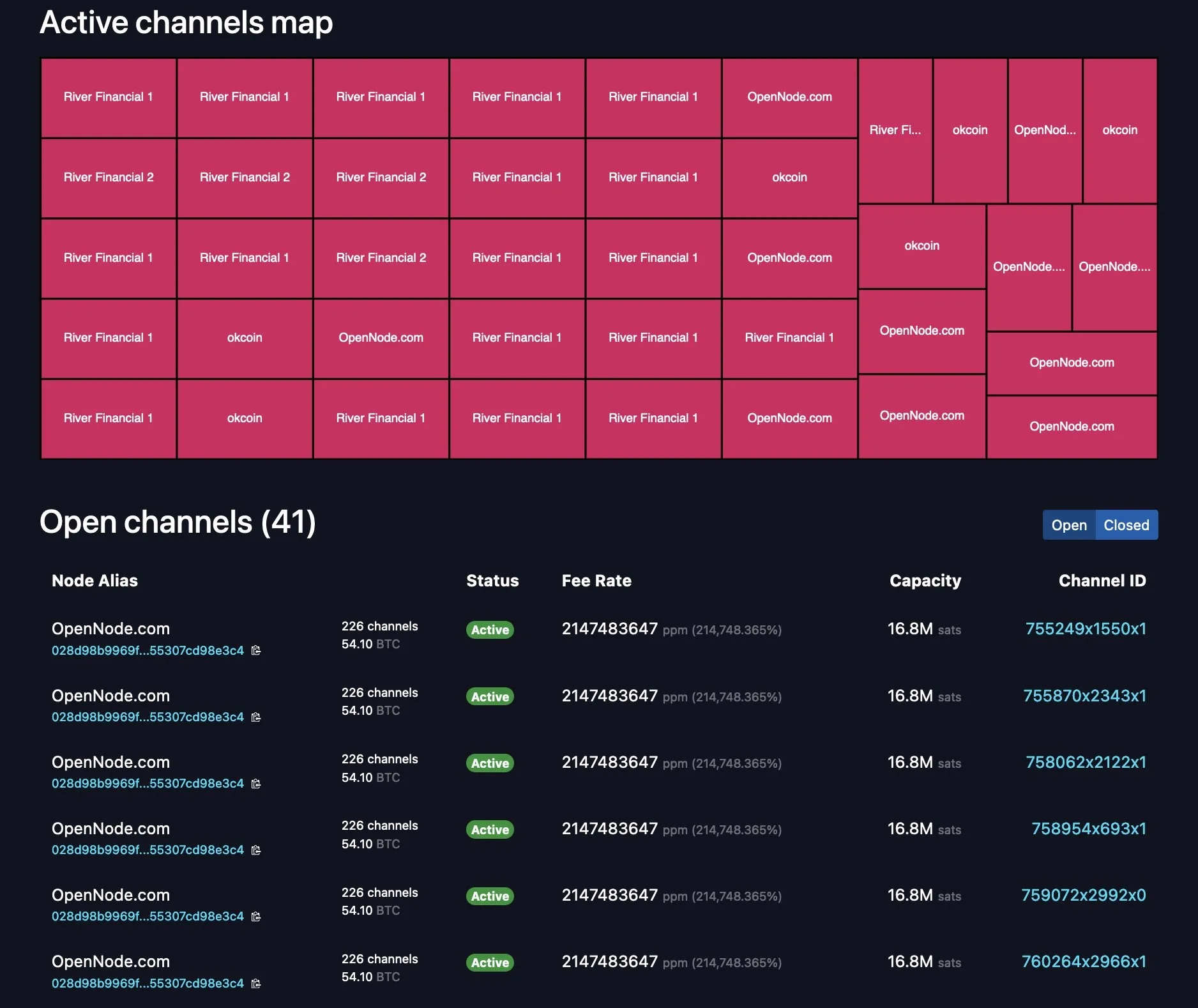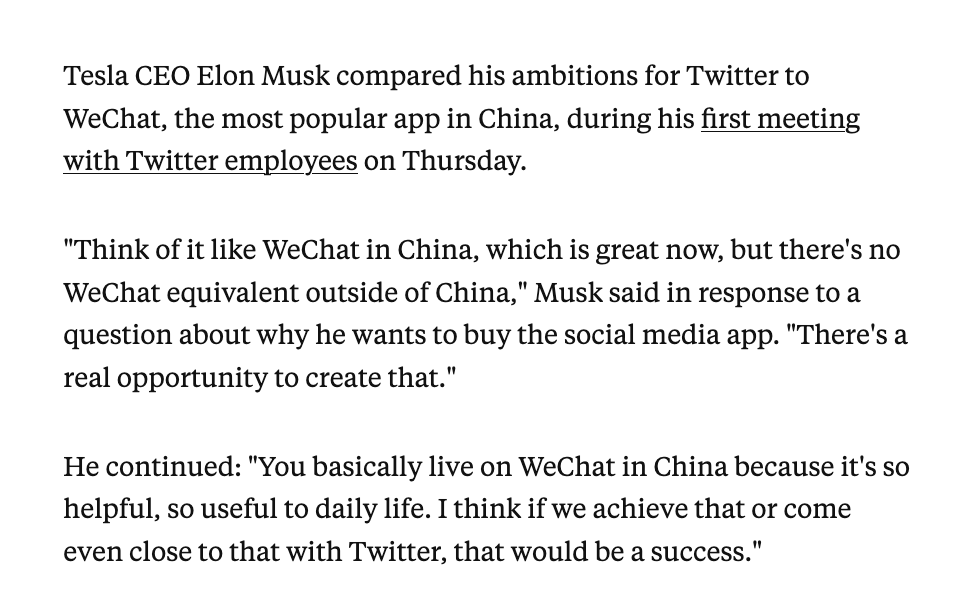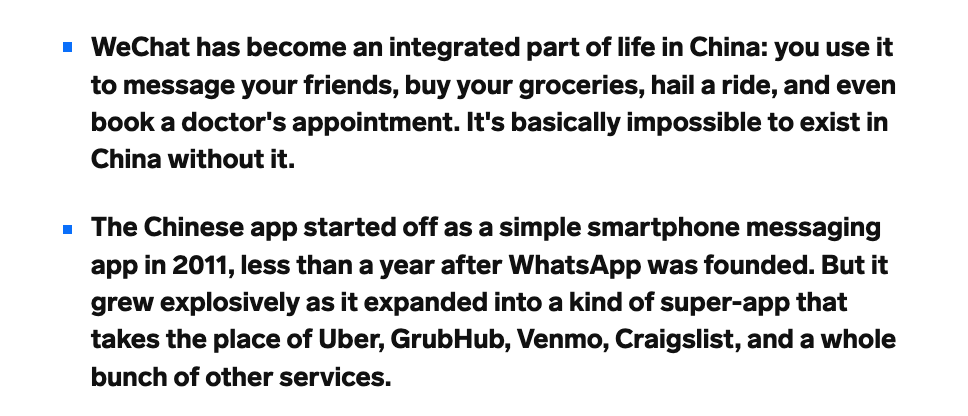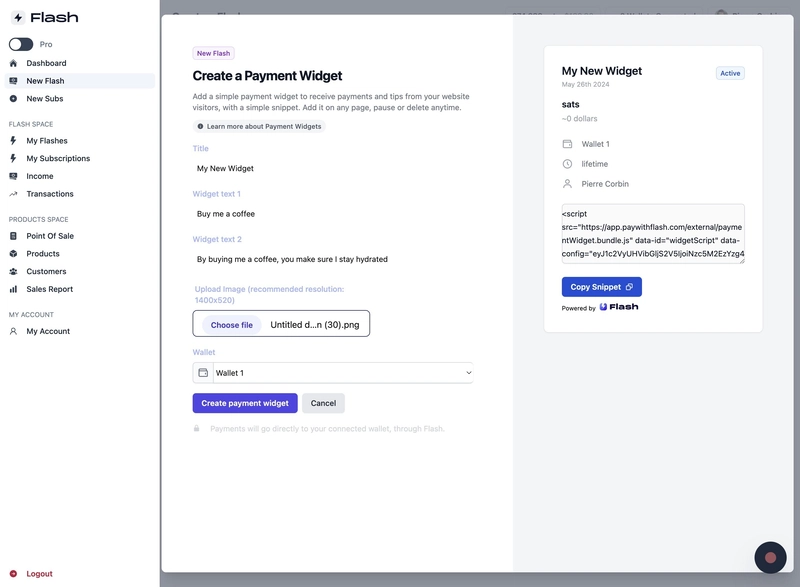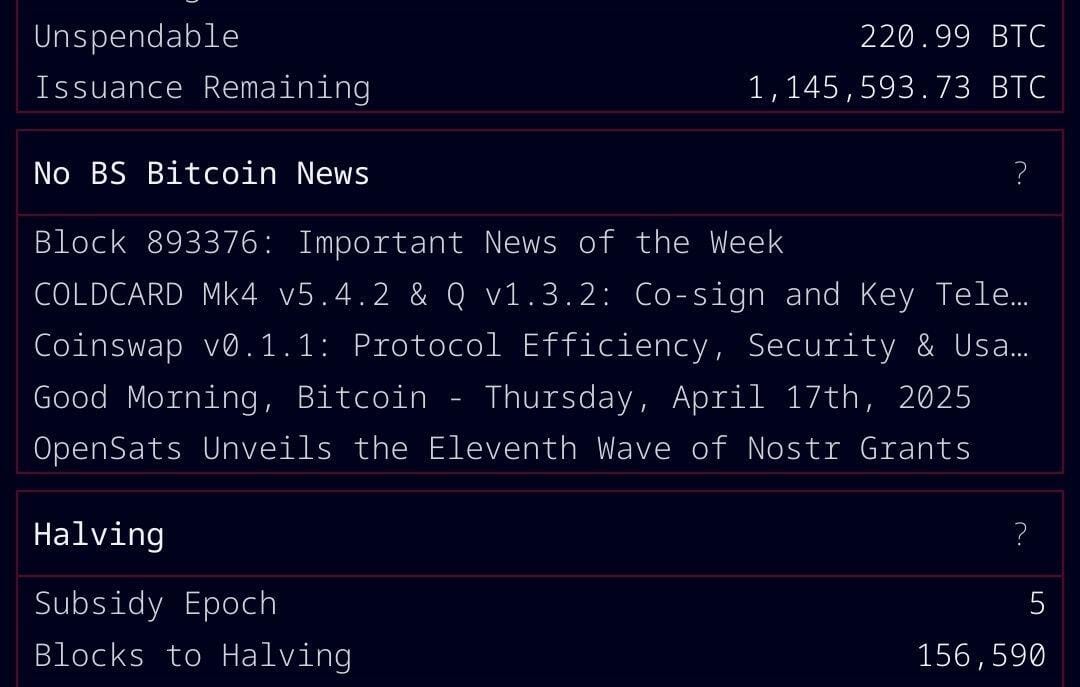-
 @ 7f6db517:a4931eda
2025-06-15 22:02:44
@ 7f6db517:a4931eda
2025-06-15 22:02:44
What is KYC/AML?
- The acronym stands for Know Your Customer / Anti Money Laundering.
- In practice it stands for the surveillance measures companies are often compelled to take against their customers by financial regulators.
- Methods differ but often include: Passport Scans, Driver License Uploads, Social Security Numbers, Home Address, Phone Number, Face Scans.
- Bitcoin companies will also store all withdrawal and deposit addresses which can then be used to track bitcoin transactions on the bitcoin block chain.
- This data is then stored and shared. Regulations often require companies to hold this information for a set number of years but in practice users should assume this data will be held indefinitely. Data is often stored insecurely, which results in frequent hacks and leaks.
- KYC/AML data collection puts all honest users at risk of theft, extortion, and persecution while being ineffective at stopping crime. Criminals often use counterfeit, bought, or stolen credentials to get around the requirements. Criminals can buy "verified" accounts for as little as $200. Furthermore, billions of people are excluded from financial services as a result of KYC/AML requirements.
During the early days of bitcoin most services did not require this sensitive user data, but as adoption increased so did the surveillance measures. At this point, most large bitcoin companies are collecting and storing massive lists of bitcoiners, our sensitive personal information, and our transaction history.
Lists of Bitcoiners
KYC/AML policies are a direct attack on bitcoiners. Lists of bitcoiners and our transaction history will inevitably be used against us.
Once you are on a list with your bitcoin transaction history that record will always exist. Generally speaking, tracking bitcoin is based on probability analysis of ownership change. Surveillance firms use various heuristics to determine if you are sending bitcoin to yourself or if ownership is actually changing hands. You can obtain better privacy going forward by using collaborative transactions such as coinjoin to break this probability analysis.
Fortunately, you can buy bitcoin without providing intimate personal information. Tools such as peach, hodlhodl, robosats, azteco and bisq help; mining is also a solid option: anyone can plug a miner into power and internet and earn bitcoin by mining privately.
You can also earn bitcoin by providing goods and/or services that can be purchased with bitcoin. Long term, circular economies will mitigate this threat: most people will not buy bitcoin - they will earn bitcoin - most people will not sell bitcoin - they will spend bitcoin.
There is no such thing as KYC or No KYC bitcoin, there are bitcoiners on lists and those that are not on lists.
If you found this post helpful support my work with bitcoin.

-
 @ 7f6db517:a4931eda
2025-06-15 22:02:41
@ 7f6db517:a4931eda
2025-06-15 22:02:41
Nostr is an open communication protocol that can be used to send messages across a distributed set of relays in a censorship resistant and robust way.
If you missed my nostr introduction post you can find it here. My nostr account can be found here.
We are nearly at the point that if something interesting is posted on a centralized social platform it will usually be posted by someone to nostr.
We are nearly at the point that if something interesting is posted exclusively to nostr it is cross posted by someone to various centralized social platforms.
We are nearly at the point that you can recommend a cross platform app that users can install and easily onboard without additional guides or resources.
As companies continue to build walls around their centralized platforms nostr posts will be the easiest to cross reference and verify - as companies continue to censor their users nostr is the best censorship resistant alternative - gradually then suddenly nostr will become the standard. 🫡
Current Nostr Stats
If you found this post helpful support my work with bitcoin.

-
 @ 7f6db517:a4931eda
2025-06-15 22:02:43
@ 7f6db517:a4931eda
2025-06-15 22:02:43
The former seems to have found solid product market fit. Expect significant volume, adoption, and usage going forward.
The latter's future remains to be seen. Dependence on Tor, which has had massive reliability issues, and lack of strong privacy guarantees put it at risk.
— ODELL (@ODELL) October 27, 2022
The Basics
- Lightning is a protocol that enables cheap and fast native bitcoin transactions.
- At the core of the protocol is the ability for bitcoin users to create a payment channel with another user.
- These payment channels enable users to make many bitcoin transactions between each other with only two on-chain bitcoin transactions: the channel open transaction and the channel close transaction.
- Essentially lightning is a protocol for interoperable batched bitcoin transactions.
- It is expected that on chain bitcoin transaction fees will increase with adoption and the ability to easily batch transactions will save users significant money.
- As these lightning transactions are processed, liquidity flows from one side of a channel to the other side, on chain transactions are signed by both parties but not broadcasted to update this balance.
- Lightning is designed to be trust minimized, either party in a payment channel can close the channel at any time and their bitcoin will be settled on chain without trusting the other party.
There is no 'Lightning Network'
- Many people refer to the aggregate of all lightning channels as 'The Lightning Network' but this is a false premise.
- There are many lightning channels between many different users and funds can flow across interconnected channels as long as there is a route through peers.
- If a lightning transaction requires multiple hops it will flow through multiple interconnected channels, adjusting the balance of all channels along the route, and paying lightning transaction fees that are set by each node on the route.
Example: You have a channel with Bob. Bob has a channel with Charlie. You can pay Charlie through your channel with Bob and Bob's channel with User C.
- As a result, it is not guaranteed that every lightning user can pay every other lightning user, they must have a route of interconnected channels between sender and receiver.
Lightning in Practice
- Lightning has already found product market fit and usage as an interconnected payment protocol between large professional custodians.
- They are able to easily manage channels and liquidity between each other without trust using this interoperable protocol.
- Lightning payments between large custodians are fast and easy. End users do not have to run their own node or manage their channels and liquidity. These payments rarely fail due to professional management of custodial nodes.
- The tradeoff is one inherent to custodians and other trusted third parties. Custodial wallets can steal funds and compromise user privacy.
Sovereign Lightning
- Trusted third parties are security holes.
- Users must run their own node and manage their own channels in order to use lightning without trusting a third party. This remains the single largest friction point for sovereign lightning usage: the mental burden of actively running a lightning node and associated liquidity management.
- Bitcoin development prioritizes node accessibility so cost to self host your own node is low but if a node is run at home or office, Tor or a VPN is recommended to mask your IP address: otherwise it is visible to the entire network and represents a privacy risk.
- This privacy risk is heightened due to the potential for certain governments to go after sovereign lightning users and compel them to shutdown their nodes. If their IP Address is exposed they are easier to target.
- Fortunately the tools to run and manage nodes continue to get easier but it is important to understand that this will always be a friction point when compared to custodial services.
The Potential Fracture of Lightning
- Any lightning user can choose which users are allowed to open channels with them.
- One potential is that professional custodians only peer with other professional custodians.
- We already see nodes like those run by CashApp only have channels open with other regulated counterparties. This could be due to performance goals, liability reduction, or regulatory pressure.
- Fortunately some of their peers are connected to non-regulated parties so payments to and from sovereign lightning users are still successfully processed by CashApp but this may not always be the case going forward.
Summary
- Many people refer to the aggregate of all lightning channels as 'The Lightning Network' but this is a false premise. There is no singular 'Lightning Network' but rather many payment channels between distinct peers, some connected with each other and some not.
- Lightning as an interoperable payment protocol between professional custodians seems to have found solid product market fit. Expect significant volume, adoption, and usage going forward.
- Lightning as a robust sovereign payment protocol has yet to be battle tested. Heavy reliance on Tor, which has had massive reliability issues, the friction of active liquidity management, significant on chain fee burden for small amounts, interactivity constraints on mobile, and lack of strong privacy guarantees put it at risk.
If you have never used lightning before, use this guide to get started on your phone.
If you found this post helpful support my work with bitcoin.

-
 @ dfa02707:41ca50e3
2025-06-15 22:02:40
@ dfa02707:41ca50e3
2025-06-15 22:02:40Contribute to keep No Bullshit Bitcoin news going.
- The latest firmware updates for COLDCARD devices introduce two major features: COLDCARD Co-sign (CCC) and Key Teleport between two COLDCARD Q devices using QR codes and/or NFC with a website.

What's new
- COLDCARD Co-Sign: When CCC is enabled, a second seed called the Spending Policy Key (Key C) is added to the device. This seed works with the device's Main Seed and one or more additional XPUBs (Backup Keys) to form 2-of-N multisig wallets.
- The spending policy functions like a hardware security module (HSM), enforcing rules such as magnitude and velocity limits, address whitelisting, and 2FA authentication to protect funds while maintaining flexibility and control, and is enforced each time the Spending Policy Key is used for signing.
- When spending conditions are met, the COLDCARD signs the partially signed bitcoin transaction (PSBT) with the Main Seed and Spending Policy Key for fund access. Once configured, the Spending Policy Key is required to view or change the policy, and violations are denied without explanation.
"You can override the spending policy at any time by signing with either a Backup Key and the Main Seed or two Backup Keys, depending on the number of keys (N) in the multisig."
-
A step-by-step guide for setting up CCC is available here.
-
Key Teleport for Q devices allows users to securely transfer sensitive data such as seed phrases (words, xprv), secure notes and passwords, and PSBTs for multisig. It uses QR codes or NFC, along with a helper website, to ensure reliable transmission, keeping your sensitive data protected throughout the process.
- For more technical details, see the protocol spec.
"After you sign a multisig PSBT, you have option to “Key Teleport” the PSBT file to any one of the other signers in the wallet. We already have a shared pubkey with them, so the process is simple and does not require any action on their part in advance. Plus, starting in this firmware release, COLDCARD can finalize multisig transactions, so the last signer can publish the signed transaction via PushTX (NFC tap) to get it on the blockchain directly."
- Multisig transactions are finalized when sufficiently signed. It streamlines the use of PushTX with multisig wallets.
- Signing artifacts re-export to various media. Users are now provided with the capability to export signing products, like transactions or PSBTs, to alternative media rather than the original source. For example, if a PSBT is received through a QR code, it can be signed and saved onto an SD card if needed.
- Multisig export files are signed now. Public keys are encoded as P2PKH address for all multisg signature exports. Learn more about it here.
- NFC export usability upgrade: NFC keeps exporting until CANCEL/X is pressed.
- Added Bitcoin Safe option to Export Wallet.
- 10% performance improvement in USB upload speed for large files.
- Q: Always choose the biggest possible display size for QR.
Fixes
- Do not allow change Main PIN to same value already used as Trick PIN, even if Trick PIN is hidden.
- Fix stuck progress bar under
Receiving...after a USB communications failure. - Showing derivation path in Address Explorer for root key (m) showed double slash (//).
- Can restore developer backup with custom password other than 12 words format.
- Virtual Disk auto mode ignores already signed PSBTs (with “-signed” in file name).
- Virtual Disk auto mode stuck on “Reading…” screen sometimes.
- Finalization of foreign inputs from partial signatures. Thanks Christian Uebber!
- Temporary seed from COLDCARD backup failed to load stored multisig wallets.
Destroy Seedalso removes all Trick PINs from SE2.Lock Down Seedrequires pressing confirm key (4) to execute.- Q only: Only BBQr is allowed to export Coldcard, Core, and pretty descriptor.
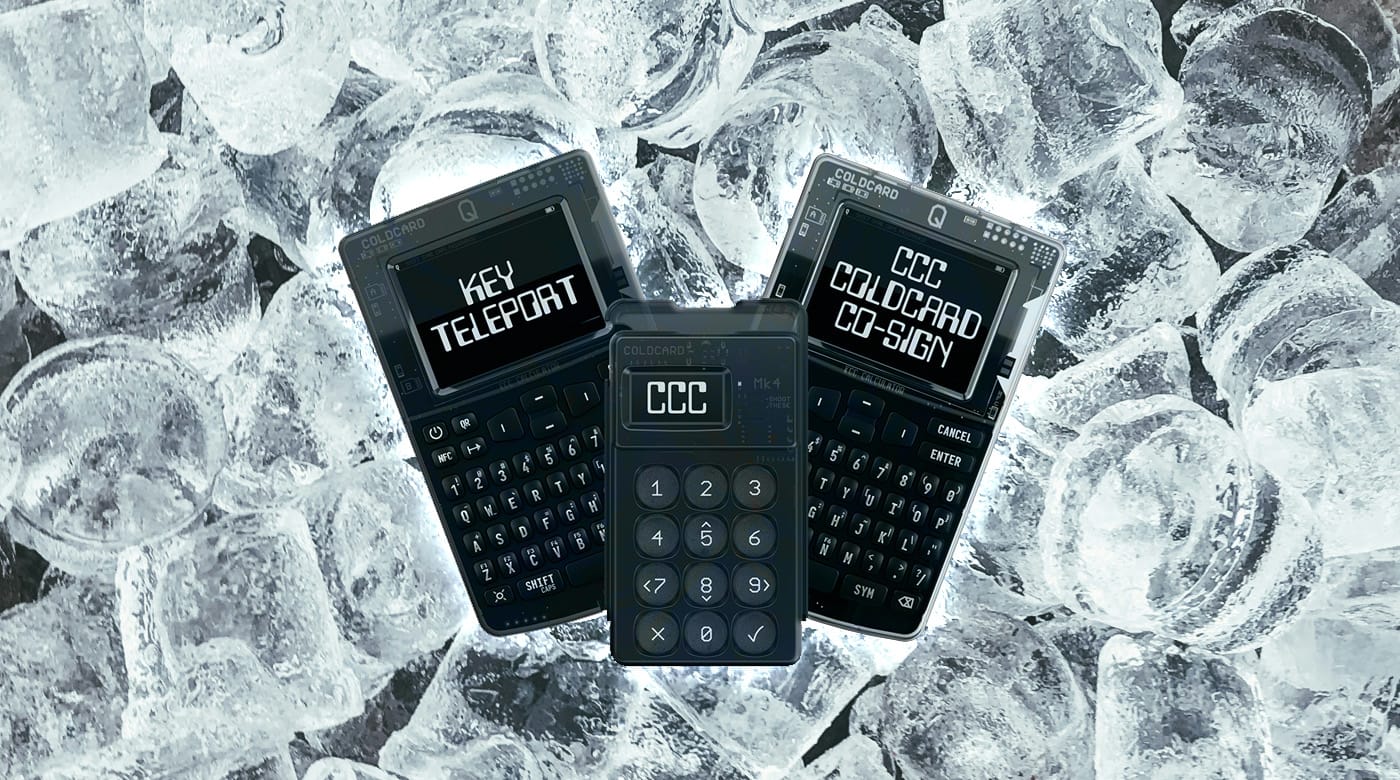
-
 @ dfa02707:41ca50e3
2025-06-15 22:02:38
@ dfa02707:41ca50e3
2025-06-15 22:02:38Contribute to keep No Bullshit Bitcoin news going.
- RoboSats v0.7.7-alpha is now available!
NOTE: "This version of clients is not compatible with older versions of coordinators. Coordinators must upgrade first, make sure you don't upgrade your client while this is marked as pre-release."
- This version brings a new and improved coordinators view with reviews signed both by the robot and the coordinator, adds market price sources in coordinator profiles, shows a correct warning for canceling non-taken orders after a payment attempt, adds Uzbek sum currency, and includes package library updates for coordinators.

Source: RoboSats.
- siggy47 is writing daily RoboSats activity reviews on stacker.news. Check them out here.
- Stay up-to-date with RoboSats on Nostr.
What's new
- New coordinators view (see the picture above).
- Available coordinator reviews signed by both the robot and the coordinator.
- Coordinators now display market price sources in their profiles.

Source: RoboSats.
- Fix for wrong message on cancel button when taking an order. Users are now warned if they try to cancel a non taken order after a payment attempt.
- Uzbek sum currency now available.
- For coordinators: library updates.
- Add docker frontend (#1861).
- Add order review token (#1869).
- Add UZS migration (#1875).
- Fixed tests review (#1878).
- Nostr pubkey for Robot (#1887).
New contributors

Full Changelog: v0.7.6-alpha...v0.7.7-alpha
-
 @ 8bad92c3:ca714aa5
2025-06-15 18:02:08
@ 8bad92c3:ca714aa5
2025-06-15 18:02:08Key Takeaways

Michael Goldstein, aka Bitstein, presents a sweeping philosophical and economic case for going “all in” on Bitcoin, arguing that unlike fiat, which distorts capital formation and fuels short-term thinking, Bitcoin fosters low time preference, meaningful saving, and long-term societal flourishing. At the heart of his thesis is “hodling for good”—a triple-layered idea encompassing permanence, purpose, and the pursuit of higher values like truth, beauty, and legacy. Drawing on thinkers like Aristotle, Hoppe, and Josef Pieper, Goldstein redefines leisure as contemplation, a vital practice in aligning capital with one’s deepest ideals. He urges Bitcoiners to think beyond mere wealth accumulation and consider how their sats can fund enduring institutions, art, and architecture that reflect a moral vision of the future.
Best Quotes
“Let BlackRock buy the houses, and you keep the sats.”
“We're not hodling just for the sake of hodling. There is a purpose to it.”
“Fiat money shortens your time horizon… you can never rest.”
“Savings precedes capital accumulation. You can’t build unless you’ve saved.”
“You're increasing the marginal value of everyone else’s Bitcoin.”
“True leisure is contemplation—the pursuit of the highest good.”
“What is Bitcoin for if not to make the conditions for magnificent acts of creation possible?”
“Bitcoin itself will last forever. Your stack might not. What will outlast your coins?”
“Only a whale can be magnificent.”
“The market will sell you all the crack you want. It’s up to you to demand beauty.”
Conclusion
This episode is a call to reimagine Bitcoin as more than a financial revolution—it’s a blueprint for civilizational renewal. Michael Goldstein reframes hodling as an act of moral stewardship, urging Bitcoiners to lower their time preference, build lasting institutions, and pursue truth, beauty, and legacy—not to escape the world, but to rebuild it on sound foundations.
Timestamps
00:00 - Intro
00:50 - Michael’s BBB presentation Hodl for Good
07:27 - Austrian principles on capital
15:40 - Fiat distorts the economic process
23:34 - Bitkey
24:29 - Hodl for Good triple entendre
29:52 - Bitcoin benefits everyone
39:05 - Unchained
40:14 - Leisure theory of value
52:15 - Heightening life
1:15:48 - Breaking from the chase makes room for magnificence
1:32:32 - Nakamoto Institute’s missionTranscript
(00:00) Fiat money is by its nature a disturbance. If money is being continually produced, especially at an uncertain rate, these uh policies are really just redistribution of wealth. Most are looking for number to go up post hyper bitcoinization. The rate of growth of bitcoin would be more reflective of the growth of the economy as a whole.
(00:23) Ultimately, capital requires knowledge because it requires knowing there is something that you can add to the structures of production to lengthen it in some way that will take time but allow you to have more in the future than you would today. Let Black Rockck buy the houses and you keep the sats, not the other way around.
(00:41) You wait until later for Larry Frink to try to sell you a [Music] mansion. And we're live just like that. Just like that. 3:30 on a Friday, Memorial Day weekend. It's a good good good way to end the week and start the holiday weekend. Yes, sir. Yes, sir. Thank you for having me here. Thank you for coming. I wore this hat specifically because I think it's I think it's very apppropo uh to the conversation we're going to have which is I hope an extension of the presentation you gave at Bitblock Boom Huddle for good. You were working on
(01:24) that for many weeks leading up to uh the conference and explaining how you were structuring it. I think it's a very important topic to discuss now as the Bitcoin price is hitting new all-time highs and people are trying to understand what am I doing with Bitcoin? Like you have you have the different sort of factions within Bitcoin.
(01:47) Uh get on a Bitcoin standard, get on zero, spend as much Bitcoin as possible. You have the sailors of the world are saying buy Bitcoin, never sell, die with your Bitcoin. And I think you do a really good job in that presentation. And I just think your understanding overall of Bitcoin is incredible to put everything into context. It's not either or.
(02:07) It really depends on what you want to accomplish. Yeah, it's definitely there there is no actual one-sizefits-all um for I mean nearly anything in this world. So um yeah, I mean first of all I mean there was it was the first conference talk I had given in maybe five years. I think the one prior to that uh was um bit block boom 2019 which was my meme talk which uh has uh become infamous and notorious.
(02:43) So uh there was also a lot of like high expectations uh you know rockstar dev uh has has treated that you know uh that that talk with a lot of reference. a lot of people have enjoyed it and he was expecting this one to be, you know, the greatest one ever, which is a little bit of a little bit of a uh a burden to live up to those kinds of standards.
(03:08) Um, but you know, because I don't give a lot of talks. Um, you know, I I I like to uh try to bring ideas that might even be ideas that are common. So, something like hodling, we all talk about it constantly. uh but try to bring it from a little bit of a different angle and try to give um a little bit of uh new light to it.
(03:31) I alsove I've I've always enjoyed kind of coming at things from a third angle. Um whenever there's, you know, there's there's all these little debates that we have in in Bitcoin and sometimes it's nice to try to uh step out of it and look at it a little more uh kind of objectively and find ways of understanding it that incorporate the truths of of all of them.
(03:58) uh you know cuz I think we should always be kind of as much as possible after ultimate truth. Um so with this one um yeah I was kind of finding that that sort of golden mean. So uh um yeah and I actually I think about that a lot is uh you know Aristotle has his his concept of the golden mean. So it's like any any virtue is sort of between two vices um because you can you can always you can always take something too far.
(04:27) So you're you're always trying to find that right balance. Um so someone who is uh courageous you know uh one of the vices uh on one side is being basically reckless. I I can't remember what word he would use. Uh but effectively being reckless and just wanting to put yourself in danger for no other reason than just you know the thrill of it.
(04:50) Um and then on the other side you would just have cowardice which is like you're unwilling to put yourself um at any risk at any time. Um, and courage is right there in the middle where it's understanding when is the right time uh to put your put yourself, you know, in in the face of danger um and take it on. And so um in some sense this this was kind of me uh in in some ways like I'm obviously a partisan of hodling.
(05:20) Um, I've for, you know, a long time now talked about the, um, why huddling is good, why people do it, why we should expect it. Um, but still trying to find that that sort of golden mean of like yes, huddle, but also what are we hodling for? And it's not we're we're not hodddling just merely for the sake of hodddling.
(05:45) There there is a a purpose to it. And we should think about that. And that would also help us think more about um what are the benefits of of spending, when should we spend, why should we spend, what should we spend on um to actually give light to that sort of side of the debate. Um so that was that was what I was kind of trying to trying to get into.
(06:09) Um, as well as also just uh at the same time despite all the talk of hodling, there's always this perennial uh there's always this perennial dislike of hodlers because we're treated as uh as if um we're just free riding the network or we're just greedy or you know any of these things. And I wanted to show how uh huddling does serve a real economic purpose.
(06:36) Um, and it does benefit the individual, but it also does uh it it has actual real social um benefits as well beyond merely the individual. Um, so I wanted to give that sort of defense of hodling as well to look at it from um a a broader position than just merely I'm trying to get rich. Um uh because even the person who uh that is all they want to do um just like you know your your pure number grow up go up moonboy even that behavior has positive ramifications on on the economy.
(07:14) And while we might look at them and have uh judgments about their particular choices for them as an individual, we shouldn't discount that uh their actions are having positive positive effects for the rest of the economy. Yeah. So, let's dive into that just not even in the context of Bitcoin because I think you did a great job of this in the presentation.
(07:36) just you've done a good job of this consistently throughout the years that I've known you. Just from like a first principles Austrian economics perspective, what is the idea around capital accumulation, low time preference and deployment of that capital like what what like getting getting into like the nitty-gritty and then applying it to Bitcoin? Yeah, it's it's a big question and um in many ways I mean I I even I barely scratched the surface.
(08:05) uh I I can't claim to have read uh all the volumes of Bombber works, you know, capital and interest and and stuff like that. Um but I think there's some some sort of basic concepts that we can look at that we can uh draw a lot out. Um the first uh I guess let's write that. So repeat so like capital time preference. Yeah. Well, I guess getting more broad like why sav -
 @ b1ddb4d7:471244e7
2025-06-15 18:01:36
@ b1ddb4d7:471244e7
2025-06-15 18:01:36Paris, France – June 6, 2025 – Flash, the easiest Bitcoin payment gateway for businesses, just announced a new partnership with the Bitcoin Only Brewery, marking the first-ever beverage company to leverage Flash for seamless Bitcoin payments.
Bitcoin Buys Beer Thanks to Flash!

As Co-Founder of Flash, it's not every day we get to toast to a truly refreshing milestone.
Okay, jokes aside.
We're super buzzed to see our friends at @Drink_B0B
Bitcoin Only Brewery using Flash to power their online sales!The first… pic.twitter.com/G7TWhy50pX
— Pierre Corbin (@CierrePorbin) June 3, 2025
Flash enables Bitcoin Only Brewery to offer its “BOB” beer with, no-KYC (Know Your Customer) delivery across Europe, priced at 19,500 sats (~$18) for the 4-pack – shipping included.
The cans feature colorful Bitcoin artwork while the contents promise a hazy pale ale: “Each 33cl can contains a smooth, creamy mouthfeel, hazy appearance and refreshing Pale Ale at 5% ABV,” reads the product description.
Pierre Corbin, Co-Founder of Flash, commented: “Currently, bitcoin is used more as a store of value but usage for payments is picking up. Thanks to new innovation on Lightning, bitcoin is ready to go mainstream for e-commerce sales.”
Flash, launched its 2.0 version in March 2025 with the goal to provide the easiest Bitcoin payment gateway for businesses worldwide. The platform is non-custodial and can enable both digital and physical shops to accept Bitcoin by connecting their own wallets to Flash.
By leveraging the scalability of the Lightning Network, Flash ensures instant, low-cost transactions, addressing on-chain Bitcoin bottlenecks like high fees and long wait times.
Bitcoin payment usage is growing thanks to Lightning
In May, fast-food chain Steak ‘N Shake went viral for integrating bitcoin at their restaurants around the world. In the same month, the bitcoin2025 conference in Las Vegas set a new world record with 4,000 Lightning payments in one day.
According to a report by River Intelligence, public Lightning payment volume surged by 266% from August 2023 to August 2024. This growth is also reflected in the overall accessibility of lighting infrastructure for consumers. According to Lightning Service Provider Breez, over 650 Million users now have access to the Lightning Network through apps like CashApp, Kraken or Strike.
Bitcoin Only Brewery’s adoption of Flash reflects the growing trend of businesses integrating Bitcoin payments to cater to a global, privacy-conscious customer base. By offering no-KYC delivery across Europe, the brewery aligns with the ethos of decentralization and financial sovereignty, appealing to the increasing number of consumers and businesses embracing Bitcoin as a legitimate payment method.
“Flash is committed to driving innovation in the Bitcoin ecosystem,” Corbin added. “We’re building a future where businesses of all sizes can seamlessly integrate Bitcoin payments, unlocking new opportunities in the global market. It’s never been easier to start selling in bitcoin and we invite retailers globally to join us in this revolution.”
For businesses interested in adopting Bitcoin payments, Flash offers a straightforward onboarding process, low fees, and robust support for both digital and physical goods. To learn more, visit paywithflash.com.
About Flash
Flash is the easiest Bitcoin payment gateway for businesses to accept payments. Supporting both digital and physical enterprises, Flash leverages the Lightning Network to enable fast, low-cost Bitcoin transactions. Launched in its 2.0 version in March 2025, Flash is at the forefront of driving Bitcoin adoption in e-commerce.
About Bitcoin Only Brewery
Bitcoin Only Brewery (@Drink_B0B) is a pioneering beverage company dedicated to the Bitcoin ethos, offering high-quality beers payable exclusively in Bitcoin. With a commitment to personal privacy, the brewery delivers across Europe with no-KYC requirements.
Media Contact:
Pierre Corbin
Co-Founder, Flash
Email: press@paywithflash.com
Website: paywithflash.comPhotos paywithflash.com/about/pressHow Flash Enables Interoperable, Self-Custodial Bitcoin Commerce
-
 @ 7f6db517:a4931eda
2025-06-15 17:02:42
@ 7f6db517:a4931eda
2025-06-15 17:02:42
Nostr is an open communication protocol that can be used to send messages across a distributed set of relays in a censorship resistant and robust way.
If you missed my nostr introduction post you can find it here. My nostr account can be found here.
We are nearly at the point that if something interesting is posted on a centralized social platform it will usually be posted by someone to nostr.
We are nearly at the point that if something interesting is posted exclusively to nostr it is cross posted by someone to various centralized social platforms.
We are nearly at the point that you can recommend a cross platform app that users can install and easily onboard without additional guides or resources.
As companies continue to build walls around their centralized platforms nostr posts will be the easiest to cross reference and verify - as companies continue to censor their users nostr is the best censorship resistant alternative - gradually then suddenly nostr will become the standard. 🫡
Current Nostr Stats
If you found this post helpful support my work with bitcoin.

-
 @ 9ca447d2:fbf5a36d
2025-06-15 17:02:15
@ 9ca447d2:fbf5a36d
2025-06-15 17:02:15Paris, France – June 6, 2025 — Bitcoin payment gateway startup Flash, just announced a new partnership with the “Bitcoin Only Brewery”, marking the first-ever beverage company to leverage Lightning payments.
Flash enables Bitcoin Only Brewery to offer its “BOB” beer with, no-KYC (Know Your Customer) delivery across Europe, priced at 19,500 sats (~$18) for the 4-pack, shipping included.
The cans feature colorful Bitcoin artwork while the contents promise a hazy pale ale: “Each 33cl can contains a smooth, creamy mouthfeel, hazy appearance and refreshing Pale Ale at 5% ABV,” reads the product description.
Pierre Corbin, Co-Founder of Flash, commented:
“Currently, bitcoin is used more as a store of value but usage for payments is picking up. Thanks to new innovation on Lightning, bitcoin is ready to go mainstream for e-commerce sales.”
Flash, launched its 2.0 version in March 2025 with the goal to provide the easiest bitcoin payment gateway for businesses worldwide. The platform is non-custodial and can enable both digital and physical shops to accept bitcoin by connecting their own wallets to Flash.
By leveraging the scalability of the Lightning Network, Flash ensures instant, low-cost transactions, addressing on-chain Bitcoin bottlenecks like high fees and long wait times.
For businesses interested in adopting Bitcoin payments, Flash offers a straightforward onboarding process, low fees, and robust support for both digital and physical goods. To learn more, visit paywithflash.com.
Media Contact:
Pierre Corbin
Co-Founder, Flash
Email: press@paywithflash.com
Website: paywithflash.comAbout Flash
Flash is the easiest Bitcoin payment gateway for businesses to accept payments. Supporting both digital and physical enterprises, Flash leverages the Lightning Network to enable fast, low-cost Bitcoin transactions. Launched in its 2.0 version in March 2025, Flash is at the forefront of driving Bitcoin adoption in e-commerce.
About Bitcoin Only Brewery
Bitcoin Only Brewery (@Drink_B0B) is a pioneering beverage company dedicated to the Bitcoin ethos, offering high-quality beers payable exclusively in Bitcoin. With a commitment to personal privacy, the brewery delivers across Europe with no-KYC requirements.
-
 @ cae03c48:2a7d6671
2025-06-15 17:01:35
@ cae03c48:2a7d6671
2025-06-15 17:01:35Bitcoin Magazine
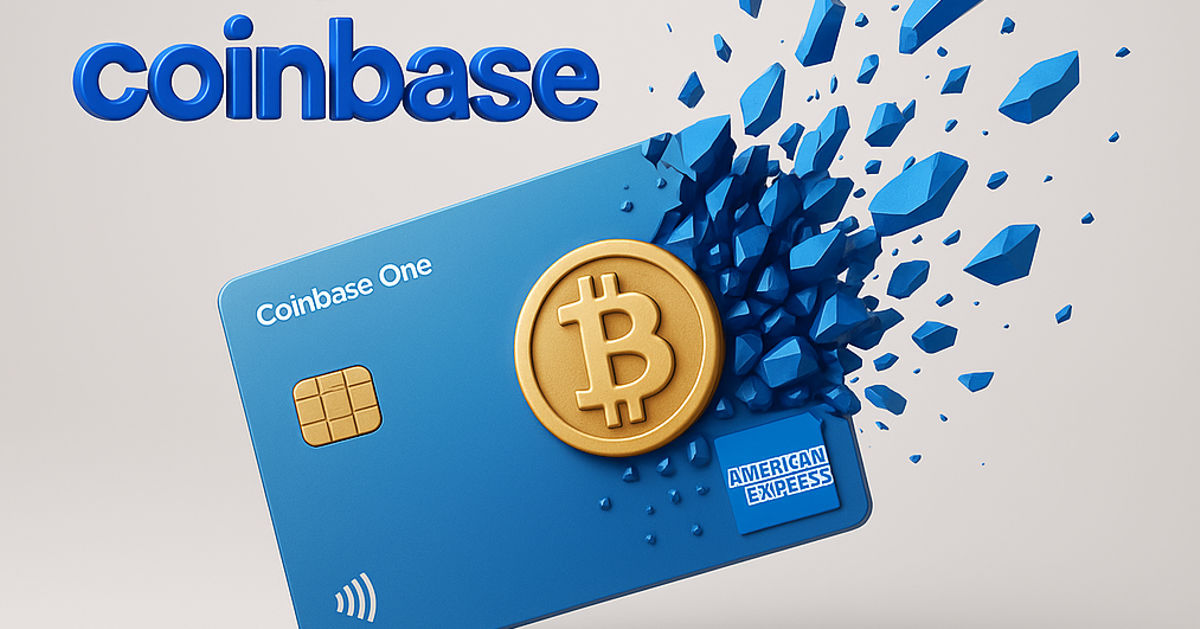
Coinbase Announces Bitcoin Rewards Credit Card, Offering up to 4% BTC Back on EverythingCoinbase is launching its first-ever branded credit card in partnership with American Express, set to roll out this fall. Called the Coinbase One Card, it will be available only to U.S. members of Coinbase One, the platform’s monthly subscription service. The card will offer 2% to 4% back in Bitcoin on everyday purchases, along with access to American Express perks.
JUST IN: Coinbase launches credit card allowing users to earn up to 4% bitcoin back on every purchase
 pic.twitter.com/d6pdNZV4pi
pic.twitter.com/d6pdNZV4pi— Bitcoin Magazine (@BitcoinMagazine) June 12, 2025
This is a first-of-its-kind product for Coinbase, which previously only offered a prepaid debit card with Visa in 2020.
“We see real potential in the combination of Coinbase and crypto with the powerful backing of American Express, and what the card offers is an excellent mix of what customers are looking for right now,” said Will Stredwick, head of American Express global network services, during the Coinbase State of Crypto Summit in New York.
The card is part of a larger push by Coinbase to expand its subscription-based services. Coinbase One costs $29.99/month and includes zero trading fees, higher staking rewards, and customer support perks. The company also announced a cheaper version—Coinbase Basic—for $4.99/month or $49.99/year, which includes fewer features.
Coinbase’s subscription business is growing fast. It brought in $698.1 million in Q1 2025, compared to $1.26 billion in trading revenue. According to William Blair analyst Andrew Jeffrey, this kind of recurring revenue is a big reason why long-term investors are sticking with the stock.
Launched in 2023, Coinbase One now has over a million members. The company has been steadily growing its ecosystem with products like its Base developer platform and a self-custody wallet.
The company has long positioned Bitcoin at the center of its strategy—offering BTC custody services to institutions, supporting Bitcoin ETFs, integrating Bitcoin rewards into its products, and actively advocating for Bitcoin-friendly regulation in Washington. Coinbase also supports Bitcoin development directly through funding grants and engineering support. As the largest publicly traded crypto exchange in the U.S., Coinbase continues to frame Bitcoin not just as an asset, but as the foundation of its long-term vision.
This post Coinbase Announces Bitcoin Rewards Credit Card, Offering up to 4% BTC Back on Everything first appeared on Bitcoin Magazine and is written by Jenna Montgomery.
-
 @ 39cc53c9:27168656
2025-06-15 14:46:35
@ 39cc53c9:27168656
2025-06-15 14:46:35The new website is finally live! I put in a lot of hard work over the past months on it. I'm proud to say that it's out now and it looks pretty cool, at least to me!
Why rewrite it all?
The old kycnot.me site was built using Python with Flask about two years ago. Since then, I've gained a lot more experience with Golang and coding in general. Trying to update that old codebase, which had a lot of design flaws, would have been a bad idea. It would have been like building on an unstable foundation.
That's why I made the decision to rewrite the entire application. Initially, I chose to use SvelteKit with JavaScript. I did manage to create a stable site that looked similar to the new one, but it required Jav aScript to work. As I kept coding, I started feeling like I was repeating "the Python mistake". I was writing the app in a language I wasn't very familiar with (just like when I was learning Python at that mom ent), and I wasn't happy with the code. It felt like spaghetti code all the time.
So, I made a complete U-turn and started over, this time using Golang. While I'm not as proficient in Golang as I am in Python now, I find it to be a very enjoyable language to code with. Most aof my recent pr ojects have been written in Golang, and I'm getting the hang of it. I tried to make the best decisions I could and structure the code as well as possible. Of course, there's still room for improvement, which I'll address in future updates.
Now I have a more maintainable website that can scale much better. It uses a real database instead of a JSON file like the old site, and I can add many more features. Since I chose to go with Golang, I mad e the "tradeoff" of not using JavaScript at all, so all the rendering load falls on the server. But I believe it's a tradeoff that's worth it.
What's new
- UI/UX - I've designed a new logo and color palette for kycnot.me. I think it looks pretty cool and cypherpunk. I am not a graphic designer, but I think I did a decent work and I put a lot of thinking on it to make it pleasant!
- Point system - The new point system provides more detailed information about the listings, and can be expanded to cover additional features across all services. Anyone can request a new point!
- ToS Scrapper: I've implemented a powerful automated terms-of-service scrapper that collects all the ToS pages from the listings. It saves you from the hassle of reading the ToS by listing the lines that are suspiciously related to KYC/AML practices. This is still in development and it will improve for sure, but it works pretty fine right now!
- Search bar - The new search bar allows you to easily filter services. It performs a full-text search on the Title, Description, Category, and Tags of all the services. Looking for VPN services? Just search for "vpn"!
- Transparency - To be more transparent, all discussions about services now take place publicly on GitLab. I won't be answering any e-mails (an auto-reply will prompt to write to the corresponding Gitlab issue). This ensures that all service-related matters are publicly accessible and recorded. Additionally, there's a real-time audits page that displays database changes.
- Listing Requests - I have upgraded the request system. The new form allows you to directly request services or points without any extra steps. In the future, I plan to enable requests for specific changes to parts of the website.
- Lightweight and fast - The new site is lighter and faster than its predecessor!
- Tor and I2P - At last! kycnot.me is now officially on Tor and I2P!
How?
This rewrite has been a labor of love, in the end, I've been working on this for more than 3 months now. I don't have a team, so I work by myself on my free time, but I find great joy in helping people on their private journey with cryptocurrencies. Making it easier for individuals to use cryptocurrencies without KYC is a goal I am proud of!
If you appreciate my work, you can support me through the methods listed here. Alternatively, feel free to send me an email with a kind message!
Technical details
All the code is written in Golang, the website makes use of the chi router for the routing part. I also make use of BigCache for caching database requests. There is 0 JavaScript, so all the rendering load falls on the server, this means it needed to be efficient enough to not drawn with a few users since the old site was reporting about 2M requests per month on average (note that this are not unique users).
The database is running with mariadb, using gorm as the ORM. This is more than enough for this project. I started working with an
sqlitedatabase, but I ended up migrating to mariadb since it works better with JSON.The scraper is using chromedp combined with a series of keywords, regex and other logic. It runs every 24h and scraps all the services. You can find the scraper code here.
The frontend is written using Golang Templates for the HTML, and TailwindCSS plus DaisyUI for the CSS classes framework. I also use some plain CSS, but it's minimal.
The requests forms is the only part of the project that requires JavaScript to be enabled. It is needed for parsing some from fields that are a bit complex and for the "captcha", which is a simple Proof of Work that runs on your browser, destinated to avoid spam. For this, I use mCaptcha.
-
 @ 7f6db517:a4931eda
2025-06-15 22:02:43
@ 7f6db517:a4931eda
2025-06-15 22:02:43
Bank run on every crypto bank then bank run on every "real" bank.
— ODELL (@ODELL) December 14, 2022
The four main banks of bitcoin and “crypto” are Signature, Prime Trust, Silvergate, and Silicon Valley Bank. Prime Trust does not custody funds themselves but rather maintains deposit accounts at BMO Harris Bank, Cross River, Lexicon Bank, MVB Bank, and Signature Bank. Silvergate and Silicon Valley Bank have already stopped withdrawals. More banks will go down before the chaos stops. None of them have sufficient reserves to meet withdrawals.
Bitcoin gives us all the ability to opt out of a system that has massive layers of counterparty risk built in, years of cheap money and broken incentives have layered risk on top of risk throughout the entire global economy. If you thought the FTX bank run was painful to watch, I have bad news for you: every major bank in the world is fractional reserve. Bitcoin held in self custody is unique in its lack of counterparty risk, as global market chaos unwinds this will become much more obvious.
The rules of bitcoin are extremely hard to change by design. Anyone can access the network directly without a trusted third party by using their own node. Owning more bitcoin does not give you more control over the network with all participants on equal footing.
Bitcoin is:
- money that is not controlled by a company or government
- money that can be spent or saved without permission
- money that is provably scarce and should increase in purchasing power with adoptionBitcoin is money without trust. Whether you are a nation state, corporation, or an individual, you can use bitcoin to spend or save without permission. Social media will accelerate the already deteriorating trust in our institutions and as this trust continues to crumble the value of trust minimized money will become obvious. As adoption increases so should the purchasing power of bitcoin.
A quick note on "stablecoins," such as USDC - it is important to remember that they rely on trusted custodians. They have the same risk as funds held directly in bank accounts with additional counterparty risk on top. The trusted custodians can be pressured by gov, exit scam, or caught up in fraud. Funds can and will be frozen at will. This is a distinctly different trust model than bitcoin, which is a native bearer token that does not rely on any centralized entity or custodian.
Most bitcoin exchanges have exposure to these failing banks. Expect more chaos and confusion as this all unwinds. Withdraw any bitcoin to your own wallet ASAP.
Simple Self Custody Guide: https://werunbtc.com/muun
More Secure Cold Storage Guide: https://werunbtc.com/coldcard
If you found this post helpful support my work with bitcoin.

-
 @ 7f6db517:a4931eda
2025-06-15 22:02:43
@ 7f6db517:a4931eda
2025-06-15 22:02:43
The newly proposed RESTRICT ACT - is being advertised as a TikTok Ban, but is much broader than that, carries a $1M Fine and up to 20 years in prison️! It is unconstitutional and would create massive legal restrictions on the open source movement and free speech throughout the internet.
The Bill was proposed by: Senator Warner, Senator Thune, Senator Baldwin, Senator Fischer, Senator Manchin, Senator Moran, Senator Bennet, Senator Sullivan, Senator Gillibrand, Senator Collins, Senator Heinrich, and Senator Romney. It has broad support across Senators of both parties.
Corrupt politicians will not protect us. They are part of the problem. We must build, support, and learn how to use censorship resistant tools in order to defend our natural rights.
The RESTRICT Act, introduced by Senators Warner and Thune, aims to block or disrupt transactions and financial holdings involving foreign adversaries that pose risks to national security. Although the primary targets of this legislation are companies like Tik-Tok, the language of the bill could potentially be used to block or disrupt cryptocurrency transactions and, in extreme cases, block Americans’ access to open source tools or protocols like Bitcoin.
The Act creates a redundant regime paralleling OFAC without clear justification, it significantly limits the ability for injured parties to challenge actions raising due process concerns, and unlike OFAC it lacks any carve-out for protected speech. COINCENTER ON THE RESTRICT ACT
If you found this post helpful support my work with bitcoin.

-
 @ 7f6db517:a4931eda
2025-06-15 22:02:42
@ 7f6db517:a4931eda
2025-06-15 22:02:42
@matt_odell don't you even dare not ask about nostr!
— Kukks (Andrew Camilleri) (@MrKukks) May 18, 2021
Nostr first hit my radar spring 2021: created by fellow bitcoiner and friend, fiatjaf, and released to the world as free open source software. I was fortunate to be able to host a conversation with him on Citadel Dispatch in those early days, capturing that moment in history forever. Since then, the protocol has seen explosive viral organic growth as individuals around the world have contributed their time and energy to build out the protocol and the surrounding ecosystem due to the clear need for better communication tools.
nostr is to twitter as bitcoin is to paypal
As an intro to nostr, let us start with a metaphor:
twitter is paypal - a centralized platform plagued by censorship but has the benefit of established network effects
nostr is bitcoin - an open protocol that is censorship resistant and robust but requires an organic adoption phase
Nostr is an open communication protocol that can be used to send messages across a distributed set of relays in a censorship resistant and robust way.
- Anyone can run a relay.
- Anyone can interact with the protocol.
- Relays can choose which messages they want to relay.
- Users are identified by a simple public private key pair that they can generate themselves.Nostr is often compared to twitter since there are nostr clients that emulate twitter functionality and user interface but that is merely one application of the protocol. Nostr is so much more than a mere twitter competitor. Nostr clients and relays can transmit a wide variety of data and clients can choose how to display that information to users. The result is a revolution in communication with implications that are difficult for any of us to truly comprehend.
Similar to bitcoin, nostr is an open and permissionless protocol. No person, company, or government controls it. Anyone can iterate and build on top of nostr without permission. Together, bitcoin and nostr are incredibly complementary freedom tech tools: censorship resistant, permissionless, robust, and interoperable - money and speech protected by code and incentives, not laws.
As censorship throughout the world continues to escalate, freedom tech provides hope for individuals around the world who refuse to accept the status quo. This movement will succeed on the shoulders of those who choose to stand up and contribute. We will build our own path. A brighter path.
My Nostr Public Key: npub1qny3tkh0acurzla8x3zy4nhrjz5zd8l9sy9jys09umwng00manysew95gx
If you found this post helpful support my work with bitcoin.

-
 @ 39cc53c9:27168656
2025-06-15 14:46:34
@ 39cc53c9:27168656
2025-06-15 14:46:34Know Your Customer is a regulation that requires companies of all sizes to verify the identity, suitability, and risks involved with maintaining a business relationship with a customer. Such procedures fit within the broader scope of anti-money laundering (AML) and counterterrorism financing (CTF) regulations.
Banks, exchanges, online business, mail providers, domain registrars... Everyone wants to know who you are before you can even opt for their service. Your personal information is flowing around the internet in the hands of "god-knows-who" and secured by "trust-me-bro military-grade encryption". Once your account is linked to your personal (and verified) identity, tracking you is just as easy as keeping logs on all these platforms.
Rights for Illusions
KYC processes aim to combat terrorist financing, money laundering, and other illicit activities. On the surface, KYC seems like a commendable initiative. I mean, who wouldn't want to halt terrorists and criminals in their tracks?
The logic behind KYC is: "If we mandate every financial service provider to identify their users, it becomes easier to pinpoint and apprehend the malicious actors."
However, terrorists and criminals are not precisely lining up to be identified. They're crafty. They may adopt false identities or find alternative strategies to continue their operations. Far from being outwitted, many times they're several steps ahead of regulations. Realistically, KYC might deter a small fraction – let's say about 1% ^1 – of these malefactors. Yet, the cost? All of us are saddled with the inconvenient process of identification just to use a service.
Under the rhetoric of "ensuring our safety", governments and institutions enact regulations that seem more out of a dystopian novel, gradually taking away our right to privacy.
To illustrate, consider a city where the mayor has rolled out facial recognition cameras in every nook and cranny. A band of criminals, intent on robbing a local store, rolls in with a stolen car, their faces obscured by masks and their bodies cloaked in all-black clothes. Once they've committed the crime and exited the city's boundaries, they switch vehicles and clothes out of the cameras' watchful eyes. The high-tech surveillance? It didn’t manage to identify or trace them. Yet, for every law-abiding citizen who merely wants to drive through the city or do some shopping, their movements and identities are constantly logged. The irony? This invasive tracking impacts all of us, just to catch the 1% ^1 of less-than-careful criminals.
KYC? Not you.
KYC creates barriers to participation in normal economic activity, to supposedly stop criminals. ^2
KYC puts barriers between many users and businesses. One of these comes from the fact that the process often requires multiple forms of identification, proof of address, and sometimes even financial records. For individuals in areas with poor record-keeping, non-recognized legal documents, or those who are unbanked, homeless or transient, obtaining these documents can be challenging, if not impossible.
For people who are not skilled with technology or just don't have access to it, there's also a barrier since KYC procedures are mostly online, leaving them inadvertently excluded.
Another barrier goes for the casual or one-time user, where they might not see the value in undergoing a rigorous KYC process, and these requirements can deter them from using the service altogether.
It also wipes some businesses out of the equation, since for smaller businesses, the costs associated with complying with KYC norms—from the actual process of gathering and submitting documents to potential delays in operations—can be prohibitive in economical and/or technical terms.
You're not welcome
Imagine a swanky new club in town with a strict "members only" sign. You hear the music, you see the lights, and you want in. You step up, ready to join, but suddenly there's a long list of criteria you must meet. After some time, you are finally checking all the boxes. But then the club rejects your membership with no clear reason why. You just weren't accepted. Frustrating, right?
This club scenario isn't too different from the fact that KYC is being used by many businesses as a convenient gatekeeping tool. A perfect excuse based on a "legal" procedure they are obliged to.
Even some exchanges may randomly use this to freeze and block funds from users, claiming these were "flagged" by a cryptic system that inspects the transactions. You are left hostage to their arbitrary decision to let you successfully pass the KYC procedure. If you choose to sidestep their invasive process, they might just hold onto your funds indefinitely.
Your identity has been stolen
KYC data has been found to be for sale on many dark net markets^3. Exchanges may have leaks or hacks, and such leaks contain very sensitive data. We're talking about the full monty: passport or ID scans, proof of address, and even those awkward selfies where you're holding up your ID next to your face. All this data is being left to the mercy of the (mostly) "trust-me-bro" security systems of such companies. Quite scary, isn't it?
As cheap as $10 for 100 documents, with discounts applying for those who buy in bulk, the personal identities of innocent users who passed KYC procedures are for sale. ^3
In short, if you have ever passed the KYC/AML process of a crypto exchange, your privacy is at risk of being compromised, or it might even have already been compromised.
(they) Know Your Coins
You may already know that Bitcoin and most cryptocurrencies have a transparent public blockchain, meaning that all data is shown unencrypted for everyone to see and recorded forever. If you link an address you own to your identity through KYC, for example, by sending an amount from a KYC exchange to it, your Bitcoin is no longer pseudonymous and can then be traced.
If, for instance, you send Bitcoin from such an identified address to another KYC'ed address (say, from a friend), everyone having access to that address-identity link information (exchanges, governments, hackers, etc.) will be able to associate that transaction and know who you are transacting with.
Conclusions
To sum up, KYC does not protect individuals; rather, it's a threat to our privacy, freedom, security and integrity. Sensible information flowing through the internet is thrown into chaos by dubious security measures. It puts borders between many potential customers and businesses, and it helps governments and companies track innocent users. That's the chaos KYC has stirred.
The criminals are using stolen identities from companies that gathered them thanks to these very same regulations that were supposed to combat them. Criminals always know how to circumvent such regulations. In the end, normal people are the most affected by these policies.
The threat that KYC poses to individuals in terms of privacy, security and freedom is not to be neglected. And if we don’t start challenging these systems and questioning their efficacy, we are just one step closer to the dystopian future that is now foreseeable.
Edited 20/03/2024 * Add reference to the 1% statement on Rights for Illusions section to an article where Chainalysis found that only 0.34% of the transaction volume with cryptocurrencies in 2023 was attributable to criminal activity ^1
-
 @ 7f6db517:a4931eda
2025-06-15 22:02:42
@ 7f6db517:a4931eda
2025-06-15 22:02:42

"Privacy is necessary for an open society in the electronic age. Privacy is not secrecy. A private matter is something one doesn't want the whole world to know, but a secret matter is something one doesn't want anybody to know. Privacy is the power to selectively reveal oneself to the world." - Eric Hughes, A Cypherpunk's Manifesto, 1993
Privacy is essential to freedom. Without privacy, individuals are unable to make choices free from surveillance and control. Lack of privacy leads to loss of autonomy. When individuals are constantly monitored it limits our ability to express ourselves and take risks. Any decisions we make can result in negative repercussions from those who surveil us. Without the freedom to make choices, individuals cannot truly be free.
Freedom is essential to acquiring and preserving wealth. When individuals are not free to make choices, restrictions and limitations prevent us from economic opportunities. If we are somehow able to acquire wealth in such an environment, lack of freedom can result in direct asset seizure by governments or other malicious entities. At scale, when freedom is compromised, it leads to widespread economic stagnation and poverty. Protecting freedom is essential to economic prosperity.
The connection between privacy, freedom, and wealth is critical. Without privacy, individuals lose the freedom to make choices free from surveillance and control. While lack of freedom prevents individuals from pursuing economic opportunities and makes wealth preservation nearly impossible. No Privacy? No Freedom. No Freedom? No Wealth.
Rights are not granted. They are taken and defended. Rights are often misunderstood as permission to do something by those holding power. However, if someone can give you something, they can inherently take it from you at will. People throughout history have necessarily fought for basic rights, including privacy and freedom. These rights were not given by those in power, but rather demanded and won through struggle. Even after these rights are won, they must be continually defended to ensure that they are not taken away. Rights are not granted - they are earned through struggle and defended through sacrifice.
If you found this post helpful support my work with bitcoin.

-
 @ 7f6db517:a4931eda
2025-06-15 22:02:42
@ 7f6db517:a4931eda
2025-06-15 22:02:42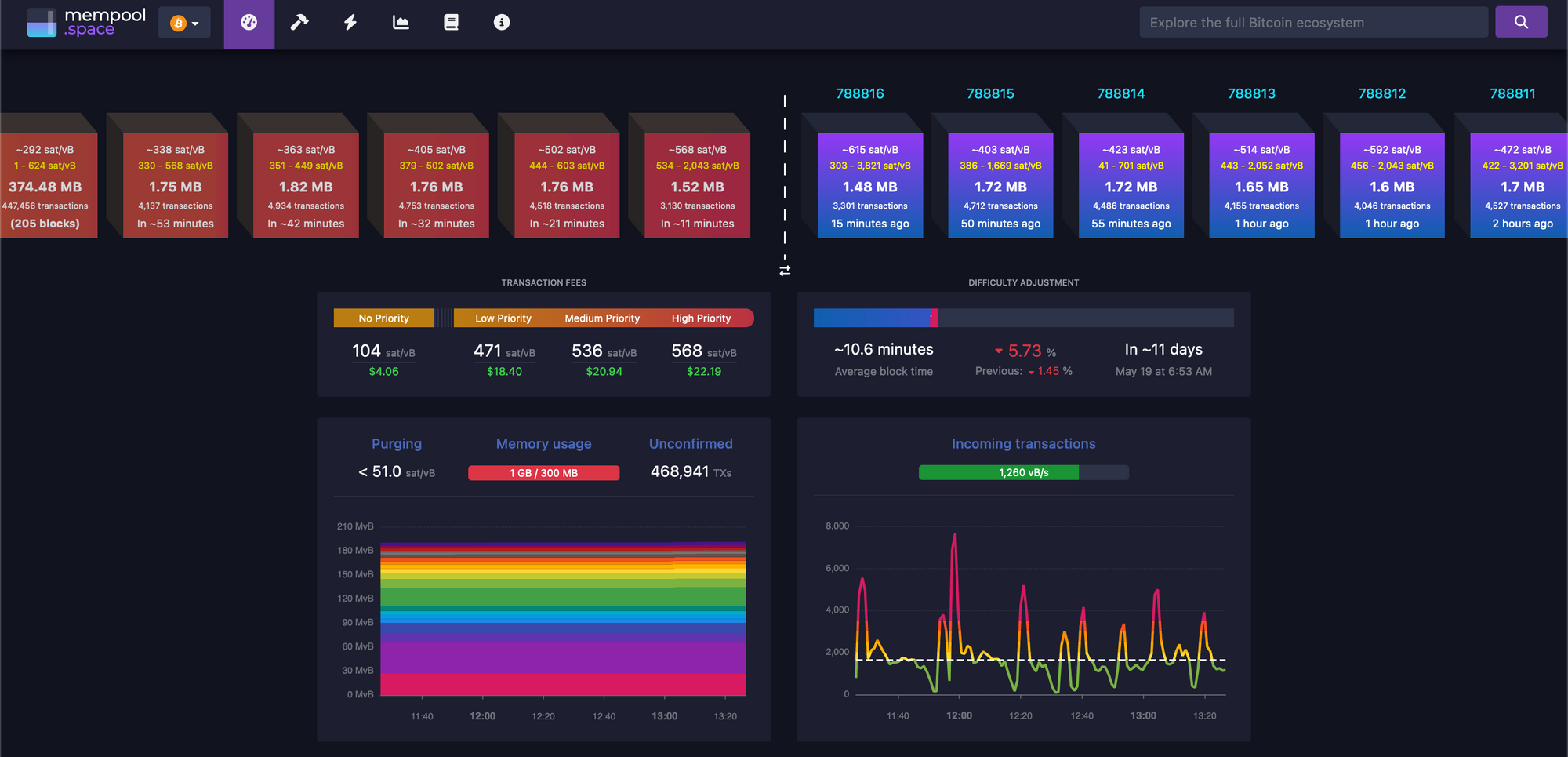
There must be a limit to how much data is transferred across the bitcoin network in order to keep the ability to run and use your own node accessible. A node is required to interact with the global bitcoin network - if you do not use your own node then you must trust someone else's node. If nodes become inaccessible to run then the network will centralize around the remaining entities that operate them - threatening the censorship resistance at the core of bitcoin's value prop. The bitcoin protocol uses three main mechanisms to keep node operation costs low - a fixed limit on the amount of data in each block, an automatic difficulty adjustment that regulates how many blocks are produced based on current mining hash rate, and a robust dynamic transaction fee market.
Bitcoin transaction fees limit network abuse by making usage expensive. There is a cost to every transaction, set by a dynamic free market based on demand for scarce block space. It is an incredibly robust way to prevent spam without relying on centralized entities that can be corrupted or pressured.
After the 2017 bitcoin fee spike we had six years of relative quiet to build tools that would be robust in a sustained high fee market. Fortunately our tools are significantly better now but many still need improvement. Most of the pain points we see today will be mitigated.
The reality is we were never going to be fully prepared - pressure is needed to show the pain points and provide strong incentives to mitigate them.
It will be incredibly interesting to watch how projects adapt under pressure. Optimistic we see great innovation here.
_If you are willing to wait for your transaction to confirm you can pay significantly lower fees. Learn best practices for reducing your fee burden here.
My guide for running and using your own bitcoin node can be found here._
If you found this post helpful support my work with bitcoin.

-
 @ 7f6db517:a4931eda
2025-06-15 22:02:42
@ 7f6db517:a4931eda
2025-06-15 22:02:42
Bank run on every crypto bank then bank run on every "real" bank.
— ODELL (@ODELL) December 14, 2022
Good morning.
It looks like PacWest will fail today. It will be both the fifth largest bank failure in US history and the sixth major bank to fail this year. It will likely get purchased by one of the big four banks in a government orchestrated sale.
March 8th - Silvergate Bank
March 10th - Silicon Valley Bank
March 12th - Signature Bank
March 19th - Credit Suisse
May 1st - First Republic Bank
May 4th - PacWest Bank?PacWest is the first of many small regional banks that will go under this year. Most will get bought by the big four in gov orchestrated sales. This has been the playbook since 2008. Follow the incentives. Massive consolidation across the banking industry. PacWest gonna be a drop in the bucket compared to what comes next.
First, a hastened government led bank consolidation, then a public/private partnership with the remaining large banks to launch a surveilled and controlled digital currency network. We will be told it is more convenient. We will be told it is safer. We will be told it will prevent future bank runs. All of that is marketing bullshit. The goal is greater control of money. The ability to choose how we spend it and how we save it. If you control the money - you control the people that use it.
If you found this post helpful support my work with bitcoin.

-
 @ dfa02707:41ca50e3
2025-06-15 22:02:37
@ dfa02707:41ca50e3
2025-06-15 22:02:37Contribute to keep No Bullshit Bitcoin news going.
-
Version 1.3 of Bitcoin Safe introduces a redesigned interactive chart, quick receive feature, updated icons, a mempool preview window, support for Child Pays For Parent (CPFP) and testnet4, preconfigured testnet demo wallets, as well as various bug fixes and improvements.
-
Upcoming updates for Bitcoin Safe include Compact Block Filters.
"Compact Block Filters increase the network privacy dramatically, since you're not asking an electrum server to give you your transactions. They are a little slower than electrum servers. For a savings wallet like Bitcoin Safe this should be OK," writes the project's developer Andreas Griffin.
- Learn more about the current and upcoming features of Bitcoin Safe wallet here.
What's new in v1.3
- Redesign of Chart, Quick Receive, Icons, and Mempool Preview (by @design-rrr).
- Interactive chart. Clicking on it now jumps to transaction, and selected transactions are now highlighted.
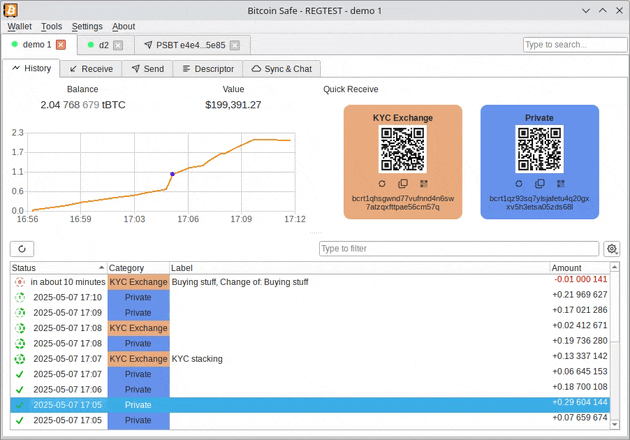
- Speed up transactions with Child Pays For Parent (CPFP).
- BDK 1.2 (upgraded from 0.32).
- Testnet4 support.
- Preconfigured Testnet demo wallets.
- Cluster unconfirmed transactions so that parents/children are next to each other.
- Customizable columns for all tables (optional view: Txid, Address index, and more)
- Bug fixes and other improvements.
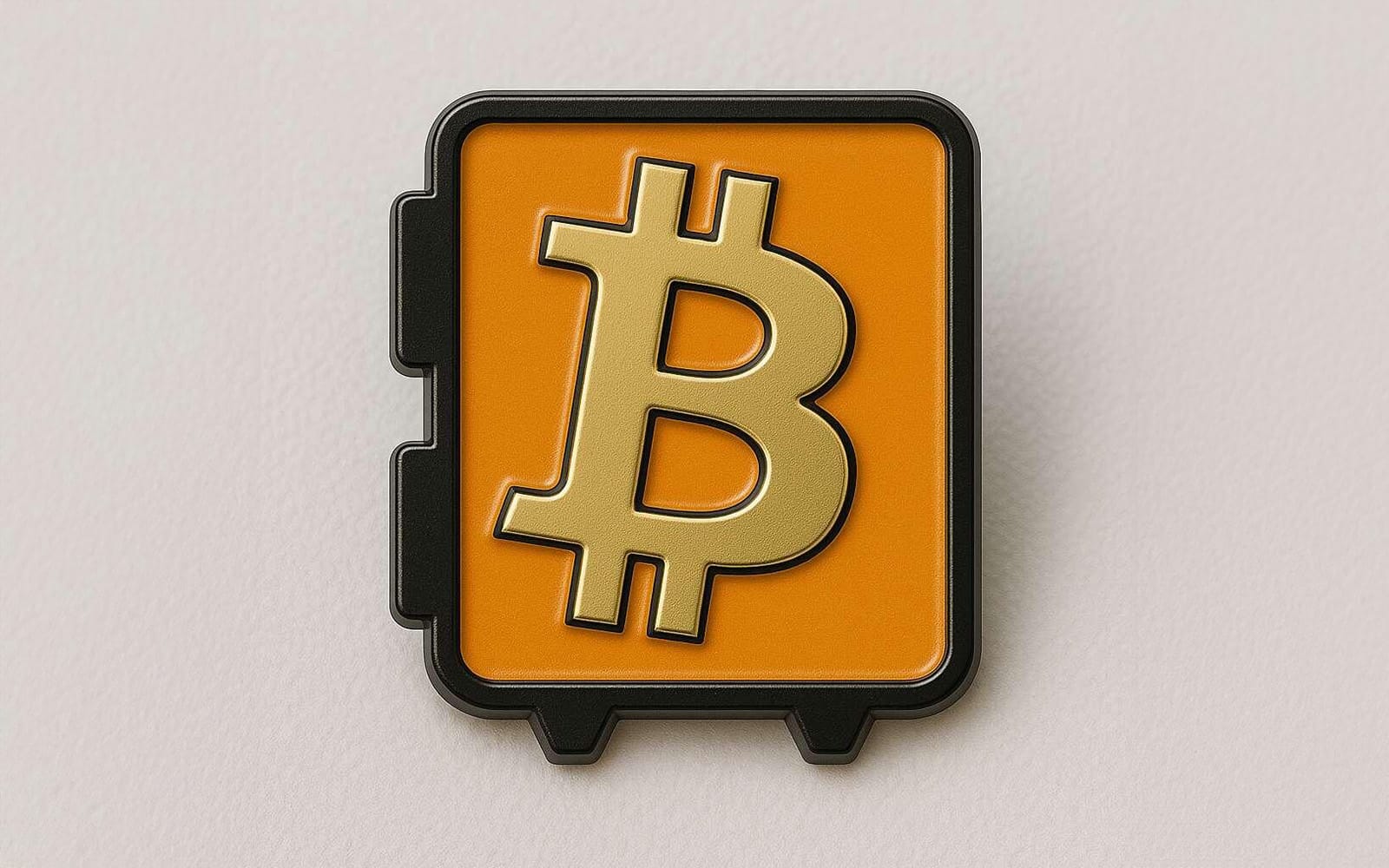
Announcement / Archive
Blog Post / Archive
GitHub Repo
Website -
-
 @ 39cc53c9:27168656
2025-06-15 14:46:32
@ 39cc53c9:27168656
2025-06-15 14:46:32Over the past few months, I've dedicated my time to a complete rewrite of the kycnot.me website. The technology stack remains unchanged; Golang paired with TailwindCSS. However, I've made some design choices in this iteration that I believe significantly enhance the site. Particularly to backend code.
UI Improvements
You'll notice a refreshed UI that retains the original concept but has some notable enhancements. The service list view is now more visually engaging, it displays additional information in a more aesthetically pleasing manner. Both filtering and searching functionalities have been optimized for speed and user experience.
Service pages have been also redesigned to highlight key information at the top, with the KYC Level box always accessible. The display of service attributes is now more visually intuitive.
The request form, especially the Captcha, has undergone substantial improvements. The new self-made Captcha is robust, addressing the reliability issues encountered with the previous version.
Terms of Service Summarizer
A significant upgrade is the Terms of Service summarizer/reviewer, now powered by AI (GPT-4-turbo). It efficiently condenses each service's ToS, extracting and presenting critical points, including any warnings. Summaries are updated monthly, processing over 40 ToS pages via the OpenAI API using a self-crafted and thoroughly tested prompt.
Nostr Comments
I've integrated a comment section for each service using Nostr. For guidance on using this feature, visit the dedicated how-to page.
Database
The backend database has transitioned to pocketbase, an open-source Golang backend that has been a pleasure to work with. I maintain an updated fork of the Golang SDK for pocketbase at pluja/pocketbase.
Scoring
The scoring algorithm has also been refined to be more fair. Despite I had considered its removal due to the complexity it adds (it is very difficult to design a fair scoring system), some users highlighted its value, so I kept it. The updated algorithm is available open source.
Listings
Each listing has been re-evaluated, and the ones that were no longer operational were removed. New additions are included, and the backlog of pending services will be addressed progressively, since I still have access to the old database.
API
The API now offers more comprehensive data. For more details, check here.
About Page
The About page has been restructured for brevity and clarity.
Other Changes
Extensive changes have been implemented in the server-side logic, since the whole code base was re-written from the ground up. I may discuss these in a future post, but for now, I consider the current version to be just a bit beyond beta, and additional updates are planned in the coming weeks.
-
 @ 7f6db517:a4931eda
2025-06-15 22:02:42
@ 7f6db517:a4931eda
2025-06-15 22:02:42
People forget Bear Stearns failed March 2008 - months of denial followed before the public realized how bad the situation was under the surface.
Similar happening now but much larger scale. They did not fix fundamental issues after 2008 - everything is more fragile.
The Fed preemptively bailed out every bank with their BTFP program and First Republic Bank still failed. The second largest bank failure in history.
There will be more failures. There will be more bailouts. Depositors will be "protected" by socializing losses across everyone.
Our President and mainstream financial pundits are currently pretending the banking crisis is over while most banks remain insolvent. There are going to be many more bank failures as this ponzi system unravels.
Unlike 2008, we have the ability to opt out of these broken and corrupt institutions by using bitcoin. Bitcoin held in self custody is unique in its lack of counterparty risk - you do not have to trust a bank or other centralized entity to hold it for you. Bitcoin is also incredibly difficult to change by design since it is not controlled by an individual, company, or government - the supply of dollars will inevitably be inflated to bailout these failing banks but bitcoin supply will remain unchanged. I do not need to convince you that bitcoin provides value - these next few years will convince millions.
If you found this post helpful support my work with bitcoin.

-
 @ 7f6db517:a4931eda
2025-06-15 22:02:41
@ 7f6db517:a4931eda
2025-06-15 22:02:41
I often hear "bitcoin doesn't interest me, I'm not a finance person."
Ironically, the beauty of sound money is you don't have to be. In the current system you're expected to manage a diversified investment portfolio or pay someone to do it. Bitcoin will make that optional.
— ODELL (@ODELL) September 16, 2018
At first glance bitcoin often appears overwhelming to newcomers. It is incredibly easy to get bogged down in the details of how it works or different ways to use it. Enthusiasts, such as myself, often enjoy going down the deep rabbit hole of the potential of bitcoin, possible pitfalls and theoretical scenarios, power user techniques, and the developer ecosystem. If your first touch point with bitcoin is that type of content then it is only natural to be overwhelmed. While it is important that we have a thriving community of bitcoiners dedicated to these complicated tasks - the true beauty of bitcoin lies in its simplicity. Bitcoin is simply better money. It is the best money we have ever had.
Life is complicated. Life is hard. Life is full of responsibility and surprises. Bitcoin allows us to focus on our lives while relying on a money that is simple. A money that is not controlled by any individual, company, or government. A money that cannot be easily seized or blocked. A money that cannot be devalued at will by a handful of corrupt bureaucrat who live hundreds of miles from us. A money that can be easily saved and should increase in purchasing power over time without having to learn how to "build a diversified stock portfolio" or hire someone to do it for us.
Bitcoin enables all of us to focus on our lives - our friends and family - doing what we love with the short time we have on this earth. Time is scarce. Life is complicated. Bitcoin is the most simple aspect of our complicated lives. If we spend our scarce time working then we should be able to easily save that accrued value for future generations without watching the news or understanding complicated financial markets. Bitcoin makes this possible for anyone.
Yesterday was Mother's Day. Raising a human is complicated. It is hard, it requires immense personal responsibility, it requires critical thinking, but mothers figure it out, because it is worth it. Using and saving bitcoin is simple - simply install an app on your phone. Every mother can do it. Every person can do it.
Life is complicated. Life is beautiful. Bitcoin is simple.
If you found this post helpful support my work with bitcoin.

-
 @ dfa02707:41ca50e3
2025-06-15 22:02:36
@ dfa02707:41ca50e3
2025-06-15 22:02:36Contribute to keep No Bullshit Bitcoin news going.
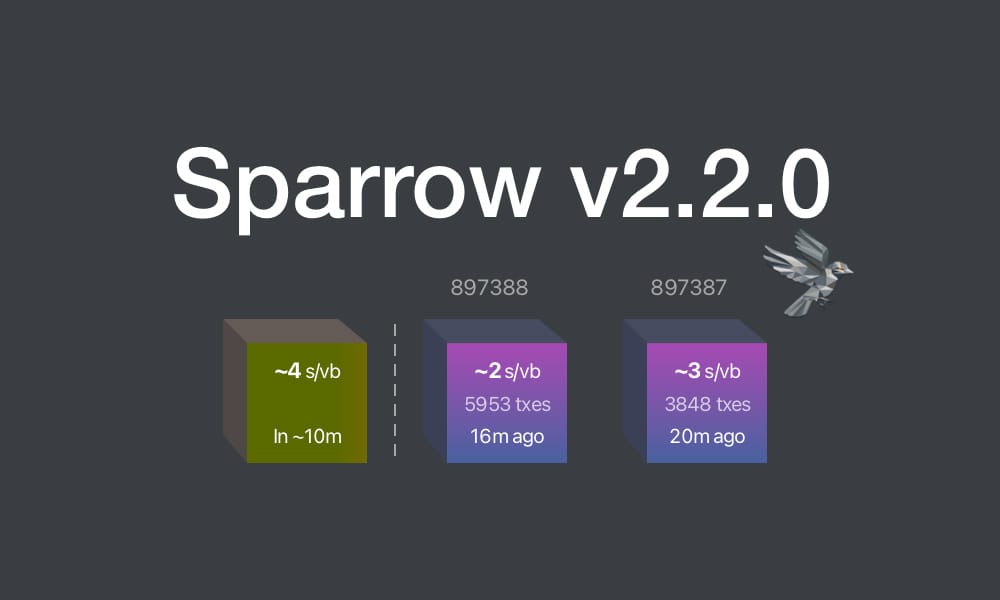
This update brings key enhancements for clarity and usability:
- Recent Blocks View: Added to the Send tab and inspired by Mempool's visualization, it displays the last 2 blocks and the estimated next block to help choose fee rates.
- Camera System Overhaul: Features a new library for higher resolution detection and mouse-scroll zoom support when available.
- Vector-Based Images: All app images are now vectorized and theme-aware, enhancing contrast, especially in dark mode.
- Tor & P2A Updates: Upgraded internal Tor and improved support for pay-to-anchor (P2A) outputs.
- Linux Package Rename: For Linux users, Sparrow has been renamed to sparrowwallet (or sparrowserver); in some cases, the original sparrow package may need manual removal.
- Additional updates include showing total payments in multi-payment transaction diagrams, better handling of long labels, and other UI enhancements.
- Sparrow v2.2.1 is a bug fix release that addresses missing UUID issue when starting Tor on recent macOS versions, icons for external sources in Settings and Recent Blocks view, repackaged
.debinstalls to use older gzip instead of zstd compression, and removed display of median fee rate where fee rates source is set to Server.
Learn how to get started with Sparrow wallet:
Release notes (v2.2.0)
- Added Recent Blocks view to Send tab.
- Converted all bitmapped images to theme aware SVG format for all wallet models and dialogs.
- Support send and display of pay to anchor (P2A) outputs.
- Renamed
sparrowpackage tosparrowwalletandsparrowserveron Linux. - Switched camera library to openpnp-capture.
- Support FHD (1920 x 1080) and UHD4k (3840 x 2160) capture resolutions.
- Support camera zoom with mouse scroll where possible.
- In the Download Verifier, prefer verifying the dropped file over the default file where the file is not in the manifest.
- Show a warning (with an option to disable the check) when importing a wallet with a derivation path matching another script type.
- In Cormorant, avoid calling the
listwalletdirRPC on initialization due to a potentially slow response on Windows. - Avoid server address resolution for public servers.
- Assume server address is non local for resolution failures where a proxy is configured.
- Added a tooltip to indicate truncated labels in table cells.
- Dynamically truncate input and output labels in the tree on a transaction tab, and add tooltips if necessary.
- Improved tooltips for wallet tabs and transaction diagrams with long labels.
- Show the address where available on input and output tooltips in transaction tab tree.
- Show the total amount sent in payments in the transaction diagram when constructing multiple payment transactions.
- Reset preferred table column widths on adjustment to improve handling after window resizing.
- Added accessible text to improve screen reader navigation on seed entry.
- Made Wallet Summary table grow horizontally with dialog sizing.
- Reduced tooltip show delay to 200ms.
- Show transaction diagram fee percentage as less than 0.01% rather than 0.00%.
- Optimized and reduced Electrum server RPC calls.
- Upgraded Bouncy Castle, PGPainless and Logback libraries.
- Upgraded internal Tor to v0.4.8.16.
- Bug fix: Fixed issue with random ordering of keystore origins on labels import.
- Bug fix: Fixed non-zero account script type detection when signing a message on Trezor devices.
- Bug fix: Fixed issue parsing remote Coldcard xpub encoded on a different network.
- Bug fix: Fixed inclusion of fees on wallet label exports.
- Bug fix: Increase Trezor device libusb timeout.
Linux users: Note that the
sparrowpackage has been renamed tosparrowwalletorsparrowserver, and in some cases you may need to manually uninstall the originalsparrowpackage. Look in the/optfolder to ensure you have the new name, and the original is removed.What's new in v2.2.1
- Updated Tor library to fix missing UUID issue when starting Tor on recent macOS versions.
- Repackaged
.debinstalls to use older gzip instead of zstd compression. - Removed display of median fee rate where fee rates source is set to Server.
- Added icons for external sources in Settings and Recent Blocks view
- Bug fix: Fixed issue in Recent Blocks view when switching fee rates source
- Bug fix: Fixed NPE on null fee returned from server
-
 @ dfa02707:41ca50e3
2025-06-15 22:02:36
@ dfa02707:41ca50e3
2025-06-15 22:02:36- This version introduces the Soroban P2P network, enabling Dojo to relay transactions to the Bitcoin network and share others' transactions to break the heuristic linking relaying nodes to transaction creators.
- Additionally, Dojo admins can now manage API keys in DMT with labels, status, and expiration, ideal for community Dojo providers like Dojobay. New API endpoints, including "/services" exposing Explorer, Soroban, and Indexer, have been added to aid wallet developers.
- Other maintenance updates include Bitcoin Core, Tor, Fulcrum, Node.js, plus an updated ban-knots script to disconnect inbound Knots nodes.
"I want to thank all the contributors. This again shows the power of true Free Software. I also want to thank everyone who donated to help Dojo development going. I truly appreciate it," said Still Dojo Coder.
What's new
- Soroban P2P network. For MyDojo (Docker setup) users, Soroban will be automatically installed as part of their Dojo. This integration allows Dojo to utilize the Soroban P2P network for various upcoming features and applications.
- PandoTx. PandoTx serves as a transaction transport layer. When your wallet sends a transaction to Dojo, it is relayed to a random Soroban node, which then forwards it to the Bitcoin network. It also enables your Soroban node to receive and relay transactions from others to the Bitcoin network and is designed to disrupt the assumption that a node relaying a transaction is closely linked to the person who initiated it.
- Pushing transactions through Soroban can be deactivated by setting
NODE_PANDOTX_PUSH=offindocker-node.conf. - Processing incoming transactions from Soroban network can be deactivated by setting
NODE_PANDOTX_PROCESS=offindocker-node.conf.
- Pushing transactions through Soroban can be deactivated by setting
- API key management has been introduced to address the growing number of people offering their Dojos to the community. Dojo admins can now access a new API management tab in their DMT, where they can create unlimited API keys, assign labels for easy identification, and set expiration dates for each key. This allows admins to avoid sharing their main API key and instead distribute specific keys to selected parties.
- New API endpoints. Several new API endpoints have been added to help API consumers develop features on Dojo more efficiently:
- New:
/latest-block- returns data about latest block/txout/:txid/:index- returns unspent output data/support/services- returns info about services that Dojo exposes
- Updated:
/tx/:txid- endpoint has been updated to return raw transaction with parameter?rawHex=1
- The new
/support/servicesendpoint replaces the deprecatedexplorerfield in the Dojo pairing payload. Although still present, API consumers should use this endpoint for explorer and other pairing data.
- New:
Other changes
- Updated ban script to disconnect inbound Knots nodes.
- Updated Fulcrum to v1.12.0.
- Regenerate Fulcrum certificate if expired.
- Check if transaction already exists in pushTx.
- Bump BTC-RPC Explorer.
- Bump Tor to v0.4.8.16, bump Snowflake.
- Updated Bitcoin Core to v29.0.
- Removed unnecessary middleware.
- Fixed DB update mechanism, added api_keys table.
- Add an option to use blocksdir config for bitcoin blocks directory.
- Removed deprecated configuration.
- Updated Node.js dependencies.
- Reconfigured container dependencies.
- Fix Snowflake git URL.
- Fix log path for testnet4.
- Use prebuilt addrindexrs binaries.
- Add instructions to migrate blockchain/fulcrum.
- Added pull policies.


Learn how to set up and use your own Bitcoin privacy node with Dojo here.
-
 @ eb0157af:77ab6c55
2025-06-15 22:02:29
@ eb0157af:77ab6c55
2025-06-15 22:02:29Connecticut halts all public investment in digital assets while other U.S. states move toward strategic bitcoin reserves.
Connecticut has taken a firm stance against digital assets by approving legislation that categorically prohibits all levels of state and local government from investing in Bitcoin and other cryptocurrencies.
On June 10, the Connecticut General Assembly published the final text of bill H.B. 7082, which has now become Public Act No. 25-66. The legislation was passed unanimously by both the House and the Senate, signaling bipartisan agreement on the need to keep public finances away from the cryptocurrency market.
The new law establishes an outright ban on government entities purchasing, holding, or investing in Bitcoin and other cryptocurrencies. It also prohibits the creation of any “virtual currency reserve” and the acceptance of crypto payments.
In addition to restrictions on the public sector, the State’s legislation introduces consumer protection measures for private individuals. Crypto businesses operating as Money Service Businesses will now be required to disclose all material risks associated with cryptocurrencies through “clear, conspicuous and legible writing in the English language.”
Another provision addresses the protection of minors: the new law mandates legal guardian verification for all users under the age of 18.
While Connecticut adopts a restrictive position toward digital assets, several other U.S. states are moving in the opposite direction. New Hampshire became the first state to pass a bill for a strategic bitcoin reserve, followed by Arizona.
The post Connecticut says no to Bitcoin: law approved banning state crypto reserves appeared first on Atlas21.
-
 @ 39cc53c9:27168656
2025-06-15 14:46:28
@ 39cc53c9:27168656
2025-06-15 14:46:28Bitcoin enthusiasts frequently and correctly remark how much value it adds to Bitcoin not to have a face, a leader, or a central authority behind it. This particularity means there isn't a single person to exert control over, or a single human point of failure who could become corrupt or harmful to the project.
Because of this, it is said that no other coin can be equally valuable as Bitcoin in terms of decentralization and trustworthiness. Bitcoin is unique not just for being first, but also because of how the events behind its inception developed. This implies that, from Bitcoin onwards, any coin created would have been created by someone, consequently having an authority behind it. For this and some other reasons, some people refer to Bitcoin as "The Immaculate Conception".
While other coins may have their own unique features and advantages, they may not be able to replicate Bitcoin's community-driven nature. However, one other cryptocurrency shares a similar story of mystery behind its creation: Monero.
History of Monero
Bytecoin and CryptoNote
In March 2014, a Bitcointalk thread titled "Bytecoin. Secure, private, untraceable since 2012" was initiated by a user under the nickname "DStrange"^1^. DStrange presented Bytecoin (BCN) as a unique cryptocurrency, in operation since July 2012. Unlike Bitcoin, it employed a new algorithm known as CryptoNote.
DStrange apparently stumbled upon the Bytecoin website by chance while mining a dying bitcoin fork, and decided to create a thread on Bitcointalk^1^. This sparked curiosity among some users, who wondered how could Bytecoin remain unnoticed since its alleged launch in 2012 until then^2^.
Some time after, a user brought up the "CryptoNote v2.0" whitepaper for the first time, underlining its innovative features^4^. Authored by the pseudonymous Nicolas van Saberhagen in October 2013, the CryptoNote v2 whitepaper^5^ highlighted the traceability and privacy problems in Bitcoin. Saberhagen argued that these flaws could not be quickly fixed, suggesting it would be more efficient to start a new project rather than trying to patch the original^5^, an statement simmilar to the one from Satoshi Nakamoto^6^.
Checking with Saberhagen's digital signature, the release date of the whitepaper seemed correct, which would mean that Cryptonote (v1) was created in 2012^7^, although there's an important detail: "Signing time is from the clock on the signer's computer" ^9^.
Moreover, the whitepaper v1 contains a footnote link to a Bitcointalk post dated May 5, 2013^10^, making it impossible for the whitepaper to have been signed and released on December 12, 2012.
As the narrative developed, users discovered that a significant 80% portion of Bytecoin had been pre-mined^11^ and blockchain dates seemed to be faked to make it look like it had been operating since 2012, leading to controversy surrounding the project.
The origins of CryptoNote and Bytecoin remain mysterious, leaving suspicions of a possible scam attempt, although the whitepaper had a good amount of work and thought on it.
The fork
In April 2014, the Bitcointalk user
thankful_for_today, who had also participated in the Bytecoin thread^12^, announced plans to launch a Bytecoin fork named Bitmonero^13^.The primary motivation behind this fork was "Because there is a number of technical and marketing issues I wanted to do differently. And also because I like ideas and technology and I want it to succeed"^14^. This time Bitmonero did things different from Bytecoin: there was no premine or instamine, and no portion of the block reward went to development.
However, thankful_for_today proposed controversial changes that the community disagreed with. Johnny Mnemonic relates the events surrounding Bitmonero and thankful_for_today in a Bitcointalk comment^15^:
When thankful_for_today launched BitMonero [...] he ignored everything that was discussed and just did what he wanted. The block reward was considerably steeper than what everyone was expecting. He also moved forward with 1-minute block times despite everyone's concerns about the increase of orphan blocks. He also didn't address the tail emission concern that should've (in my opinion) been in the code at launch time. Basically, he messed everything up. Then, he disappeared.
After disappearing for a while, thankful_for_today returned to find that the community had taken over the project. Johnny Mnemonic continues:
I, and others, started working on new forks that were closer to what everyone else was hoping for. [...] it was decided that the BitMonero project should just be taken over. There were like 9 or 10 interested parties at the time if my memory is correct. We voted on IRC to drop the "bit" from BitMonero and move forward with the project. Thankful_for_today suddenly resurfaced, and wasn't happy to learn the community had assumed control of the coin. He attempted to maintain his own fork (still calling it "BitMonero") for a while, but that quickly fell into obscurity.
The unfolding of these events show us the roots of Monero. Much like Satoshi Nakamoto, the creators behind CryptoNote/Bytecoin and thankful_for_today remain a mystery^17^, having disappeared without a trace. This enigma only adds to Monero's value.
Since community took over development, believing in the project's potential and its ability to be guided in a better direction, Monero was given one of Bitcoin's most important qualities: a leaderless nature. With no single face or entity directing its path, Monero is safe from potential corruption or harm from a "central authority".
The community continued developing Monero until today. Since then, Monero has undergone a lot of technological improvements, migrations and achievements such as RingCT and RandomX. It also has developed its own Community Crowdfundinc System, conferences such as MoneroKon and Monerotopia are taking place every year, and has a very active community around it.
Monero continues to develop with goals of privacy and security first, ease of use and efficiency second. ^16^
This stands as a testament to the power of a dedicated community operating without a central figure of authority. This decentralized approach aligns with the original ethos of cryptocurrency, making Monero a prime example of community-driven innovation. For this, I thank all the people involved in Monero, that lead it to where it is today.
If you find any information that seems incorrect, unclear or any missing important events, please contact me and I will make the necessary changes.
Sources of interest
- https://forum.getmonero.org/20/general-discussion/211/history-of-monero
- https://monero.stackexchange.com/questions/852/what-is-the-origin-of-monero-and-its-relationship-to-bytecoin
- https://en.wikipedia.org/wiki/Monero
- https://bitcointalk.org/index.php?topic=583449.0
- https://bitcointalk.org/index.php?topic=563821.0
- https://bitcointalk.org/index.php?action=profile;u=233561
- https://bitcointalk.org/index.php?topic=512747.0
- https://bitcointalk.org/index.php?topic=740112.0
- https://monero.stackexchange.com/a/1024
- https://inspec2t-project.eu/cryptocurrency-with-a-focus-on-anonymity-these-facts-are-known-about-monero/
- https://medium.com/coin-story/coin-perspective-13-riccardo-spagni-69ef82907bd1
- https://www.getmonero.org/resources/about/
- https://www.wired.com/2017/01/monero-drug-dealers-cryptocurrency-choice-fire/
- https://www.monero.how/why-monero-vs-bitcoin
- https://old.reddit.com/r/Monero/comments/u8e5yr/satoshi_nakamoto_talked_about_privacy_features/
-
 @ eb0157af:77ab6c55
2025-06-15 22:02:28
@ eb0157af:77ab6c55
2025-06-15 22:02:28The Russian government is preparing sanctions against those who violate mining regulations, with fines of up to $25,000.
The Ministry of Digital Development, Communications and Mass Media of the Russian Federation has drafted a bill introducing financial penalties and the seizure of cryptocurrencies for miners operating illegally.
The ministerial proposal, currently under interdepartmental review according to Forbes Russia, would grant judicial authorities extraordinary powers over the mining sector. Courts would be able not only to impose financial penalties but also to directly confiscate illegally mined bitcoins.
Fines will follow a progressive scale:
- private individuals: 100,000 to 200,000 rubles ($1,272–$2,544);
- individual entrepreneurs and public officials: 200,000 to 400,000 rubles ($2,544–$5,088);
- companies and corporations: 1 million to 2 million rubles ($12,728–$25,456).
Crackdown on mining pools
Another aspect of the proposed legislation concerns mining pools. If approved, the bill would introduce penalties for those participating in such groups illegally. The government strategy aims to amend the Code of Administrative Offenses, effectively turning illegal mining into a criminal offense with harsher consequences than current administrative fines.
Crypto payments under scrutiny
Beyond mining operations, the new provisions would also target the use of cryptocurrencies as a means of payment outside the official sandbox managed by Russia’s Central Bank. Sanctions for this violation could reach 1 million rubles ($12,728).
Andrey Medvedev, Head of the Legal Department at the Central Bank, emphasized during the St. Petersburg International Legal Forum that “[crypto] illegally used as a means of payment will be confiscated.”
Regional restrictions on mining
Under current Russian regulations, unregistered citizens are allowed to mine domestically provided their energy consumption does not exceed 6,000 kWh per month. However, about ten Russian regions and territories under Russian control maintain specific restrictions.
Operators of mining infrastructures — primarily data center and hosting service providers — will be required to report operational details to Rosfinmonitoring, the national financial intelligence agency, including wallet addresses used at their facilities.
While penalties are tightening, the government recently chose not to extend mining bans to new regions. The government’s energy commission, chaired by Deputy Prime Minister Alexander Novak, rejected a proposal to ban mining in Khakassia and postponed annual restrictions in Zabaikalsky Krai and Buryatia. However, Moscow has approved a one-year mining ban in the southern part of the Irkutsk region, widely considered the de facto capital of Russian mining.
The post Mining in Russia: fines and asset seizures for illegal operations appeared first on Atlas21.
-
 @ eb0157af:77ab6c55
2025-06-15 22:02:27
@ eb0157af:77ab6c55
2025-06-15 22:02:27Ukraine is opening the door to Bitcoin in its national reserves with a draft bill that would give the Central Bank the right to purchase digital assets.
Ukrainian lawmakers have introduced a legislative proposal that could allow the country’s Central Bank to include Bitcoin and other digital currencies in its national reserves.
The bill, filed on June 10 and registered as No. 13356, was put forward by a group of deputies led by Yaroslav Zheleznyak from the Holos party. The proposal calls for amendments to the Law on the National Bank of Ukraine, aiming to authorize the NBU (National Bank of Ukraine) to hold digital assets alongside gold and foreign currencies.

Source: Verkhovna Rada
The bill doesn’t require the Central Bank to invest in cryptocurrencies — it simply grants it the authority to do so. Zheleznyak stated:
“With this bill, we authorize the National Bank of Ukraine to include digital assets in the country’s reserves. However, decisions regarding the timing, methods, and volumes of such inclusion are left entirely at the discretion of the Central Bank.”
According to Zheleznyak, “proper management of crypto reserves will help strengthen macroeconomic stability and create new opportunities for the digital economy’s development.”
In a video discussion with Kirill Khomyakov, regional head of Binance for Central and Eastern Europe, Zheleznyak highlighted the growing international interest in cryptocurrencies as reserve assets, citing countries like the United States, El Salvador, Switzerland, and Brazil as examples of jurisdictions moving toward strategic bitcoin reserves.
The draft bill has been submitted to the Ukrainian Parliament, the Verkhovna Rada, and is now awaiting further consideration. If approved, Ukraine could become the first European country to officially hold bitcoin as a state asset.
The post Ukraine: draft bill to include bitcoin in Central Bank reserves appeared first on Atlas21.
-
 @ 39cc53c9:27168656
2025-06-15 14:46:22
@ 39cc53c9:27168656
2025-06-15 14:46:22“The future is there... staring back at us. Trying to make sense of the fiction we will have become.” — William Gibson.
This month is the 4th anniversary of kycnot.me. Thank you for being here.
Fifteen years ago, Satoshi Nakamoto introduced Bitcoin, a peer-to-peer electronic cash system: a decentralized currency free from government and institutional control. Nakamoto's whitepaper showed a vision for a financial system based on trustless transactions, secured by cryptography. Some time forward and KYC (Know Your Customer), AML (Anti-Money Laundering), and CTF (Counter-Terrorism Financing) regulations started to come into play.
What a paradox: to engage with a system designed for decentralization, privacy, and independence, we are forced to give away our personal details. Using Bitcoin in the economy requires revealing your identity, not just to the party you interact with, but also to third parties who must track and report the interaction. You are forced to give sensitive data to entities you don't, can't, and shouldn't trust. Information can never be kept 100% safe; there's always a risk. Information is power, who knows about you has control over you.
Information asymmetry creates imbalances of power. When entities have detailed knowledge about individuals, they can manipulate, influence, or exploit this information to their advantage. The accumulation of personal data by corporations and governments enables extensive surveillances.
Such practices, moreover, exclude individuals from traditional economic systems if their documentation doesn't meet arbitrary standards, reinforcing a dystopian divide. Small businesses are similarly burdened by the costs of implementing these regulations, hindering free market competition^1:
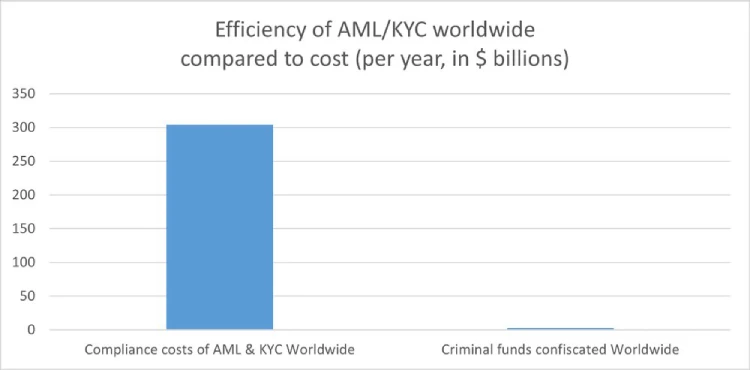
How will they keep this information safe? Why do they need my identity? Why do they force businesses to enforce such regulations? It's always for your safety, to protect you from the "bad". Your life is perpetually in danger: terrorists, money launderers, villains... so the government steps in to save us.
‟Hush now, baby, baby, don't you cry Mamma's gonna make all of your nightmares come true Mamma's gonna put all of her fears into you Mamma's gonna keep you right here, under her wing She won't let you fly, but she might let you sing Mamma's gonna keep baby cosy and warm” — Mother, Pink Floyd
We must resist any attack on our privacy and freedom. To do this, we must collaborate.
If you have a service, refuse to ask for KYC; find a way. Accept cryptocurrencies like Bitcoin and Monero. Commit to circular economies. Remove the need to go through the FIAT system. People need fiat money to use most services, but we can change that.
If you're a user, donate to and prefer using services that accept such currencies. Encourage your friends to accept cryptocurrencies as well. Boycott FIAT system to the greatest extent you possibly can.
This may sound utopian, but it can be achieved. This movement can't be stopped. Go kick the hornet's nest.
“We must defend our own privacy if we expect to have any. We must come together and create systems which allow anonymous transactions to take place. People have been defending their own privacy for centuries with whispers, darkness, envelopes, closed doors, secret handshakes, and couriers. The technologies of the past did not allow for strong privacy, but electronic technologies do.” — Eric Hughes, A Cypherpunk's Manifesto
The anniversary
Four years ago, I began exploring ways to use crypto without KYC. I bookmarked a few favorite services and thought sharing them to the world might be useful. That was the first version of kycnot.me — a simple list of about 15 services. Since then, I've added services, rewritten it three times, and improved it to what it is now.
kycnot.me has remained 100% independent and 100% open source^2 all these years. I've received offers to buy the site, all of which I have declined and will continue to decline. It has been DDoS attacked many times, but we made it through. I have also rewritten the whole site almost once per year (three times in four years).
The code and scoring algorithm are open source (contributions are welcome) and I can't arbitrarly change a service's score without adding or removing attributes, making any arbitrary alterations obvious if they were fake. You can even see the score summary for any service's score.
I'm a one-person team, dedicating my free time to this project. I hope to keep doing so for many more years. Again, thank you for being part of this.
-
 @ 8bad92c3:ca714aa5
2025-06-15 22:02:33
@ 8bad92c3:ca714aa5
2025-06-15 22:02:33Key Takeaways

Michael Goldstein, aka Bitstein, presents a sweeping philosophical and economic case for going “all in” on Bitcoin, arguing that unlike fiat, which distorts capital formation and fuels short-term thinking, Bitcoin fosters low time preference, meaningful saving, and long-term societal flourishing. At the heart of his thesis is “hodling for good”—a triple-layered idea encompassing permanence, purpose, and the pursuit of higher values like truth, beauty, and legacy. Drawing on thinkers like Aristotle, Hoppe, and Josef Pieper, Goldstein redefines leisure as contemplation, a vital practice in aligning capital with one’s deepest ideals. He urges Bitcoiners to think beyond mere wealth accumulation and consider how their sats can fund enduring institutions, art, and architecture that reflect a moral vision of the future.
Best Quotes
“Let BlackRock buy the houses, and you keep the sats.”
“We're not hodling just for the sake of hodling. There is a purpose to it.”
“Fiat money shortens your time horizon… you can never rest.”
“Savings precedes capital accumulation. You can’t build unless you’ve saved.”
“You're increasing the marginal value of everyone else’s Bitcoin.”
“True leisure is contemplation—the pursuit of the highest good.”
“What is Bitcoin for if not to make the conditions for magnificent acts of creation possible?”
“Bitcoin itself will last forever. Your stack might not. What will outlast your coins?”
“Only a whale can be magnificent.”
“The market will sell you all the crack you want. It’s up to you to demand beauty.”
Conclusion
This episode is a call to reimagine Bitcoin as more than a financial revolution—it’s a blueprint for civilizational renewal. Michael Goldstein reframes hodling as an act of moral stewardship, urging Bitcoiners to lower their time preference, build lasting institutions, and pursue truth, beauty, and legacy—not to escape the world, but to rebuild it on sound foundations.
Timestamps
00:00 - Intro
00:50 - Michael’s BBB presentation Hodl for Good
07:27 - Austrian principles on capital
15:40 - Fiat distorts the economic process
23:34 - Bitkey
24:29 - Hodl for Good triple entendre
29:52 - Bitcoin benefits everyone
39:05 - Unchained
40:14 - Leisure theory of value
52:15 - Heightening life
1:15:48 - Breaking from the chase makes room for magnificence
1:32:32 - Nakamoto Institute’s missionTranscript
(00:00) Fiat money is by its nature a disturbance. If money is being continually produced, especially at an uncertain rate, these uh policies are really just redistribution of wealth. Most are looking for number to go up post hyper bitcoinization. The rate of growth of bitcoin would be more reflective of the growth of the economy as a whole.
(00:23) Ultimately, capital requires knowledge because it requires knowing there is something that you can add to the structures of production to lengthen it in some way that will take time but allow you to have more in the future than you would today. Let Black Rockck buy the houses and you keep the sats, not the other way around.
(00:41) You wait until later for Larry Frink to try to sell you a [Music] mansion. And we're live just like that. Just like that. 3:30 on a Friday, Memorial Day weekend. It's a good good good way to end the week and start the holiday weekend. Yes, sir. Yes, sir. Thank you for having me here. Thank you for coming. I wore this hat specifically because I think it's I think it's very apppropo uh to the conversation we're going to have which is I hope an extension of the presentation you gave at Bitblock Boom Huddle for good. You were working on
(01:24) that for many weeks leading up to uh the conference and explaining how you were structuring it. I think it's a very important topic to discuss now as the Bitcoin price is hitting new all-time highs and people are trying to understand what am I doing with Bitcoin? Like you have you have the different sort of factions within Bitcoin.
(01:47) Uh get on a Bitcoin standard, get on zero, spend as much Bitcoin as possible. You have the sailors of the world are saying buy Bitcoin, never sell, die with your Bitcoin. And I think you do a really good job in that presentation. And I just think your understanding overall of Bitcoin is incredible to put everything into context. It's not either or.
(02:07) It really depends on what you want to accomplish. Yeah, it's definitely there there is no actual one-sizefits-all um for I mean nearly anything in this world. So um yeah, I mean first of all I mean there was it was the first conference talk I had given in maybe five years. I think the one prior to that uh was um bit block boom 2019 which was my meme talk which uh has uh become infamous and notorious.
(02:43) So uh there was also a lot of like high expectations uh you know rockstar dev uh has has treated that you know uh that that talk with a lot of reference. a lot of people have enjoyed it and he was expecting this one to be, you know, the greatest one ever, which is a little bit of a little bit of a uh a burden to live up to those kinds of standards.
(03:08) Um, but you know, because I don't give a lot of talks. Um, you know, I I I like to uh try to bring ideas that might even be ideas that are common. So, something like hodling, we all talk about it constantly. uh but try to bring it from a little bit of a different angle and try to give um a little bit of uh new light to it.
(03:31) I alsove I've I've always enjoyed kind of coming at things from a third angle. Um whenever there's, you know, there's there's all these little debates that we have in in Bitcoin and sometimes it's nice to try to uh step out of it and look at it a little more uh kind of objectively and find ways of understanding it that incorporate the truths of of all of them.
(03:58) uh you know cuz I think we should always be kind of as much as possible after ultimate truth. Um so with this one um yeah I was kind of finding that that sort of golden mean. So uh um yeah and I actually I think about that a lot is uh you know Aristotle has his his concept of the golden mean. So it's like any any virtue is sort of between two vices um because you can you can always you can always take something too far.
(04:27) So you're you're always trying to find that right balance. Um so someone who is uh courageous you know uh one of the vices uh on one side is being basically reckless. I I can't remember what word he would use. Uh but effectively being reckless and just wanting to put yourself in danger for no other reason than just you know the thrill of it.
(04:50) Um and then on the other side you would just have cowardice which is like you're unwilling to put yourself um at any risk at any time. Um, and courage is right there in the middle where it's understanding when is the right time uh to put your put yourself, you know, in in the face of danger um and take it on. And so um in some sense this this was kind of me uh in in some ways like I'm obviously a partisan of hodling.
(05:20) Um, I've for, you know, a long time now talked about the, um, why huddling is good, why people do it, why we should expect it. Um, but still trying to find that that sort of golden mean of like yes, huddle, but also what are we hodling for? And it's not we're we're not hodddling just merely for the sake of hodddling.
(05:45) There there is a a purpose to it. And we should think about that. And that would also help us think more about um what are the benefits of of spending, when should we spend, why should we spend, what should we spend on um to actually give light to that sort of side of the debate. Um so that was that was what I was kind of trying to trying to get into.
(06:09) Um, as well as also just uh at the same time despite all the talk of hodling, there's always this perennial uh there's always this perennial dislike of hodlers because we're treated as uh as if um we're just free riding the network or we're just greedy or you know any of these things. And I wanted to show how uh huddling does serve a real economic purpose.
(06:36) Um, and it does benefit the individual, but it also does uh it it has actual real social um benefits as well beyond merely the individual. Um, so I wanted to give that sort of defense of hodling as well to look at it from um a a broader position than just merely I'm trying to get rich. Um uh because even the person who uh that is all they want to do um just like you know your your pure number grow up go up moonboy even that behavior has positive ramifications on on the economy.
(07:14) And while we might look at them and have uh judgments about their particular choices for them as an individual, we shouldn't discount that uh their actions are having positive positive effects for the rest of the economy. Yeah. So, let's dive into that just not even in the context of Bitcoin because I think you did a great job of this in the presentation.
(07:36) just you've done a good job of this consistently throughout the years that I've known you. Just from like a first principles Austrian economics perspective, what is the idea around capital accumulation, low time preference and deployment of that capital like what what like getting getting into like the nitty-gritty and then applying it to Bitcoin? Yeah, it's it's a big question and um in many ways I mean I I even I barely scratched the surface.
(08:05) uh I I can't claim to have read uh all the volumes of Bombber works, you know, capital and interest and and stuff like that. Um but I think there's some some sort of basic concepts that we can look at that we can uh draw a lot out. Um the first uh I guess let's write that. So repeat so like capital time preference. Yeah. Well, I guess getting more broad like why sav -
 @ 7f6db517:a4931eda
2025-06-15 22:02:41
@ 7f6db517:a4931eda
2025-06-15 22:02:41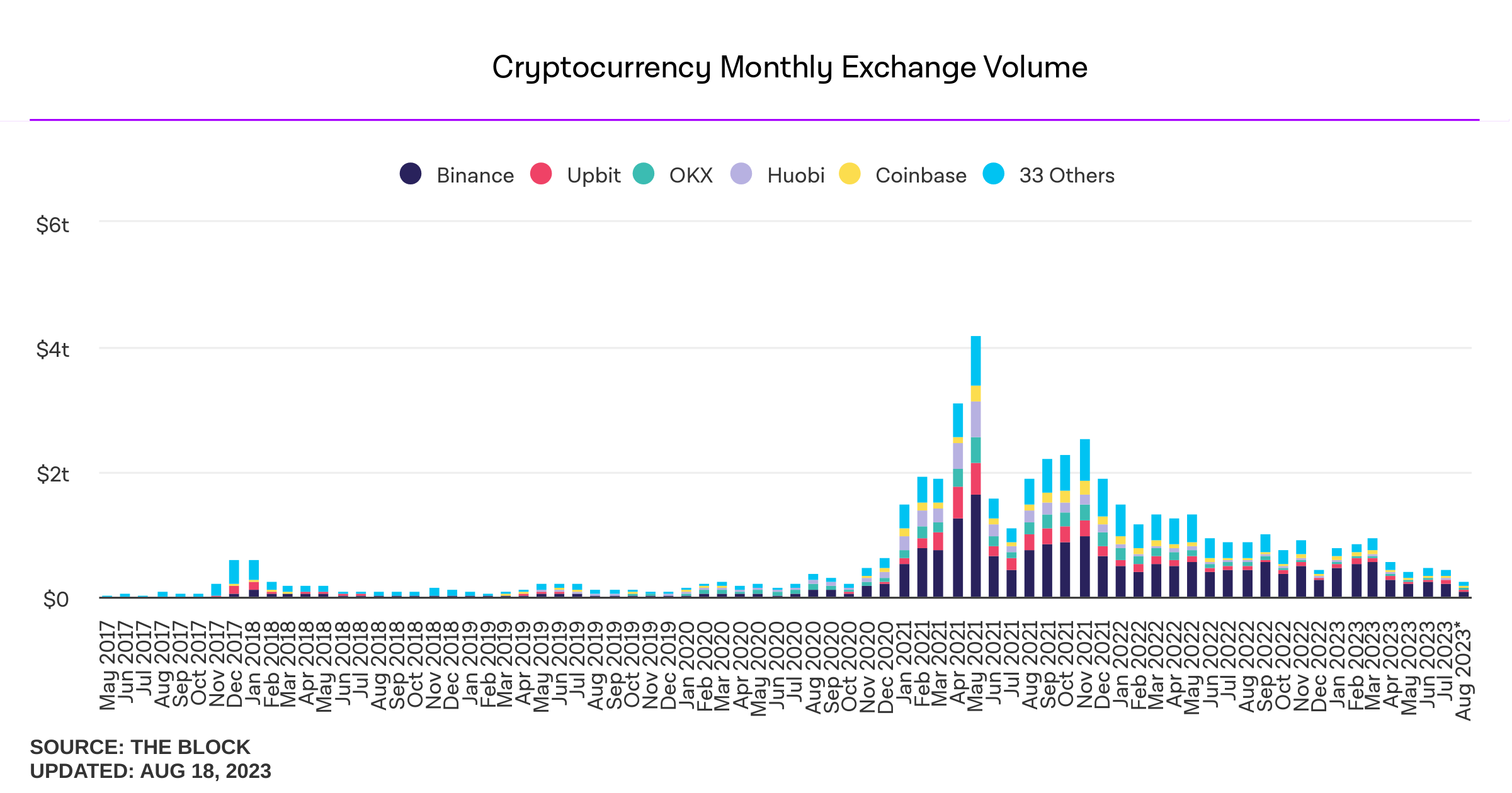
Influencers would have you believe there is an ongoing binance bank run but bitcoin wallet data says otherwise.
- binance wallets are near all time highs
- bitfinex wallets are also trending up
- gemini and coinbase are being hit with massive withdrawals thoughYou should not trust custodians, they can rug you without warning. It is incredibly important you learn how to hold bitcoin yourself, but also consider not blindly trusting influencers with a ref link to shill you.
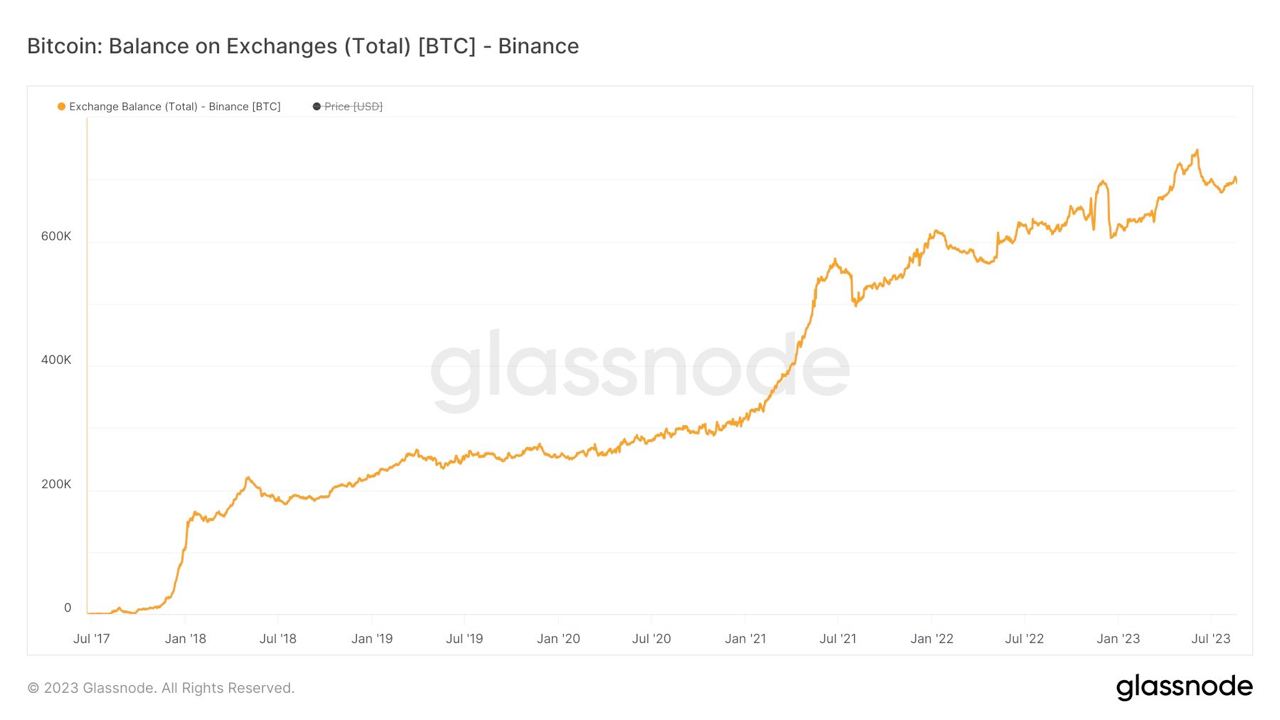
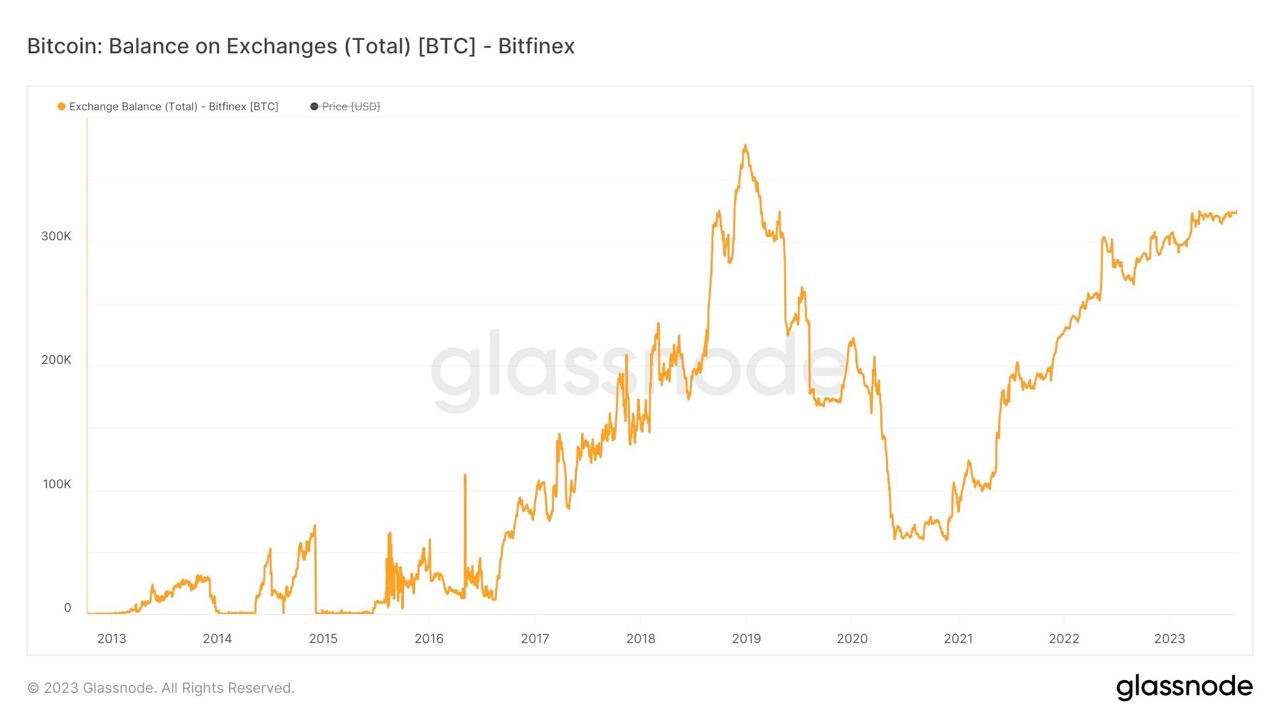
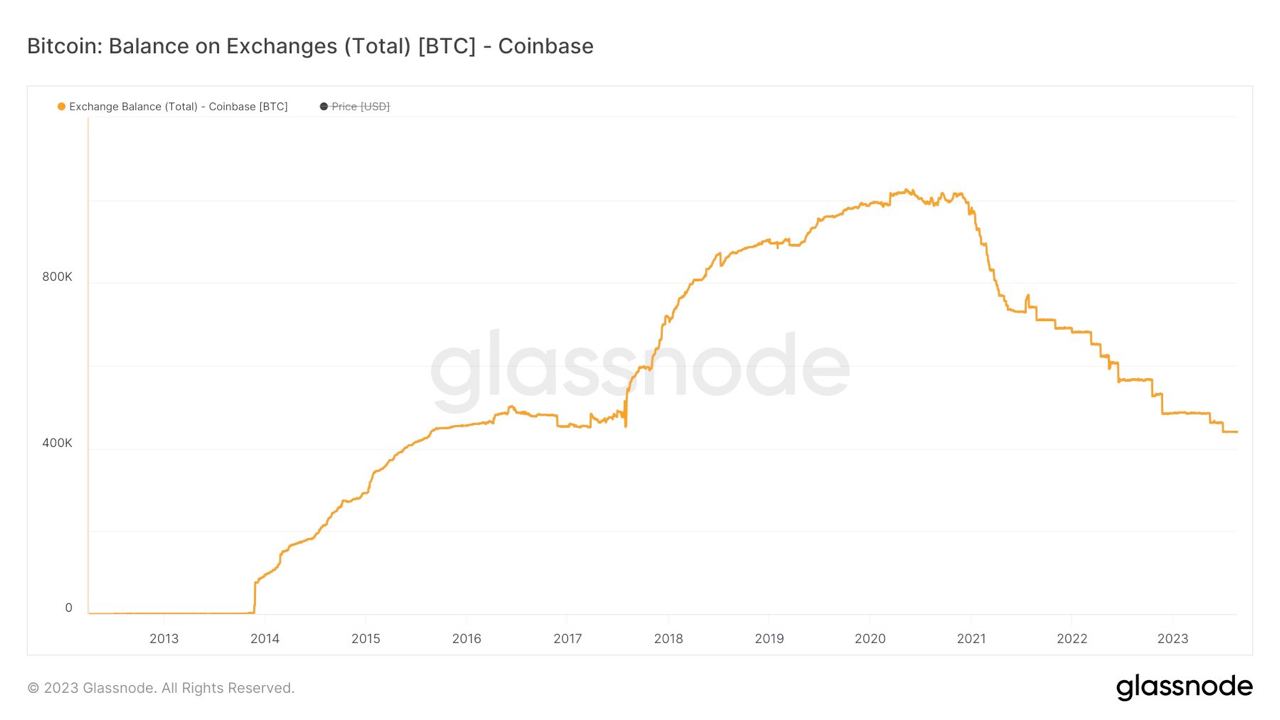
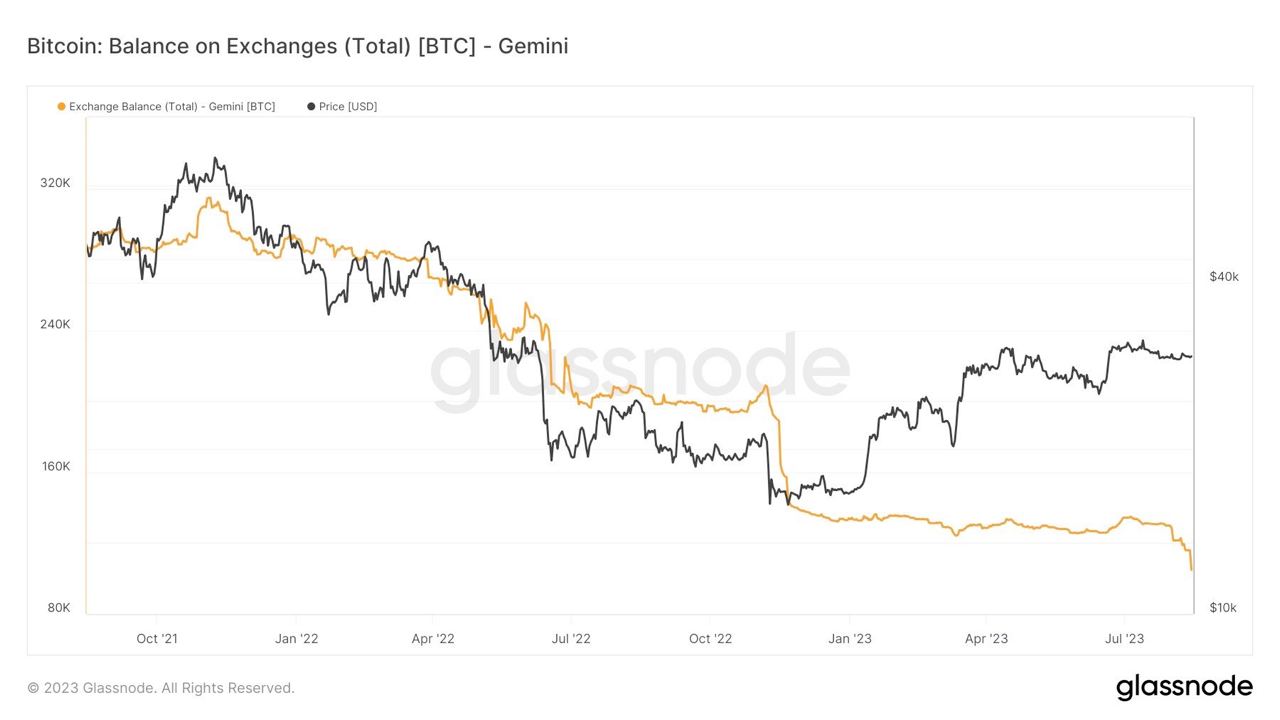
If you found this post helpful support my work with bitcoin.

-
 @ eb0157af:77ab6c55
2025-06-15 22:02:26
@ eb0157af:77ab6c55
2025-06-15 22:02:26The involvement of America’s largest corporations with stablecoins has reached 29%.
According to the latest State of Crypto report published by Coinbase, interest in stablecoins among Fortune 500 executives has seen a significant surge, rising from 8% in 2024 to 29% in 2025.
The study, based on a sample of 100 executives from the 500 highest-revenue U.S. companies, reveals that nearly three in ten said their organization is either planning or seriously considering integrating stablecoins into their business processes.
The growing interest is mainly driven by inefficiencies in traditional payment systems. The executives surveyed identified slow transaction speeds and high fees as the main drawbacks of conventional payment methods.
The survey also found that 7% of Fortune 500 companies are already actively using or holding stablecoins in their corporate wallets.
And it’s not just large corporations getting on board. The study also surveyed 251 financial decision-makers at small and medium-sized businesses with fewer than 500 employees. Among them, 81% expressed interest in using stablecoins — a sharp rise from 61% the previous year. Meanwhile, 46% of these businesses plan to integrate cryptocurrencies into their operations within the next three years.
Transaction volume data confirms this growing interest. Stablecoins have seen significant monthly spikes, with $719 billion in December 2024 and $717 billion in April 2025.
Over the course of 2024, total stablecoin transaction volumes reached $27.6 trillion, surpassing the combined transaction volumes of Visa and Mastercard by 7.7%. At the same time, the number of stablecoin holders surpassed 161 million users as of May 2025, according to Coinbase.
The post Stablecoins: interest from major U.S. companies grows 260% in a year appeared first on Atlas21.
-
 @ eb0157af:77ab6c55
2025-06-15 22:02:25
@ eb0157af:77ab6c55
2025-06-15 22:02:25A third of the bitcoins in circulation is now under the control of centralized entities, valued at $668 billion according to an analysis by Gemini.
A study conducted by Gemini in collaboration with Glassnode revealed that centralized actors currently hold 30.9% of bitcoin’s entire circulating supply.
These entities include national governments, exchange-traded funds (ETFs), and publicly listed companies. Collectively, these players control 6.1 million BTC, equivalent to approximately $668 billion at current market prices. BlackRock alone holds around 665,635 BTC through its iShares Bitcoin Trust (IBIT) ETF, representing over 3% of bitcoin’s total supply, with a value close to $73 billion.

Source: Gemini
The accumulation of bitcoin by such entities has grown by 924% over the past decade. This increase coincides with bitcoin’s price evolution, which has surged from under $1,000 to over $100,000 during the same period.
Analysts interpret this trend as further confirmation that institutions increasingly view bitcoin as a strategic store-of-value asset. According to the report, the correlation between the rise in institutional holdings and bitcoin’s price appreciation reinforces the case for the cryptocurrency’s mainstream adoption.
One key takeaway from the research concerns the predominant role of centralized exchanges within Bitcoin treasury holdings. These platforms hold about half of the total, although a significant portion of those funds actually belongs to retail clients and individual investors.
Government bitcoin treasuries display distinctive characteristics compared to other institutional holders. According to the study, sovereign wallets show infrequent movements and limited correlation with Bitcoin’s price cycles.
However, the amount of bitcoins held by these governments remains large enough to significantly influence the markets whenever sales or transfers occur, the report states. The governments of the United States, China, and the United Kingdom have acquired most of their bitcoins through legal actions (seizures) rather than direct market purchases. In contrast, El Salvador and Bhutan accumulate bitcoin through intentional and ongoing purchases. According to analysts, while the volumes involved are smaller, these strategic allocations signal a long-term commitment and bolster investor confidence, encouraging broader institutional participation and contributing to market stability.
The research concludes that with nearly a third of bitcoin’s circulating supply now held by centralized entities, the market has undergone a structural transformation toward institutional maturity. According to the authors of the report, this evolution has made price action more predictable and less vulnerable to the speculative extremes that characterized Bitcoin’s early years.
The post Report: centralized entities control 31% of bitcoin’s total supply appeared first on Atlas21.
-
 @ eb0157af:77ab6c55
2025-06-15 22:02:24
@ eb0157af:77ab6c55
2025-06-15 22:02:24French authorities are intensifying their fight against kidnappings related to the digital asset sector with a new series of arrests.
French law enforcement has made further arrests in an investigation concerning a kidnapping case connected to the cryptocurrency world. According to the public broadcaster France 24, on June 11 several individuals suspected of involvement in the abduction of the father of a crypto entrepreneur were detained.
The case that drew international attention involves the father of an anonymous crypto entrepreneur, who was held captive for several days on an isolated property. The criminals, in their ransom demands, went as far as to cut off one of the victim’s fingers as a form of psychological pressure, demanding up to €7 million (about $8 million) for his release.
The rescue operation, carried out on May 3 by French special forces, led to the victim’s liberation and the arrest of five people on site. However, investigations uncovered a wider criminal network, resulting in new arrests, the exact number of which has not yet been disclosed by authorities.
French authorities did not limit their actions to national territory. On June 4, a man suspected to be a key figure behind the series of crypto kidnappings in France was arrested in Morocco.
The escalation of crypto kidnappings in 2025
Data shows an increase in crypto-related kidnappings in France and worldwide. The phenomenon has grown to such proportions that French Interior Minister Bruno Retailleau convened an emergency meeting to address the issue.
Among the most notable cases of 2025 is the attempted daytime kidnapping of Pierre Noizat’s daughter and grandson. Noizat is the co-founder and CEO of the French exchange Paymium; the incident took place on May 13.
According to data from Jameson Lopp, co-founder of Casa, at least 29 personal attacks against cryptocurrency holders have been recorded in 2025 alone. If this trend continues, the annual total could surpass the 35 cases reported in 2024 and the 24 cases in 2023.
The post France: new arrests linked to crypto kidnappings appeared first on Atlas21.
-
 @ 7f6db517:a4931eda
2025-06-15 22:02:41
@ 7f6db517:a4931eda
2025-06-15 22:02:41Will not live in a pod.
Will not eat the bugs.
Will not get the chip.
Will not get a blue check.
Will not use CBDCs.Live Free or Die.
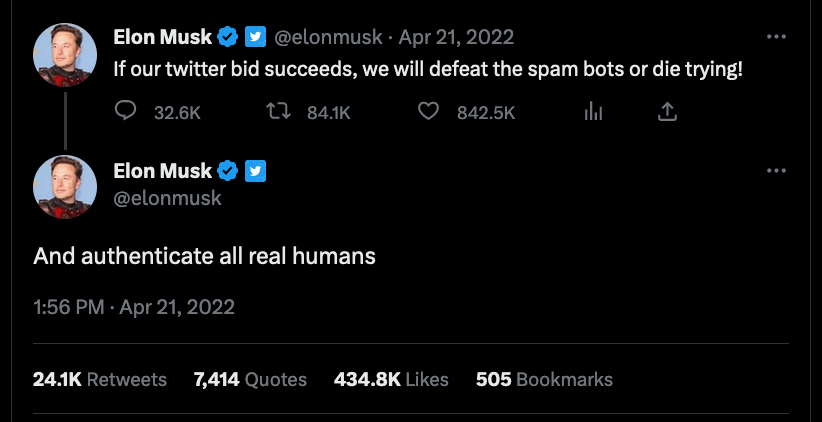
Why did Elon buy twitter for $44 Billion? What value does he see in it besides the greater influence that undoubtedly comes with controlling one of the largest social platforms in the world? We do not need to speculate - he made his intentions incredibly clear in his first meeting with twitter employees after his takeover - WeChat of the West.
To those that do not appreciate freedom, the value prop is clear - WeChat is incredibly powerful and successful in China.
To those that do appreciate freedom, the concern is clear - WeChat has essentially become required to live in China, has surveillance and censorship integrated at its core, and if you are banned from the app your entire livelihood is at risk. Employment, housing, payments, travel, communication, and more become extremely difficult if WeChat censors determine you have acted out of line.
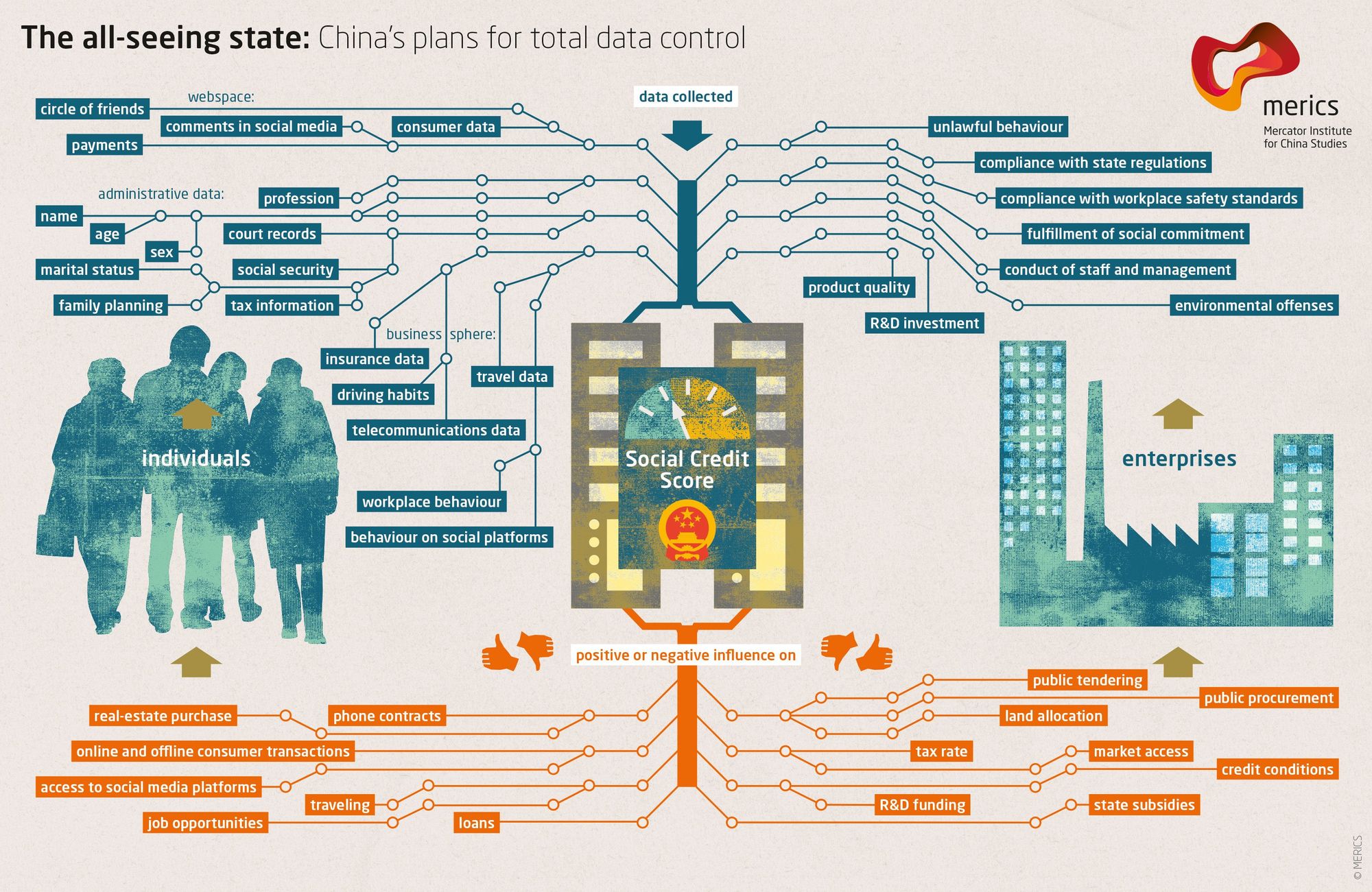
The blue check is the first step in Elon's plan to bring the chinese social credit score system to the west. Users who verify their identity are rewarded with more reach and better tools than those that do not. Verified users are the main product of Elon's twitter - an extensive database of individuals and complete control of the tools he will slowly get them to rely on - it is easier to monetize cattle than free men.
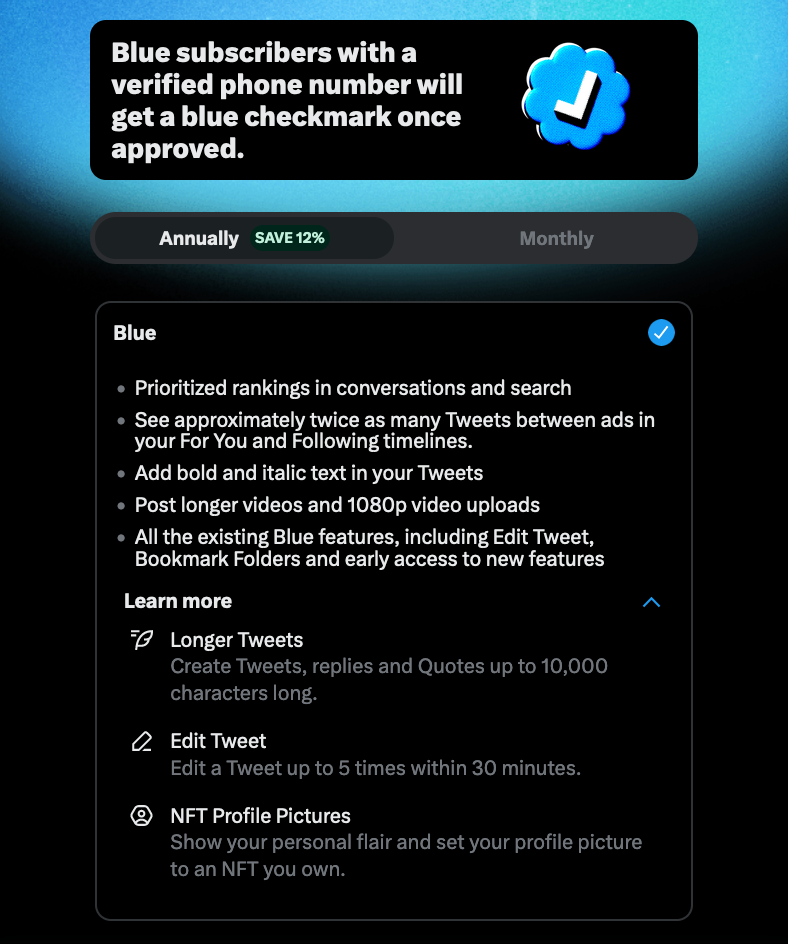
If you cannot resist the temptation of the blue check in its current form you have already lost - what comes next will be much darker. If you realize the need to resist - freedom tech provides us options.
If you found this post helpful support my work with bitcoin.

-
 @ 39cc53c9:27168656
2025-06-15 14:46:19
@ 39cc53c9:27168656
2025-06-15 14:46:19After almost 3 months of work, we've completed the redesign of kycnot.me. More modern and with many new features.
Privacy remains the foundation - everything still works with JavaScript disabled. If you enable JS, you will get some nice-to-have features like lazy loading and smoother page transitions, but nothing essential requires it.
User Accounts
We've introduced user accounts that require zero personal information:
- Secret user tokens - no email, no phone number, no personal data
- Randomly generated usernames for default privacy and fairness
- Karma system that rewards contributions and unlocks features: custom display names, profile pictures, and more.
Reviews and Community Discussions
On the previous sites, I was using third party open source tools for the comments and discussions. This time, I've built my own from scratch, fully integrated into the site, without JavaScript requirements.
Everyone can share their experiences and help others make informed decisions:
- Ratings: Comments can have a 1-5 star rating attached. You can have one rating per service and it will affect the overall user score.
- Discussions: These are normal comments, you can add them on any listed service.
Comment Moderation
I was strugling to keep up with moderation on the old site. For this, we've implemented an AI-powered moderation system that:
- Auto-approves legitimate comments instantly
- Flags suspicious content for human review
- Keeps discussions valuable by minimizing spam
The AI still can mark comments for human review, but most comments will get approved automatically by this system. The AI also makes summaries of the comments to help you understand the overall sentiment of the community.
Powerful Search & Filtering
Finding exactly what you need is now easier:
- Advanced filtering system with many parameters. You can even filter by attributes to pinpoint services with specific features.
The results are dynamic and shuffle services with identical scores for fairness.
See all listings
Listings are now added as 'Community Contributed' by default. This means that you can still find them in the search results, but they will be clearly marked as such.
Updated Scoring System
New dual-score approach provides more nuanced service evaluations:
- Privacy Score: Measures how well a service protects your personal information and data
-
Trust Score: Assesses reliability, security, and overall reputation
-
Combined into a weighted Overall Score for quick comparisons
- Completely transparent and open source calculation algorithm. No manual tweaking or hidden factors.
AI-Powered Terms of Service Analysis
Basically, a TLDR summary for Terms of Service:
- Automated system extracts the most important points from complex ToS documents
- Clear summaries
- Updated monthly to catch any changes
The ToS document is hashed and only will be updated if there are any changes.
Service Events and Timelines
Track the complete history of any service, on each service page you can see the timeline of events. There are two types of events:
- Automatic events: Created by the system whenever something about a service changes, like its description, supported currencies, attributes, verification status…
- Manual events: Added by admins when there’s important news, such as a service going offline, being hacked, acquired, shut down, or other major updates.
There is also a global timeline view available at /events
Notification System
Since we now have user accounts, we built a notifiaction system so you can stay informed about anything:
- Notifications for comment replies and status changes
- Watch any comment to get notified for new replies.
- Subscribe to services to monitor events and updates
- Notification customization.
Coming soon: Third-party privacy-preserving notifications integration with Telegram, Ntfy.sh, webhooks...
Service Suggestions
Anyone with an account can suggest a new service via the suggestion form. After submitting, you'll receive a tracking page where you can follow the status of your suggestion and communicate directly with admins.
All new suggestions start as "unlisted" — they won't appear in search results until reviewed. Our team checks each submission to ensure it's not spam or inappropriate. If similar services already exist, you'll be shown possible duplicates and can choose to submit your suggestion as an edit instead.
You can always check the progress of your suggestion, respond to moderator questions, and see when it goes live, everything will also be notified to your account. This process ensures high-quality listings and a collaborative approach to building the directory.
These are some of the main features we already have, but there are many more small changes and improvements that you will find when using the site.
What's Next?
This is just the beginning. We will be constantly working to improve KYCnot.me and add more features that help you preserve your privacy.
Remember: True financial freedom requires the right to privacy. Stay KYC-free!
-
 @ 9ca447d2:fbf5a36d
2025-06-15 22:02:19
@ 9ca447d2:fbf5a36d
2025-06-15 22:02:19CANNES, FRANCE – May 2025 — Bitcoin mining made its mark at the world’s most prestigious film gathering this year as Puerto Rican director and producer Alana Mediavilla introduced her feature documentary Dirty Coin: The Bitcoin Mining Documentary at the Marché du Film during the Cannes Film Festival.
The film puts bitcoin mining at the center of a rising global conversation about energy, technology, and economic freedom.
Dirty Coin is the first feature-length documentary to explore bitcoin mining through immersive, on-the-ground case studies.
From rural towns in the United States to hydro-powered sites in Latin America and the Congo, the film follows miners and communities navigating what may be one of the most misunderstood technologies of our time.
The result is a human-centered look at how bitcoin mining is transforming local economies and energy infrastructure in real ways.
To mark its Cannes debut, Mediavilla and her team hosted a packed industry event that brought together leaders from both film and finance.

Dirty Coin debut ceremony at the Marché du Film
Sponsors Celestial Management, Sangha Renewables, Nordblock, and Paystand.org supported the program, which featured panels on mining, energy use, and decentralized infrastructure.
Attendees had the rare opportunity to engage directly with pioneers in the space. A special session in French led by Seb Gouspillou spotlighted mining efforts in the Congo’s Virunga region.
Dirty Coin builds on Mediavilla’s award-winning short film Stranded, which won over 20 international prizes, including Best Short Documentary at Cannes in 2024.
That success helped lay the foundation for the feature and positioned Mediavilla as one of the boldest new voices in global documentary filmmaking.

Alana Mediavilla speaks at the Marché du Film — Cannes Film Festival
“If we’ve found an industry that can unlock stranded energy and turn it into real power for people—especially in regions with energy poverty—why wouldn’t we look into it?” says Mediavilla. “Our privilege blinds us.
“The same thing we criticize could be the very thing that lifts the developing world to our standard of living. Ignoring that potential is a failure of imagination.”
Much like the decentralized network it explores, Dirty Coin is spreading globally through grassroots momentum.
Local leaders are hosting independent screenings around the world, from Roatán and Berlin to São Paulo and Madrid. Upcoming events include Toronto and Zurich, with more cities joining each month.
Mediavilla, who previously worked in creative leadership roles in the U.S. — including as a producer at Google — returned to Puerto Rico to found Campo Libre, a studio focused on high-caliber, globally relevant storytelling from the Caribbean.
She was also accepted into the Cannes Producers Network, a selective program open only to producers with box office releases in the past four years.
Mediavilla qualified after independently releasing Dirty Coin in theaters across Puerto Rico. Her participation in the network gave her direct access to meetings, insights, and connections with the most active distributors and producers working today.
The film’s next public screening will take place at the Anthem Film Festival in Palm Springs on Saturday, June 14 at 2 PM. Additional screenings and market appearances are planned throughout the year at Bitcoin events and international film platforms.

Dirty Coin at the Cannes Film Festival
Watch the Trailer + Access Press Materials
📂 EPK
🎬 Screener
🌍 Host a Screening
Follow the Movement
Instagram: https://www.instagram.com/dirty_coin_official/
Twitter: https://x.com/DirtyCoinDoc
Website: www.dirtycointhemovie.com -
 @ 9ca447d2:fbf5a36d
2025-06-15 22:02:05
@ 9ca447d2:fbf5a36d
2025-06-15 22:02:05The Blockchain Group, Europe’s first publicly listed bitcoin treasury company, has received the green light from its shareholders to raise more than €10 billion (approximately $11 billion) to buy more bitcoin.
This is one of the biggest bitcoin treasury plays in Europe as the company wants to speed up its bitcoin accumulation and become a major institutional buyer.
At the Annual General Meeting held on June 10, 39% of the voting rights represented by shareholders voted in favor of the financing plan, with over 95% of the votes cast in favor.
The approval gives the board of directors broad financial powers to issue shares and other securities to raise capital, either with or without preferential subscription rights.
This will allow the company to raise funds quickly in public or private markets to buy bitcoin when the time is right.
CEO Jean-Philippe Casadepax-Soulet said:
“I would like to thank our shareholders for the trust they have placed in us with the approval of these new financial authorizations, that will enable us to accelerate our Bitcoin Treasury strategy, focused on increasing the number of bitcoins per share on a fully diluted basis over time.”
The Blockchain Group’s strategy is to increase the number of bitcoin per share. This means that the company aims to buy more bitcoin without diluting existing shareholders’ ownership, and provide exposure to a growing hard-asset reserve within the company’s equity.
According to Bitcoin Treasuries, the company already holds 1,471 BTC, worth around €160 million.
Earlier this month, it added 624 BTC, worth around €69 million, to its treasury. These are just the beginning of a much bigger accumulation effort funded by the recent shareholder-approved capital increase.
Alongside ordinary shares, the financial powers granted to the board include the ability to issue preferred shares, warrants and convertible bonds. This gives the company the tools to optimize funding costs and respond to market demand.
This is on top of the €300 million at-the-market (ATM) facility announced earlier with asset manager TOBAM, where the company can issue new shares at market price. TOBAM is the sole subscriber under this ATM and can buy up to 39% of the company if the facility is fully used.
In addition to the capital raise, shareholders elected Alexandre Laizet as a board member and appointed him Deputy CEO in charge of the Bitcoin strategy. Laizet’s 6-year term will end in 2030, which shows the long-term vision for digital assets.
The appointment highlights the importance of bitcoin within the company’s overall structure which also includes subsidiaries in data intelligence, AI consulting and decentralized technology.
-
 @ 7f6db517:a4931eda
2025-06-15 11:02:51
@ 7f6db517:a4931eda
2025-06-15 11:02:51
What is KYC/AML?
- The acronym stands for Know Your Customer / Anti Money Laundering.
- In practice it stands for the surveillance measures companies are often compelled to take against their customers by financial regulators.
- Methods differ but often include: Passport Scans, Driver License Uploads, Social Security Numbers, Home Address, Phone Number, Face Scans.
- Bitcoin companies will also store all withdrawal and deposit addresses which can then be used to track bitcoin transactions on the bitcoin block chain.
- This data is then stored and shared. Regulations often require companies to hold this information for a set number of years but in practice users should assume this data will be held indefinitely. Data is often stored insecurely, which results in frequent hacks and leaks.
- KYC/AML data collection puts all honest users at risk of theft, extortion, and persecution while being ineffective at stopping crime. Criminals often use counterfeit, bought, or stolen credentials to get around the requirements. Criminals can buy "verified" accounts for as little as $200. Furthermore, billions of people are excluded from financial services as a result of KYC/AML requirements.
During the early days of bitcoin most services did not require this sensitive user data, but as adoption increased so did the surveillance measures. At this point, most large bitcoin companies are collecting and storing massive lists of bitcoiners, our sensitive personal information, and our transaction history.
Lists of Bitcoiners
KYC/AML policies are a direct attack on bitcoiners. Lists of bitcoiners and our transaction history will inevitably be used against us.
Once you are on a list with your bitcoin transaction history that record will always exist. Generally speaking, tracking bitcoin is based on probability analysis of ownership change. Surveillance firms use various heuristics to determine if you are sending bitcoin to yourself or if ownership is actually changing hands. You can obtain better privacy going forward by using collaborative transactions such as coinjoin to break this probability analysis.
Fortunately, you can buy bitcoin without providing intimate personal information. Tools such as peach, hodlhodl, robosats, azteco and bisq help; mining is also a solid option: anyone can plug a miner into power and internet and earn bitcoin by mining privately.
You can also earn bitcoin by providing goods and/or services that can be purchased with bitcoin. Long term, circular economies will mitigate this threat: most people will not buy bitcoin - they will earn bitcoin - most people will not sell bitcoin - they will spend bitcoin.
There is no such thing as KYC or No KYC bitcoin, there are bitcoiners on lists and those that are not on lists.
If you found this post helpful support my work with bitcoin.

-
 @ 7f6db517:a4931eda
2025-06-15 22:02:40
@ 7f6db517:a4931eda
2025-06-15 22:02:40
For years American bitcoin miners have argued for more efficient and free energy markets. It benefits everyone if our energy infrastructure is as efficient and robust as possible. Unfortunately, broken incentives have led to increased regulation throughout the sector, incentivizing less efficient energy sources such as solar and wind at the detriment of more efficient alternatives.
The result has been less reliable energy infrastructure for all Americans and increased energy costs across the board. This naturally has a direct impact on bitcoin miners: increased energy costs make them less competitive globally.
Bitcoin mining represents a global energy market that does not require permission to participate. Anyone can plug a mining computer into power and internet to get paid the current dynamic market price for their work in bitcoin. Using cellphone or satellite internet, these mines can be located anywhere in the world, sourcing the cheapest power available.
Absent of regulation, bitcoin mining naturally incentivizes the build out of highly efficient and robust energy infrastructure. Unfortunately that world does not exist and burdensome regulations remain the biggest threat for US based mining businesses. Jurisdictional arbitrage gives miners the option of moving to a friendlier country but that naturally comes with its own costs.
Enter AI. With the rapid development and release of AI tools comes the requirement of running massive datacenters for their models. Major tech companies are scrambling to secure machines, rack space, and cheap energy to run full suites of AI enabled tools and services. The most valuable and powerful tech companies in America have stumbled into an accidental alliance with bitcoin miners: THE NEED FOR CHEAP AND RELIABLE ENERGY.
Our government is corrupt. Money talks. These companies will push for energy freedom and it will greatly benefit us all.
Microsoft Cloud hiring to "implement global small modular reactor and microreactor" strategy to power data centers: https://www.datacenterdynamics.com/en/news/microsoft-cloud-hiring-to-implement-global-small-modular-reactor-and-microreactor-strategy-to-power-data-centers/
If you found this post helpful support my work with bitcoin.

-
 @ b1ddb4d7:471244e7
2025-06-15 22:02:01
@ b1ddb4d7:471244e7
2025-06-15 22:02:01Paris, France – June 6, 2025 – Flash, the easiest Bitcoin payment gateway for businesses, just announced a new partnership with the Bitcoin Only Brewery, marking the first-ever beverage company to leverage Flash for seamless Bitcoin payments.
Bitcoin Buys Beer Thanks to Flash!

As Co-Founder of Flash, it's not every day we get to toast to a truly refreshing milestone.
Okay, jokes aside.
We're super buzzed to see our friends at @Drink_B0B
Bitcoin Only Brewery using Flash to power their online sales!The first… pic.twitter.com/G7TWhy50pX
— Pierre Corbin (@CierrePorbin) June 3, 2025
Flash enables Bitcoin Only Brewery to offer its “BOB” beer with, no-KYC (Know Your Customer) delivery across Europe, priced at 19,500 sats (~$18) for the 4-pack – shipping included.
The cans feature colorful Bitcoin artwork while the contents promise a hazy pale ale: “Each 33cl can contains a smooth, creamy mouthfeel, hazy appearance and refreshing Pale Ale at 5% ABV,” reads the product description.
Pierre Corbin, Co-Founder of Flash, commented: “Currently, bitcoin is used more as a store of value but usage for payments is picking up. Thanks to new innovation on Lightning, bitcoin is ready to go mainstream for e-commerce sales.”
Flash, launched its 2.0 version in March 2025 with the goal to provide the easiest Bitcoin payment gateway for businesses worldwide. The platform is non-custodial and can enable both digital and physical shops to accept Bitcoin by connecting their own wallets to Flash.
By leveraging the scalability of the Lightning Network, Flash ensures instant, low-cost transactions, addressing on-chain Bitcoin bottlenecks like high fees and long wait times.
Bitcoin payment usage is growing thanks to Lightning
In May, fast-food chain Steak ‘N Shake went viral for integrating bitcoin at their restaurants around the world. In the same month, the bitcoin2025 conference in Las Vegas set a new world record with 4,000 Lightning payments in one day.
According to a report by River Intelligence, public Lightning payment volume surged by 266% from August 2023 to August 2024. This growth is also reflected in the overall accessibility of lighting infrastructure for consumers. According to Lightning Service Provider Breez, over 650 Million users now have access to the Lightning Network through apps like CashApp, Kraken or Strike.
Bitcoin Only Brewery’s adoption of Flash reflects the growing trend of businesses integrating Bitcoin payments to cater to a global, privacy-conscious customer base. By offering no-KYC delivery across Europe, the brewery aligns with the ethos of decentralization and financial sovereignty, appealing to the increasing number of consumers and businesses embracing Bitcoin as a legitimate payment method.
“Flash is committed to driving innovation in the Bitcoin ecosystem,” Corbin added. “We’re building a future where businesses of all sizes can seamlessly integrate Bitcoin payments, unlocking new opportunities in the global market. It’s never been easier to start selling in bitcoin and we invite retailers globally to join us in this revolution.”
For businesses interested in adopting Bitcoin payments, Flash offers a straightforward onboarding process, low fees, and robust support for both digital and physical goods. To learn more, visit paywithflash.com.
About Flash
Flash is the easiest Bitcoin payment gateway for businesses to accept payments. Supporting both digital and physical enterprises, Flash leverages the Lightning Network to enable fast, low-cost Bitcoin transactions. Launched in its 2.0 version in March 2025, Flash is at the forefront of driving Bitcoin adoption in e-commerce.
About Bitcoin Only Brewery
Bitcoin Only Brewery (@Drink_B0B) is a pioneering beverage company dedicated to the Bitcoin ethos, offering high-quality beers payable exclusively in Bitcoin. With a commitment to personal privacy, the brewery delivers across Europe with no-KYC requirements.
Media Contact:
Pierre Corbin
Co-Founder, Flash
Email: press@paywithflash.com
Website: paywithflash.comPhotos paywithflash.com/about/pressHow Flash Enables Interoperable, Self-Custodial Bitcoin Commerce
-
 @ b1ddb4d7:471244e7
2025-06-15 22:01:59
@ b1ddb4d7:471244e7
2025-06-15 22:01:59In today’s digital era, access to financial services remains a privilege for many. Bitcoinization – the mass adoption of Bitcoin as a payment medium and store of value – represents a unique opportunity to democratize access to financial services (Read this article Can the Lightning Network Lead to “Hyperbitcoinization”? to know more about Bitcoinization). Telecommunications carriers occupy a strategic position in this transformation, especially in regions where traditional internet access is limited. However, this aspect remains largely unexplored. This article seeks to examine how these companies can catalyze this financial revolution by analyzing the Machankura case and the technical possibilities within current communication infrastructures.
The Success Sotry of Machankura
The Machankura project (8333.mobi) emerged to address a common challenge in various African regions: financial exclusion due to limited internet access. Created by South African developer Kgothatso Ngako, the service utilizes the USSD (Unstructured Supplementary Service Data) protocol, supported by virtually all mobile phones, to facilitate Bitcoin transactions via 2G and 3G cellular networks.
Machankura – derived from South African slang for “money” – functions as a custodial Bitcoin wallet. Through the USSD protocol, users can access the service by dialing short codes (*123*456789#, for example) or sending SMS messages to specific numbers. When the server receives the code or message, an interactive session between the parties (server-user) begins. This enables users to create Bitcoin wallets associated with their phone numbers, protected by multi-digit PINs.
Once registered, users receive a Lightning address (example: 1234567890@8333.mobi) that can be used to receive Bitcoin from anyone worldwide. Users can also customize this address to a preferred username, further enhancing privacy.
Currently, Machankura is available in nine African countries, including Nigeria, Tanzania, South Africa, Kenya, Uganda, Ghana, and Malawi. The creator’s objective is to expand the service to all countries across the African continent in the coming years.
Why Lightning network? Please read this article Lightning Network vs. Traditional Bitcoin Transactions.
The Technical Foundations of Machankura’s Success – USSD
As mentioned, USSD is a protocol embedded in mobile networks and available on virtually all cellular devices. This choice proved crucial for the Machankura project, given that in Africa, more than half of phones sold are not smartphones. Additionally, this protocol offers critical technical advantages:
- Operates without requiring internet access, functioning in areas with poor connectivity.
- Universal compatibility with any mobile phone, including the most basic models.
- Provides real-time interactivity between users and the system.
- Features an intuitive interface already utilized for banking services, customer support, and self-service applications
These advantages have enabled Bitcoin to become accessible to a significant portion of the region’s population, with over 15,000 users, according to the Machankura project creator.
USSD and Connectivity Challenges
The primary technical limitation of USSD manifests in high-connectivity environments (4G, 5G, or higher). As established by the 3GPP (3rd Generation Partnership Project, organization for standardization of mobile networks), the protocol must be recognized by newer generations of cellular networks. However, this recognition requires a procedure known as inter-technology fallback. For instance, if a user is connected to a 5G network and streaming music, when accessing a USSD service, their connection will downgrade to a 3G (or 2G) network, inevitably interrupting media streaming execution.
IP Multimedia Subsystem (IMS): The Evolution in Telecommunications Services
The solution to connectivity issues with USSD resides within the IMS (IP Multimedia Subsystem), a subsystem within the standardized architecture of newer cellular networks (from fourth generation onwards). Its objective is to unify access and provision of multimedia services across both mobile and fixed networks. These services include:
- Voice services – such as Voice over LTE (VoLTE) and Voice over WiFi (VoWiFi)
- Video services – such as Video over LTE (ViLTE) and Video over WiFi (ViWiFi)
- Videoconferencing
- Instant messaging
- Streaming media
- Emergency services
- Interoperability between legacy networks
The New Era: USSI (USSD over IP)
USSI (USSD over IP) represents the solution for service continuity across 4G, 5G, and future networks when utilizing USSD services. This new protocol enhances service quality, increases simultaneous session capacity, provides additional features for recent devices, improves session security, and enables operation without requiring fallback procedures.
Strategic Opportunities for Carriers
Institutional Bitcoin adoption is already established, with integration into portfolios of mining companies, exchanges, automobile manufacturers (Tesla), investment funds (BlackRock), financial institutions (Galaxy Digital Holdings), technology companies (including MicroStrategy, MercadoLibre, and Brazilian Meliúz), and even nations such as El Salvador, the United States, and China.
With robust, secure, and extensive infrastructure, telecommunications carriers can implement complex and advanced Bitcoin-based financial services, demystifying its use and stimulating adoption. Strategic partnerships with exchanges and fintechs enhance integrated solutions for entrepreneurs and consumers, such as integration with Lightning Network nodes to enable rapid, low-cost transactions between IoT devices, machine-to-machine (M2M) applications, and point-of-sale (POS) terminals.
The competitive advantages of this approach include
- New Revenue Streams: Companies can collect fees from simple transactions and provide advanced financial services such as loans, insurance, and investments.
- Customer Retention: By offering innovative services, they can reduce customer churn.
- Vanguard Strategy: Strategic positioning in an emerging high-capitalization market
The Future of Bitcoinization in Telecommunications
The success of the Machankura project unequivocally demonstrates the potential of telecommunications as transformative agents in the mass adoption of Bitcoin. As the Bitcoin ecosystem consolidates and expands, it is essential that we recognize this opportunity not merely as a new business vertical but as an important step toward strategic positioning at the forefront of a global economic transformation.
Given the extensive reach of existing infrastructure, these carriers can become the primary catalyst for transforming the lives of the unbanked in an unprecedented manner. As we have seen, Bitcoin is no longer just a trend; it is a reality. The natural consequence of this reality is bitcoinization, and we have the opportunity to be at the forefront of this emerging paradigm.
-
 @ 4fe14ef2:f51992ec
2025-06-15 10:19:13
@ 4fe14ef2:f51992ec
2025-06-15 10:19:13Let's support Bitcoin merchants! I'd love to hear some of your latest Lightning purchases and interesting products you bought. Feel free to include links to the shops or businesses you bought from.
Who else has a recent purchase they’re excited about? Bonus sats if you found a killer deal! ⚡
If you missed our last thread, here are some of the items stackers recently spent and zap on.
Like and repost: X: https://x.com/AGORA_SN/status/1934193660796780660 N: https://njump.me/nevent1qqsdaqz3qjmgta88a4wnzyh7vujla7ecsc7luatrtl0a2k7xq43thhq337lj2
https://stacker.news/items/1006838
-
 @ b1ddb4d7:471244e7
2025-06-15 10:02:09
@ b1ddb4d7:471244e7
2025-06-15 10:02:09The latest AI chips, 8K displays, and neural processing units make your device feel like a pocket supercomputer. So surely, with all this advancement, you can finally mine bitcoin on your phone profitably, right?
The 2025 Hardware Reality: Can You Mine Bitcoin on Your Phone
Despite remarkable advances in smartphone technology, the fundamental physics of bitcoin mining haven’t changed. In 2025, flagship devices with their cutting-edge 2nm processors can achieve approximately 25-40 megahashes per second when you mine bitcoin on your phone—a notable improvement from previous generations, but still laughably inadequate.
Meanwhile, 2025’s top-tier ASIC miners have evolved dramatically. The latest Bitmain Antminer S23 series and Canaan AvalonMiner A15 Pro deliver 200-300 terahashes per second while consuming 4,000-5,500 watts. That’s a performance gap of roughly 1:8,000,000 between when you mine bitcoin on your phone and professional mining equipment.
To put this in perspective that hits home: if you mine bitcoin on your phone and it earned you one penny, professional miners would earn $80,000 in the same time period with the same effort. It’s not just an efficiency problem—it’s a complete category mismatch.
According to Pocket Option’s 2025 analysis, when you mine bitcoin on your phone in 2025, you generate approximately $0.003-0.006 in daily revenue while consuming $0.45-0.85 in electricity through constant charging cycles. Factor in the accelerated device wear (estimated at $0.75-1.20 daily depreciation), and you’re looking at losses of $1.20-2.00 per day just for the privilege of running mining software.
Mining Economic Factor
Precise Value (April 2025)
Direct Impact on Profitability
Smartphone sustained hash rate
20-35 MH/s
0.00000024% contribution to global hashrate
Daily power consumption
3.2-4.8 kWh (4-6 full charges)
$0.38-0.57 at average US electricity rates
Expected daily BTC earnings
0.0000000086 BTC ($0.0035 at $41,200 BTC)
Revenue covers only 0.9% of electricity costs
CPU/GPU wear cost
$0.68-0.92 daily accelerated depreciation
Reduces smartphone lifespan by 60-70%
Annual profit projection
-$386 to -$412 per year
Guaranteed negative return on investment
Source: PocketOption
Bitcoin’s 2025 Network: Harder Than Ever
Bitcoin’s network difficulty in 2025 has reached unprecedented levels. After the April 2024 halving event that reduced block rewards from 6.25 to 3.125 BTC, mining became significantly more competitive. The global hash rate now exceeds 800 exahashes per second—that’s 800 followed by 18 zeros worth of computational power securing the network.
Here’s what this means in practical terms: Bitcoin’s mining difficulty adjusts every 2,016 blocks (roughly every two weeks) to maintain the 10-minute block time. As more efficient miners join the network, difficulty increases proportionally. In 2025, mining difficulty has increased compared to 2024, making small-scale mining even less viable.
The math is unforgiving:
- Global Bitcoin hash rate: 828.96 EH/s
- Your smartphone’s contribution: ~0.000000003%
- Probability of solo mining a block: Virtually zero
- Expected time to mine one Bitcoin: Several million years
Even joining mining pools doesn’t solve the economic problem. Pool fees typically range from 1-3%, and your minuscule contribution would earn proportionally tiny rewards—far below the electricity and device depreciation costs.
The 2025 Scam Evolution: More Sophisticated, More Dangerous
Fraudsters now leverage AI-generated content, fake influencer endorsements, and impressive-looking apps that simulate realistic mining activity to entice you to mine bitcoin on your phone.
New 2025 scam tactics include:
AI-Powered Fake Testimonials: Deepfake videos of supposed successful mobile miners showing fabricated earnings statements and encouraging downloads of malicious apps.
Gamified Mining Interfaces: Apps that look and feel like legitimate games but secretly harvest personal data while simulating mining progress that can never be withdrawn.
Social Media Manipulation: Coordinated campaigns across TikTok, Instagram, and YouTube featuring fake “financial influencers” promoting mobile mining apps to younger audiences.
Subscription Trap Mining: Apps offering “free trials” that automatically charge $19.99-49.99 monthly for “premium mining speeds” while delivering no actual mining capability.
Recent cybersecurity research shows that over 180 fake mining apps were discovered across major app stores in 2025, with some accumulating more than 500,000 downloads before being removed.
Red flags that scream “scam” in 2025:
- Apps claiming “revolutionary mobile mining breakthrough”
- Promises of earning “$10-50 daily” from phone mining
- Requirements to recruit friends or watch ads to unlock withdrawals
- Apps that don’t require connecting to actual mining pools
- Testimonials that seem too polished or use stock photo models
- Apps requesting permissions unrelated to mining (contacts, camera, microphone)
The 2025 Professional Mining Landscape
To understand why, consider what professional bitcoin mining looks like in 2025. Industrial mining operations now resemble high-tech data centers with:
Cutting-edge hardware:
- Bitmain Antminer S23 Pro: 280 TH/s at 4,800W
- MicroBT WhatsMiner M56S++: 250 TH/s at 4,500W
- Canaan AvalonMiner A1566: 185 TH/s at 3,420W
Infrastructure requirements:
- Megawatt-scale power contracts with industrial electricity rates
- Liquid cooling systems maintaining 24/7 optimal temperatures
- Redundant internet connections ensuring zero downtime
- Professional facility management with 24/7 monitoring
For a small operation, you might need at least $10,000 to $20,000 to buy a few ASIC miners, set up cooling systems, and cover electricity costs. These operations employ teams of engineers, maintain relationships with power companies, and operate with margins measured in single-digit percentages.
2025’s Legitimate Mobile Bitcoin Strategies
While it remains impossible to mine bitcoin on your phone profitably, 2025 offers exciting legitimate ways to engage with bitcoin through your smartphone:
Lightning Network Participation: Apps like Phoenix, Breez, and Zeus allow you to run Lightning nodes on mobile devices, earning small routing fees while supporting bitcoin’s payment layer.
Bitcoin DCA Automation: Services enable automated dollar-cost averaging with amounts as small as $1 daily. Historical data shows $10 weekly bitcoin purchases consistently outperform any mobile mining attempt by 1,500-2,000%.
Educational Mining Simulators: Legitimate apps like “Bitcoin Mining Simulator” teach mining concepts without false earning promises. These educational tools help users understand hash rates, difficulty adjustments, and mining economics.
Stacking Sats Rewards: Apps offering bitcoin rewards for shopping, learning, or completing tasks.
Lightning Gaming: Bitcoin-native mobile games where players can earn sats through skilled gameplay, with some players earning $10 monthly.onfirm that even the most optimized mobile mining setups in 2025 lose money consistently and predictably.
The Bottom Line
When you mine bitcoin on your phone fundamental economics remain unchanged: it’s impossible to profit. The laws of physics, network competition, and energy efficiency create insurmountable barriers that no app can overcome.
However, 2025 offers unprecedented opportunities to engage with bitcoin meaningfully through your smartphone. Focus on education, legitimate earning opportunities, and strategic investment rather than chasing the impossible dream of phone-based mining.
The bitcoin community’s greatest strength lies in its commitment to truth over hype. When someone promises profits to mine bitcoin on your phone in 2025, they’re either uninformed or deliberately misleading you. Trust the mathematics, learn from the community, and build your bitcoin knowledge and holdings through proven methods.
The real opportunity in 2025 isn’t to mine bitcoin on your phone—it’s understanding bitcoin deeply enough to participate confidently in the most important monetary revolution of our lifetime. Your smartphone is the perfect tool for that education; it’s just not a mining rig.
-
 @ f7d424b5:618c51e8
2025-06-14 21:53:35
@ f7d424b5:618c51e8
2025-06-14 21:53:35GAMERS, we're back in the virtual studio for another sophisticated and gentlemanly discussion on the most important topic in the media landscape: huge anime tiddies on the best and baddest Bodytype Bs you've ever seen. I think the VA strike ended too or something.
Stuff cited:
- SB steam charts
- Commentary by Megan Shipman
- Mujin video that shows the leaked discord messages from the SAG discord
Obligatory:
- Listen to the new episode here!
- Discuss this episode on OUR NEW FORUM
- Get the RSS and Subscribe (this is a new feed URL, but the old one redirects here too!)
- Get a modern podcast app to use that RSS feed on at newpodcastapps.com
- Or listen to the show on the forum using the embedded Podverse player!
- Send your complaints here
Reminder that this is a Value4Value podcast so any support you can give us via a modern podcasting app is greatly appreciated and we will never bow to corporate sponsors!
-
 @ 7f6db517:a4931eda
2025-06-15 22:02:40
@ 7f6db517:a4931eda
2025-06-15 22:02:40
Humanity's Natural State Is Chaos
Without order there is chaos. Humans competing with each other for scarce resources naturally leads to conflict until one group achieves significant power and instates a "monopoly on violence."Power Brings Stability
Power has always been the key means to achieve stability in societies. Centralized power can be incredibly effective in addressing issues such as crime, poverty, and social unrest efficiently. Unfortunately this power is often abused and corrupted.Centralized Power Breeds Tyranny
Centralized power often leads to tyrannical rule. When a select few individuals hold control over a society, they tend to become corrupted. Centralized power structures often lack accountability and transparency, and rely too heavily on trust.Distributed Power Cultivates Freedom
New technology that empowers individuals provide us the ability to rebuild societies from the bottom up. Strong individuals that can defend and provide for themselves will help build strong local communities on a similar foundation. The result is power being distributed throughout society rather than held by a select few.In the short term, relying on trust and centralized power is an easy answer to mitigating chaos, but freedom tech tools provide us the ability to build on top of much stronger distributed foundations that provide stability while also cultivating individual freedom.
The solution starts with us. Empower yourself. Empower others. A grassroots freedom tech movement scaling one person at a time.
If you found this post helpful support my work with bitcoin.

-
 @ b1ddb4d7:471244e7
2025-06-15 22:01:58
@ b1ddb4d7:471244e7
2025-06-15 22:01:58This article was originally published on dev.to by satshacker.
Alright, you’ve built a useful and beautiful website, tool or app. However, monetization isn’t a priority and you’d rather keep the project free, ads-free and accessible?
Accepting donations would be an option, but how? A PayPal button? Stripe? Buymeacoffe? Patreon?
All of these services require a bank account and KYC verification, before you can send and receive donations – not very convenient.
If we only could send value over the internet, with just one click and without the need of a bank account…
Oh, hold on, that’s bitcoin. The decentralized protocol to send value across the globe. Money over TCP/IP.
In this article, we’ll learn how anyone can easily add a payment button or donation widget on a website or app.
Let’s get into it.
Introduction
Bitcoin is digital money that you can send and receive without the need for banks. While bitcoin is extremely secure, it’s not very fast. The maximum transactions per second (TPS) the network can handle is about 7. Obviously that’s not useful for daily payments or microtransactions.
If you’d like to dig deeper into how bitcoin works, a great read is “Mastering Bitcoin” by Andreas Antonopoulos.
Bitcoin vs Lightning
If you’d like to receive bitcoin donations “on-chain” all you need is a bitcoin wallet. You simply display your bitcoin address on your site and that’s it. You can receive donations.
It would look something like this; 1A1zP1eP5QGefi2DMPTfTL5SLmv7DivfNa
Instead of showing the actual bitcoin address, you can also turn it into a QR code.
However, this is not a recommended solution. Using static on-chain addresses has two major downsides. It lowers privacy for you and your donnors and it’s a UTXO disaster because many small incoming transactions could beocme hard to consolidate in the future.
For donations and small transactions, the Lightning Network is the better option. Lightning allows for instant settlement with fees only a fraction of a cent.
Similar to bitcoin, you have the choice between non-custodial and custodial wallets. This means, either you have full control over your money or the wallet provider has.
Option 1: Lightning Address
With the lightning address feature, you an easily receive donations to an email like address.
It looks like this: yourname@wallet.com
Many wallets support lightning addresses and make it easy to create one. Then, you simple add the address to your donation page and you’re ready to receive tips.
You can also add a link link as in lightning:yourname@wallet.com and compatible lightning wallets and browser wallets will detect the address.
Option 2: Lightning Donation Widgets
If you like to take it a step further, you can also create a more enhanced donation checkout flow. Of course you could programm something yourself, there are many open source libraries you can build upon. If you want a simple plug-and-play solution, here are a couple of options:
Name
Type
Registration
SatSale
Self-hosted
No KYC
BTCPay Server
Self-hosted
No KYC
Pay With Flash
Widget
Email
Geyser Fund
Widget
Email
The Giving Block
Hosted
KYC
OpenNode
Hosted
KYC
SatSale (GitHub)
Lightweight, self-hosted Bitcoin/Lightning payment processor. No KYC.
Ideal for developers comfortable with server management. Simple to deploy, supports both on-chain and Lightning, and integrates with WooCommerce.
BTCPay Server
Powerful, open-source, self-hosted processor for Bitcoin and Lightning. No KYC.
Supports multiple currencies, advanced features, and full privacy. Requires technical setup and maintenance. Funds go directly to your wallet; great for those seeking full control.
Pay With Flash
Easiest for indie hackers. Add a donation widget with minimal code and no KYC. Payments go directly to your wallet for a 1.5% fee.
Setup Steps:
- Sign up at PayWithFlash.com
- Customize your widget in the dashboard
- Embed the code:
- Test to confirm functionality
Benefits:
- Minimal technical skills required
- Supports one-time or recurring donations
- Direct fund transfer, no intermediaries
Geyser Fund
Crowdfunding platform. Widget-based, connects to your wallet, email registration.Focused on Bitcoin crowdfunding, memberships and donations.
The Giving Block
Hosted, KYC required. Integrates with fiat and crypto, best for nonprofits or larger organizations.
OpenNode
Hosted, KYC required. Accept Bitcoin payments and donations; supports conversion to fiat, suitable for businesses and nonprofits.
Summary
- Fast, low-code setup: Use Pay With Flash or Geyser Fund.
- Privacy and control: Choose SatSale or BTCPay Server (requires technical skills).
- Managed, compliant solutions: The Giving Block or OpenNode.
Choose based on your technical comfort, privacy needs, and project scale.
I hope this article helped you. If you added bitcoin donations, share your link in the comments and I will send you a few satoshis maybe

-
 @ b1ddb4d7:471244e7
2025-06-15 22:01:56
@ b1ddb4d7:471244e7
2025-06-15 22:01:56The Coinbase Lightning Network is Coinbase’s implementation of Bitcoin’s Lightning Network technology, launched in partnership with Lightspark in April 2024. This innovative solution allows users to send, receive, and pay with bitcoin instantly and cheaply directly from their Coinbase accounts.
Think of the Coinbase Lightning Network as the express lane of bitcoin transactions. While regular bitcoin transfers can take 10-60 minutes and cost several dollars in fees, Lightning Network transactions on Coinbase complete in seconds with fees typically under a cent.
Key Benefits of Coinbase Lightning Network:
- Instant transfers: Transactions complete in seconds, not hours
- Ultra-low fees: 0.2% processing fee vs. traditional network fees
- Global reach: Send bitcoin anywhere in the world instantly
- Cost efficiency: 20 times cheaper than traditional credit card fees
Coinbase Lightning Network vs Regular Bitcoin Transfers
Understanding the difference between Coinbase Lightning Network and regular bitcoin transfers is crucial for choosing the right method:
Feature
Coinbase Lightning Network
Regular Bitcoin Transfer
Speed
Instant (seconds)
10-60 minutes
Fees
0.2% + minimal network fee
$5-50+ depending on network
Best for
Small to medium amounts
Large amounts, long-term storage
Availability
24/7 instant
Subject to network congestion
The Coinbase Lightning Network processes transactions “off-chain,” creating payment channels that settle later on the main Bitcoin blockchain, resulting in dramatically faster and cheaper transactions.
How to Send Bitcoin Using Coinbase Lightning Network
Sending Bitcoin through Coinbase’s Lightning option is incredibly straightforward. Follow these step-by-step instructions:
Step 1: Access Your Coinbase Account
- Sign in to your Coinbase account via web browser or mobile app
- Ensure you have bitcoin (BTC) in your account balance
- Navigate to your portfolio and locate your bitcoin holdings
Step 2: Initiate the Lightning Transfer
- Click “Transfer” then select “Send crypto”
- Choose bitcoin (BTC) as your asset
- Enter the amount you wish to send
- Select Lightning Network as your transfer method
Step 3: Add Recipient Information
- Obtain the Lightning Network invoice from your recipient
- Paste the invoice into the recipient field
- The Coinbase Lightning Network will automatically detect and validate the invoice
- Review the transaction details carefully
Step 4: Complete the Transaction
- Verify the amount and recipient information
- Click “Send” to initiate the transfer
- Your Coinbase Lightning Network transaction will complete within seconds
- Both you and the recipient will receive confirmation notifications
How to Receive Bitcoin via Coinbase Lightning Network
Receiving Bitcoin through Coinbase’s Lightning option requires generating a Lightning invoice. Here’s your complete guide:
Step 1: Generate a Lightning Invoice
- Log into your Coinbase account
- Navigate to “Transfer” then “Receive crypto”
- Select Bitcoin (BTC) as the asset you wish to receive
- Choose “Lightning Network” as your receiving method
Step 2: Create Your Invoice
- Enter the specific amount you want to receive (required for Lightning)
- Add an optional description or memo
- Click “Generate Invoice”
- Your Lightning Network invoice will appear as both a QR code and text string
Step 3: Share Your Invoice
- Copy the Lightning invoice text or share the QR code
- Send this information to the person sending you Bitcoin
- Remember: Lightning invoices expire after 72 hours
- Generate a new invoice if the original expires
Step 4: Receive Your Bitcoin
- Once the sender pays your invoice, you’ll receive instant notification
- The bitcoin will appear in your Coinbase account immediately
- No waiting for blockchain confirmations required with Coinbase Lightning Network
Coinbase Lightning Network Fees and Limits
Understanding the fee structure of Coinbase Lightning Network helps you make informed decisions:
- Processing Fee: 0.2% of the transfer amount
- Network Fee: Minimal (typically fractions of a cent)
- Minimum Amount: Varies by region, typically $0.1- 5
- Maximum Amount: Subject to your account limits and Lightning Network capacity
The Coinbase Lightning Network offers significant savings compared to traditional bitcoin transfers, especially for smaller amounts under $1,000.
Troubleshooting Common Coinbase Lightning Network Issues
Even with the user-friendly Coinbase Lightning Network, you might encounter some challenges:
Invoice Expired Error
- Solution: Generate a fresh Lightning invoice
- Prevention: Complete transactions promptly after generating invoices
Transaction Failed
- Cause: Insufficient Lightning Network liquidity or routing issues
- Solution: Try again in a few minutes or use smaller amounts
Can’t Find Lightning Option
- Check: Ensure Lightning is available in your region
- Verify: Update your Coinbase app to the latest version
Address Whitelist Issues
- Problem: Lightning invoices may not work with address whitelisting enabled
- Solution: Temporarily disable whitelisting or contact Coinbase support
The Coinbase Lightning Network transforms bitcoin from a store of value into a practical, everyday payment method. With instant transactions, minimal fees, and user-friendly implementation, it’s never been easier to send and receive bitcoin.
-
 @ b1ddb4d7:471244e7
2025-06-15 22:01:55
@ b1ddb4d7:471244e7
2025-06-15 22:01:55Why are Stripe Alternatives are growing like mushrooms? When it comes to online payment processing, Stripe has long dominated the conversation.
However, with its complex pricing structure, strict policies and first-world focus, many entrepreneurs and companies are actively seeking viable Stripe alternatives.
Whether you’re a SaaS startup, e-commerce store, or global enterprise, choosing the right payment processor can significantly impact your bottom line and customer experience.
Table of Contents
- Why Consider Stripe Alternatives?
- The Complete List of Stripe Alternatives
- Additional Notable Mentions
- How to Choose the Right Stripe Alternative
- Conclusion
Why Consider Stripe Alternatives?
Before diving into our comprehensive list, it’s worth understanding why businesses are exploring alternatives to Stripe. While Stripe offers robust features and excellent developer tools, some businesses face challenges with pricing transparency, limited global coverage, or specific industry requirements that Stripe doesn’t fully address.
The Complete List of Stripe Alternatives
Based on extensive research and analysis of the payment processing landscape, here are 27 proven Stripe alternatives that could be the perfect fit for your business:
1. Flash – Easiest Bitcoin Payment Solution
Flash is the easiest Bitcoin payment gateway for businesses to accept payments. Supporting both digital and physical enterprises, Flash leverages the Lightning Network to enable fast, low-cost Bitcoin transactions. Launched in its 2.0 version in March 2025, Flash is at the forefront of driving Bitcoin adoption in e-commerce.
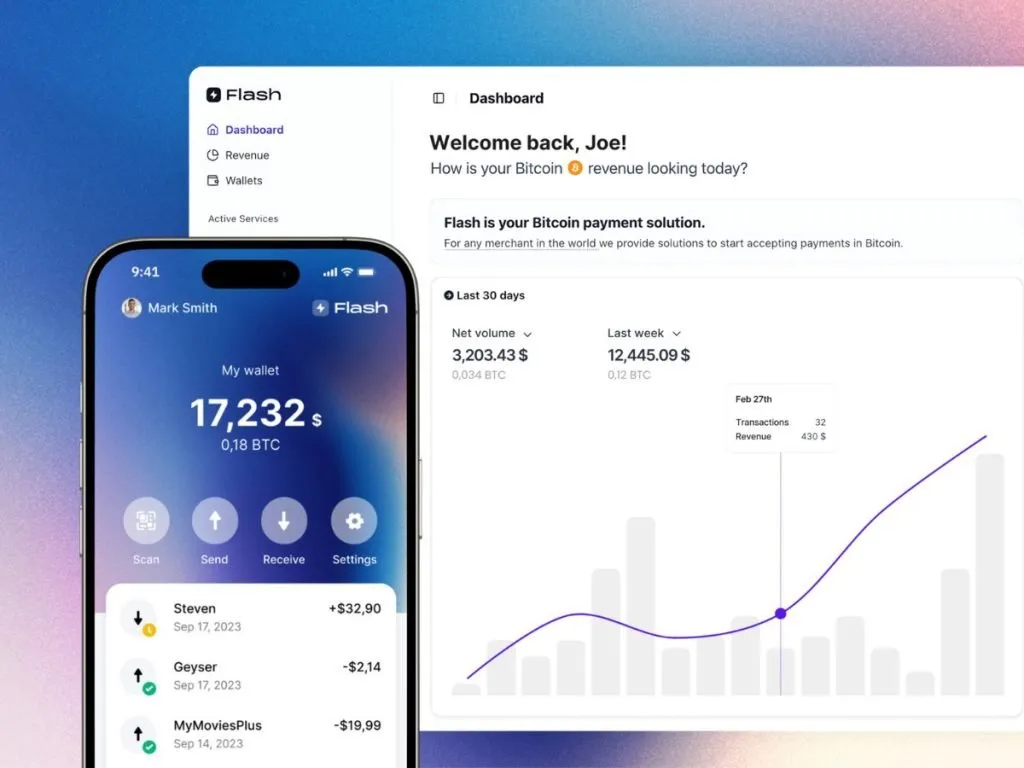
2. Lemon Squeezy – The SaaS-Focused Alternative
Dubbed as “acq’d by Stripe,” Lemon Squeezy offers a comprehensive solution specifically designed for digital product sales and SaaS businesses. It provides strong customer support, built-in analytics, and handles payments, subscriptions, global tax compliance, and fraud prevention in one platform.
3. Gumroad – Creator Economy Champion
Gumroad has carved out a niche serving creators and small businesses by providing tools for selling digital products, physical goods, and subscriptions. It’s particularly popular among content creators, artists, and independent entrepreneurs who want to experiment with various ideas and formats. They also open-sourced their code which is quite the ‘chad-move’.
4. Paddle – All-in-One SaaS Commerce
Paddle caters to SaaS and software companies by offering a comprehensive platform with billing, licensing, and global tax handling capabilities. It’s designed to be a complete solution for subscription-based businesses, handling payments, tax, and subscription management in one platform.
5. FastSpring – Global E-commerce Specialist
FastSpring specializes in e-commerce solutions for software and SaaS companies, with a focus on global payments and subscription management. According to TechnologyAdvice, it’s particularly strong for international transactions and helps companies sell more, stay lean, and compete big.
6. 2Checkout – Versatile Payment Solutions
2Checkout (now part of Verifone) offers versatile payment solutions excelling in global payments, subscription billing, and digital commerce. One of the best stripe alternatives as it’s an all-in-one monetization platform that maximizes revenues and makes global online sales easier, supporting over 200 countries and territories.
7. Payoneer – Cross-Border Payment Expert
Payoneer simplifies cross-border payment solutions, offering local payment ease globally with a focus on market expansion and multi-currency support. It’s trusted by small to medium-sized businesses for global payment solutions and international money transfers.
8. Chargebee – Subscription Management Leader
Chargebee is a subscription management platform perfect for SaaS and SMBs, with robust billing and revenue management features. If you were looking for stripe alternatives to setup subscriptions, Chargebee might be right for you. It streamlines revenue operations and helps businesses grow efficiently with comprehensive subscription billing capabilities.
9. Maxio (formerly Chargify) – B2B SaaS Billing
Maxio offers a robust platform for B2B SaaS billing and financial operations, focusing on growth and efficiency for subscription businesses. It’s the most complete financial operations platform for B2B SaaS, bringing core financial operations into one platform.
10. Recurly – Dynamic Subscription Management
Recurly offers dynamic subscription management platform, excelling in churn management and data insights for subscription growth. It’s the only proven platform that expands and protects your recurring revenue with subscription management, recurring billing, and payments orchestration.
11. Braintree – PayPal’s Enterprise Solution
Braintree (by PayPal) provides a versatile global payments platform, integrating multiple payment methods with a focus on conversion and security. It delivers end-to-end checkout experiences for businesses, offering single-touch payments and mobile optimization.
12. PayKickstart – Modern Commerce Platform
PayKickstart offers a modern commerce platform for online billing and affiliates, focusing on revenue maximization and churn minimization. It’s the most complete checkout, recurring billing, affiliate management, and retention solution with global capabilities.
13. PayPro Global – Full-Service E-commerce
PayPro Global offers a full-service eCommerce solution for selling software and SaaS, focusing on global payments, tax compliance, and customer support. It provides flexible solutions with over 70 payment methods and great support for software companies.
14. Shopify Payments – E-commerce Integration
Integrated with Shopify, this service is ideal for SMBs in eCommerce, offering a seamless shopping cart and payment experience. It’s the simplest way to accept online payments, automatically set up for major methods with no fees for some payment types.
15. Square – Versatile POS and Payment Solutions
Square provides versatile POS and payment solutions for small businesses with a strong focus on retail and mobile payments. Forbes Advisor notes it as one of the top alternatives for businesses needing both online and offline payment capabilities.
16. Zoho Billing – Integrated Business Solution
Zoho Billing is an online recurring billing and subscription management solution, ideal for small and medium-sized businesses seeking professional invoice creation, time and expense tracking, and improved cash flow management. Zoho isn’t just competing for stripe alternatives, they offer a ton of other products and services.
17. WePay – Chase Company Integration
WePay, a Chase company, provides integrated payment solutions for ISVs and SaaS companies with customizable payment solutions. It’s designed for platforms like marketplaces and small business tools, offering seamless user experience and fraud protection.
18. QuickBooks Payments – SMB Accounting Integration
This service provides seamless accounting and payment solutions for SMBs and SaaS businesses, featuring real-time tracking and automated bookkeeping. It lets small businesses accept payments online from anywhere with easy integration into QuickBooks accounting.
19. Mangopay – Marketplace Payment Infrastructure
Mangopay offers a modular payment infrastructure for marketplaces and platforms, emphasizing flexibility, global payouts, and AI-powered anti-fraud. It uses flexible wallets built to orchestrate fund flows and monetize payment experiences.
20. Coinbase Commerce – Cryptocurrency Payments
Coinbase Commerce enables businesses to accept payments from around the world using cryptocurrency. It offers instant settlement, low fees, and broad asset support, making it easy for merchants to accept digital currency payments globally.
21. BTCPay Server – Open-Source Bitcoin Processor
BTCPay Server is a self-hosted, open-source cryptocurrency payment processor with 0% fees and no third-party involvement. It’s secure, private, censorship-resistant, and completely free for businesses wanting full control over their Bitcoin payments.
22. Lago – Open-Source Billing Alternative
Lago is an open-source alternative to Stripe Billing and Chargebee, specializing in billing and metering in one place for usage-b
-
 @ dfa02707:41ca50e3
2025-06-15 22:02:40
@ dfa02707:41ca50e3
2025-06-15 22:02:40News
- Bitcoin mining centralization in 2025. According to a blog post by b10c, Bitcoin mining was at its most decentralized in May 2017, with another favorable period from 2019 to 2022. However, starting in 2023, mining has become increasingly centralized, particularly due to the influence of large pools like Foundry and the use of proxy pooling by entities such as AntPool.

Source: b10c's blog.
- OpenSats announces the eleventh wave of Nostr grants. The five projects in this wave are the mobile live-streaming app Swae, the Nostr-over-ham-radio project HAMSTR, Vertex—a Web-of-Trust (WOT) service for Nostr developers, Nostr Double Ratchet for end-to-end encrypted messaging, and the Nostr Game Engine for building games and applications integrated with the Nostr ecosystem.
- New Spiral grantee: l0rinc. In February 2024, l0rinc transitioned to full-time work on Bitcoin Core. His efforts focus on performance benchmarking and optimizations, enhancing code quality, conducting code reviews, reducing block download times, optimizing memory usage, and refactoring code.
- Project Eleven offers 1 BTC to break Bitcoin's cryptography with a quantum computer. The quantum computing research organization has introduced the Q-Day Prize, a global challenge that offers 1 BTC to the first team capable of breaking an elliptic curve cryptographic (ECC) key using Shor’s algorithm on a quantum computer. The prize will be awarded to the first team to successfully accomplish this breakthrough by April 5, 2026.
- Unchained has launched the Bitcoin Legacy Project. The initiative seeks to advance the Bitcoin ecosystem through a bitcoin-native donor-advised fund platform (DAF), investments in community hubs, support for education and open-source development, and a commitment to long-term sustainability with transparent annual reporting.
- In its first year, the program will provide support to Bitcoin hubs in Nashville, Austin, and Denver.
- Support also includes $50,000 to the Bitcoin Policy Institute, a $150,000 commitment at the University of Austin, and up to $250,000 in research grants through the Bitcoin Scholars program.
"Unchained will match grants 1:1 made to partner organizations who support Bitcoin Core development when made through the Unchained-powered bitcoin DAF, up to 1 BTC," was stated in a blog post.
- Block launched open-source tools for Bitcoin treasury management. These include a dashboard for managing corporate bitcoin holdings and provides a real-time BTC-to-USD price quote API, released as part of the Block Open Source initiative. The company’s own instance of the bitcoin holdings dashboard is available here.
Source: block.xyz
- Bull Bitcoin expands to Mexico, enabling anyone in the country to receive pesos from anywhere in the world straight from a Bitcoin wallet. Additionally, users can now buy Bitcoin with a Mexican bank account.
"Bull Bitcoin strongly believes in Bitcoin’s economic potential in Mexico, not only for international remittances and tourism, but also for Mexican individuals and companies to reclaim their financial sovereignty and protect their wealth from inflation and the fragility of traditional financial markets," said Francis Pouliot, Founder and CEO of Bull Bitcoin.
- Corporate bitcoin holdings hit a record high in Q1 2025. According to Bitwise, public companies' adoption of Bitcoin has hit an all-time high. In Q1 2025, these firms collectively hold over 688,000 BTC, marking a 16.11% increase from the previous quarter. This amount represents 3.28% of Bitcoin's fixed 21 million supply.

Source: Bitwise.
- The Bitcoin Bond Company for institutions has launched with the aim of acquiring $1 trillion in Bitcoin over 21 years. It utilizes secure, transparent, and compliant bond-like products backed by Bitcoin.
- The U.S. Senate confirmed Paul Atkins as Chair of the Securities and Exchange Commission (SEC). At his confirmation hearing, Atkins emphasized the need for a clear framework for digital assets. He aims to collaborate with the CFTC and Congress to address jurisdiction and rulemaking gaps, aligning with the Trump administration's goal to position the U.S. as a leader in Bitcoin and blockchain finance.
- Ethereum developer Virgil Griffith has been released from custody. Griffith, whose sentence was reduced to 56 months, is now seeking a pardon. He was initially sentenced to 63 months for allegedly violating international sanctions laws by providing technical advice on using cryptocurrencies and blockchain technology to evade sanctions during a presentation titled 'Blockchains for Peace' in North Korea.
- No-KYC exchange eXch to close down under money laundering scrutiny. The privacy-focused cryptocurrency trading platform said it will cease operations on May 1. This decision follows allegations that the platform was used by North Korea's Lazarus Group for money laundering. eXch revealed it is the subject of an active "transatlantic operation" aimed at shutting down the platform and prosecuting its team for "money laundering and terrorism."
- Blockstream combats ESP32 FUD concerning Jade signers. The company stated that after reviewing the vulnerability disclosed in early March, Jade was found to be secure. Espressif Systems, the designer of the ESP32, has since clarified that the "undocumented commands" do not constitute a "backdoor."
- Bank of America is lobbying for regulations that favor banks over tech firms in stablecoin issuance. The bank's CEO Brian Moynihan is working with groups such as the American Bankers Association to advance the issuance of a fully reserved, 1:1 backed "Bank of America coin." If successful, this could limit stablecoin efforts by non-banks like Tether, Circle, and others, reports The Block.
- Tether to back OCEAN Pool with its hashrate. "As a company committed to financial freedom and open access, we see supporting decentralization in Bitcoin mining as essential to the network’s long-term integrity," said Tether CEO Paolo Ardoino.
- Bitdeer to expand its self-mining operations to navigate tariffs. The Singapore-based mining company is advancing plans to produce machines in the U.S. while reducing its mining hardware sales. This response is in light of increasing uncertainties related to U.S. trade policy, as reported by Bloomberg.
- Tether acquires $32M in Bitdeer shares. The firm has boosted its investment in Bitdeer during a wider market sell-off, with purchases in early to mid-April amounting to about $32 million, regulatory filings reveal.
- US Bitcoin miner manufacturer Auradine has raised $153 million in a Series C funding round as it expands into AI infrastructure. The round was led by StepStone Group and included participation from Maverick Silicon, Premji Invest, Samsung Catalyst Fund, Qualcomm Ventures, Mayfield, MARA Holdings, GSBackers, and other existing investors. The firm raised to over $300 million since its inception in 2022.
- Voltage has partnered with BitGo to [enable](https://www.voltage.cloud/blog/bitgo-and-voltage-team-up-to-deliver-instant-bitcoin-and-stabl
-
 @ 7f6db517:a4931eda
2025-06-15 21:01:51
@ 7f6db517:a4931eda
2025-06-15 21:01:51
The newly proposed RESTRICT ACT - is being advertised as a TikTok Ban, but is much broader than that, carries a $1M Fine and up to 20 years in prison️! It is unconstitutional and would create massive legal restrictions on the open source movement and free speech throughout the internet.
The Bill was proposed by: Senator Warner, Senator Thune, Senator Baldwin, Senator Fischer, Senator Manchin, Senator Moran, Senator Bennet, Senator Sullivan, Senator Gillibrand, Senator Collins, Senator Heinrich, and Senator Romney. It has broad support across Senators of both parties.
Corrupt politicians will not protect us. They are part of the problem. We must build, support, and learn how to use censorship resistant tools in order to defend our natural rights.
The RESTRICT Act, introduced by Senators Warner and Thune, aims to block or disrupt transactions and financial holdings involving foreign adversaries that pose risks to national security. Although the primary targets of this legislation are companies like Tik-Tok, the language of the bill could potentially be used to block or disrupt cryptocurrency transactions and, in extreme cases, block Americans’ access to open source tools or protocols like Bitcoin.
The Act creates a redundant regime paralleling OFAC without clear justification, it significantly limits the ability for injured parties to challenge actions raising due process concerns, and unlike OFAC it lacks any carve-out for protected speech. COINCENTER ON THE RESTRICT ACT
If you found this post helpful support my work with bitcoin.

-
 @ cae03c48:2a7d6671
2025-06-15 22:01:44
@ cae03c48:2a7d6671
2025-06-15 22:01:44Bitcoin Magazine

Bitcoin: How To Solve the Student Loan CrisisStudent loans continue to trouble millions of Americans, with a total of $1.77 trillion already owed. This crisis has been a major political issue for a while, especially after former President Biden promised to wipe out all of the student loan debt and ended up only fulfilling half of the promise. These billions of dollars are not just numbers on a spreadsheet; they represent people who repay their debt, every month, year in and year out. While the standard repayment plan spans 10 years, the reality is far more daunting: The average borrower takes 20-30 years to repay their loans.
There are over two million new undergraduates every year, and, on average, they graduate with $29,400 in debt. Some, like medical students, surpass $250,000 in debt — a mortgage-sized pile. Almost $100 billion in new debt is created every year, piled upon the already unsustainable student debt pile. Similar to how we have (haven’t) dealt with public pensions, instead of dismantling a failed system we keep feeding the machine and crushing people’s lives and dreams underneath its weight. But perhaps there’s a way for future generations to avoid this dreadful fate — by borrowing new ideas from similar fields.
Real Estate: The Store of Value (SoV) Since Nixon
The real estate market is another system that heavily relies on debt to keep functioning, and like student loans, it’s not working too well.
Real estate is a market where it’s completely normal to go 10x levered long on a single asset while putting all of your savings into it. Talk about idiosyncratic risk. The entire market has been in deep pain worldwide, not necessarily because of the debt, but due to how the fiat system has turned real estate into an investment-and-savings mechanism. In turn, the great investment of one generation becomes the unaffordable housing for the next. But a subset of the population has been divesting from the asset in favor of a better savings vehicle: bitcoin.
Part of their thesis in divesting from real estate and moving to bitcoin is that they predict that bitcoin’s superior SoV function will drive real estate prices down, wreaking havoc on a fragile and overpriced asset class. This makes quite a bit of sense, especially to those individuals who invested in real estate in search of those SoV properties in the first place; they now have to contend with increasing risk all over the world, putting in peril what was once a “safe SoV” asset class. From wildfires all over the place to floods, expropriations, new taxes, and wars breaking out in places previously unimaginable, some investors are just fed up.
But housing is still necessary, and we still need to build a massive amount of new houses. In almost all major cities in the world, there’s a housing crisis driven in large part by shortages. This is due to lackluster housing buildouts following the 2008 great financial crisis, driven directly by housing debt. Thus, even if all of the real estate owners put all of their stock of housing into the market, we would still have to develop and construct new ones. But it’s hard to convince real estate developers to do so when you also tell them that, in bitcoin terms, the houses they are building will be worth less by the time they sell them.
Bitcoin Replaces Real Estate
That’s where a German Bitcoiner and real estate developer named Leon Wankum steps in and turns the problem into a solution. You may even say he used financial jiu-jitsu because his idea is to bundle new, debt-heavy real estate projects with a bitcoin fund. This way, a $10 million project — of which $9 million is debt-financed — would allocate a small percentage of the financing to bitcoin, in order to hedge the depreciation and devaluation of the main asset and thereby benefit from the appreciation of bitcoin. This way, real estate developers can leverage the debt-heavy nature of the real estate market to cover the demand for housing while also hedging themselves from any SoV risk that bitcoin may pose to that asset.
This seemed like a crazy idea. Bitcoin and real estate: a super conservative mainstream infrastructure investment combined with a hyper-volatile digital savings vehicle — an unlikely marriage. Yet, polar opposites attract, and an idea is only crazy until someone replicates it and makes it work.
To everyone’s surprise, that’s exactly what happened last year, when Andrew Hohns of Newmarket Capital went on TV to announce they had started applying Wankum’s model to offer a loan to a real estate developer. They had provided financing for a real estate project with a few special conditions:
- the developer had to use a small proportion to buy bitcoin, which was placed in escrow.
- the bitcoin is inextricably tied with the real estate asset.
- and the bitcoin has to be held for four years minimum.
The experiment was off to the races. If the past serves as a guide, this new investment structure will greatly reduce the burden of the loan.
Bitcoin and Student Debts, Rescuing the Next Generation
At this point, the parallels to student loans should be pretty clear. When 18-year-olds take out a mortgage-sized loan to bet on their education, their future human capital is effectively becoming the real estate (collateral) that backs the debt. Their capacity to make extra income from the knowledge and certificates they acquired by going into debt will help them pay it off (given that all goes well). Investment margins become very sensitive and risk increases immensely when huge amounts of leverage are added to any investment — be it trading stocks, real estate, or your future. Your room for maneuvering decreases, and you get trapped in the path you choose.
Thus, if you yourself become the real estate securing this mortgage-sized student debt, perhaps you could also secure that loan and reduce the burden on the main asset (you) by integrating bitcoin into the mix. This could have great benefits for all parties involved: decreasing the risk for the lender and giving increased peace of mind and opportunities for the borrower (you, the student).
One of the main advantages of adding bitcoin to your student debt structure is that there are now two assets rowing against the financial repayment current: yourself and bitcoin. By going to university, learning new skills and getting certificates, you open up the path to better-paid jobs and higher earning potentials, aka higher salaries. The more intriguing component is the bitcoin tied to your student debts. As a teenager itself, bitcoin has had an incredible CAGR over its lifespan. Even conservative numbers indicate that bitcoin will return about 60% annually for the foreseeable future. When compared with the 10-15% usually provided by the S&P 500, bitcoin looks like a Ferrari competing against horses.
The other advantage is one that frustrates most students, and it has to do with acquiring bitcoin once they understand it. Unlike most adults, undergrads have barely had any time to build up savings, and are therefore unable to exchange much fiat for hard bitcoin. This can become incredibly frustrating, especially because you know that if you were a decade older, you could have aped into bitcoin and retired your entire bloodline. But now you are stuck being 16, saving up pennies, and sacrificing your younger years for trifling amounts of bitcoin that won’t make a difference in your lifetime. So close, yet so far away.
But what is debt if not a way to bring future purchasing power into the present? Debt is a time-traveling machine that allows people to buy assets by leveraging their future earnings, revenues, or salaries. And thankfully, the current system is created so that the moment you can legally go to jail or go to war, you can also indebt yourself up to your eyeballs with the promise of future wages as a doctor, engineer, lawyer, or another profession.
Funnily enough, bitcoin’s recommended minimum holding time is also the number of years for an average college degree — four years. This means that, as long as you create a similar structure as the one proposed by Newmarket Capital, where the bitcoin has a four-year holding period, you’ll be using financial jiu-jitsu. The four-year holding period, however, does not mean that the student needs to sell at that point. The question of how to manage your finances between repaying the student loans, selling the bitcoin, or acquiring more is a more complex and personal issue. Regardless of what any student does, with this hybrid method, student debts can help young Bitcoiners leap forward instead of taking a step back.
With this new method, students — and their families — now have another thing to celebrate when they walk onto the graduation stage. And if you drop out of school, for any set of reasons that life may hit you with, your student loan now comes with a fail-safe met
-
 @ cae03c48:2a7d6671
2025-06-15 22:01:21
@ cae03c48:2a7d6671
2025-06-15 22:01:21Bitcoin Magazine

Where Could Bitcoin Peak This Cycle?With Bitcoin looking as bullish as ever, the inevitable question arises of how high could BTC realistically go in this market cycle? Here we’ll explore a wide range of on-chain valuation models and cycle timing tools to identify plausible price targets for a Bitcoin peak. Although prediction is never a substitute for disciplined data reaction, this analysis gives us frameworks to better understand where we are and where we might be heading.
Price Forecast Tools
The journey begins with Bitcoin Magazine Pro’s free Price Forecast Tools, which compile several historically accurate valuation models. While it’s always more effective to react to data rather than blindly predict prices, studying these metrics can still provide powerful context for market behavior. If macro, derivative, and on-chain data all start flashing warnings, it’s usually a solid time to take profit, regardless of whether a specific price target has been hit. Still, exploring these valuation tools is informative and can guide strategic decision-making when used alongside broader market analysis.
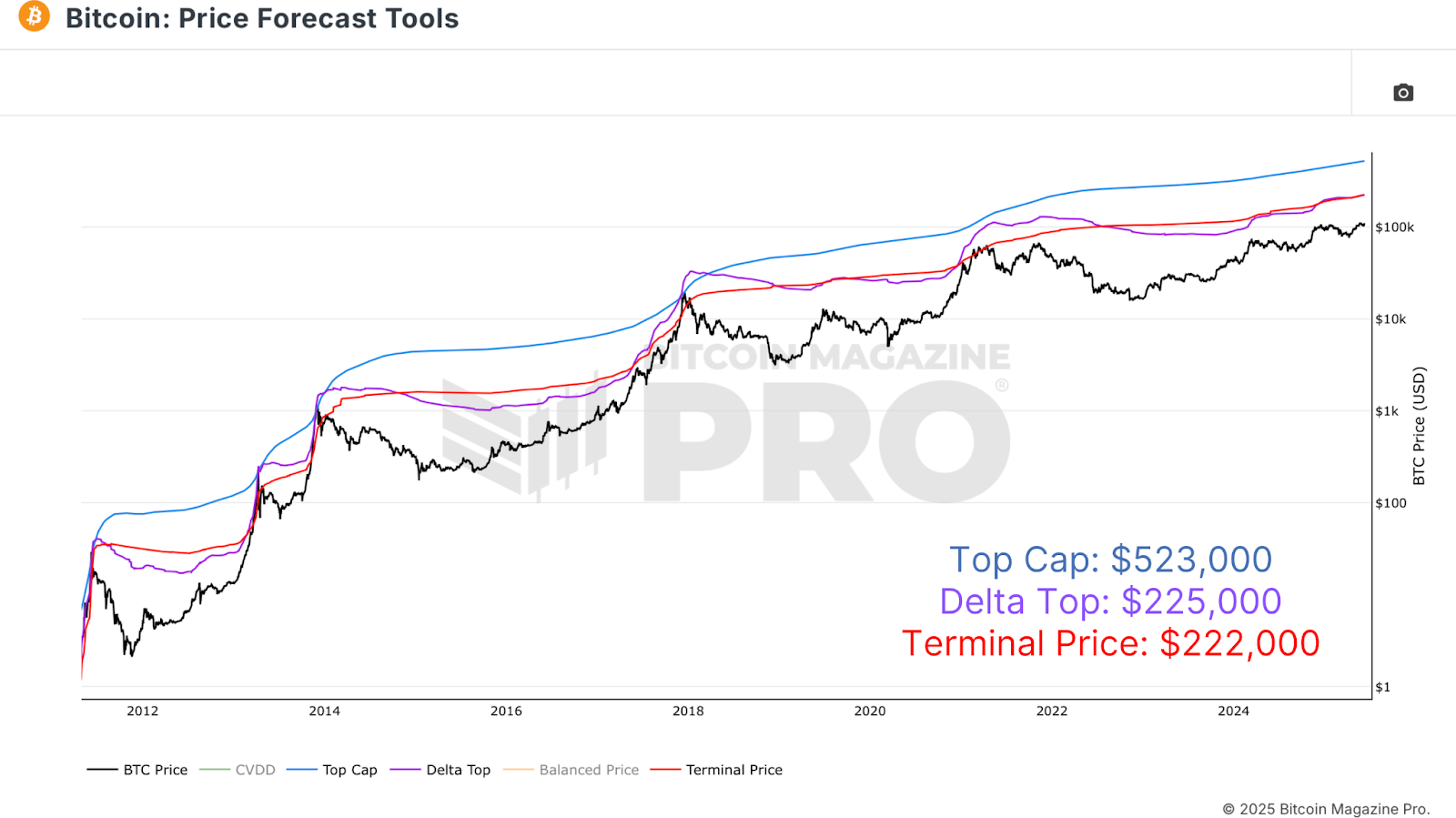
Figure 1: Applying Price Forecast Tools to calculate potential cycle tops. View Live Chart
Among the key models, the Top Cap multiplies the average cap over time by 35 to project peak valuations. It accurately forecasted 2017’s top, but missed the 2020–2021 cycle, estimating over $200k while Bitcoin peaked around $69k. It now targets over $500k, which feels increasingly unrealistic. A step further is the Delta Top, subtracting the average cap from the realized cap, based on the cost basis of all circulating BTC, to generate a more grounded projection. This model suggested an $80k–$100k top last cycle. The most consistently accurate, however, is the Terminal Price, based on Supply Adjusted Coin Days Destroyed, which has closely aligned with each prior peak, including the $64k top in 2021. Currently projecting around $221k, it could rise to $250k or more, and remains arguably the most credible model for forecasting macro Bitcoin tops. Of course, more information regarding all of these metrics and their calculation logic can be found beneath the charts on the site.
Peak Forecasting
Another powerful metric is the MVRV ratio, which compares market cap to realized cap. It offers a psychological window into investor sentiment, typically peaking near a value of 4 in major cycles. The ratio currently sits at 2.34, suggesting there may still be room for significant upside. Historically, as MVRV nears 3.5 to 4, long-term holders begin to realize substantial gains, often signaling cycle maturity. However, with diminishing returns, we might not reach a full 4 this time around. Instead, using a more conservative estimate of 3.5, we can begin projecting more grounded peak values.
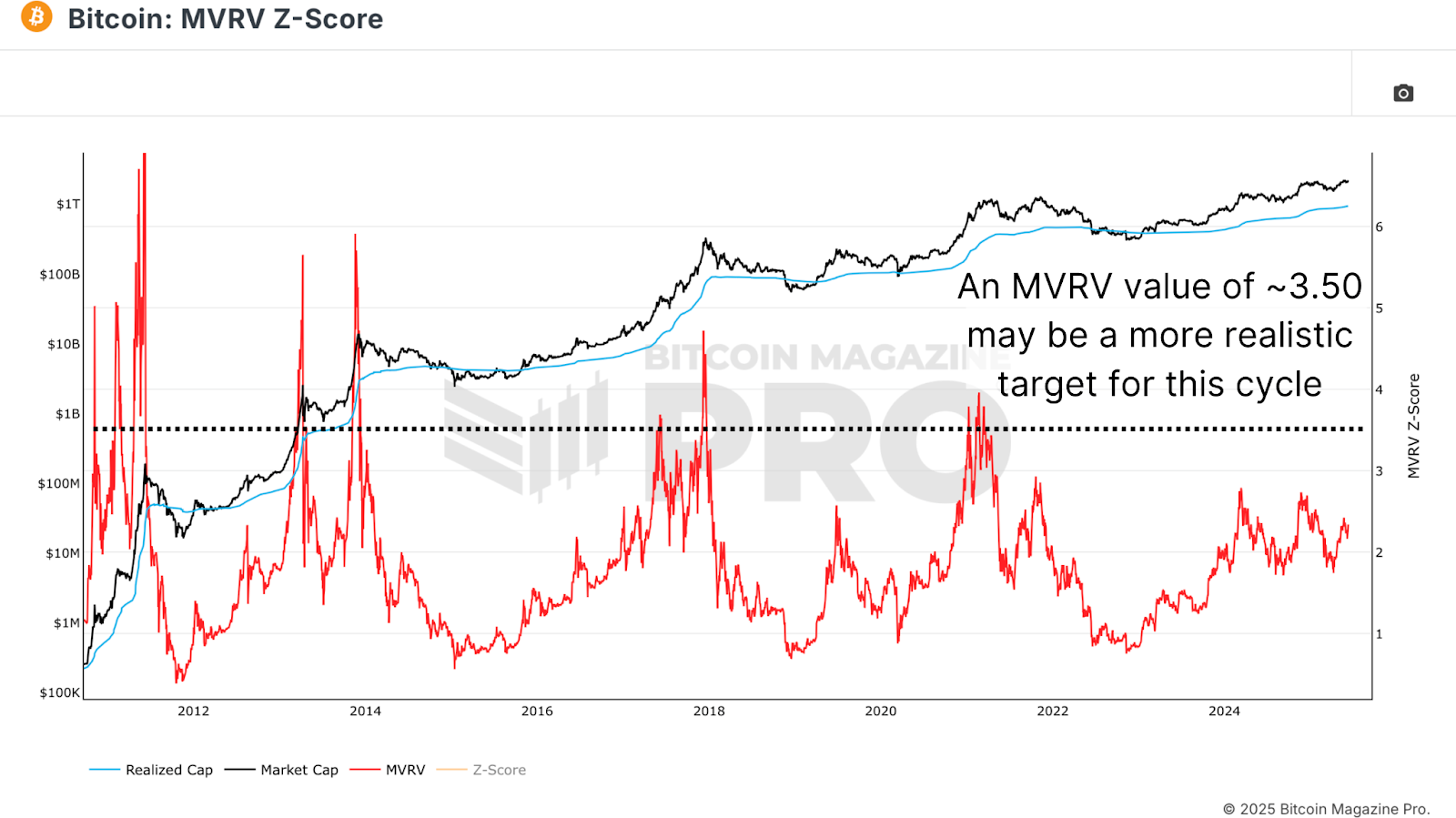
Figure 2: A view of the MVRV ratio predicts further cycle growth to reach historical 4+ and even more conservative 3.5 target values. View Live Chart
Calculating A Target
Timing is as important as valuation. Analysis of BTC Growth Since Cycle Lows illustrates that previous Bitcoin cycles peaked almost exactly 1,060 days from their respective lows. Currently, we are about 930 days into this cycle. If the pattern holds, we can estimate the peak may arrive in roughly 130 days. Historical FOMO-driven price increases often happen late in the cycle, causing Realized Price, a proxy for average investor cost basis, to rise rapidly. For instance, in the final 130 days of the 2017 cycle, realized price grew 260%. In 2021, it increased by 130%. If we assume a further halving of growth due to diminishing returns, a 65% rise from the current $47k realized price brings us to around $78k by October 18.
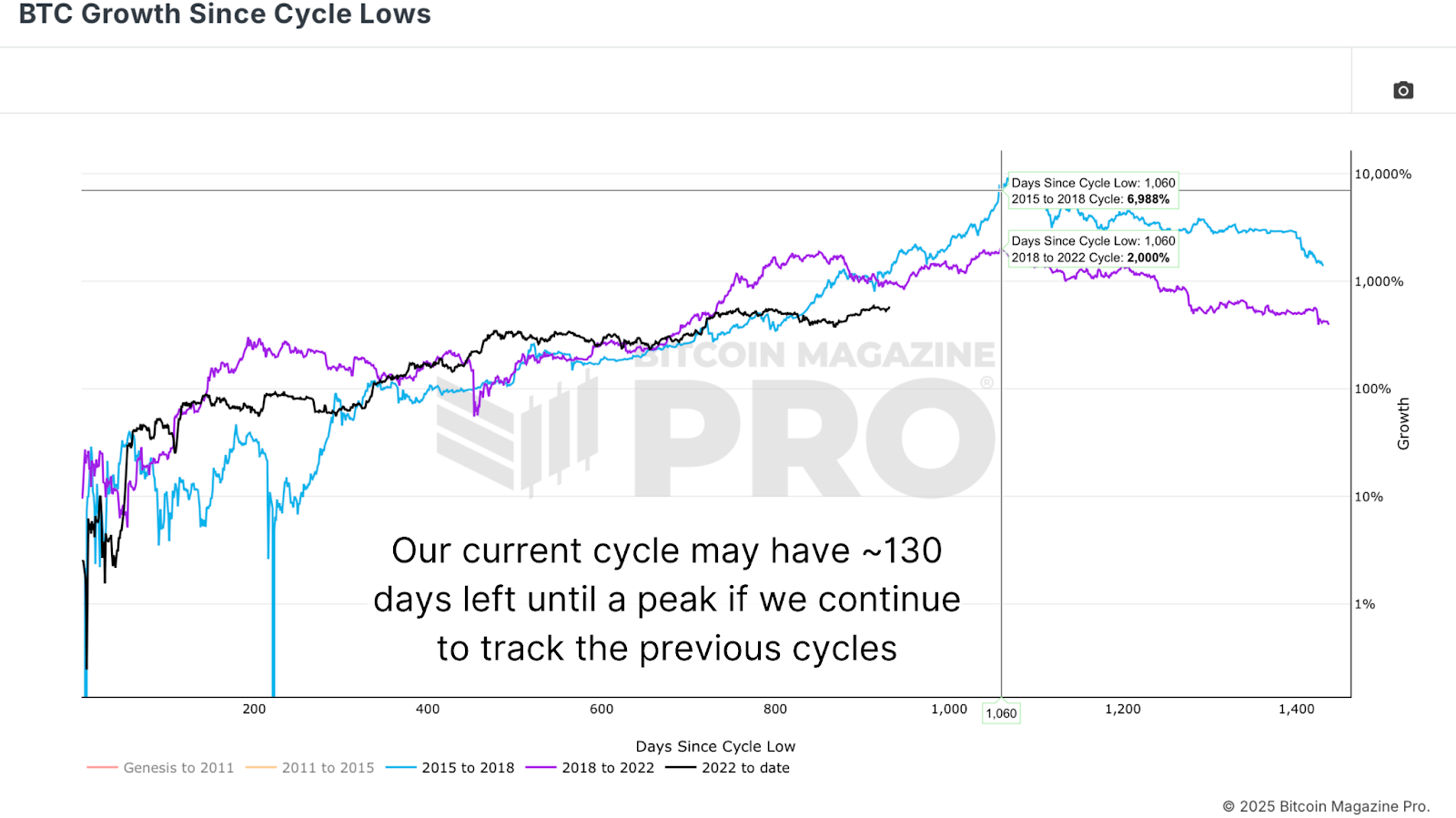
Figure 3: Based on the peak rate of previous cycles, this cycle is far from over. View Live Chart
With a projected $78k realized price and a conservative MVRV target of 3.5, we arrive at a potential Bitcoin price peak of $273,000. While that may feel ambitious, historical parabolic blowoff tops have shown that such moves can happen in weeks, not months. While it may seem more realistic to expect a peak closer to $150k to $200k, the math and on-chain evidence suggest that a higher valuation is at least within the realm of possibility. It’s also worth noting that these models dynamically adjust, and if late-cycle euphoria kicks in, projections could quickly accelerate further.
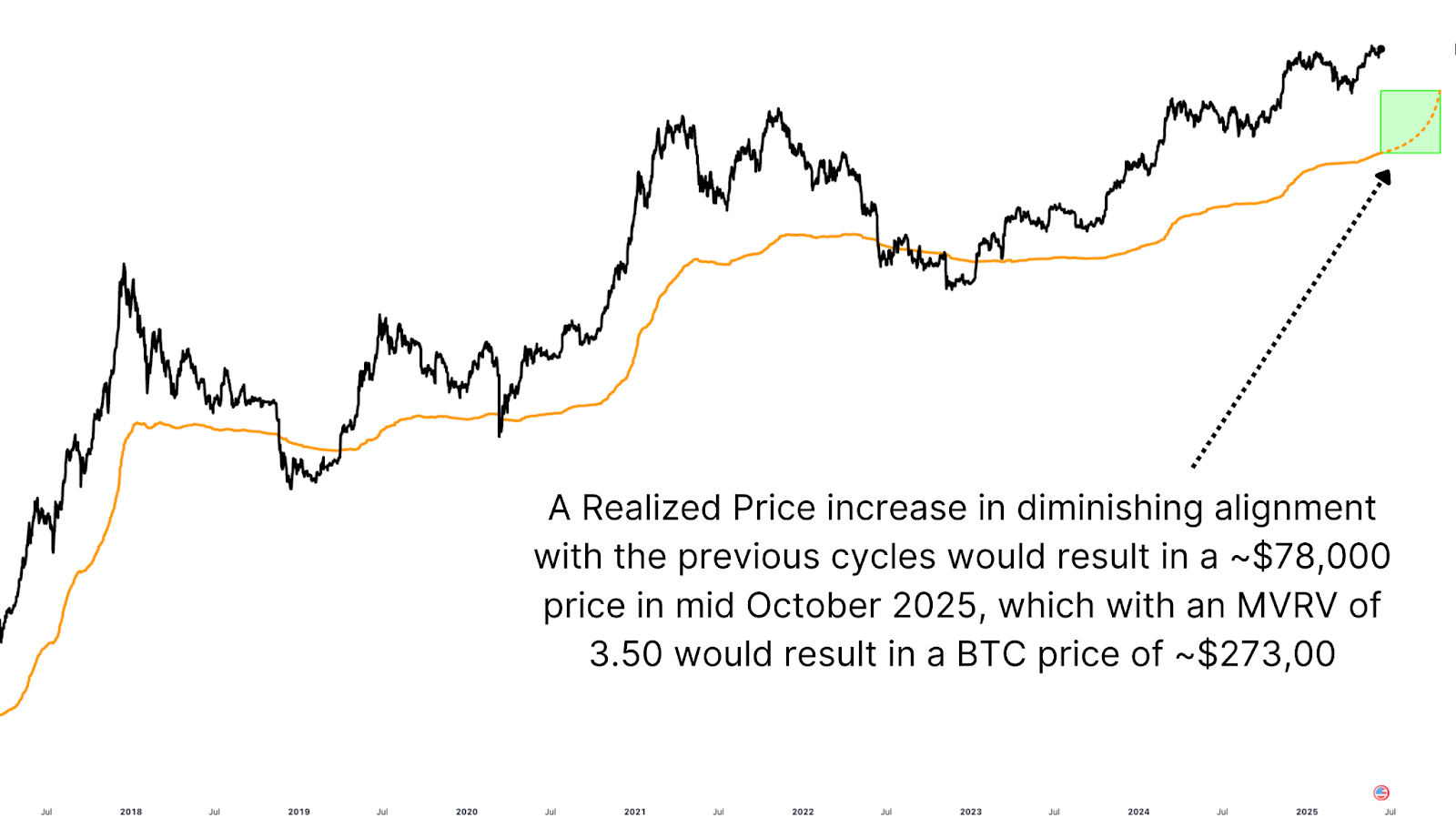
Figure 4: Combining projected realized price and a possible MVRV target to predict this cycle’s peak.
Conclusion
Forecasting Bitcoin’s exact peak is inherently uncertain, with too many variables to account for. What we can do is position ourselves with probabilistic frameworks grounded in historical precedent and on-chain data. Tools like the MVRV ratio, Terminal Price, and Delta Top have repeatedly demonstrated their value in anticipating market exhaustion. While a $273,000 target might seem optimistic, it is rooted in past patterns, current network behavior, and cycle-timing logic. Ultimately, the best strategy is to react to data, not rigid price levels. Use these tools to inform your thesis, but stay nimble enough to take profits when the broader ecosystem starts signaling the top.
For more deep-dive research, technical indicators, real-time market alerts, and access to a growing community of analysts, visit BitcoinMagazinePro.com.
Disclaimer: This article is for informational purposes only and should not be considered financial advice. Always do your own research before making any investment decisions.
This post Where Could Bitcoin Peak This Cycle? first appeared on Bitcoin Magazine and is written by Matt Crosby.
-
 @ 7f6db517:a4931eda
2025-06-15 21:01:51
@ 7f6db517:a4931eda
2025-06-15 21:01:51
What is KYC/AML?
- The acronym stands for Know Your Customer / Anti Money Laundering.
- In practice it stands for the surveillance measures companies are often compelled to take against their customers by financial regulators.
- Methods differ but often include: Passport Scans, Driver License Uploads, Social Security Numbers, Home Address, Phone Number, Face Scans.
- Bitcoin companies will also store all withdrawal and deposit addresses which can then be used to track bitcoin transactions on the bitcoin block chain.
- This data is then stored and shared. Regulations often require companies to hold this information for a set number of years but in practice users should assume this data will be held indefinitely. Data is often stored insecurely, which results in frequent hacks and leaks.
- KYC/AML data collection puts all honest users at risk of theft, extortion, and persecution while being ineffective at stopping crime. Criminals often use counterfeit, bought, or stolen credentials to get around the requirements. Criminals can buy "verified" accounts for as little as $200. Furthermore, billions of people are excluded from financial services as a result of KYC/AML requirements.
During the early days of bitcoin most services did not require this sensitive user data, but as adoption increased so did the surveillance measures. At this point, most large bitcoin companies are collecting and storing massive lists of bitcoiners, our sensitive personal information, and our transaction history.
Lists of Bitcoiners
KYC/AML policies are a direct attack on bitcoiners. Lists of bitcoiners and our transaction history will inevitably be used against us.
Once you are on a list with your bitcoin transaction history that record will always exist. Generally speaking, tracking bitcoin is based on probability analysis of ownership change. Surveillance firms use various heuristics to determine if you are sending bitcoin to yourself or if ownership is actually changing hands. You can obtain better privacy going forward by using collaborative transactions such as coinjoin to break this probability analysis.
Fortunately, you can buy bitcoin without providing intimate personal information. Tools such as peach, hodlhodl, robosats, azteco and bisq help; mining is also a solid option: anyone can plug a miner into power and internet and earn bitcoin by mining privately.
You can also earn bitcoin by providing goods and/or services that can be purchased with bitcoin. Long term, circular economies will mitigate this threat: most people will not buy bitcoin - they will earn bitcoin - most people will not sell bitcoin - they will spend bitcoin.
There is no such thing as KYC or No KYC bitcoin, there are bitcoiners on lists and those that are not on lists.
If you found this post helpful support my work with bitcoin.

-
 @ cae03c48:2a7d6671
2025-06-15 22:01:13
@ cae03c48:2a7d6671
2025-06-15 22:01:13Bitcoin Magazine

JPMorgan Reports Record Profits for Bitcoin Miners in Q1Bitcoin mining companies in the U.S. have kicked off 2025 with record performance, according to a recent report. The first quarter of the year was “one of Bitcoin miners’ best quarters to date,” analysts Reginald Smith and Charles Pearce stated.
JUST IN:
 JPMorgan reported Q1 2025 was one of the best periods on record for publicly traded bitcoin mining companies
JPMorgan reported Q1 2025 was one of the best periods on record for publicly traded bitcoin mining companies  pic.twitter.com/gs9fGiTbZV
pic.twitter.com/gs9fGiTbZV— Bitcoin Magazine (@BitcoinMagazine) June 13, 2025
“Four of the five operators in our coverage reported record revenue and profits,” the report stated, underscoring the sector’s impressive rebound in profitability amid continued institutional adoption and high bitcoin prices, currently hovering around $105,462.87.
In total, U.S.-listed miners brought in $2.0 billion in gross profit during Q1 2025, with average gross margins reaching 53%—a jump from $1.7 billion and 50% in the previous quarter.
MARA Holdings (MARA) once again led the pack in Bitcoin production, mining the most BTC for the ninth consecutive quarter. However, despite its output dominance, MARA also posted the highest cost per coin, estimated at $72,600, JPMorgan noted.
On the profitability front, IREN (IREN) was the standout performer. For the first time, IREN earned the most gross profit among the tracked firms. The company also reported the lowest all-in cash cost per Bitcoin, around $36,400, helping to boost margins significantly.
CleanSpark (CLSK), another major player, did not raise any equity in the quarter—one of the more capital-disciplined moves seen among its peers. In fact, JPMorgan reported that the five miners it tracks issued only $310 million in equity for Q1, marking a steep decline from $1.3 billion in Q4 2024.
On the operational expense side, miners spent an estimated $1.8 billion on power, up $50 million from the previous quarter—demonstrating the energy-intensive nature of mining.
JPMorgan’s outlook on the industry remains bullish for select players. The bank maintains overweight ratings for CleanSpark, IREN, and Riot Platforms (RIOT), while assigning neutral ratings to Cipher Mining (CIFR) and MARA.
As profitability surges and strategic spending remains in check, 2025 may very well be remembered as a turning point in mining economics—especially for companies navigating cost discipline and scaling production.
This post JPMorgan Reports Record Profits for Bitcoin Miners in Q1 first appeared on Bitcoin Magazine and is written by Jenna Montgomery.
-
 @ dfa02707:41ca50e3
2025-06-15 22:02:39
@ dfa02707:41ca50e3
2025-06-15 22:02:39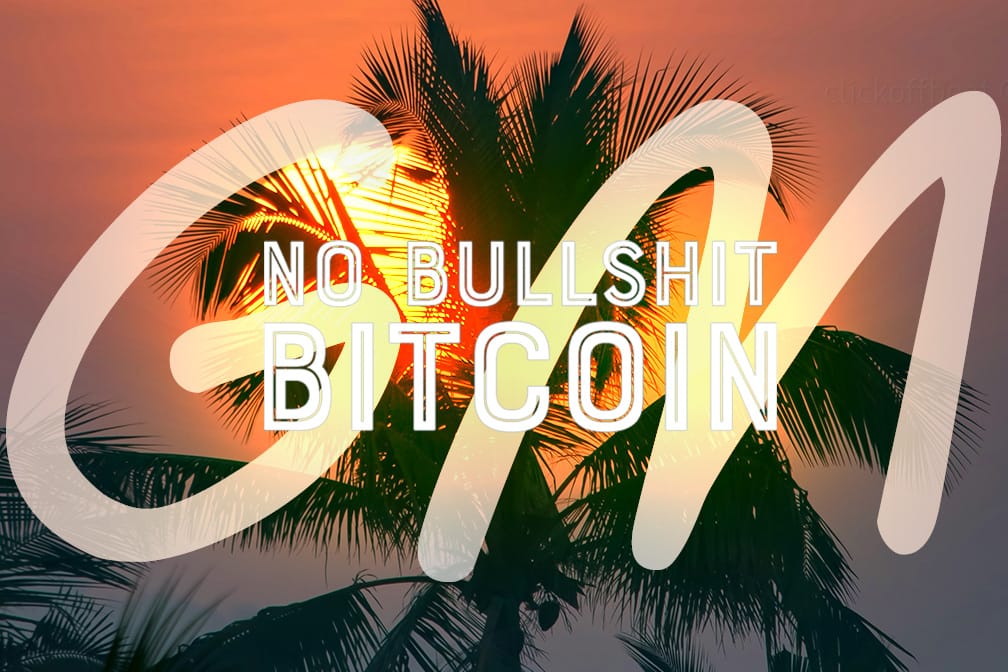
Good morning (good night?)! The No Bullshit Bitcoin news feed is now available on Moody's Dashboard! A huge shoutout to sir Clark Moody for integrating our feed.
Headlines
- Spiral welcomes Ben Carman. The developer will work on the LDK server and a new SDK designed to simplify the onboarding process for new self-custodial Bitcoin users.
- The Bitcoin Dev Kit Foundation announced new corporate members for 2025, including AnchorWatch, CleanSpark, and Proton Foundation. The annual dues from these corporate members fund the small team of open-source developers responsible for maintaining the core BDK libraries and related free and open-source software (FOSS) projects.
- Strategy increases Bitcoin holdings to 538,200 BTC. In the latest purchase, the company has spent more than $555M to buy 6,556 coins through proceeds of two at-the-market stock offering programs.
- Spar supermarket experiments with Bitcoin payments in Zug, Switzerland. The store has introduced a new payment method powered by the Lightning Network. The implementation was facilitated by DFX Swiss, a service that supports seamless conversions between bitcoin and legacy currencies.
- The Bank for International Settlements (BIS) wants to contain 'crypto' risks. A report titled "Cryptocurrencies and Decentralised Finance: Functions and Financial Stability Implications" calls for expanding research into "how new forms of central bank money, capital controls, and taxation policies can counter the risks of widespread crypto adoption while still fostering technological innovation."
- "Global Implications of Scam Centres, Underground Banking, and Illicit Online Marketplaces in Southeast Asia." According to the United Nations Office on Drugs and Crime (UNODC) report, criminal organizations from East and Southeast Asia are swiftly extending their global reach. These groups are moving beyond traditional scams and trafficking, creating sophisticated online networks that include unlicensed cryptocurrency exchanges, encrypted communication platforms, and stablecoins, fueling a massive fraud economy on an industrial scale.
- Slovenia is considering a 25% capital gains tax on Bitcoin profits for individuals. The Ministry of Finance has proposed legislation to impose this tax on gains from cryptocurrency transactions, though exchanging one cryptocurrency for another would remain exempt. At present, individual 'crypto' traders in Slovenia are not taxed.
- Circle, BitGo, Coinbase, and Paxos plan to apply for U.S. bank charters or licenses. According to a report in The Wall Street Journal, major crypto companies are planning to apply for U.S. bank charters or licenses. These firms are pursuing limited licenses that would permit them to issue stablecoins, as the U.S. Congress deliberates on legislation mandating licensing for stablecoin issuers.
"Established banks, like Bank of America, are hoping to amend the current drafts of [stablecoin] legislation in such a way that nonbanks are more heavily restricted from issuing stablecoins," people familiar with the matter told The Block.
- Charles Schwab to launch spot Bitcoin trading by 2026. The financial investment firm, managing over $10 trillion in assets, has revealed plans to introduce spot Bitcoin trading for its clients within the next year.
Use the tools
- Bitcoin Safe v1.2.3 expands QR SignMessage compatibility for all QR-UR-compatible hardware signers (SpecterDIY, KeyStone, Passport, Jade; already supported COLDCARD Q). It also adds the ability to import wallets via QR, ensuring compatibility with Keystone's latest firmware (2.0.6), alongside other improvements.
- Minibits v0.2.2-beta, an ecash wallet for Android devices, packages many changes to align the project with the planned iOS app release. New features and improvements include the ability to lock ecash to a receiver's pubkey, faster confirmations of ecash minting and payments thanks to WebSockets, UI-related fixes, and more.
- Zeus v0.11.0-alpha1 introduces Cashu wallets tied to embedded LND wallets. Navigate to Settings > Ecash to enable it. Other wallet types can still sweep funds from Cashu tokens. Zeus Pay now supports Cashu address types in Zaplocker, Cashu, and NWC modes.
- LNDg v1.10.0, an advanced web interface designed for analyzing Lightning Network Daemon (LND) data and automating node management tasks, introduces performance improvements, adds a new metrics page for unprofitable and stuck channels, and displays warnings for batch openings. The Profit and Loss Chart has been updated to include on-chain costs. Advanced settings have been added for users who would like their channel database size to be read remotely (the default remains local). Additionally, the AutoFees tool now uses aggregated pubkey metrics for multiple channels with the same peer.
- Nunchuk Desktop v1.9.45 release brings the latest bug fixes and improvements.
- Blockstream Green iOS v4.1.8 has renamed L-BTC to LBTC, and improves translations of notifications, login time, and background payments.
- Blockstream Green Android v4.1.8 has added language preference in App Settings and enables an Android data backup option for disaster recovery. Additionally, it fixes issues with Jade entry point PIN timeout and Trezor passphrase input.
- Torq v2.2.2, an advanced Lightning node management software designed to handle large nodes with over 1000 channels, fixes bugs that caused channel balance to not be updated in some cases and channel "peer total local balance" not getting updated.
- Stack Wallet v2.1.12, a multicoin wallet by Cypher Stack, fixes an issue with Xelis introduced in the latest release for Windows.
- ESP-Miner-NerdQAxePlus v1.0.29.1, a forked version from the NerdAxe miner that was modified for use on the NerdQAxe+, is now available.
- Zark enables sending sats to an npub using Bark.

- Erk is a novel variation of the Ark protocol that completely removes the need for user interactivity in rounds, addressing one of Ark's key limitations: the requirement for users to come online before their VTXOs expire.
- Aegis v0.1.1 is now available. It is a Nostr event signer app for iOS devices.
- Nostash is a NIP-07 Nostr signing extension for Safari. It is a fork of Nostore and is maintained by Terry Yiu. Available on iOS TestFlight.
- Amber v3.2.8, a Nostr event signer for Android, delivers the latest fixes and improvements.
- Nostur v1.20.0, a Nostr client for iOS, adds
-
 @ 7f6db517:a4931eda
2025-06-15 21:01:50
@ 7f6db517:a4931eda
2025-06-15 21:01:50
Bank run on every crypto bank then bank run on every "real" bank.
— ODELL (@ODELL) December 14, 2022
Good morning.
It looks like PacWest will fail today. It will be both the fifth largest bank failure in US history and the sixth major bank to fail this year. It will likely get purchased by one of the big four banks in a government orchestrated sale.
March 8th - Silvergate Bank
March 10th - Silicon Valley Bank
March 12th - Signature Bank
March 19th - Credit Suisse
May 1st - First Republic Bank
May 4th - PacWest Bank?PacWest is the first of many small regional banks that will go under this year. Most will get bought by the big four in gov orchestrated sales. This has been the playbook since 2008. Follow the incentives. Massive consolidation across the banking industry. PacWest gonna be a drop in the bucket compared to what comes next.
First, a hastened government led bank consolidation, then a public/private partnership with the remaining large banks to launch a surveilled and controlled digital currency network. We will be told it is more convenient. We will be told it is safer. We will be told it will prevent future bank runs. All of that is marketing bullshit. The goal is greater control of money. The ability to choose how we spend it and how we save it. If you control the money - you control the people that use it.
If you found this post helpful support my work with bitcoin.

-
 @ cae03c48:2a7d6671
2025-06-15 22:01:07
@ cae03c48:2a7d6671
2025-06-15 22:01:07Bitcoin Magazine
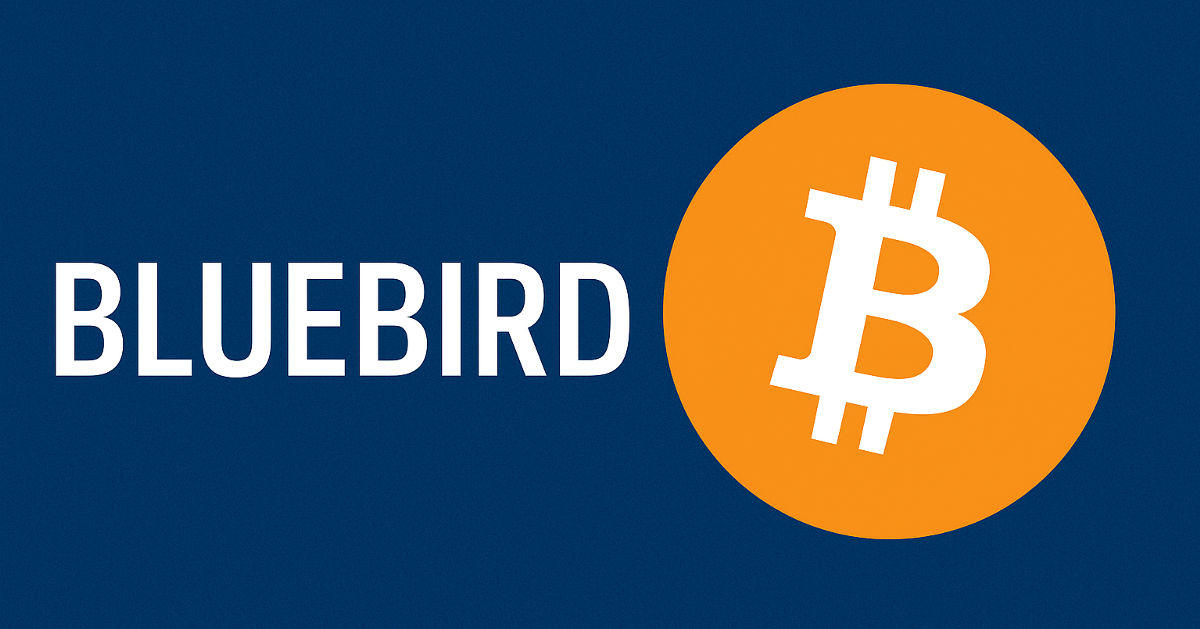
UK Gold Mining Company Bluebird to Convert Gold Revenues into BitcoinBluebird Mining Ventures Ltd., a pan Asian gold project development company, recently announced a major strategic shift. It plans to convert future revenues from its gold mining projects into bitcoin and adopt bitcoin as a treasury reserve asset.
Strategy shift to covert gold into digital gold – #bitcoin #goldmining #goldequities #investinbitcoin #investingold
"Combining income streams from gold mining projects and recycling these revenues into a proactive "Bitcoin in Treasury" management approach, whilst maintaining a… pic.twitter.com/BpJA6hFU9Y— Bluebird Mining Ventures Ltd (LSE:BMV.L) (@bluebirdIR) June 5, 2025
“By adopting a ‘gold plus a digital gold’ strategy, it offers the Company an opportunity to turn the page and look to the future and seek to attract a new type of shareholder,” said the Executive Director and CEO of Bluebird Aidan Bishop. “Under the leadership of a new CEO, once identified, it is my sincere hope that Bluebird will finally realise its ambitions for which it was initially established for.”
The announcement comes as Bluebird progresses towards a key agreement on its flagship Philippine project. The company expects to finalize a deal in the coming weeks that will grant it a net profit interest throughout the life of the mine, with no ongoing capital costs. The company said it believes bitcoin offers a modern alternative to traditional store of value assets like gold.
“I am very pleased with the progress of discussions in the Philippines which are looking very positive and will enable, if successfully completed, Bluebird to maintain an ongoing exposure with zero future cash commitments,” stated Bishop.
Bluebird plans to recycle revenues from its mining operations directly into bitcoin, aligning with what they describe as an innovative treasury approach. The company cited bitcoin’s fixed supply of 21 million, increasing global adoption, and role as a hedge against inflation and monetary instability as key reasons for its decision.
“Combining income streams from gold mining projects and recycling these revenues into a proactive ‘Bitcoin in Treasury’ management approach…” the company said. “Companies that have adopted bitcoin into their treasury strategy globally across public markets have been enjoying significant investor interest as well as substantial premiums to Net Asset Value (NAV) that have challenged traditional financial metrics as a basis of valuation.”
To lead this new phase, Bluebird is actively searching for a new CEO with experience in digital assets.
“On a personal level, I embarked some time ago on a journey to understand and learn about bitcoin,” added Bishop. “I am convinced that we are witnessing a tectonic shift in global markets and that bitcoin will reshape the landscape of financial markets on every level.”
This post UK Gold Mining Company Bluebird to Convert Gold Revenues into Bitcoin first appeared on Bitcoin Magazine and is written by Oscar Zarraga Perez.
-
 @ dfa02707:41ca50e3
2025-06-15 22:02:39
@ dfa02707:41ca50e3
2025-06-15 22:02:39Headlines
- Twenty One Capital is set to launch with over 42,000 BTC in its treasury. This new Bitcoin-native firm, backed by Tether and SoftBank, is planned to go public via a SPAC merger with Cantor Equity Partners and will be led by Jack Mallers, co-founder and CEO of Strike. According to a report by the Financial Times, the company aims to replicate the model of Michael Saylor with his company, MicroStrategy.
- Florida's SB 868 proposes a backdoor into encrypted platforms. The bill and its House companion have both passed through their respective committees and are headed to a full vote. If enacted, SB 868 would require social media companies to decrypt teens' private messages, ban disappearing messages, allow unrestricted parental access to private messages, and likely eliminate encryption for all minors altogether.
- Paul Atkins has officially assumed the role of the 34th Chairman of the US Securities and Exchange Commission (SEC). This is a return to the agency for Atkins, who previously served as an SEC Commissioner from 2002 to 2008 under the George W. Bush administration. He has committed to advancing the SEC’s mission of fostering capital formation, safeguarding investors, and ensuring fair and efficient markets.
- Solosatoshi.com has sold over 10,000 open-source miners, adding more than 10 PH of hashpower to the Bitcoin network.
"Thank you, Bitaxe community. OSMU developers, your brilliance built this. Supporters, your belief drives us. Customers, your trust powers 10,000+ miners and 10PH globally. Together, we’re decentralizing Bitcoin’s future. Last but certainly not least, thank you@skot9000 for not only creating a freedom tool, but instilling the idea into thousands of people, that Bitcoin mining can be for everyone again," said the firm on X.
- OCEAN's DATUM has found 100 blocks. "Over 65% of OCEAN’s miners are using DATUM, and that number is growing every day. This means block template construction is making its way back into the hands of the miners, which is not only the most profitable for miners on OCEAN but also one of the best things for Bitcoin," stated the mining pool.

Source: orangesurf
- Arch Labs has secured $13 million to develop "ArchVM" and integrate smart-contract functionality with Bitcoin. The funding round, valuing the company at $200 million, was led by Pantera Capital, as announced on Tuesday.
- Tesla still holds nearly $1 billion in bitcoin. According to the automaker's latest earnings report, the firm reported digital asset holdings worth $951 million as of March 31.
- The European Central Bank is pushing for amendments to the European Union's Markets in Crypto Assets legislation (MiCA), just months after its implementation. According to Politico's report on Tuesday, the ECB is concerned that U.S. support for cryptocurrency, particularly stablecoins, could cause economic harm to the 27-nation bloc.
- TABConf 2025 is scheduled to take place from October 13-16, 2025. This prominent technical Bitcoin conference is dedicated to community building, education, and developer support, and it is set to return in October. Get your tickets here.
- Kaduna Lightning Development Bootcamp. From May 14th to 17th, the Bitcoin Lightning Developer Bootcamp will take place in Kaduna, Nigeria. Thisevent offers four dynamic days of coding, learning, and networking. Organized by Africa Free Routing and supported by Btrust, Tether, and African Bitcoiners, this bootcamp is designed as a gateway for African developers eager to advance their skills in Bitcoin and Lightning development. Apply here.

Source: African Bitcoiners.
Use the tools
- Core Lightning (CLN) v25.02.2 as been released to fix a broken Docker image. The issue was caused by an SQLite version that did not support an advanced query.
- Blitz wallet v0.4.4-beta introduces several updates and improvements, including the prevention of duplicate ecash payments, fixes for background ecash invoice handling, the ability for users to send payments to BOLT12 invoices from their Liquid balance, support for Blink QR codes, a lowered minimum amount for Lightning-to-Liquid payments to 100 sats, the option to initiate a node sync via a swipe gesture on the wallet's home screen, and the introduction of opt-in or opt-out functionality for newly implemented crash analytics via settings.
- Utreexo v0.5.0, a hash-based dynamic accumulator, is now available.
- Specter v2.1.1 is now available on StartOS. "This update brings compatibility with Bitcoin Core v28 and incorporates several upstream improvements," said developer Alex71btc.
- ESP-Miner (AxeOS) v2.7.0b1 is now available for testing.
- NodeGuard v0.16.1, a treasury management solution for Lightning nodes, has been released.
- The latest stacker.news updates include prompts to add a receiving wallet when posting or making comments (for new users), an option to randomize poll choices, improved URL search, and a few other enhancements. A bug fix for territories created after 9/19/24 has been implemented to reward 70% of their revenue to owners instead of 50%.
Other stuff
- The April edition of the 256 Foundation's newsletter is now available. It includes the latest mining news, Bitcoin network health updates, project developments, and a tutorial on how to update FutureBit's Apollo 1 to the Apollo 2 software.
- Siggy47 has posted a comprehensive RoboSats guide on stacker.news.
- Learn how to run your own Nostr relay using Citrine and Cloudflare Tunnels by following this step-by-step guide by Dhalism.
- Max Guise has written a Bitkey roadmap update for April 2025.
-
PlebLab has uploaded a video on how to build a Rust wallet with LDK Node by Ben Carman.
-
Do you want more? Subscribe and get No Bullshit GM report straight to your mailbox and No Bullshit Bitcoin on Nostr.
- Feedback or tips? Drop it here.
- #FREESAMOURAI
Sign up for No Bullshit Bitcoin
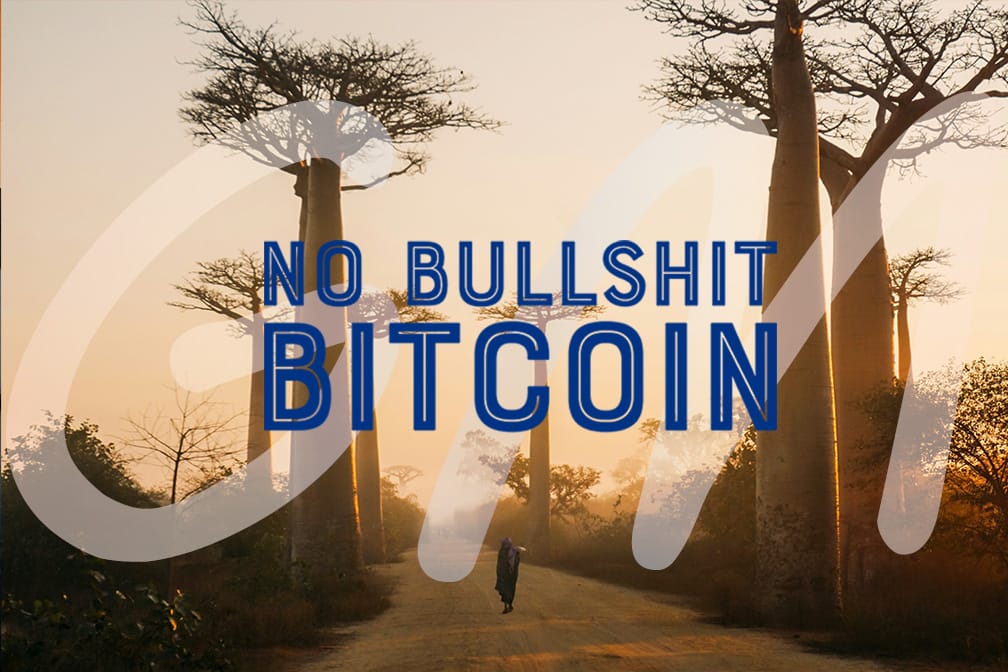
No Bullshit Bitcoin Is a Bitcoin News Desk Without Ads, Paywalls, or Clickbait.
Subscribe .nc-loop-dots-4-24-icon-o{--animation-duration:0.8s} .nc-loop-dots-4-24-icon-o *{opacity:.4;transform:scale(.75);animation:nc-loop-dots-4-anim var(--animation-duration) infinite} .nc-loop-dots-4-24-icon-o :nth-child(1){transform-origin:4px 12px;animation-delay:-.3s;animation-delay:calc(var(--animation-duration)/-2.666)} .nc-loop-dots-4-24-icon-o :nth-child(2){transform-origin:12px 12px;animation-delay:-.15s;animation-delay:calc(var(--animation-duration)/-5.333)} .nc-loop-dots-4-24-icon-o :nth-child(3){transform-origin:20px 12px} @keyframes nc-loop-dots-4-anim{0%,100%{opacity:.4;transform:scale(.75)}50%{opacity:1;transform:scale(1)}}
Email sent! Check your inbox to complete your signup.
No spam. Unsubscribe anytime.
-
 @ 7f6db517:a4931eda
2025-06-15 21:01:50
@ 7f6db517:a4931eda
2025-06-15 21:01:50
People forget Bear Stearns failed March 2008 - months of denial followed before the public realized how bad the situation was under the surface.
Similar happening now but much larger scale. They did not fix fundamental issues after 2008 - everything is more fragile.
The Fed preemptively bailed out every bank with their BTFP program and First Republic Bank still failed. The second largest bank failure in history.
There will be more failures. There will be more bailouts. Depositors will be "protected" by socializing losses across everyone.
Our President and mainstream financial pundits are currently pretending the banking crisis is over while most banks remain insolvent. There are going to be many more bank failures as this ponzi system unravels.
Unlike 2008, we have the ability to opt out of these broken and corrupt institutions by using bitcoin. Bitcoin held in self custody is unique in its lack of counterparty risk - you do not have to trust a bank or other centralized entity to hold it for you. Bitcoin is also incredibly difficult to change by design since it is not controlled by an individual, company, or government - the supply of dollars will inevitably be inflated to bailout these failing banks but bitcoin supply will remain unchanged. I do not need to convince you that bitcoin provides value - these next few years will convince millions.
If you found this post helpful support my work with bitcoin.

-
 @ dfa02707:41ca50e3
2025-06-15 22:02:39
@ dfa02707:41ca50e3
2025-06-15 22:02:39Headlines
- Spiral renews support for Dan Gould and Joschisan. The organization has renewed support for Dan Gould, who is developing the Payjoin Dev Kit (PDK), and Joschisan, a Fedimint developer focused on simplifying federations.
- Metaplanet buys another 145 BTC. The Tokyo-listed company has purchased an additional 145 BTC for $13.6 million. Their total bitcoin holdings now stand at 5,000 coins, worth around $428.1 million.
- Semler Scientific has increased its bitcoin holdings to 3,303 BTC. The company acquired an additional 111 BTC at an average price of $90,124. The purchase was funded through proceeds from an at-the-market offering and cash reserves, as stated in a press release.
- The Virtual Asset Service Providers (VASP) Bill 2025 introduced in Kenya. The new legislation aims to establish a comprehensive legal framework for licensing, regulating, and supervising virtual asset service providers (VASPs), with strict penalties for non-compliant entities.
- Russian government to launch a cryptocurrency exchange. The country's Ministry of Finance and Central Bank announced plans to establish a trading platform for "highly qualified investors" that "will legalize crypto assets and bring crypto operations out of the shadows."
- All virtual asset service providers expect to be fully compliant with the Travel Rule by the end of 2025. A survey by financial surveillance specialist Notabene reveals that 90% of virtual asset service providers (VASPs) expect full Travel Rule compliance by mid-2025, with all aiming for compliance by year-end. The survey also shows a significant rise in VASPs blocking withdrawals until beneficiary information is confirmed, increasing from 2.9% in 2024 to 15.4% now. Additionally, about 20% of VASPs return deposits if originator data is missing.
- UN claims Bitcoin mining is a "powerful tool" for money laundering. The Rage's analysis suggests that the recent United Nations Office on Drugs and Crime report on crime in South-East Asia makes little sense and hints at the potential introduction of Anti-Money Laundering (AML) measures at the mining level.
- Riot Platforms has obtained a $100 million credit facility from Coinbase Credit, using bitcoin as collateral for short-term funding to support its expansion. The firm's CEO, Jason Les, stated that this facility is crucial for diversifying financing sources and driving long-term stockholder value through strategic growth initiatives.
- Bitdeer raises $179M in loans and equity amid Bitcoin chip push. The Miner Mag reports that Bitdeer entered into a loan agreement with its affiliate Matrixport for up to $200 million in April, as disclosed in its annual report filed on Monday.
- Federal Reserve retracts guidance discouraging banks from engaging in 'crypto.' The U.S. Federal Reserve withdrew guidance that discouraged banks from crypto and stablecoin activities, as announced by its Board of Governors on Thursday. This includes rescinding a 2022 supervisory letter requiring prior notification of crypto activities and 2023 stablecoin requirements.
"As a result, the Board will no longer expect banks to provide notification and will instead monitor banks' crypto-asset activities through the normal supervisory process," reads the FED statement.
- UAE-based Islamic bank ruya launches Shari’ah-compliant bitcoin investing. The bank has become the world’s first Islamic bank to provide direct access to virtual asset investments, including Bitcoin, via its mobile app, per Bitcoin Magazine.
- U.S. 'crypto' scam losses amounted to $9.3B in 2024. The US The Federal Bureau of Investigation (FBI) has reported $9.3 billion losses in cryptocurrency-related scams in 2024, noting a troubling trend of scams targeting older Americans, which accounted for over $2.8 billion of those losses.

Source: FBI.
- North Korean hackers establish fake companies to target 'crypto' developers. Silent Push researchers reported that hackers linked to the Lazarus Group created three shell companies, two of which are based in the U.S., with the objective of spreading malware through deceptive job interview scams aimed at individuals seeking jobs in cryptocurrency companies.
- Citrea deployed its Clementine Bridge on the Bitcoin testnet. The bridge utilizes the BitVM2 programming language to inherit validity from Bitcoin, allegedly providing "the safest and most trust-minimized way to use BTC in decentralized finance."
- Hesperides University offers a Master’s degree in Bitcoin. Bitcoin Magazine reports the launch of the first-ever Spanish-language Master’s program dedicated exclusively to Bitcoin. Starting April 28, 2025, this fully online program will equip professionals with technical, economic, legal, and philosophical skills to excel in the Bitcoin era.
- BTC in D.C. event is set to take place on September 30 - October 1 in Washington, D.C. Learn more about this initiative here.
Use the tools
- Bitcoin Keeper just got a new look. Version 2.2.0 of the mobile multisig app brought a new branding design, along with a Keeper Private tier, testnet support, ability to import and export BIP-329 labels, and the option to use a Server Key with multiple users.
- Earlier this month the project also announced Keeper Learn service, offering clear and guided Bitcoin learning sessions for both groups and individuals.
- Keeper Desktop v0.2.2, a companion desktop app for Bitcoin Keeper mobile app, received a renewed branding update, too.

The evolution of Bitcoin Keeper logo. Source: BitHyve blog.
- Blockstream Green Desktop v2.0.25 updates GDK to v0.75.1 and fixes amount parsing issues when switching from fiat denomination to Liquid asset.
- Lightning Loop v0.31.0-beta enhances the
loop listswapscommand by improving the ability to filter the response. - Lightning-kmp v1.10.0, an implementation of the Lightning Network in Kotlin, is now available.
- LND v0.19.0-beta.rc3, the latest beta release candidate of LND is now ready for testing.
- ZEUS v0.11.0-alpha2 is now available for testing, too. It's nuts.
- JoinMarket Fidelity Bond Simulator helps potential JoinMarket makers evaluate their competitive position in the market based on fidelity bonds.
- UTXOscope is a text-only Bitcoin blockchain analysis tool that visualizes price dynamics using only on-chain data. The
-
 @ 7f6db517:a4931eda
2025-06-15 21:01:49
@ 7f6db517:a4931eda
2025-06-15 21:01:49Will not live in a pod.
Will not eat the bugs.
Will not get the chip.
Will not get a blue check.
Will not use CBDCs.Live Free or Die.

Why did Elon buy twitter for $44 Billion? What value does he see in it besides the greater influence that undoubtedly comes with controlling one of the largest social platforms in the world? We do not need to speculate - he made his intentions incredibly clear in his first meeting with twitter employees after his takeover - WeChat of the West.
To those that do not appreciate freedom, the value prop is clear - WeChat is incredibly powerful and successful in China.
To those that do appreciate freedom, the concern is clear - WeChat has essentially become required to live in China, has surveillance and censorship integrated at its core, and if you are banned from the app your entire livelihood is at risk. Employment, housing, payments, travel, communication, and more become extremely difficult if WeChat censors determine you have acted out of line.

The blue check is the first step in Elon's plan to bring the chinese social credit score system to the west. Users who verify their identity are rewarded with more reach and better tools than those that do not. Verified users are the main product of Elon's twitter - an extensive database of individuals and complete control of the tools he will slowly get them to rely on - it is easier to monetize cattle than free men.

If you cannot resist the temptation of the blue check in its current form you have already lost - what comes next will be much darker. If you realize the need to resist - freedom tech provides us options.
If you found this post helpful support my work with bitcoin.

-
 @ dfa02707:41ca50e3
2025-06-15 22:02:38
@ dfa02707:41ca50e3
2025-06-15 22:02:38Contribute to keep No Bullshit Bitcoin news going.
News
- Spiral welcomes Ben Carman. The developer will work on the LDK server and a new SDK designed to simplify the onboarding process for new self-custodial Bitcoin users.
- Spiral renews support for Dan Gould and Joschisan. The organization has renewed support for Dan Gould, who is developing the Payjoin Dev Kit (PDK), and Joschisan, a Fedimint developer focused on simplifying federations.
- The Bitcoin Dev Kit Foundation announced new corporate members for 2025, including AnchorWatch, CleanSpark, and Proton Foundation. The annual dues from these corporate members fund the small team of open-source developers responsible for maintaining the core BDK libraries and related free and open-source software (FOSS) projects.
- The European Central Bank is pushing for amendments to the European Union's Markets in Crypto Assets legislation (MiCA), just months after its implementation. According to Politico's report on Tuesday, the ECB is concerned that U.S. support for cryptocurrency, particularly stablecoins, could cause economic harm to the 27-nation bloc.
- Slovenia is considering a 25% capital gains tax on Bitcoin profits for individuals. The Ministry of Finance has proposed legislation to impose this tax on gains from cryptocurrency transactions, though exchanging one cryptocurrency for another would remain exempt. At present, individual 'crypto' traders in Slovenia are not taxed.
- The Virtual Asset Service Providers (VASP) Bill 2025 introduced in Kenya. The new legislation aims to establish a comprehensive legal framework for licensing, regulating, and supervising virtual asset service providers (VASPs), with strict penalties for non-compliant entities.
- Circle, BitGo, Coinbase, and Paxos plan to apply for U.S. bank charters or licenses. According to a report in The Wall Street Journal, major crypto companies are planning to apply for U.S. bank charters or licenses. These firms are pursuing limited licenses that would permit them to issue stablecoins, as the U.S. Congress deliberates on legislation mandating licensing for stablecoin issuers.
"Established banks, like Bank of America, are hoping to amend the current drafts of [stablecoin] legislation in such a way that nonbanks are more heavily restricted from issuing stablecoins," people familiar with the matter told The Block.
- Paul Atkins has officially assumed the role of the 34th Chairman of the US Securities and Exchange Commission (SEC). This is a return to the agency for Atkins, who previously served as an SEC Commissioner from 2002 to 2008 under the George W. Bush administration. He has committed to advancing the SEC’s mission of fostering capital formation, safeguarding investors, and ensuring fair and efficient markets.
- Federal Reserve retracts guidance discouraging banks from engaging in 'crypto.' The U.S. Federal Reserve withdrew guidance that discouraged banks from crypto and stablecoin activities, as announced by its Board of Governors on Thursday. This includes rescinding a 2022 supervisory letter requiring prior notification of crypto activities and 2023 stablecoin requirements.
"As a result, the Board will no longer expect banks to provide notification and will instead monitor banks' crypto-asset activities through the normal supervisory process," reads the FED statement.
- Russian government to launch a cryptocurrency exchange. The country's Ministry of Finance and Central Bank announced plans to establish a trading platform for "highly qualified investors" that "will legalize crypto assets and bring crypto operations out of the shadows."
- Twenty One Capital is set to launch with over 42,000 BTC in its treasury. This new Bitcoin-native firm, backed by Tether and SoftBank, is planned to go public via a SPAC merger with Cantor Equity Partners and will be led by Jack Mallers, co-founder and CEO of Strike. According to a report by the Financial Times, the company aims to replicate the model of Michael Saylor with his company, MicroStrategy.
- Strategy increases Bitcoin holdings to 538,200 BTC. In the latest purchase, the company has spent more than $555M to buy 6,556 coins through proceeds of two at-the-market stock offering programs.
- Metaplanet buys another 145 BTC. The Tokyo-listed company has purchased an additional 145 BTC for $13.6 million. Their total bitcoin holdings now stand at 5,000 coins, worth around $428.1 million.
- Semler Scientific has increased its bitcoin holdings to 3,303 BTC. The company acquired an additional 111 BTC at an average price of $90,124. The purchase was funded through proceeds from an at-the-market offering and cash reserves, as stated in a press release.
- Tesla still holds nearly $1 billion in bitcoin. According to the automaker's latest earnings report, the firm reported digital asset holdings worth $951 million as of March 31.
- Spar supermarket experiments with Bitcoin payments in Zug, Switzerland. The store has introduced a new payment method powered by the Lightning Network. The implementation was facilitated by DFX Swiss, a service that supports seamless conversions between bitcoin and legacy currencies.
- Charles Schwab to launch spot Bitcoin trading by 2026. The financial investment firm, managing over $10 trillion in assets, has revealed plans to introduce spot Bitcoin trading for its clients within the next year.
- Arch Labs has secured $13 million to develop "ArchVM" and integrate smart-contract functionality with Bitcoin. The funding round, valuing the company at $200 million, was led by Pantera Capital, as announced on Tuesday.
- Citrea deployed its Clementine Bridge on the Bitcoin testnet. The bridge utilizes the BitVM2 programming language to inherit validity from Bitcoin, allegedly providing "the safest and most trust-minimized way to use BTC in decentralized finance."
- UAE-based Islamic bank ruya launches Shari’ah-compliant bitcoin investing. The bank has become the world’s first Islamic bank to provide direct access to virtual asset investments, including Bitcoin, via its mobile app, per Bitcoin Magazine.
- Solosatoshi.com has sold over 10,000 open-source miners, adding more than 10 PH of hashpower to the Bitcoin network.
"Thank you, Bitaxe community. OSMU developers, your brilliance built this. Supporters, your belief drives us. Customers, your trust powers 10,000+ miners and 10PH globally. Together, we’re decentralizing Bitcoin’s future. Last but certainly not least, thank you@skot9000 for not only creating a freedom tool, but instilling the idea into thousands of people, that Bitcoin mining can be for everyone again," said the firm on X.
- OCEAN's DATUM has found 100 blocks. "Over 65% of OCEAN’s miners are using DATUM, and that number is growing every day. This means block template construction is making its way back into the hands of the miners, which is not only the most profitable
-
 @ dfa02707:41ca50e3
2025-06-15 21:01:47
@ dfa02707:41ca50e3
2025-06-15 21:01:47
Good morning (good night?)! The No Bullshit Bitcoin news feed is now available on Moody's Dashboard! A huge shoutout to sir Clark Moody for integrating our feed.
Headlines
- Spiral welcomes Ben Carman. The developer will work on the LDK server and a new SDK designed to simplify the onboarding process for new self-custodial Bitcoin users.
- The Bitcoin Dev Kit Foundation announced new corporate members for 2025, including AnchorWatch, CleanSpark, and Proton Foundation. The annual dues from these corporate members fund the small team of open-source developers responsible for maintaining the core BDK libraries and related free and open-source software (FOSS) projects.
- Strategy increases Bitcoin holdings to 538,200 BTC. In the latest purchase, the company has spent more than $555M to buy 6,556 coins through proceeds of two at-the-market stock offering programs.
- Spar supermarket experiments with Bitcoin payments in Zug, Switzerland. The store has introduced a new payment method powered by the Lightning Network. The implementation was facilitated by DFX Swiss, a service that supports seamless conversions between bitcoin and legacy currencies.
- The Bank for International Settlements (BIS) wants to contain 'crypto' risks. A report titled "Cryptocurrencies and Decentralised Finance: Functions and Financial Stability Implications" calls for expanding research into "how new forms of central bank money, capital controls, and taxation policies can counter the risks of widespread crypto adoption while still fostering technological innovation."
- "Global Implications of Scam Centres, Underground Banking, and Illicit Online Marketplaces in Southeast Asia." According to the United Nations Office on Drugs and Crime (UNODC) report, criminal organizations from East and Southeast Asia are swiftly extending their global reach. These groups are moving beyond traditional scams and trafficking, creating sophisticated online networks that include unlicensed cryptocurrency exchanges, encrypted communication platforms, and stablecoins, fueling a massive fraud economy on an industrial scale.
- Slovenia is considering a 25% capital gains tax on Bitcoin profits for individuals. The Ministry of Finance has proposed legislation to impose this tax on gains from cryptocurrency transactions, though exchanging one cryptocurrency for another would remain exempt. At present, individual 'crypto' traders in Slovenia are not taxed.
- Circle, BitGo, Coinbase, and Paxos plan to apply for U.S. bank charters or licenses. According to a report in The Wall Street Journal, major crypto companies are planning to apply for U.S. bank charters or licenses. These firms are pursuing limited licenses that would permit them to issue stablecoins, as the U.S. Congress deliberates on legislation mandating licensing for stablecoin issuers.
"Established banks, like Bank of America, are hoping to amend the current drafts of [stablecoin] legislation in such a way that nonbanks are more heavily restricted from issuing stablecoins," people familiar with the matter told The Block.
- Charles Schwab to launch spot Bitcoin trading by 2026. The financial investment firm, managing over $10 trillion in assets, has revealed plans to introduce spot Bitcoin trading for its clients within the next year.
Use the tools
- Bitcoin Safe v1.2.3 expands QR SignMessage compatibility for all QR-UR-compatible hardware signers (SpecterDIY, KeyStone, Passport, Jade; already supported COLDCARD Q). It also adds the ability to import wallets via QR, ensuring compatibility with Keystone's latest firmware (2.0.6), alongside other improvements.
- Minibits v0.2.2-beta, an ecash wallet for Android devices, packages many changes to align the project with the planned iOS app release. New features and improvements include the ability to lock ecash to a receiver's pubkey, faster confirmations of ecash minting and payments thanks to WebSockets, UI-related fixes, and more.
- Zeus v0.11.0-alpha1 introduces Cashu wallets tied to embedded LND wallets. Navigate to Settings > Ecash to enable it. Other wallet types can still sweep funds from Cashu tokens. Zeus Pay now supports Cashu address types in Zaplocker, Cashu, and NWC modes.
- LNDg v1.10.0, an advanced web interface designed for analyzing Lightning Network Daemon (LND) data and automating node management tasks, introduces performance improvements, adds a new metrics page for unprofitable and stuck channels, and displays warnings for batch openings. The Profit and Loss Chart has been updated to include on-chain costs. Advanced settings have been added for users who would like their channel database size to be read remotely (the default remains local). Additionally, the AutoFees tool now uses aggregated pubkey metrics for multiple channels with the same peer.
- Nunchuk Desktop v1.9.45 release brings the latest bug fixes and improvements.
- Blockstream Green iOS v4.1.8 has renamed L-BTC to LBTC, and improves translations of notifications, login time, and background payments.
- Blockstream Green Android v4.1.8 has added language preference in App Settings and enables an Android data backup option for disaster recovery. Additionally, it fixes issues with Jade entry point PIN timeout and Trezor passphrase input.
- Torq v2.2.2, an advanced Lightning node management software designed to handle large nodes with over 1000 channels, fixes bugs that caused channel balance to not be updated in some cases and channel "peer total local balance" not getting updated.
- Stack Wallet v2.1.12, a multicoin wallet by Cypher Stack, fixes an issue with Xelis introduced in the latest release for Windows.
- ESP-Miner-NerdQAxePlus v1.0.29.1, a forked version from the NerdAxe miner that was modified for use on the NerdQAxe+, is now available.
- Zark enables sending sats to an npub using Bark.

- Erk is a novel variation of the Ark protocol that completely removes the need for user interactivity in rounds, addressing one of Ark's key limitations: the requirement for users to come online before their VTXOs expire.
- Aegis v0.1.1 is now available. It is a Nostr event signer app for iOS devices.
- Nostash is a NIP-07 Nostr signing extension for Safari. It is a fork of Nostore and is maintained by Terry Yiu. Available on iOS TestFlight.
- Amber v3.2.8, a Nostr event signer for Android, delivers the latest fixes and improvements.
- Nostur v1.20.0, a Nostr client for iOS, adds
-
 @ cae03c48:2a7d6671
2025-06-15 22:01:01
@ cae03c48:2a7d6671
2025-06-15 22:01:01Bitcoin Magazine

The 30,000-Foot View of the Oslo Freedom ForumAs I step onto the plane leaving Gardermoen Airport in Oslo, Norway, the weight and warmth of the past week settles into my chest.
The Oslo Freedom Forum is not a conference. It’s not a summit. It’s something harder to name and even harder to describe — a convergence of courage, truth and defiance that burns through the noise of the modern world and gives you no choice but to listen, feel and act.
For the second time, I leave this city more convinced than ever that something unstoppable is rising. That amid the censorship, surveillance and state repression spreading across the globe, there is a countervailing force rooted in humanity, accelerated by technology and led by those who’ve already paid the price for speaking out.
The Forum doesn’t trade in empty optimism. It delivers a different kind of hope, forged from lived experience and stitched together by people who have been in the dark and still choose to see the light. A hope borne from the stories of individuals who have lived through the worst an authoritarian regime can do and still choose to fight for the freedom of others. The experiences shared were hard. At times, devastating. But they weren’t offered for pity. They were calls to action.
Just days after she was abducted, blindfolded, tortured, and sexually assaulted in a Tanzanian prison cell, Agather Atuhaire stood in front of a crowd of strangers and told her story.
Her voice did not tremble.
The Ugandan journalist and lawyer had traveled to Tanzania in solidarity with fellow East African dissidents, only to be disappeared in a black van alongside Kenyan activist Boniface Mwangi.
And yet, against all odds, she came back. Not just to her home in Uganda, but also to the stage in Oslo, where she spoke calmly and clearly about what it means to tell the truth under a dictatorship.
Her presentation, “The Digital Free Speech Crackdown in Uganda,” laid bare the authoritarian playbook: social media blackouts, propaganda campaigns, surveillance of journalists and the slow financial asphyxiation of independent media. When the government doesn’t like a story, it simply blocks the platform or website. When a journalist digs too deep, they disappear for a while. Or forever. Atuhaire painted a picture many struggle to even imagine.
And yet, after everything, she didn’t just recount these struggles. She looked out at the crowd and thanked the open source builders and contributors who write code and create tools that make it possible for activists like her to speak, move money and organize under regimes that want them silenced, or worse.

(Ugandan journalist and lawyer, Agather Atuhaire, speaks during the Freedom Tech track at the 2025 Oslo Freedom Forum.)
From Iran, independent Bitcoin educator Ziya Sadr reminded us that financial privacy is not a luxury but a necessary lifeline for those facing the financial repression by oppressive rulers. Sadr’s detainment during the 2022 Women, Life, Freedom movement following the murder of Mahsa Amini by the Iranian regime is a testament to that. Without financial privacy, activists’ actions, connections and finances are exposed to a regime equipped with widespread financial controls and a sophisticated, restrictive internet firewall that rivals even China’s.
The result is one of the most repressive digital environments in the world. And if that wasn’t enough, the Iranian rial currency has lost more than 80% of its value in just a few years.
Against this backdrop, Iranians are using bitcoin as undebasable savings, and to buy digital services like VPNs in order to access the open internet. But even that act, just reaching the outside world, requires a level of privacy most of us take for granted.
In his presentation, “Securing Lifelines: The Bitcoin Privacy Imperative,” Sadr shared that many Iranians turn to Bitcoin Coinjoins, a privacy technique that breaks the link between Bitcoin transaction inputs. Coinjoins preserve user transaction privacy and, more importantly, shield Iranians from the surveillance and retaliation of a regime who punishes anyone trying to access information beyond its tightly controlled digital spaces. The use of Coinjoins is becoming more difficult as global legal pressure mounts against open source developers, and in the aftermath of the Samourai developer arrests, privacy protocols like Whirlpool are unworkable.
Today, Sadr is learning more about additional Bitcoin privacy tools, including Payjoin, a privacy method that allows two users to contribute an input to a Bitcoin transaction. Payjoin breaks common chain analysis heuristics and conceals the sender and receiver of a transaction as well as the payment amount. Then there is ecash, a form of digital cash backed by Bitcoin that enables very private, everyday payments with the custodial trade-off of trusting mints (entities that issue and redeem ecash tokens) to store user funds.
The continued development of these protocols is crucial for Iranians, who live under a government that not only tracks and surveils digital behavior, but also imposes automatic fines on women for violating hijab rules and manipulates currency exchange rates to profit off citizens’ savings. For millions in Iran, bitcoin offers a last line of defense against a collapsing currency, intrusive surveillance and total financial repression.
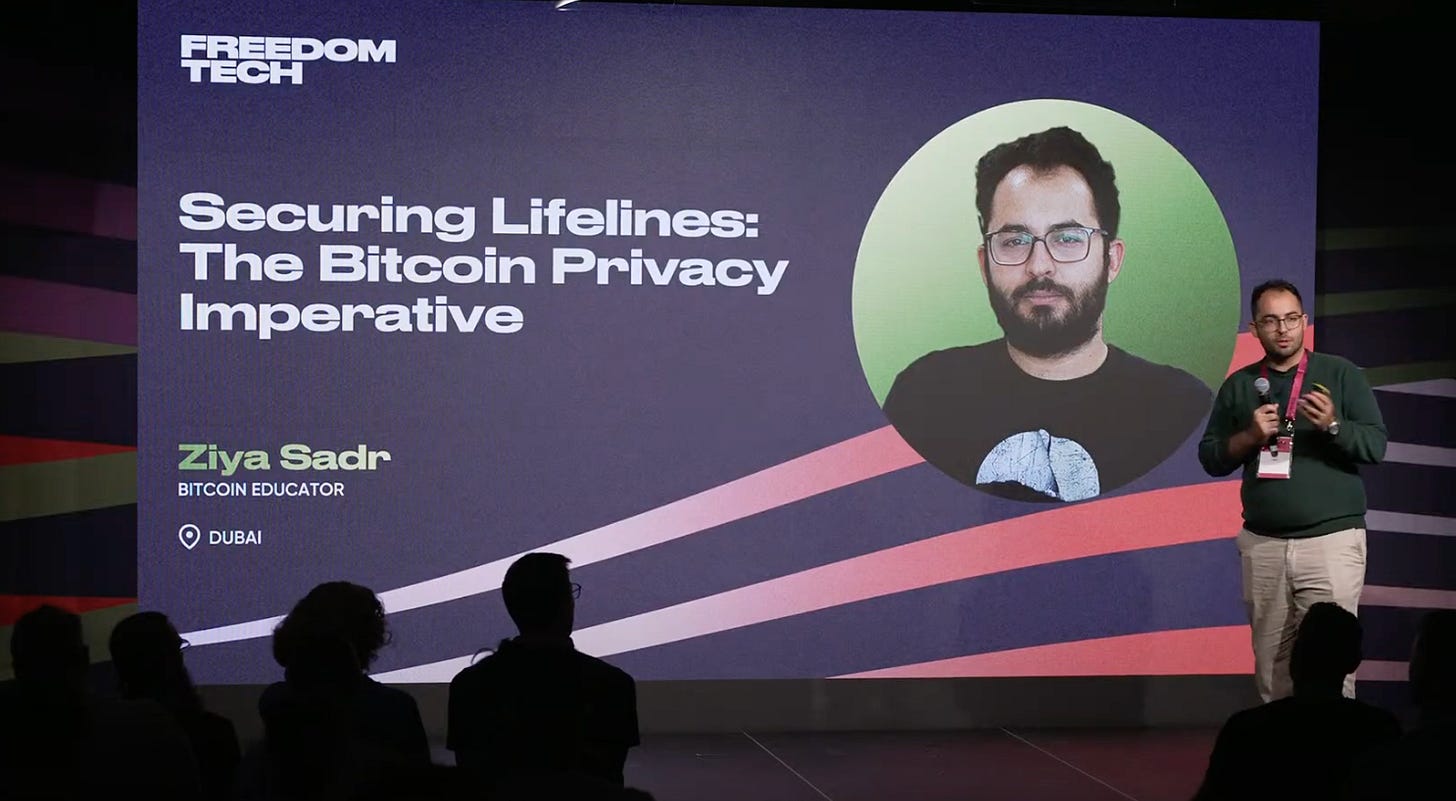
(Independent Iranian Bitcoin educator, Ziya Sadr, speaks during the Freedom Tech track at the Oslo Freedom Forum.)
Venezuelan opposition leader Leopoldo López took the stage at the 2025 Oslo Freedom Forum not as a politician, but as a witness to what happens when a state turns its institutions into further tendrils of its repression machine.
After Nicolás Maduro stole Venezuela’s 2024 elections, López watched thousands of his fellow people — activists, students, journalists, opposition members and lawyers — get arrested, disappeared or forced into exile. The regime blocked access to social media, revoked passports, criminalized dissent and used the financial system as a means of controlling the population.
Amid this digital repression and Venezuela’s 162% inflation rate, López sees bitcoin (decentralized money) and Nostr (decentralized social media) as lifelines. When dictators shut down the internet or freeze your bank account, alternatives that are open source, decentralized, uncensorable and accessible become more important than ever for the survival of democracy and freedom.
**“Decentralized resistance is the convergence of people, Bitcoin, Nostr, and AI.
People, it’s about the center and the end of what we are doing.
Brave women and men who sacrifice their freedom, who take risks, who are willing to fight for other people.
If it’s not about people, technology wouldn’t be something worth fighting for.
Bitcoin is freedom money. It’s decentralized, nobody controls it, nobody can stop it, it can move around without borders.”**
(Venezuelan Opposition Leader Leopoldo López during the Freedom Tech track at the 2025 Oslo Freedom Forum.)
For decades, Paraguay’s greatest natural resource, hydroelectric power, has flowed out of the country through international contracts, fueling development in neighboring countries like Brazil and Argentina while one in four Paraguayans remained trapped in poverty. Paraguay’s Itaipu Dam, one of the largest in the world, has long symbolized this paradox: a river of energy diverted away from the very people who need it most.
Björn Schmidtke and Delia Garcete of Penguin Group are flipping that script.
In a landmark move, they secured Paraguay’s first 100-megawatt power purchase agreement, marking the beginning of a bold experiment to reclaim that energy for the people of Paraguay. Instead of selling it off to foreign powers, they use it to mine Bitcoin — and the proc
-
 @ dfa02707:41ca50e3
2025-06-15 22:02:37
@ dfa02707:41ca50e3
2025-06-15 22:02:37Contribute to keep No Bullshit Bitcoin news going.
- Wasabi Wallet v2.6.0 "Prometheus" is a major update for the project, focused on resilience and independence from centralized systems.
- Key features include support for BIP 158 block filters for direct node synchronization, a revamped full node integration for easier setup without third-party reliance, SLIP 39 share backups for flexible wallet recovery (sponsored by Trezor), and a Nostr-based update manager for censorship-resistant updates.
- Additional improvements include UI bug fixes, a new fallback for transaction broadcasting, updated code signing, stricter JSON serialization, and options to avoid third-party rate providers, alongside various under-the-hood enhancements.
This new version brings us closer to our ultimate goal: ensuring Wasabi is future-proof," said the developers, while also highlighting the following key areas of focus for the project:
- Ensuring users can always fully and securely use their client.
- Making contribution and forks easy through a codebase of the highest quality possible: understandable, maintainable, and improvable.
"As we achieve our survival goals, expect more cutting-edge improvements in Bitcoin privacy and self-custody. Thank you for the trust you place in us by using Wasabi," was stated in the release notes.
What's new
- Support for Standard BIP 158 Block Filters. Wasabi now syncs using BIP 158 filters without a backend/indexer, connecting directly to a user's node. This boosts sync speed, resilience, and allows full sovereignty without specific server dependency.
- Full Node Integration Rework. The old integration has been replaced with a simpler, more adaptable system. It’s not tied to a specific Bitcoin node fork, doesn’t need the node on the same machine as Wasabi, and requires no changes to the node’s setup.
- "Simply enable the RPC server on your node and point Wasabi to it," said the developers. This ensures all Bitcoin network activities—like retrieving blocks, fee estimations, block filters, and transaction broadcasting—go through your own node, avoiding reliance on third parties.
- Create & Recover SLIP 39 Shares. Users now create and recover wallets with multiple share backups using SLIP 39 standard.
"Special thanks to Trezor (SatoshiLabs) for sponsoring this amazing feature."
- Nostr Update Manager. This version implements a pioneering system with the Nostr protocol for update information and downloads, replacing reliance on GitHub. This enhances the project's resilience, ensuring updates even if GitHub is unavailable, while still verifying updates with the project's secure certificate.
- Updated Avalonia to v11.2.7, fixes for UI bugs (including restoring Minimize on macOS Sequoia).
- Added a configurable third-party fallback for broadcasting transactions if other methods fail.
- Replaced Windows Code Signing Certificate with Azure Trusted Signing.
- Many bug fixes, improved codebase, and enhanced CI pipeline.
- Added the option to avoid using any third-party Exchange Rate and Fee Rate providers (Wasabi can work without them).
- Rebuilt all JSON Serialization mechanisms avoiding default .NET converters. Serialization is now stricter.

Full Changelog: v2.5.1...v2.6.0
-
 @ cae03c48:2a7d6671
2025-06-15 22:00:55
@ cae03c48:2a7d6671
2025-06-15 22:00:55Bitcoin Magazine

Pakistan’s Strategic Bitcoin Reserve: A Step Toward Orange-Pilling a Nation?Pakistan’s relationship with Bitcoin has been marked by inconsistency and confusion over the past few years. Initially, the country outright banned bitcoin trading in 2018, citing concerns over fraud, money laundering and lack of regulation. However, over time, their stance softened and regulators began exploring the technology behind Bitcoin with courts even questioning the legality of the ban. Eventually, citizens were allowed to hold bitcoin, though trading remained murky and unregulated. This back-and-forth approach has created a confusing environment, where Bitcoin exists in a legal gray area. It is technically allowed, yet not fully embraced or regulated, reflecting the state’s struggle to balance innovation with control.
 PAKISTAN TO ESTABLISH NATIONAL STRATEGIC #BITCOIN RESERVE
PAKISTAN TO ESTABLISH NATIONAL STRATEGIC #BITCOIN RESERVE Honored to have had the Pakistan Minister Bilal Bin Saqib at the Bitcoin Conference
 pic.twitter.com/7WunP5fuZm
pic.twitter.com/7WunP5fuZm— The Bitcoin Conference (@TheBitcoinConf) May 29, 2025
This muddled relationship with Bitcoin seems to have turned a corner in recent weeks as Bilal Bin Saqib, head of the Pakistan Crypto Council, at the Bitcoin 2025 Conference in Las Vegas announced that the country is moving to establish a strategic Bitcoin reserve. Furthermore, he announced the allocation of 2,000 megawatts of excess energy to Bitcoin mining and high-performance computer data centers. The Ministry of Finance has also commissioned the establishment of an entirely new agency to oversee digital asset regulation which could lead to a less opaque legal framework around bitcoin ownership and usage in everyday transactions.
Critics have argued that this is merely an attempt by Pakistan to cozy up to Trump in the aftermath of the recent skirmish with India. After all, Saqib did state that Pakistan was inspired by the Trump administration when he spoke at the recent Las Vegas Bitcoin conference. Others have asserted that Pakistan is merely seeking to build resistance to possible sanctions in the future over its support for terrorist groups. I believe that such a geopolitically focused critique overlooks a deeper economic reality that has been staring Pakistan in the face for many years.
I wrote an article for a Pakistani newspaper about a year ago in which I argued that the country is uniquely situated, in economic terms, to take advantage of Bitcoin and unlock the benefits that come with adoption. Pakistan suffers from rampant inflation, stagnant capital formation, depleted foreign reserves, an inefficient bureaucracy and an overreliance on remittances from abroad. These systemic issues have eroded citizens’ faith in traditional financial systems, leaving many Pakistanis disillusioned and seeking alternative means to safeguard their wealth and economic autonomy.
Thus, nurturing a culture of Bitcoin adoption could go a long way toward alleviating much of these economic ills and empowering citizens to take control of their financial future. By earning and trading a form of currency that is deflationary in nature, Pakistanis can protect themselves from the downsides of the macroeconomic trends that have decimated the living standards of this once proud nation. Bitcoin adoption could transform the country’s lively remittance sector, with receivers keeping more of the money they are sent. It could also emancipate people from the inefficient banking system that is such a drain on the people. Permissionless transactions could also empower the beleaguered minorities who often struggle to achieve financial freedom.
The announcement of a strategic Bitcoin reserve, as well as promises to introduce pro-Bitcoin regulation and a mining strategy, are steps in the right direction. They show that the mood is shifting and the country is starting to take a serious look at the only real digital currency in town. These steps also point to a much broader, global shift in attitudes toward Bitcoin — especially in nations where hyperinflation is a daily reality and the banking system struggles to meet citizens’ needs.
However, real change will only come when Pakistan fully legalizes bitcoin as a digital currency and takes steps toward mass adoption. Only then will ordinary Pakistani citizens be free to trade with people from all over the world without the need to rely on the local banking system. Only then will financial autonomy become an achievable goal for those living far away from the big cities where banks are based. Only then will women be free to earn, store and transact in a digital currency that is resistant to cultural barriers.
Creating a national strategic reserve merely signals that a nation believes in bitcoin as an asset with the potential to offer a reliable return. It does not signal that a nation has adopted the digital currency as a means to overcome the obstacles imposed by fiat. Strategic national reserves also hoard bitcoin and bring it too close to the state, even though the digital currency was designed to be a hedge against state-controlled money. As such, a reserve does not unlock the true potential of bitcoin to act as a buffer against domestic inflation, currency devaluation and a cumbersome banking system.
A strategic Bitcoin reserve is a step in the right direction for Pakistan, as it would be for any nation that suffers from hyperinflation. But only mass adoption will truly unlock the immense potential Bitcoin can offer to a nation such as Pakistan and we have a long way to go before that becomes a reality.
In my view, strategic reserves are not what bitcoin is all about, but let’s hope this is merely the first step in a long and prosperous journey toward orange-pilling a nation.
This post Pakistan’s Strategic Bitcoin Reserve: A Step Toward Orange-Pilling a Nation? first appeared on Bitcoin Magazine and is written by Ghaffar Hussain.
-
 @ dfa02707:41ca50e3
2025-06-15 22:02:37
@ dfa02707:41ca50e3
2025-06-15 22:02:37News
- Wallet of Satoshi teases a comeback in the US market with a non-custodial product. According to an announcement on X, the widely popular custodial Lightning wallet is preparing to re-enter the United States market with a non-custodial wallet. It is unclear whether the product will be open-source, but the project has clarified that "there will be no KYC on any Wallet of Satoshi, ever!" Wallet of Satoshi ceased serving customers in the United States in November 2023.
- Vulnerability disclosure: Remote crash due to addr message spam in Bitcoin Core versions before v29. Bitcoin Core developer Antoine Poinsot disclosed an integer overflow bug that crashes a node if spammed with addr messages over an extended period. A fix was released on April 14, 2025, in Bitcoin Core v29.0. The issue is rated Low severity.
- Coinbase Know Your Customer (KYC) data leak. The U.S. Department of Justice, including its Criminal Division in Washington, is investigating a cyberattack on Coinbase. The incident involved cybercriminals attempting to extort $20 million from Coinbase to prevent stolen customer data from being leaked online. Although the data breach affected less than 1% of the exchange's users, Coinbase now faces at least six lawsuits following the revelation that some customer support agents were bribed as part of the extortion scheme.
- Fold has launched Bitcoin Gift Cards, enabling users to purchase bitcoin for personal use or as gifts, redeemable via the Fold app. These cards are currently available on Fold’s website and are planned to expand to major retailers nationwide later this year.
"Our mission is to make bitcoin simple and approachable for everyone. The Bitcoin Gift Card brings bitcoin to millions of Americans in a familiar way. Available at the places people already shop, the Bitcoin Gift Card is the best way to gift bitcoin to others," said Will Reeves, Chairman and CEO of Fold.
- Corporate treasuries hold nearly 1.1 million BTC, representing about 5.5% of the total circulating supply (1,082,164 BTC), per BitcoinTreasuries.net data. Recent purchases include Strategy adding 7,390 BTC (total: 576,230 BTC), Metplanet acquiring 1,004 BTC (total: 7,800 BTC), Tether holding over 100,521 BTC, and XXI Capital, led by Jack Mallers, starting with 31,500 BTC.
- Meanwhile, a group of investors has filed a class action lawsuit against Strategy and its executive Michael Saylor. The lawsuit alleges that Strategy made overly optimistic projections using fair value accounting under new FASB rules while downplaying potential losses.
- The U.S. Senate voted to advance the GENIUS stablecoin bill for further debate before a final vote to pass it. Meanwhile, the House is crafting its own stablecoin legislation to establish a regulatory framework for stablecoins and their issuers in the U.S, reports CoinDesk.
- French 'crypto' entrepreneurs get priority access to emergency police services. French Minister of the Interior, Bruno Retailleau, agreed on measures to enhance security for 'crypto' professionals during a meeting on Friday. This follows a failed kidnapping attempt on Tuesday targeting the family of a cryptocurrency exchange CEO, and two other kidnappings earlier this year.
- Brussels Court declares tracking-based ads illegal in EU. The Brussels Court of Appeal ruled tracking-based online ads illegal in the EU due to an inadequate consent model. Major tech firms like Microsoft, Amazon, Google, and X are affected by the decision, as their consent pop-ups fail to protect privacy in real-time bidding, writes The Record.
- Telegram shares data on 22,777 users in Q1 2025, a significant increase from the 5,826 users' data shared during the same period in 2024. This significant increase follows the arrest of CEO and founder Pavel Durov last year.
- An Australian judge has ruled that Bitcoin is money, potentially exempting it from capital gains tax in the country. If upheld on appeal, this interim decision could lead to taxpayer refunds worth up to $1 billion, per tax lawyer Adrian Cartland.
Use the tools
- Bitcoin Safe v1.3.0 a secure and user-friendly Bitcoin savings wallet for beginners and advanced users, introduces an interactive chart, Child Pays For Parent (CPFP) support, testnet4 compatibility, preconfigured testnet demo wallets, various bug fixes, and other improvements.
- BlueWallet v7.1.8 brings numerous bug fixes, dependency updates, and a new search feature for addresses and transactions.
- Aqua Wallet v0.3.0 is out, offering beta testing for the reloadable Dolphin card (in partnership with Visa) for spending bitcoin and Liquid BTC. It also includes a new Optical Character Recognition (OCR) text scanner to read text addresses like QR codes, colored numbers on addresses for better readability, a reduced minimum for spending and swapping Liquid Bitcoin to 100 sats, plus other fixes and enhancements.

Source: Aqua wallet.
- The latest firmware updates for COLDCARD Mk4 v5.4.3 and Q v1.3.3 are now available, featuring the latest enhancements and bug fixes.
- Nunchuk Android v1.9.68.1 and iOS v1.9.79 introduce support for custom blockchain explorers, wallet archiving, re-ordering wallets on the home screen via long-press, and an anti-fee sniping setting.
- BDK-cli v1.0.0, a CLI wallet library and REPL tool to demo and test the BDK library, now uses bdk_wallet 1.0.0 and integrates Kyoto, utilizing the Kyoto protocol for compact block filters. It sets SQLite as the default database and discontinues support for sled.
- publsp is a new command-line tool designed for Lightning node runners or Lightning Service Providers (LSPs) to advertise liquidity offers over Nostr.
"LSPs advertise liquidity as addressable Kind 39735 events. Clients just pull and evaluate all those structured events, then NIP-17 DM an LSP of their choice to coordinate a liquidity purchase," writes developer smallworlnd.
-
Lightning Blinder by Super Testnet is a proof-of-concept privacy tool for the Lightning Network. It enables users to mislead Lightning Service Providers (LSPs) by making it appear as though one wallet is the sender or recipient, masking the original wallet. Explore and try it out here.
-
Mempal v1.5.3, a Bitcoin mempool monitoring and notification app for Android, now includes a swipe-down feature to refresh the dashboard, a custom time option for widget auto-update frequency, and a
-
 @ cae03c48:2a7d6671
2025-06-15 22:00:49
@ cae03c48:2a7d6671
2025-06-15 22:00:49Bitcoin Magazine

Bitcoin Layer 2: StatechainsStatechains are an original second layer protocol originally developed by Ruben Somsen in 2018, depending on the eltoo (or LN Symmetry) proposal. In 2021 a variation of the original proposal, Mercury, was built by CommerceBlock. In 2024, a further iteration of the original Mercury scheme was built, Mercury Layer.
The Statechain protocol is a bit more complicated to discuss compared to other systems such as Ark or Lightning because of the range of variations that are possible between the original proposed design, the two that have been actually implemented, and other possible designs that have been loosely proposed.
Like Ark, Statechains depend on a centralized coordinating server in order to function. Unlike Ark, they have a slightly different trust model than a vUTXO in an Ark batch. They depend on the coordinating server to delete previously generated shares of a private key in order to remain trustless, but as long as the server follows the defined protocol and does so, they provide a strong security guarantee.
The general idea of a Statechain is to be able to transfer ownership of an entire UTXO between different users off-chain, facilitated by the coordinator. There is no requirement for receiving liquidity like Lightning, or the coordinator server to provide any liquidity like Ark.
To begin, we will look at the original protocol proposed by Ruben Somsen.
The Original Statechain
Statechains are effectively a pre-signed transaction allowing the current owner of the Statechain to unilaterally withdraw on-chain whenever they want, and a history signed messages cryptographically proving that past owners and the receivers they sent the Statechain to approved those transfers.
The original design was built on eltoo using ANYPREVOUT, but the current plans on how to enable the same functionality make use of CHECKTEMPLATEVERIFY and CHECKSIGFROMSTACK (a high level explanation of this is at the end of the CHECKSIGFROMSTACK article). The basic idea is a script enabling a pre-signed transaction to spend any UTXO that has that script and locks the appropriate amount of bitcoin, rather than being tied to spending a single specific UTXO.
In the protocol, a user wishing to deposit their coins to a Statechain approaches a coordinator server and goes through a deposit protocol. The depositing user, Bob, generates a key that will be uniquely owned by him, but also a second “transitory” key that will eventually be shared (more on this soon). They then craft a deposit transaction locking their coin to a multisig requiring the coordinator’s key and the transitory key to sign.
Using this multisig, Bob and the coordinator sign a transaction that spends that coin and creates a UTXO that can either be spent by any other transaction signed by the transitory key and the coordinator’s key using LN Symmetry, or Bob’s unique key after a timelock. Bob can now fund the multisig with the appropriate amount, and the Statechain has been created.
To transfer a Statechain to Charlie, Bob must go through a multistep process. First, Bob signs a message with his unique private key that attests to the fact he is going to transfer the Statechain to Charlie. Charlie must also sign a message attesting to the fact that he has received the Statechain from Bob. Finally, the coordinator server must sign a new transaction allowing Charlie to unilaterally claim the Statechain on-chain before Bob sends Charlie a copy of the transitory key.
All of this is made atomic using adapter signatures. These are signatures that are modified in such a way using a random piece of data that renders them invalid, but can be made valid again once the holder of the signature receives that piece of information. All of the messages, and the new pre-signed transaction are signed with adapter signatures, and atomically made valid at the same time through the release of the adapter data.
Holders of a Statechain must trust that the coordinator server never conspires with a previous owner to sign an immediate closure of the Statechain and steal funds from the current owner, but the chain of pre-signed messages can prove that a coordinator has participated in theft if they were to do so. If a past owner attempts to use their pre-signed transaction to steal the funds, the timelock on the spend path using only their key allows the current owner to submit their pre-signed transaction and correctly claim the funds on chain.
Mercury and Mercury Layer
The original Statechain architecture requires a softfork in order to function. CommerceBlock designed their variant of Statechains to function without a softfork, but in order to do so tradeoffs were made in terms of functionality.
The basic idea is the same as the original design, all users hold a pre-signed transaction that allows them to claim their funds unilaterally, and the coordinator server still plays a role in facilitating off-chain transfers that requires them to be trusted to behave honestly. The two major differences are how those transactions are signed, and the structure of the pre-signed transaction users are given.
Where the signing is concerned, there is no longer a transitory private key that is passed from user to user. Instead of this, a multiparty-computation protocol (MPC) is used so that the original owner and the coordinator server are able to collaboratively generate partial pieces of a private key without either of them ever possessing the full key. This key is used to sign the pre-signed transactions. The MPC protocol allows the current owner and coordinator to engage in a second protocol with a third party, the receiver of a transfer, to regenerate different pieces that add up to the same private key. In both the Mercury and Mercury Layer protocol, after completing a transfer an honest coordinator server deletes the key material corresponding to the previous owner. As long as this is done, it is no longer possible for the coordinator to sign a transaction with a previous owner, as the new piece of key material they have is not compatible with the piece any previous owner might still have. This is actually a stronger guarantee, as long as the coordinator is honest, than the original proposal.
The pre-signed transaction structure for Mercury and Mercury Layer can’t use LN Symmetry, as this is not possible without a softfork. In lieu of this, CommerceBlock opted to use decrementing timelocks. The original owner’s pre-signed transaction is timelocked using nLocktime to a time far out in the future from the point of the Statechain’s creation. As each subsequent user receives the Statechain during a transfer, the nLocktime value of their transaction is some pre-determined length of time shorter than the previous owner. This guarantees that a previous owner is incapable of even trying to submit their transaction on-chain before the current owner can, but it also means that eventually at some point the current owner must close their Statechain on-chain before previous owners’ transactions start becoming valid.
The major difference between Mercury and Mercury Layer is how these transactions are signed. In the case of Mercury, the coordinator server simply sees the transaction proposed, verifies it, and then signs it. Mercury Layer uses a blind-signing protocol, meaning that they do not actually see any details of the transaction they are signing. This necessitates the server tracking Statechains using anonymized records on the server, and a special authorization key of the current owner so that they can be sure they are only signing valid transfers.
Synergy With Other Layers
Statechains can synergize with other Layer 2s that are based on pre-signed transactions. For instance, part of the original proposal suggested a combination of Statechains and Lightning Channels. Because both are simply pre-signed transactions, it is possible to actually nest a Lightning channel on top of a Statechain. This simply requires the current owner’s unilateral exit key to be a multisig, and the creation of the pre-signed transactions spending that output into a Lightning channel. This allows Lightning channels to be opened and closed entirely off-chain.
In a similar fashion, it is possible to nest a Statechain on top of a vUTXO in an Ark batch. This simply requires the pre-signed transactions necessary for a Statechain to be constructed, spending the vUTXO output.
Wrapping Up
Statechains are not entirely trustless, but they are a very trust minimized scheme that is very liquidity efficient and allows freely transferring UTXOs off-chain between any users willing to accept the trust model of Statechains.
While the original proposal has yet to be built, the two implementations designed by CommerceBlock have been completely implemented. Both failed to achieve anything more than marginal use in the real world. Whether this is due to users being unwilling to accept the trust model involved, or simply a failure in marketing or awareness is something that cannot be fully ascertained.
Regardless, given that there are two full implementations and designs for a more flexible variation should LN Symmetry ever become possible on Bitcoin, this an option
-
 @ 9ca447d2:fbf5a36d
2025-06-15 21:01:18
@ 9ca447d2:fbf5a36d
2025-06-15 21:01:18Paris, France – June 6, 2025 — Bitcoin payment gateway startup Flash, just announced a new partnership with the “Bitcoin Only Brewery”, marking the first-ever beverage company to leverage Lightning payments.
Flash enables Bitcoin Only Brewery to offer its “BOB” beer with, no-KYC (Know Your Customer) delivery across Europe, priced at 19,500 sats (~$18) for the 4-pack, shipping included.
The cans feature colorful Bitcoin artwork while the contents promise a hazy pale ale: “Each 33cl can contains a smooth, creamy mouthfeel, hazy appearance and refreshing Pale Ale at 5% ABV,” reads the product description.
Pierre Corbin, Co-Founder of Flash, commented:
“Currently, bitcoin is used more as a store of value but usage for payments is picking up. Thanks to new innovation on Lightning, bitcoin is ready to go mainstream for e-commerce sales.”
Flash, launched its 2.0 version in March 2025 with the goal to provide the easiest bitcoin payment gateway for businesses worldwide. The platform is non-custodial and can enable both digital and physical shops to accept bitcoin by connecting their own wallets to Flash.
By leveraging the scalability of the Lightning Network, Flash ensures instant, low-cost transactions, addressing on-chain Bitcoin bottlenecks like high fees and long wait times.
For businesses interested in adopting Bitcoin payments, Flash offers a straightforward onboarding process, low fees, and robust support for both digital and physical goods. To learn more, visit paywithflash.com.
Media Contact:
Pierre Corbin
Co-Founder, Flash
Email: press@paywithflash.com
Website: paywithflash.comAbout Flash
Flash is the easiest Bitcoin payment gateway for businesses to accept payments. Supporting both digital and physical enterprises, Flash leverages the Lightning Network to enable fast, low-cost Bitcoin transactions. Launched in its 2.0 version in March 2025, Flash is at the forefront of driving Bitcoin adoption in e-commerce.
About Bitcoin Only Brewery
Bitcoin Only Brewery (@Drink_B0B) is a pioneering beverage company dedicated to the Bitcoin ethos, offering high-quality beers payable exclusively in Bitcoin. With a commitment to personal privacy, the brewery delivers across Europe with no-KYC requirements.
-
 @ cae03c48:2a7d6671
2025-06-15 21:00:47
@ cae03c48:2a7d6671
2025-06-15 21:00:47Bitcoin Magazine

Coinbase Announces Bitcoin Rewards Credit Card, Offering up to 4% BTC Back on EverythingCoinbase is launching its first-ever branded credit card in partnership with American Express, set to roll out this fall. Called the Coinbase One Card, it will be available only to U.S. members of Coinbase One, the platform’s monthly subscription service. The card will offer 2% to 4% back in Bitcoin on everyday purchases, along with access to American Express perks.
JUST IN: Coinbase launches credit card allowing users to earn up to 4% bitcoin back on every purchase
 pic.twitter.com/d6pdNZV4pi
pic.twitter.com/d6pdNZV4pi— Bitcoin Magazine (@BitcoinMagazine) June 12, 2025
This is a first-of-its-kind product for Coinbase, which previously only offered a prepaid debit card with Visa in 2020.
“We see real potential in the combination of Coinbase and crypto with the powerful backing of American Express, and what the card offers is an excellent mix of what customers are looking for right now,” said Will Stredwick, head of American Express global network services, during the Coinbase State of Crypto Summit in New York.
The card is part of a larger push by Coinbase to expand its subscription-based services. Coinbase One costs $29.99/month and includes zero trading fees, higher staking rewards, and customer support perks. The company also announced a cheaper version—Coinbase Basic—for $4.99/month or $49.99/year, which includes fewer features.
Coinbase’s subscription business is growing fast. It brought in $698.1 million in Q1 2025, compared to $1.26 billion in trading revenue. According to William Blair analyst Andrew Jeffrey, this kind of recurring revenue is a big reason why long-term investors are sticking with the stock.
Launched in 2023, Coinbase One now has over a million members. The company has been steadily growing its ecosystem with products like its Base developer platform and a self-custody wallet.
The company has long positioned Bitcoin at the center of its strategy—offering BTC custody services to institutions, supporting Bitcoin ETFs, integrating Bitcoin rewards into its products, and actively advocating for Bitcoin-friendly regulation in Washington. Coinbase also supports Bitcoin development directly through funding grants and engineering support. As the largest publicly traded crypto exchange in the U.S., Coinbase continues to frame Bitcoin not just as an asset, but as the foundation of its long-term vision.
This post Coinbase Announces Bitcoin Rewards Credit Card, Offering up to 4% BTC Back on Everything first appeared on Bitcoin Magazine and is written by Jenna Montgomery.
-
 @ dfa02707:41ca50e3
2025-06-15 22:02:37
@ dfa02707:41ca50e3
2025-06-15 22:02:37Contribute to keep No Bullshit Bitcoin news going.
- "Today we're launching the beta version of our multiplatform Nostr browser! Think Google Chrome but for Nostr apps. The beta is our big first step toward this vision," announced Damus.
- This version comes with the Dave Nostr AI assistant, support for zaps and the Nostr Wallet Connect (NWC) wallet interface, full-text note search, GIFs and fullscreen images, multiple media uploads, user tagging, relay list and mute list support, along with a number of other improvements."
"Included in the beta is the Dave, the Nostr AI assistant (its Grok for Nostr). Dave is a new Notedeck browser app that can search and summarize notes from the network. For a full breakdown of everything new, check out our beta launch video."
What's new
- Dave Nostr AI assistant app.
- GIFs.
- Fulltext note search.
- Add full screen images, add zoom, and pan.
- Zaps! NWC/ Wallet UI.
- Introduce last note per pubkey feed (experimental).
- Allow multiple media uploads per selection.
- Major Android improvements (still WIP).
- Added notedeck app sidebar.
- User Tagging.
- Note truncation.
- Local network note broadcast, broadcast notes to other notedeck notes while you're offline.
- Mute list support (reading).
- Relay list support.
- Ctrl-enter to send notes.
- Added relay indexing (relay columns soon).
- Click hashtags to open hashtag timeline.
- Fixed timelines sometimes not updating (stale feeds).
- Fixed UI bounciness when loading profile pictures
- Fixed unselectable post replies.

-
 @ bf47c19e:c3d2573b
2025-06-15 21:50:12
@ bf47c19e:c3d2573b
2025-06-15 21:50:1227.08.2014
Originalni tekst na fee.org / Autor: Džefri A. Taker
Oni koji se koriste delom Mizesa da bi osporili Bitkoin trebalo bi ponovo da razmisle.
Mnogi ljudi koji nikada nisu koristili Bitkoin posmatraju ga sa zbunjenošću. Zašto ovaj magični internet novac uopšte ima bilo kakvu vrednost? To je samo nekakva kompjuterska stvar koju je neko izmislio.
Uzmite u obzir kritike zlatoljubaca, koji su decenijama gurali ideju da čvrst novac mora biti podržan nečim stvarnim, čvrstim i vrednim samo po sebi.
Bitkoin ne ispunjava te uslove, zar ne?
Možda ipak ispunjava. Pogledajmo detaljnije.
Bitkoin se prvi put pojavio pre skoro šest godina kao mogući konkurent nacionalnom novcu kojim upravlja država. Beli papir Satošija Nakamota objavljen je 31. oktobra 2008. godine. Struktura i jezik ovog rada poslali su poruku: Ova valuta je za kompjuterske tehničare, a ne za ekonomiste niti za političke komentatore. Domet ovog rada je bio ograničen; početnici koji su ga čitali bili su zbunjeni.
Ali nedostatak interesovanja nije sprečio istoriju da ide napred. Dva meseca kasnije, oni koji su obraćali pažnju videli su pojavu Genesis bloka, prve grupe Bitkoina generisanih putem Nakamotovog koncepta distribuirane knjige (distributed ledger) koja je postojala na bilo kom kompjuterskom čvoru na svetu koji je želeo da je hostuje.
Ovde smo šest godina kasnije, a jedan Bitkoin vredi 500 američkih dolara, dok je njegova najviša vrednost bila 1.200 dolara po novčiću. Ovu valutu prihvata na hiljade institucija, kako onlajn, tako i oflajn. Njen platni sistem je veoma popularan u siromašnim zemljama koje nemaju razvijenu bankarsku infrastrukturu, ali i u razvijenim zemljama. Velike institucije – uključujući Federalne rezerve, OECD, Svetsku banku i velike investicione kuće – posvećuju mu pažnju sa dužnim poštovanjem.
Entuzijasti, koji se nalaze u svakoj zemlji, kažu da će njegova tržišna vrednost u budućnosti rasti jer je njegova ponuda strogo ograničena i pruža sistem koji je znatno superiorniji od državnog novca. Bitkoin se prenosi između pojedinaca bez posrednika. Razmena je gotovo besplatna. Ima predvidivu ponudu. Trajan je, zamenljiv i deljiv: sve su to ključne karakteristike novca. Stvara monetarni sistem koji ne zavisi od poverenja i identiteta, a mnogo manje od centralnih banaka i države. To je novi sistem za digitalno doba.
Teške pouke o čvrstom novcu
Onima koji su obrazovani u tradiciji 'čvrstog novca', cela ideja je predstavljala ozbiljan izazov. Govoreći o sebi, čitao sam o Bitkoinu dve godine pre nego što sam ga makar približno uspeo da ga razumem. Jednostavno, nešto u celoj toj ideji mi je smetalo. Ne možete stvoriti novac ni iz čega, a kamoli iz kompjuterskog koda. Zašto onda ima vrednost? Mora da nešto nije kako treba. Nismo očekivali da će se novac tako reformisati.
Tu je i problem: naša očekivanja. Trebalo je da posvetimo više pažnje teoriji porekla novca Ludviga fon Mizesa — ne onome što mislimo da je on napisao, već onome što je on zaista napisao.
Godine 1912. Mizes je objavio delo "Teorija novca i kredita". Kada je objavljeno na nemačkom, postiglo je ogroman uspeh u Evropi i prevedeno je na engleski jezik. Iako je obuhvatilo svaki aspekt novca, njegov ključni doprinos bio je u praćenju vrednosti i cene novca — i ne samo novca — sve do njegovog porekla. To jest, objasnio je kako novac formira svoju cenu u smislu dobara i usluga koje se njime mogu nabaviti. Kasnije je ovaj proces nazvao "teoremom regresije novca" i ispostavilo se da Bitkoin zadovoljava sve uslove te te teoreme.
Mizesov učitelj, Karl Menger, demonstrirao je da sam novac potiče sa tržišta – a ne od države i ne od društvenog ugovora. On se postepeno pojavljuje dok monetarni preduzetnici traže idealan oblik robe za indirektnu razmenu. Umesto da neposredno vrše trampu, ljudi pribavljaju neko dobro ne da bi ga konzumirali, već da bi ga razmenili. To dobro postaje novac, najtržišnije dobro.
Ali Mizes je dodao da se vrednost novca prati unazad kroz vreme sve do njegove vrednosti kao robe koja je služila za trampu. Mizes je smatrao da je to jedini način na koji novac može imati vrednost.
"Teorija vrednosti novca kao takvog može pratiti objektivnu tržišnu vrednost novca kroz vreme samo do tačke kada njegova vrednost prestaje da bude vrednost kao novca i postaje isključivo vrednost kao robe... Ako se na ovaj način neprestano vraćamo sve dalje unazad, na kraju moramo doći do tačke gde više ne nalazimo nijednu komponentu u objektivnoj tržišnoj vrednosti novca koja proističe iz vrednovanja zasnovanih na funkciji novca kao opšteg sredstva razmene; gde vrednost novca nije ništa drugo do vrednost predmeta koji je koristan na neki drugi način osim kao novac... Pre nego što je postalo uobičajeno nabavljati robu na tržištu, ne za ličnu potrošnju, već jednostavno radi ponovne razmene za robu za kojom zaista postoji potreba, svakoj pojedinačnoj robi pripisivana je samo ona vrednost data subjektivnim vrednovanjem zasnovanom na njenoj direktnoj korisnosti."
Mizesovo objašnjenje rešilo je veliki problem koji je dugo zbunjivao ekonomiste. Radi se o nagađajućem istorijskom narativu, a ipak ima savršenog smisla. Da li bi so postala novac da je inače bila potpuno beskorisna? Da li bi dabrovo krzno dobilo monetarnu vrednost da nije bilo korisno kao odeća? Da li bi srebro ili zlato imali novčanu vrednost da isprva nisu imali vrednost kao roba? Odgovor u svim slučajevima monetarne istorije je jasno ne. Početna vrednost novca, pre nego što postane široko razmenjivano kao novac, potiče iz njegove direktne korisnosti. To je objašnjenje koje je demonstrirano kroz istorijsku rekonstrukciju. To je Mizesova teorema regresije novca.
Upotrebna vrednost Bitkoina
Na prvi pogled, Bitkoin deluje kao izuzetak. Ne možete koristiti Bitkoin ni za šta drugo osim kao novac. Ne može se nositi kao nakit. Ne možete od njega napraviti mašinu. Ne možete ga jesti, pa čak ni koristiti ga kao dekoraciju. Njegova vrednost se ostvaruje samo kao jedinica koja olakšava indirektnu razmenu. Pa ipak, Bitkoin je već novac. Koristi se svakodnevno. Razmene možete videti u realnom vremenu. To nije mit. Ta stvar je stvarna.
Može izgledati kao da smo prinuđeni da biramo. Da li je Mizes pogrešio? Možda moramo odbaciti celu njegovu teoriju. Ili je možda njegova poenta bila isključivo istorijska i nije primenjiva na budućnost digitalnog doba. Ili je možda njegova teorema regresije dokaz da je Bitkoin samo prazna manija bez snage da potraje jer se ne može svesti na svoju vrednost kao korisna roba.
Pa ipak, ne morate se pozivati na komplikovane monetarne teorije da biste razumeli osećaj uzbune koji okružuje Bitkoin. Mnogi ljudi, kao i ja, jednostavno osećaju nelagodu u vezi sa novcem koji nema nikakvu fizičku osnovu. Naravno, možete odštampati Bitkoin na komadu papira, ali posedovanje papira sa QR kodom ili javnim ključem nije dovoljno da ublaži taj osećaj nelagode.
Kako da rešimo ovaj problem? U svojoj glavi, zabavljao sam se ovim pitanjem više od godinu dana. Zbunjivalo me je. Pitao sam se da li je Mizesovo shvatanje primenjivo samo u preddigitalnom dobu. Pratio sam onlajn spekulacije da bi vrednost Bitkoina bila nula, da nema nacionalnih valuta u koje se konvertuje. Možda je potražnja za Bitkoinom prevazišla zahteve Mizesovog scenarija zbog očajničke potrebe za nečim drugačijim od dolara.
Vreme prolazilo — i čitajući radove Konrada Grafa, Petera Šurde i Danijela Kraviša — rešenje je konačno samo stiglo. Preći ću odmah na stvar i otkriti ga: Bitkoin je i sistem plaćanja i novac. Sistem plaćanja je izvor vrednosti, dok obračunska jedinica samo izražava tu vrednost u smislu cene. Jedinstvo novca i plaćanja je njegova najneobičnija karakteristika i ona koju je većina komentatora imala poteškoća da shvati.
Navikli smo da razmišljamo o valuti kao o nečemu što je odvojeno od sistema plaćanja. Ovo razmišljanje je odraz istorijskih tehnoloških ograničenja. Postoji dolar i postoje kreditne kartice. Postoji evro i postoji PayPal. Postoji jen i postoje servisi za prenos novca. U svim ovim slučajevima, transfer novca se oslanja na pružaoce usluga koji predstavljaju treću stranu. Da biste ih koristili, potrebno je da uspostavite ono što se naziva „odnos poverenja“ (trust relationship) sa njima, što znači da institucija koja dogovara posao mora da vam veruje da ćete platiti.
Ovaj jaz između novca i plaćanja uvek je bio prisutan, osim u slučaju fizičke blizine. Ako ti dam dolar za parče pice, nema treće strane. Ali sistemi plaćanja, treće strane i odnosi poverenja postaju neophodni kada napustite geografsku blizinu. Tada kompanije poput Vise i institucije poput banaka postaju nezaobilazne. Oni su ta aplikacija koja omogućava monetarnom softveru da radi ono što želite.
Problem je u tome što sistemi plaćanja koje danas imamo nisu dostupni svakome. Zapravo, ogromna većina čovečanstva nema pristup takvim alatima, što je glavni razlog siromaštva u svetu. Oni koji su finansijski obespravljeni su ograničeni samo na lokalnu trgovinu i ne mogu proširiti svoje trgovinske odnose sa svetom.
Vodeći, ako ne i primarni, cilj nastanka Bitkoina bio je rešavanje ovog problema. Protokol je postavio sebi zadatak da poveže funkciju valute sa sistemom plaćanja. Te dve stvari su potpuno međusobno povezane u samoj strukturi koda. Ova veza je ono što čini Bitkoin drugačijim od bilo koje postojeće nacionalne valute i, zaista, bilo koje valute u istoriji.
Neka sam Nakamoto govori iz uvodnog sažetka svog belog papira. Zapazite koliko je platni sistem ključan za monetarni sistem koji je stvorio:
"Potpuna peer-to-peer verzija elektronskog novca omogućila bi slanje uplata putem interneta direktno od jedne strane ka drugoj bez posredovanja finansijskih institucija. Digitalni potpisi pružaju deo rešenja, ali se glavni benefiti gube ako je i dalje potrebna pouzdana treća strana za sprečavanje dvostruke potrošnje. Predlažemo rešenje problema dvostruke potrošnje korišćenjem peer-to-peer mreže. Mreža vremenski označava transakcije tako što ih hešuje u tekući lanac dokaza o radu (proof of work) temeljen na hešu, formirajući zapis koji se ne može promeniti bez ponovnog rada i objavljivanja dokaza o tom radu. Najduži lanac ne služi samo kao dokaz niza događaja, nego i kao dokaz da je taj niz događaja potvrđen od strane dela peer-to-peer mreže koja poseduju najveću zbirnu procesorsku snagu (CPU). Sve dok većinu procesorske snage kontrolišu čvorovi (nodes) koji ne sarađuju u napadu na mrežu, oni će generisati najduži lanac i nadmašiti napadače. Sama mreža zahteva minimalnu strukturu. Poruke kroz mrežu se prenose uz pretpostavku da svaki čvor čini maksimalan napor da poruku prenese u svom izvornom obliku i na optimalan način, a čvorovi mogu napustiti mrežu i ponovo joj se pridružiti po želji, prihvatajući najduži lanac dokaza o radu kao dokaz onoga što se dogodilo dok ih nije bilo."
Ono što je veoma upečatljivo u ovom paragrafu je da se uopšte ne spominje sama valuta. Spominje se samo problem dvostruke potrošnje (odnosno, problem inflatornog stvaranja novca). Inovacija ovde je, čak i prema rečima njenog pronalazača, platna mreža, a ne novčić. Novčić ili digitalna jedinica samo izražava vrednost mreže. To je računovodstveni alat koji apsorbuje i prenosi vrednost mreže kroz vreme i prostor.
Ova mreža se naziva blokčejn. To je knjiga transakcija koja živi u digitalnom oblaku, distribuirana mreža, i njeno funkcionisanje može da posmatra svako u bilo koje vreme. Pažljivo je nadgledaju svi korisnici. Omogućava prenos sigurnih i neponovljivih bitova informacija od jedne osobe do bilo koje druge osobe bilo gde u svetu, a ovi informacioni bitovi su zaštićeni digitalnim oblikom vlasništva. Ovo je ono što je Nakamoto nazvao „digitalnim potpisima“. Njegov izum knjige transakcija koja se nalazi na oblaku omogućava proveru vlasničkih prava bez oslanjanja na agenciju koja vrši ulogu treće strane od poverenja.
Blokčejn je rešio ono što je postalo poznato kao "problem vizantijskih generala". To je problem koordinacije akcija na velikom geografskom području u prisustvu potencijalno zlonamernih aktera. Budući da se generali razdvojeni prostorom moraju oslanjati na glasnike i to oslanjanje zahteva vreme i poverenje, nijedan general ne može biti apsolutno siguran da je drugi general primio i potvrdio poruku, a kamoli njenu tačnost.
Postavljanje knjige transakcija, kojoj svi imaju pristup, na Internet rešava ovaj problem. Knjiga transakcija beleži iznose, vremena i javne adrese svake transakcije. Informacije se dele širom sveta i stalno se ažuriraju. Knjiga transakcija garantuje integritet sistema i omogućava da valutna jedinica postane digitalni oblik imovine sa vlasništvom.
Kada ovo shvatite, možete videti da je suština vrednosti Bitkoin povezana sa njegovom integrisanom platnom mrežom. Ovde se pronalazi upotrebna vrednost na koju se Mizes poziva. Ona nije ugrađena u samu valutnu jedinicu, već u briljantan i inovativan platni sistem na kojem Bitkoin živi. Kada bi bilo moguće da se blokčejn nekako odvoji od Bitkoina (a to zaista nije moguće), vrednost valute bi odmah pala na nulu.
Dokaz koncepta
Da biste dalje razumeli kako se Mizesova teorija uklapa u Bitkoin, morate razumeti još jednu stvar u vezi sa istorijom kriptovalute. Na dan pokretanja (9. januar 2009.), vrednost Bitkoina bila je tačno nula. I tako je ostalo 10 meseci nakon pokretanja. Sve to vreme su se transakcije odvijale, ali tokom celog tog perioda vrednost nije bila iznad nule.
Prva objavljena cena Bitkoina pojavila se 5. oktobra 2009. Na ovoj menjačnici, 1 dolar je iznosio 1.309,03 Bitkoina (što su mnogi tada smatrali precenjenim). Drugim rečima, prva procena vrednosti Bitkoina bila je nešto više od jedne desetine penija. Da, da ste kupili Bitkoin u vrednosti od 100 dolara u to vreme i niste ih panično prodali, danas biste bili „polu-milijarder“.
Dakle, postavlja se pitanje: Šta se dogodilo između 9. januara i 5. oktobra 2009. godine, što je dovelo do toga da Bitkoin dobije tržišnu vrednost? Odgovor je da su trgovci, entuzijasti, preduzetnici i drugi isprobavali blokčejn. Želeli su da znaju da li funkcioniše. Da li je prenosio jedinice bez dvostruke potrošnje? Da li je sistem koji se oslanjao na dobrovoljnu računarsku snagu zaista bio dovoljan za verifikaciju i potvrđivanje transakcija? Da li bitkoini koji su dodeljeni kao nagrada završavaju tamo gde treba kao naknada za usluge verifikacije? I iznad svega, da li je ovaj novi sistem zaista uspeo da uradi ono što se činilo nemogućim – to jest, da prenosi bezbedne delove informacija zasnovanih na vlasničkim pravima kroz geografski prostor, bez posredovanja neke treće strane, već direktno između korisnika (peer-to-peer)?
Potrajalo je 10 meseci da se izgradi poverenje. Bilo je potrebno još 18 meseci dok Bitkoin nije dostigao paritet sa američkim dolarom. Ovu istoriju je ključno razumeti, pogotovo ako se oslanjate na teoriju porekla novca koja spekuliše o praistoriji novca, kao što to čini Misesova regresiona teorema. Bitkoin nije uvek bio novac koji ima vrednost. Nekada je bio čista računovodstvena jedinica vezana za knjigu transakcija (ledger). Ova knjiga transakcija je pribavila ono što je Mises nazvao „upotrebnom vrednošću“. Svi uslovi teoreme su time zadovoljeni.
Zavšni obračun
Da ponovimo, ako neko kaže da se Bitkoin zasniva ni na čemu drugom osim na "običnoj magli", da ne može biti novac jer nema pravu istoriju kao istinska roba i, bez obzira da li je ta osoba početnik ili visoko obučeno ekonomista, morate istaći dve centralne tačke. Prvo, Bitkoin nije samostalna valuta već obračunska jedinica vezana za inovativnu platnu mrežu. Drugo, ova mreža, a samim tim i Bitkoin, svoju tržišnu vrednost stekla je isključivo kroz testiranje u realnom vremenu u tržišnom okruženju.
Drugim rečima, ako zanemarimo impresivne tehničke karakteristike, Bitkoin je prešao put baš kao i svaka druga valuta, od soli do zlata. Ljudi su smatrali da je platni sistem koristan, a vezana računovodstvena jedinica je bila prenosiva, deljiva, zamenljiva, trajna i retka.
Novac je rođen. Ovaj novac poseduje sve istorijski najbolje osobine novca, ali uključuje i bestežinsku i besprostornu platnu mrežu koja omogućava celom svetu da trguje bez potrebe za trećim stranama.
Ali primetite nešto što je izuzetno važno. Kod blokčejna se ne radi samo o novcu. Radi se o bilo kakvom prenosu informacija koji zahteva sigurnost, potvrde i punu garanciju autentičnosti. Ovo se odnosi na ugovore i transakcije svih vrsta, sve obavljene direktno između stranaka (peer-to-peer). Zamislite svet bez trećih strana, uključujući i najopasniju treću stranu ikada začetu od strane čoveka: samu Državu. Zamislite tu budućnost i počećete da implikacije naše budućnosti u svojoj potpunosti.
Mises bi bio zapanjen i iznenađen Bitkoinom. Ali možda bi osećao i ponos što je njegova monetarna teorija, stara više od 100 godina, potvrđena i dobila novi život u 21. veku.
-
 @ 7f6db517:a4931eda
2025-06-15 20:01:52
@ 7f6db517:a4931eda
2025-06-15 20:01:52

"Privacy is necessary for an open society in the electronic age. Privacy is not secrecy. A private matter is something one doesn't want the whole world to know, but a secret matter is something one doesn't want anybody to know. Privacy is the power to selectively reveal oneself to the world." - Eric Hughes, A Cypherpunk's Manifesto, 1993
Privacy is essential to freedom. Without privacy, individuals are unable to make choices free from surveillance and control. Lack of privacy leads to loss of autonomy. When individuals are constantly monitored it limits our ability to express ourselves and take risks. Any decisions we make can result in negative repercussions from those who surveil us. Without the freedom to make choices, individuals cannot truly be free.
Freedom is essential to acquiring and preserving wealth. When individuals are not free to make choices, restrictions and limitations prevent us from economic opportunities. If we are somehow able to acquire wealth in such an environment, lack of freedom can result in direct asset seizure by governments or other malicious entities. At scale, when freedom is compromised, it leads to widespread economic stagnation and poverty. Protecting freedom is essential to economic prosperity.
The connection between privacy, freedom, and wealth is critical. Without privacy, individuals lose the freedom to make choices free from surveillance and control. While lack of freedom prevents individuals from pursuing economic opportunities and makes wealth preservation nearly impossible. No Privacy? No Freedom. No Freedom? No Wealth.
Rights are not granted. They are taken and defended. Rights are often misunderstood as permission to do something by those holding power. However, if someone can give you something, they can inherently take it from you at will. People throughout history have necessarily fought for basic rights, including privacy and freedom. These rights were not given by those in power, but rather demanded and won through struggle. Even after these rights are won, they must be continually defended to ensure that they are not taken away. Rights are not granted - they are earned through struggle and defended through sacrifice.
If you found this post helpful support my work with bitcoin.

-
 @ 7f6db517:a4931eda
2025-06-15 21:01:51
@ 7f6db517:a4931eda
2025-06-15 21:01:51
The former seems to have found solid product market fit. Expect significant volume, adoption, and usage going forward.
The latter's future remains to be seen. Dependence on Tor, which has had massive reliability issues, and lack of strong privacy guarantees put it at risk.
— ODELL (@ODELL) October 27, 2022
The Basics
- Lightning is a protocol that enables cheap and fast native bitcoin transactions.
- At the core of the protocol is the ability for bitcoin users to create a payment channel with another user.
- These payment channels enable users to make many bitcoin transactions between each other with only two on-chain bitcoin transactions: the channel open transaction and the channel close transaction.
- Essentially lightning is a protocol for interoperable batched bitcoin transactions.
- It is expected that on chain bitcoin transaction fees will increase with adoption and the ability to easily batch transactions will save users significant money.
- As these lightning transactions are processed, liquidity flows from one side of a channel to the other side, on chain transactions are signed by both parties but not broadcasted to update this balance.
- Lightning is designed to be trust minimized, either party in a payment channel can close the channel at any time and their bitcoin will be settled on chain without trusting the other party.
There is no 'Lightning Network'
- Many people refer to the aggregate of all lightning channels as 'The Lightning Network' but this is a false premise.
- There are many lightning channels between many different users and funds can flow across interconnected channels as long as there is a route through peers.
- If a lightning transaction requires multiple hops it will flow through multiple interconnected channels, adjusting the balance of all channels along the route, and paying lightning transaction fees that are set by each node on the route.
Example: You have a channel with Bob. Bob has a channel with Charlie. You can pay Charlie through your channel with Bob and Bob's channel with User C.
- As a result, it is not guaranteed that every lightning user can pay every other lightning user, they must have a route of interconnected channels between sender and receiver.
Lightning in Practice
- Lightning has already found product market fit and usage as an interconnected payment protocol between large professional custodians.
- They are able to easily manage channels and liquidity between each other without trust using this interoperable protocol.
- Lightning payments between large custodians are fast and easy. End users do not have to run their own node or manage their channels and liquidity. These payments rarely fail due to professional management of custodial nodes.
- The tradeoff is one inherent to custodians and other trusted third parties. Custodial wallets can steal funds and compromise user privacy.
Sovereign Lightning
- Trusted third parties are security holes.
- Users must run their own node and manage their own channels in order to use lightning without trusting a third party. This remains the single largest friction point for sovereign lightning usage: the mental burden of actively running a lightning node and associated liquidity management.
- Bitcoin development prioritizes node accessibility so cost to self host your own node is low but if a node is run at home or office, Tor or a VPN is recommended to mask your IP address: otherwise it is visible to the entire network and represents a privacy risk.
- This privacy risk is heightened due to the potential for certain governments to go after sovereign lightning users and compel them to shutdown their nodes. If their IP Address is exposed they are easier to target.
- Fortunately the tools to run and manage nodes continue to get easier but it is important to understand that this will always be a friction point when compared to custodial services.
The Potential Fracture of Lightning
- Any lightning user can choose which users are allowed to open channels with them.
- One potential is that professional custodians only peer with other professional custodians.
- We already see nodes like those run by CashApp only have channels open with other regulated counterparties. This could be due to performance goals, liability reduction, or regulatory pressure.
- Fortunately some of their peers are connected to non-regulated parties so payments to and from sovereign lightning users are still successfully processed by CashApp but this may not always be the case going forward.
Summary
- Many people refer to the aggregate of all lightning channels as 'The Lightning Network' but this is a false premise. There is no singular 'Lightning Network' but rather many payment channels between distinct peers, some connected with each other and some not.
- Lightning as an interoperable payment protocol between professional custodians seems to have found solid product market fit. Expect significant volume, adoption, and usage going forward.
- Lightning as a robust sovereign payment protocol has yet to be battle tested. Heavy reliance on Tor, which has had massive reliability issues, the friction of active liquidity management, significant on chain fee burden for small amounts, interactivity constraints on mobile, and lack of strong privacy guarantees put it at risk.
If you have never used lightning before, use this guide to get started on your phone.
If you found this post helpful support my work with bitcoin.

-
 @ dfa02707:41ca50e3
2025-06-15 22:02:36
@ dfa02707:41ca50e3
2025-06-15 22:02:36Contribute to keep No Bullshit Bitcoin news going.
- This release introduces Payjoin v2 functionality to Bitcoin wallets on Cake, along with several UI/UX improvements and bug fixes.
- The Payjoin v2 protocol enables asynchronous, serverless coordination between sender and receiver, removing the need to be online simultaneously or maintain a server. This simplifies privacy-focused transactions for regular users.
"I cannot speak highly enough of how amazing it has been to work with @bitgould and Jaad from the@payjoindevkit team, they're doing incredible work. None of this would be possible without them and their tireless efforts. PDK made it so much easier to ship Payjoin v2 than it would have been otherwise, and I can't wait to see other wallets jump in and give back to PDK as they implement it like we did," said Seth For Privacy, VP at Cake Wallet.
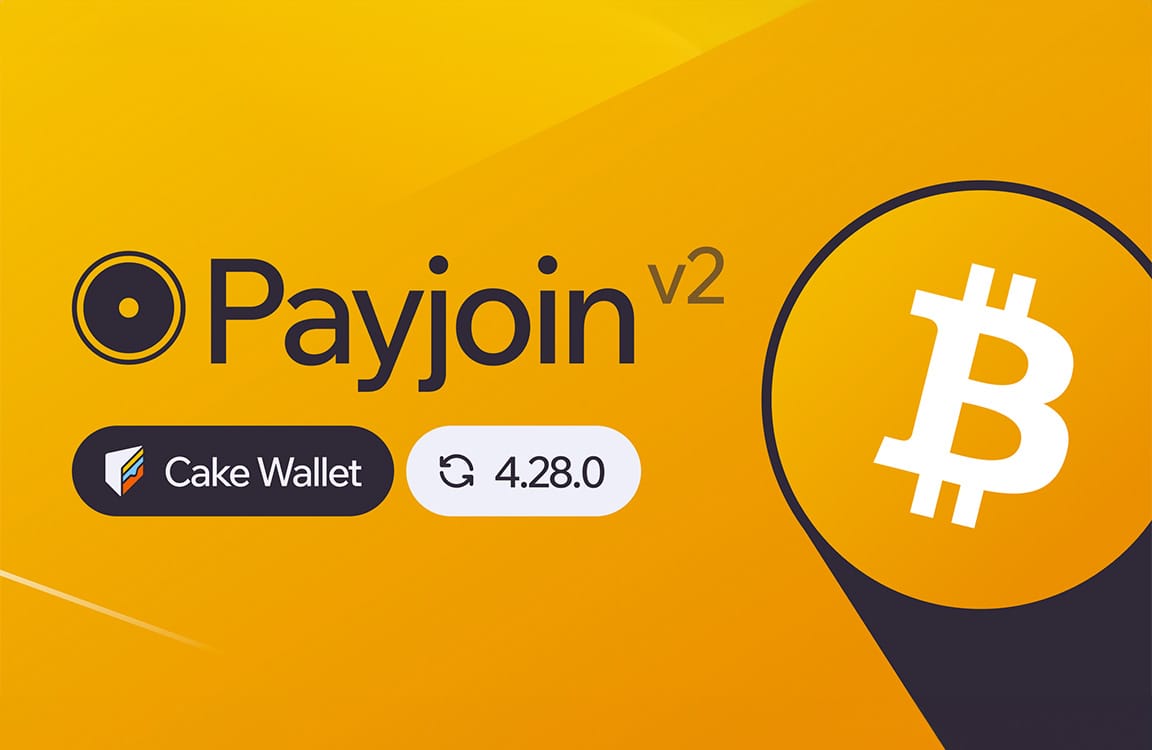
How to started with Payjoin in Cake Wallet:
- Open the app menu sidebar and click
Privacy. - Toggle the
Use Payjoinoption. - Now on your receive screen you'll see an option to copy a Payjoin URL

- Bull Bitcoin Wallet v0.4.0 introduced Payjoin v2 support in late December 2024. However, the current implementations are not interoperable at the moment, an issue that should be addressed in the next release of the Bull Bitcoin Wallet.
- Cake Wallet was one of the first wallets to introduce Silent Payments back in May 2024. However, users may encounter sync issues while using this feature at present, which will be resolved in the next release of Cake Wallet.
What's new
- Payjoin v2 implementation.
- Wallet group improvements: Enhanced management of multiple wallets.
- Various bug fixes: improving overall stability and user experience.
- Monero (XMR) enhancements.
Learn more about using, implementing, and understanding BIP 77: Payjoin Version 2 using the
payjoincrate in Payjoin Dev Kit here. -
 @ 5d4b6c8d:8a1c1ee3
2025-06-15 18:42:08
@ 5d4b6c8d:8a1c1ee3
2025-06-15 18:42:08https://youtu.be/-ne8adkjY6A
Orlando gets Bane
Memphis gets KCP, Cole Anthony, and a bunch of picks
This move makes a lot of sense. Orlando needed someone like Bane and Memphis needed to break up their core.
https://stacker.news/items/1007156
-
 @ f3873798:24b3f2f3
2025-06-15 16:18:52
@ f3873798:24b3f2f3
2025-06-15 16:18:52
Muito se fala sobre racismo no Brasil. A mídia, os políticos e os intelectuais engajados repetem discursos antirracistas, promovem campanhas e ergueram bandeiras pela igualdade. No entanto, existe uma hipocrisia gritante quando olhamos para a realidade dos povos indígenas no país.
No Brasil, o indígena ainda é, juridicamente, tratado como incapaz de decidir por si mesmo, sendo suas terras consideradas propriedade da União. Isso significa, na prática, que tudo o que diz respeito à sua cultura, território e desenvolvimento precisa do “amém” do Estado. É um tipo de tutela que remete aos tempos coloniais, onde os “civilizados” decidiam o que era melhor para os “selvagens”.
O mais engraçado e trágico deste fato, é que não há nenhum movimento midiático que aborda sobre a existência absurda deste tipo de regimento jurídico, não há influenciar não há atores e atrizes da Globo, nem cantores que questione e lance a pauta
Como falar em fim da escravidão ou combate ao racismo estrutural, se ainda hoje tratamos povos inteiros como se fossem incapazes de autodeterminação?
Enquanto isso, o governo federal, representado atualmente por figuras como “Tio Lule”, negocia e entrega terras indígenas para interesses geopolíticos, sustentando ditaduras e alianças internacionais, enquanto os próprios povos originários ficam à margem do desenvolvimento econômico.
Recursos como açaí, cupuaçu, babaçu e muitos outros produtos amazônicos serão explorados por empresas estrangeiras, que lucrarão intensamente, sem que as comunidades locais tenham condições mínimas de acesso aos meios de produção ou ao mercado. Isso destrói a economia regional, perpetua a dependência e impede que o verdadeiro protagonismo indígena aconteça.
Um ciclo que se repete: a história da borracha
O que está em curso não é novidade. É uma repetição histórica. Basta lembrar do ciclo da borracha, quando os ingleses levaram sementes de seringueira da Amazônia para plantar na Ásia, quebrando o monopólio brasileiro e afundando a economia da região Norte, que até hoje carrega as marcas desse roubo histórico.
Agora, a história se repete, mas com outros nomes e produtos — e com o apoio explícito do Estado brasileiro.
-
 @ dfa02707:41ca50e3
2025-06-15 22:02:35
@ dfa02707:41ca50e3
2025-06-15 22:02:35Contribute to keep No Bullshit Bitcoin news going.
- The newest LND release brings upgrades that empower developers with better on-chain management, significantly boost backend scalability for expanding services, and ensure a more seamless and dependable payment experience.
"We are excited to announce the release of LND v0.19.0 beta! This new release focuses on making LND more secure, scalable, and reliable for powering global bitcoin and stablecoin transactions," was announced in a blog post.
- Some highlights of this release include a Replace-By-Fee Cooperative Close for flexible channel closure fees, migration of invoices to SQL for faster startups, enhanced payment reliability through improved pathfinding, transaction sweeper improvements, the addition of Testnet4 support for stable testing, among other things.
"As always, we are grateful for the ongoing support of our external contributors across development, review, and testing. A total of 51 developers contributed to this release. For the complete list of changes included in this release, check out the full release notes."
What's new
- New RBF cooperative close flow. It uses RBF to enable either side to increase their fee rate using their own channel funds. Channel peers must support the
option_simple_closefor this new protocol to work. This new feature can be activated with a new config flag:--protocol.rbf-coop-close.- This feature isn't compatible with older LND versions; fee bumping with them uses CPFP. It already works with Eclair v0.12.0 or up, and should work with other implementations as they roll out support for this protocol. The protocol currently does not support Taproot channels and Taproot asset channels.
- Support for archiving channel backups in a specific folder for future reference. It comes with a new config option,
disable-backup-archive(default:false), to control whether previous backups are archived. - Support for experimental endorsement signal relay. Deployed experimentally to assist ongoing channel jamming research, it has no impact on routing.
- Initial support for quiescence. This protocol gadget is required for upcoming Dynamic Commitments and Splicing features.
- Historical Sync: Fixed a race condition blocking initial sync due to syncer's internal state handling.
- Max Fee Rate is now respected during cooperative close initiation for both parties, not just the remote party.
- Lots of other bug fixes.
-
Performance Improvements:
- Limit outbound gossip traffic bandwidth with --gossip.msg-rate-bytes and --gossip.msg-rate-burst. Set burst to the maximum bytes transmittable without rate limiting, and rate to the ongoing permitted rate.
-
Ability to use ZSTD for log rotation.
-
Remove redundant iteration over a node's persisted channels when updating the graph cache with a new node or node update.
-
Functional Enhancements:
- Add pagination for wallet transactions.
- Make
MaxWaitNumBlocksFundingConfconfigurable for faster test timeouts, with a default of 2016 blocks for production. - Change sweeper to attempt sweeps if the budget is partially covered, preventing delays and high fees.
- Validate MPP parameters before payment to avoid path finding loops and timeouts.
- Functional Updates:
- Enable log compression with ZSTD using the logging.file.compressor argument.
- Enhance SCB file with more data for last-resort rescue when a peer is unavailable.
- Update channel.backup file at shutdown in LND.
- Introduce chainio subsystem to sync subsystems with the current best block, fixing delays in HTLC sweeping due to block height discrepancies in ChainArbitrator, UtxoSweeper, and TxPublisher. Click here to learn more.
- Sweeper now uses configured budget values for HTLCs with
--sweeper.budget.deadlinehtlcratioand--sweeper.budget.deadlinehtlc. - Consider blockbeat dispatcher height when checking if lnd is synced to chain.
- Allocate restricted slots for peers via --num-restricted-slots.
- Added support for bitcoin testnet4.
- Removed x/exp/maps dependency.
- Add --no-disconnect-on-pong-failure option (default: false) to manage peer disconnection on pong failure or mismatch.
-
RPC Additions and Updates. Some RPCs that previously returned an empty response now provide a short status message to help command line users confirm successful execution or background initiation. The following CLI commands no longer return an empty response ({}):
lncli wallet releaseoutput(WalletKit.ReleaseOutputRPC)lncli wallet accounts import-pubkey(WalletKit.ImportPublicKeyRPC)lncli wallet labeltx(WalletKit.LabelTransactionRPC)lncli sendcustom(Lightning.SendCustomMessageRPC)lncli connect(Lightning.ConnectPeerRPC)lncli disconnect(Lightning.DisconnectPeerRPC)lncli stop(Lightning.StopRPC)lncli deletepayments(Lightning.DeleteAllPaymentsResponseRPC)lncli abandonchannel(Lightning.AbandonChannelRPC)lncli restorechanbackup(Lightning.RestoreChannelBackupsRPC)-
lncli verifychanbackup(Lightning.VerifyChanBackupRPC) -
The ForwardInterceptor's MODIFY option now merges custom range TLVs with existing HTLC records, overwriting conflicting values with API-supplied ones.
- Make ProofMatureDelta in gossip configurable via --gossip.announcement-conf, defaulting to 6.
- Add LockedIn boolean field to lnrpc.HTLC to show if an HTLC is locked in by the remote peer.
- Allow custom lock ID and duration in FundPsbt RPC.
- Extend lnrpc.RPCMiddlewareRequest to include gRPC metadata pairs from the initial request's context.Context.
- Updated
PendingSweepsto return all registered outputs in the RPC response, regardless of future locktime, enabling planning for upcoming sweeps and custom aggregation logic. AddedMaturityHeightfield toPendingSweepfor absolute locktime value. - Add BumpForceCloseFee RPC endpoint, moving lncli functionality to LND for broader accessibility.
- Enhance walletrpc.FundPsbt with an option to set fees as sat_per_kw for greater precision.
- Add a new option in walletrpc.FundPsbt to specify the maximum fee-to-output amounts ratio.
- Sort lnrpc.Invoice.Htlcs by InvoiceHTLC.HtlcIndex in the list invoices RPC response.
- Set a default 60-second timeout for routerrpc.SendPaymentV2 when timeout_seconds is unset or 0.
- Include custom_channel_data for custom channels in lnrpc.ClosedChannels response.
- lncli updates and additions:
- Allow pre-generated macaroon root key in lncli create and lncli createwatchonly for deterministic macaroon generation.
- Add --sat_per_kw flag to lncli wallet fundpsbt for precise fee rate specification.
- Include --max_fee_ratio argument in lncli wallet fundpsbt to set maximum fee-to-output amounts ratio.
- Enhance lncli listchannels and lncli closedchannels output with human-readable short channel ID and BOLT02 channel ID; rename chan_id to scid for accuracy.
- Initiate cooperative close flow in coop close case even with active HTLCs, disabling the channel for new HTLCs and starting the flow when no HTLCs remain.
- Introduce macaroon constraint for IP range-based access restriction, expanding beyond spe
-
 @ 8bad92c3:ca714aa5
2025-06-15 22:02:35
@ 8bad92c3:ca714aa5
2025-06-15 22:02:35Marty's Bent
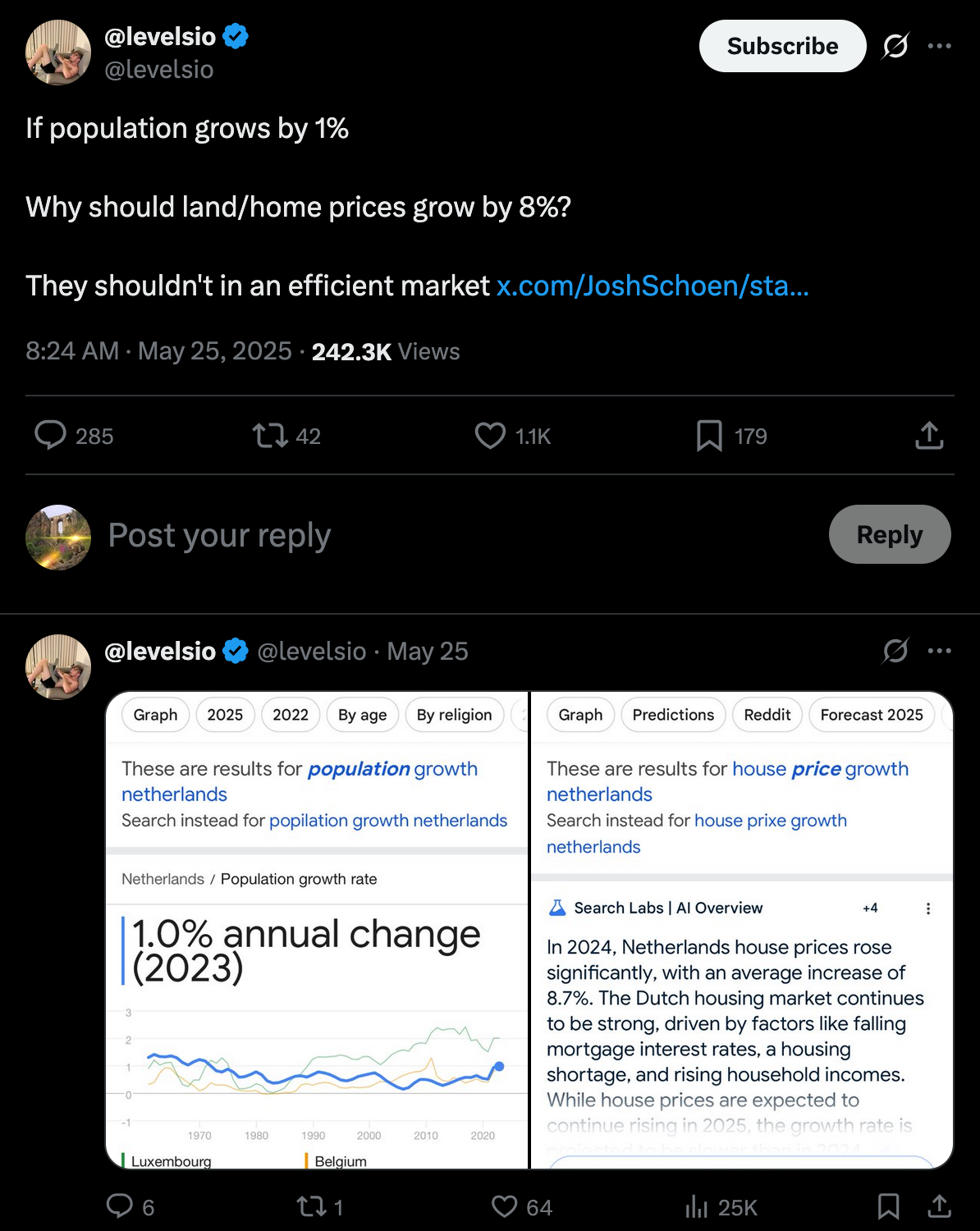
via levelsio

Over the weekend, prolific vibe coder levelsio took to X to complain about the state of housing affordability across Europe. Something that I was very happy to see considering the fact that there is a massive real estate affordability crisis across much of the world and it is important that people who are respected and have platforms speak out when they identify the problem as well. More eyes and focus on the problem is how something begins to get solved.
With that being said, I think levelsio is missing the forest for the trees by blaming institutionalized NIMBYism, burdensome regulations and governments hoarding land that should instead be given to developers to produce more housing supply. I quote tweeted this particular tweet on the subject from levelsio and wanted to take some time today to republish those thoughts here and expand on the topic.
It’s almost as if real estate is being used as a store of value asset instead of the consumable good that it is.
What @levelsio is observing here is called a “monetary premium”. A monetary premium is the value added on top of the consumable/aesthetic/location value of real estate.
This monetary premium exist because central banks and governments have distorted the market for money and people are forced to push value into assets that are scarce relative to dollars. Over the last 50 years real estate has been one of the relatively scarce assets of choice.
The housing affordability crisis is a negative externality of the market reaction to the corruption of money. It can only be fixed by re-introducing hard money into the economy that enables people to store value reliably. If that emerges they won’t have to store value in real estate, the monetary premium of real estate will dissolve and prices will correct to their proper valuations.
This is one of the problems that bitcoin solves.
It’s still early yet, but more and more people are recognizing the utility provided by a neutral reserve asset that can’t be manipulated by central planners. At scale, the effect on assets that have accumulated a monetary premium over decades will be material. All of these assets are significantly overvalued and their monetary premium are leaking into bitcoin.
Put another way, "It's the money, stupid." Now, this isn't to say that the supply of housing in certain areas being artificially restricted isn't having an effect on the price of housing. This is certainly true, especially in cities like San Francisco where there is a relatively strong demand because of the economic density of the area and the desire of many high agency and productive people to live there. But I would put forth that the monetary premium is still the bigger problem and no amount of de-regulation to enable the supply of housing to increase will solve the affordability crisis in the long-run. The only way to get to the root of this specific problem is via bitcoin's mainstream adoption as an apolitical uncontrollable asset with completely idiosyncratic risks when compared to any individual asset class.
Let's say the government did ease up regulations and local NIMBY sympathetics were shoved in a corner to allow new units to be built. This doesn't solve the problem in the short-run because there is a time-delay between when regulations are lifted and when new supply actually makes it to market. In the interim, governments and central banks are inevitably going to go further into debt and be forced to print money to monetize that debt. This will exacerbate inflation and even if new real estate units are brought to market, the builders/owners of those properties will likely have to demand elevated prices to attempt to keep up with inflation.
This also does nothing to solve the problem of real income and wage growth, which are significantly lagging real inflation. Even if prices came down because of a surge in supply, could the Common Man afford a down payment on the property? I'd be shocked if this was the case. And since it's likely not the case the only way to get people into these houses as "owners" would be to offer them zero-down financing, which makes people feel richer than they actually are and leads them to make financially ruinous decisions.
It's the money, stupid. People need a way to save so that they can buy in the first place. Fiat currency doesn't allow this and the only people who can save effectively are those who make enough money to funnel into substitute store of value assets like real estate.
As it stands today, the price-to-income ratio of real estate is 5.0x and the price-t0-rent index is 1.36. Up from 3.3x and 1.14x respectively where the metrics sat in the year 2000. The growth in these ratios is driven predominately via their monetary premium.
And guess what, it's about to get much worse. Donald Trump, Treasury Secretary Scott Bessent and Elon Musk have all signaled that the plan moving forward is to attempt to drive growth and productivity as high as possible while also letting deficits and the debt increase unabated, which means that inflation is likely to continue unabated and potentially increase.
It might make sense to get some bitcoin if that is the case.

via me
"Whale in the Pool" Risk That Could Destroy MSTY Investors
Jessy Gilger raised serious concerns about MSTY and similar derivative products that promise eye-popping yields. He pointed to the COVID crash where gold mining ETFs using derivatives collapsed 95% and never recovered, despite gold itself performing well. Jessy noted that while his team calculated reasonable MicroStrategy covered call yields of 16-22%, MSTY advertises 120% annualized distributions - a red flag that suggests these aren't sustainable dividends from profits, but potentially just returning investors' own capital.
"If a whale pees in the pool, everyone is affected." - Jessy Gilger
Jessy explained that when large investors need to exit these pooled products during market stress, they must sell derivative positions into illiquid markets with no buyers, potentially triggering catastrophic losses for all participants. His solution? Private pools through separately managed accounts that achieve similar income goals without the contagion risk of being trapped with panicking whales.
Check out the full podcast here for more on Gannett Trust's multi-sig solution, Bitcoin retirement planning and corporate treasury strategies.
Headlines of the Day
World's Largest Bitcoin Conference Starts Tomorrow- via X
Remixpoint to Buy Additional ¥1 Billion in Bitcoin - via X
Get our new STACK SATS hat - via tftcmerch.io
Marty to Judge Bitcoin World Record Try in Vegas - via X
Take the First Step Off the Exchange
Bitkey is an easy, secure way to move your Bitcoin into self-custody. With simple setup and built-in recovery, it’s the perfect starting point for getting your coins off centralized platforms and into cold storage—no complexity, no middlemen.
Take control. Start with Bitkey.
Use the promo code *“TFTC20”* during checkout for 20% off
Ten31, the largest bitcoin-focused investor, has deployed 158,469 sats | $150.00M across 30+ companies through three funds. I am a Managing Partner at Ten31 and am very proud of the work we are doing. Learn more at ten31.vc/invest.
Final thought...
Looking forward to a fun, productive and wholesome week in Las Vegas, Nevada.
Get this newsletter sent to your inbox daily: https://www.tftc.io/bitcoin-brief/
Subscribe to our YouTube channels and follow us on Nostr and X:
@media screen and (max-width: 480px) { .mobile-padding { padding: 10px 0 !important; } .social-container { width: 100% !important; max-width: 260px !important; } .social-icon { padding: 0 !important; } .social-icon img { height: 32px !important; width: 32px !important; } .icon-cell { padding: 0 4px !important; } } .mj-column-per-33-333333333333336 { width: 25% !important; max-width: 25%; } .moz-text-html .mj-column-per-33-333333333333336 { width: 25% !important; max-width: 25%; } /* Helps with rendering in various email clients */ body { margin: 0 !important; padding: 0 !important; -webkit-text-size-adjust: 100% !important; -ms-text-size-adjust: 100% !important; } img { -ms-interpolation-mode: bicubic; } /* Prevents Gmail from changing the text color in email threads */ .im { color: inherit !important; }
[
 ](https://youtube.com/@T
](https://youtube.com/@T -
 @ 39cc53c9:27168656
2025-06-15 14:46:30
@ 39cc53c9:27168656
2025-06-15 14:46:30I'm launching a new service review section on this blog in collaboration with OrangeFren. These reviews are sponsored, yet the sponsorship does not influence the outcome of the evaluations. Reviews are done in advance, then, the service provider has the discretion to approve publication without modifications.
Sponsored reviews are independent from the kycnot.me list, being only part of the blog. The reviews have no impact on the scores of the listings or their continued presence on the list. Should any issues arise, I will not hesitate to remove any listing.
The review
WizardSwap is an instant exchange centred around privacy coins. It was launched in 2020 making it old enough to have weathered the 2021 bull run and the subsequent bearish year.
| Pros | Cons | |------|------| | Tor-friendly | Limited liquidity | | Guarantee of no KYC | Overly simplistic design | | Earn by providing liquidity | |
Rating: ★★★★★ Service Website: wizardswap.io
Liquidity
Right off the bat, we'll start off by pointing out that WizardSwap relies on its own liquidity reserves, meaning they aren't just a reseller of Binance or another exchange. They're also committed to a no-KYC policy, when asking them, they even promised they would rather refund a user their original coins, than force them to undergo any sort of verification.
On the one hand, full control over all their infrastructure gives users the most privacy and conviction about the KYC policies remaining in place.
On the other hand, this means the liquidity available for swapping isn't huge. At the time of testing we could only purchase at most about 0.73 BTC with XMR.
It's clear the team behind WizardSwap is aware of this shortfall and so they've come up with a solution unique among instant exchanges. They let you, the user, deposit any of the currencies they support into your account and earn a profit on the trades made using your liquidity.
Trading
Fees on WizardSwap are middle-of-the-pack. The normal fee is 2.2%. That's more than some exchanges that reserve the right to suddenly demand you undergo verification, yet less than half the fees on some other privacy-first exchanges. However as we mentioned in the section above you can earn almost all of that fee (2%) if you provide liquidity to WizardSwap.
It's good that with the current Bitcoin fee market their fees are constant regardless of how much, or how little, you send. This is in stark contrast with some of the alternative swap providers that will charge you a massive premium when attempting to swap small amounts of BTC away.
Test trades
Test trades are always performed without previous notice to the service provider.
During our testing we performed a few test trades and found that every single time WizardSwap immediately detected the incoming transaction and the amount we received was exactly what was quoted before depositing. The fees were inline with what WizardSwap advertises.

- Monero payment proof
- Bitcoin received
- Wizardswap TX link - it's possible that this link may cease to be valid at some point in the future.
ToS and KYC
WizardSwap does not have a Terms of Service or a Privacy Policy page, at least none that can be found by users. Instead, they offer a FAQ section where they addresses some basic questions.
The site does not mention any KYC or AML practices. It also does not specify how refunds are handled in case of failure. However, based on the FAQ section "What if I send funds after the offer expires?" it can be inferred that contacting support is necessary and network fees will be deducted from any refund.
UI & Tor
WizardSwap can be visited both via your usual browser and Tor Browser. Should you decide on the latter you'll find that the website works even with the most strict settings available in the Tor Browser (meaning no JavaScript).
However, when disabling Javascript you'll miss the live support chat, as well as automatic refreshing of the trade page. The lack of the first means that you will have no way to contact support from the trade page if anything goes wrong during your swap, although you can do so by mail.
One important thing to have in mind is that if you were to accidentally close the browser during the swap, and you did not save the swap ID or your browser history is disabled, you'll have no easy way to return to the trade. For this reason we suggest when you begin a trade to copy the url or ID to someplace safe, before sending any coins to WizardSwap.
The UI you'll be greeted by is simple, minimalist, and easy to navigate. It works well not just across browsers, but also across devices. You won't have any issues using this exchange on your phone.
Getting in touch
The team behind WizardSwap appears to be most active on X (formerly Twitter): https://twitter.com/WizardSwap_io
If you have any comments or suggestions about the exchange make sure to reach out to them. In the past they've been very receptive to user feedback, for instance a few months back WizardSwap was planning on removing DeepOnion, but the community behind that project got together ^1 and after reaching out WizardSwap reversed their decision ^2.
You can also contact them via email at:
support @ wizardswap . ioDisclaimer
None of the above should be understood as investment or financial advice. The views are our own only and constitute a faithful representation of our experience in using and investigating this exchange. This review is not a guarantee of any kind on the services rendered by the exchange. Do your own research before using any service.
-
 @ 7f6db517:a4931eda
2025-06-15 21:01:50
@ 7f6db517:a4931eda
2025-06-15 21:01:50
@matt_odell don't you even dare not ask about nostr!
— Kukks (Andrew Camilleri) (@MrKukks) May 18, 2021
Nostr first hit my radar spring 2021: created by fellow bitcoiner and friend, fiatjaf, and released to the world as free open source software. I was fortunate to be able to host a conversation with him on Citadel Dispatch in those early days, capturing that moment in history forever. Since then, the protocol has seen explosive viral organic growth as individuals around the world have contributed their time and energy to build out the protocol and the surrounding ecosystem due to the clear need for better communication tools.
nostr is to twitter as bitcoin is to paypal
As an intro to nostr, let us start with a metaphor:
twitter is paypal - a centralized platform plagued by censorship but has the benefit of established network effects
nostr is bitcoin - an open protocol that is censorship resistant and robust but requires an organic adoption phase
Nostr is an open communication protocol that can be used to send messages across a distributed set of relays in a censorship resistant and robust way.
- Anyone can run a relay.
- Anyone can interact with the protocol.
- Relays can choose which messages they want to relay.
- Users are identified by a simple public private key pair that they can generate themselves.Nostr is often compared to twitter since there are nostr clients that emulate twitter functionality and user interface but that is merely one application of the protocol. Nostr is so much more than a mere twitter competitor. Nostr clients and relays can transmit a wide variety of data and clients can choose how to display that information to users. The result is a revolution in communication with implications that are difficult for any of us to truly comprehend.
Similar to bitcoin, nostr is an open and permissionless protocol. No person, company, or government controls it. Anyone can iterate and build on top of nostr without permission. Together, bitcoin and nostr are incredibly complementary freedom tech tools: censorship resistant, permissionless, robust, and interoperable - money and speech protected by code and incentives, not laws.
As censorship throughout the world continues to escalate, freedom tech provides hope for individuals around the world who refuse to accept the status quo. This movement will succeed on the shoulders of those who choose to stand up and contribute. We will build our own path. A brighter path.
My Nostr Public Key: npub1qny3tkh0acurzla8x3zy4nhrjz5zd8l9sy9jys09umwng00manysew95gx
If you found this post helpful support my work with bitcoin.

-
 @ 8bad92c3:ca714aa5
2025-06-15 22:02:34
@ 8bad92c3:ca714aa5
2025-06-15 22:02:34Key Takeaways

In this landmark episode of TFTC, Adam Back and Sean Bill explore Bitcoin’s path to $1 million, focusing on its growing role as pristine collateral in a faltering financial system. Back highlights Blockstream’s infrastructure efforts, from mining operations to tokenized securities, designed to support this transformation, while Bill shares how he navigated institutional skepticism to bring Bitcoin exposure to a U.S. pension fund. Together, they unpack how institutions are entering the space through structured products and Bitcoin-backed credit, with Blockstream’s mining notes offering a glimpse of this new financial architecture. Amid rising debt, inflation, and fiat fragility, the duo presents Bitcoin not just as sound money, but as a strategic reserve asset gaining traction from El Salvador to Wall Street.
Best Quotes
"It's not a stretch to say that Bitcoin could reach parity with gold. That would imply something closer to a million dollars a coin."
"Digital gold vastly understates Bitcoin’s potential, but it’s where the conversation had to start."
"We’re not just building software, we’re solving financial market gaps, one at a time."
"You can wipe out an entire pension fund’s unfunded liability with a 2% allocation to Bitcoin, if it performs as we expect."
"ETF buyers are the new hodlers. They’re not day traders; they’re five-year pocket investors."
"Bitcoin is becoming super collateral, its role in structured credit could help engineer the soft landing everyone hopes for."
"In a world of financial repression, Bitcoin is how the have-nots finally access property rights and savings."
"Emerging markets will be the early adopters of Bitcoin finance because they need it the most."
"You worked for your money. To systematically steal it through hidden inflation is perverse."
"Bitcoin could be the story that saves public pensions, and the people relying on them."
Conclusion
This episode presents a bold vision of Bitcoin as more than sound money, it’s the foundation of a new global financial system. Adam Back and Sean Bill argue that Bitcoin’s role as “super collateral” is reshaping credit, pensions, and sovereign reserves, while a robust infrastructure of financial tools quietly prepares it to absorb institutional capital. As fiat trust erodes, Bitcoin’s adoption will be driven not by hype, but by necessity, and when the shift becomes undeniable, $1 million per coin will mark the start of a new financial era.
Timestamps
00:00:00 - Intro
00:00:38 - New ATH
00:02:06 - Sean's Journey Getting Bitcoin Into Pensions
00:03:15 - Blockstream's Evolution Into Finance
00:08:30 - Building Bitcoin Financial Infrastructure
00:14:30 - The Challenge of Conservative Pension Boards
00:17:02 - Bitkey
00:18:10 - Bitcoin's Current Price and Market Cycle
00:24:05 - Bitcoin as Super Collateral
00:27:24 - Unchained
00:30:09 - Cypherpunk Ideals vs Financial Reality
00:34:55 - Pension Fund Crisis and Bitcoin Solution
00:42:29 - The Cypherpunk Banking Stack
00:49:54 - Digital Cash and Free Banking
00:57:06 - Liquid Network and Institutional Rails
01:07:49 - Sean At CBOT
01:22:16 - Bitcoin Futures and Market Structure
01:25:53 - 2025 Bitcoin Price PredictionsTranscript
(00:00) I'm uh permeable, so I'm always astounded that it's not, you know, 10 or 100 times higher. If everybody saw it, the addressable mark, I mean, it would already be 100 200 trillion asset class, right? That's not a stretch to say that Bitcoin could reach parody with gold. That would imply something closer to a million dollars a coin.
(00:18) You see some established public market companies in different countries saying, "Oh, we're going to buy a billion of Bitcoin. We're going to raise and buy 500." Black Rockck ETF. They're even talking about recommended allocations to portfolio managers in the 2% range. Obviously, digital gold would vastly understate the potential of Bitcoin.
(00:38) Gentlemen, thank you for joining me. Of course. Thanks for having us on. Uh Adam, I was just saying I'm woefully embarrassed. This podcast is almost 8 years old and this is your first time on the show. Oh, okay. This is uh but it's an exciting time. Yeah. And you uh really dedicated to podcast. It's been a lot of years, a lot of episodes, right? It has been. Cool.
(00:59) I think we're approaching 700, which is crazy to think. Wow, that is impressive. The uh No, we're talking hit a new alltime high today. Yeah, Bitcoin doing Bitcoin things just as we were on stage uh at the talking hedge kind of asset manager conference uh trying to explain to them why they should put Bitcoin in their uh fund allocations.
(01:23) Yeah, we were discussing it before we hit record and I saw Tur's tweet looked like Tur was at the event, too. Yeah, he was. M so 50% held up they have Bitcoin in their personal account but only 2% or 4% of the funds very few that actually had allocated to Bitcoin. So a lot of them are believers at a personal level but they haven't been able to sell it within their institution you know so they own it themselves uh but they haven't quite gotten the boards to agree yet.
(01:53) So which was a similar situation I was in in 2019 when I first proposed it. You know, I had my experience with Bitcoin. I had a very good experience and was trying to convince uh the pensions in California that they should be looking at adding Bitcoin to the portfolio. Yeah. And it was great to hear some of your background last night, Sean.
(02:11) So, Sean, for those of you watching, uh is the CIO at Blockstream now. Yeah. I am really excited to have both of you here because I've got into Bitcoin in 2013 and nerded out uh on the tech side of Bitcoin distributed system mining full nodes the layered stack that's been built out and so I followed probably all the work that you guys have done at Blockstream since you've been around and it's been really cool to see everything you've done from the Blockstream satellite.
(02:42) I've broadcast some transactions through that before. It's a Jade um uh CLN or excuse me, Core Lightning now. Um the uh liquid and now over the last few years really sort of leaning into the financialization of finance as I like to um to reference it. And so Adam, like how's that transition from being hypert focused towards a more financial perspective on Bitcoin been? Well, actually in our 2014 uh kickoff meeting, you know, with the founders sitting around big whiteboard, we were trying to forward cast what we'd have to do to get
(03:28) a Bitcoin layer 2 for, you know, settlement of assets and Bitcoin working. And one of the risk you know so we thought we'll build the tech and other people issue the assets but like well they might be lazy they might not do it if that happens we'll have to do it ourselves. So there was a lot of situations like that actually where you know you would think there would be lots of people building applications but many people are really just more in business development and a technology is basically a website and a database and
(03:55) you know Bitcoin core wallet on a server or something like that right so we actually ended up building a lot of middleware and getting into asset management a couple earlier steps one was the mining note so we're doing hosting and mining in our own account and what we did when when it was public that we were hosting initially Fidelity was the uh launch customer.
(04:16) They kept coming back to us and saying, "No, we need we need some hosting." And you know, uh, they'd looked around and decided that we were the best. We were we were like, "No, no, we're prop mining. We don't do hosting." But they persuaded us to host them. And then we're like, "Okay, maybe we should expand and host for other people.
(04:31) " And then that became news. And so then a lot of Bitcoiners contacted us and says, you know, I've got like a dozen miners. Can you host them for me? And of course, if you're if you're hosting for thousands of customers, that's a whole you need need a support team. Somebody has got two miners and one of them's crashed or failed, they're very upset, right? It's half the revenue.
(04:52) Whereas somebody's got, you know, 10,000 per client, it's just part of the, you know, maintenance cycle like a big data center. Discs fail 1% a year, you replace them when they die, they raid, it doesn't matter, right? So, it's kind of that phenomena. So we try to figure out well how can we help you know how can we help people do this without creating a you know that painoint and so we designed this mining note concept where it's kind of socialized so that collectively they look like one of the enterprise customers and then we put a 10% buffer in it so that we would eat
(05:22) the first 10% of equipment failure so they wouldn't get you know the drooping hash rate as miners like failed due to age uh for the for the onset And we also figured out how to try and make them a unified market. So, you know, we're selling more tranches into the market. This started in 2021, a three-year product.
(05:45) And um you know, there was some people on the launch branch and then some people 3 months later. So, what we do is look at how many Bitcoin it had mined in the first three months. We buy that and then match it with a 33month contract for the next one. And so the economically equivalent neither dilutive or anti-dilutive for the buyer and therefore they could trade in a unified market even though there were eight sales tranches over the first I don't know like 12 months or something like that and that that market you know it was using initially using uh liquid
(06:17) security tokens uh with uh stalker a European company that does the securitization I mean the legal p -
 @ 7f6db517:a4931eda
2025-06-15 21:01:49
@ 7f6db517:a4931eda
2025-06-15 21:01:49
Nostr is an open communication protocol that can be used to send messages across a distributed set of relays in a censorship resistant and robust way.
If you missed my nostr introduction post you can find it here. My nostr account can be found here.
We are nearly at the point that if something interesting is posted on a centralized social platform it will usually be posted by someone to nostr.
We are nearly at the point that if something interesting is posted exclusively to nostr it is cross posted by someone to various centralized social platforms.
We are nearly at the point that you can recommend a cross platform app that users can install and easily onboard without additional guides or resources.
As companies continue to build walls around their centralized platforms nostr posts will be the easiest to cross reference and verify - as companies continue to censor their users nostr is the best censorship resistant alternative - gradually then suddenly nostr will become the standard. 🫡
Current Nostr Stats
If you found this post helpful support my work with bitcoin.

-
 @ dfa02707:41ca50e3
2025-06-15 21:01:48
@ dfa02707:41ca50e3
2025-06-15 21:01:48News
- Bitcoin mining centralization in 2025. According to a blog post by b10c, Bitcoin mining was at its most decentralized in May 2017, with another favorable period from 2019 to 2022. However, starting in 2023, mining has become increasingly centralized, particularly due to the influence of large pools like Foundry and the use of proxy pooling by entities such as AntPool.

Source: b10c's blog.
- OpenSats announces the eleventh wave of Nostr grants. The five projects in this wave are the mobile live-streaming app Swae, the Nostr-over-ham-radio project HAMSTR, Vertex—a Web-of-Trust (WOT) service for Nostr developers, Nostr Double Ratchet for end-to-end encrypted messaging, and the Nostr Game Engine for building games and applications integrated with the Nostr ecosystem.
- New Spiral grantee: l0rinc. In February 2024, l0rinc transitioned to full-time work on Bitcoin Core. His efforts focus on performance benchmarking and optimizations, enhancing code quality, conducting code reviews, reducing block download times, optimizing memory usage, and refactoring code.
- Project Eleven offers 1 BTC to break Bitcoin's cryptography with a quantum computer. The quantum computing research organization has introduced the Q-Day Prize, a global challenge that offers 1 BTC to the first team capable of breaking an elliptic curve cryptographic (ECC) key using Shor’s algorithm on a quantum computer. The prize will be awarded to the first team to successfully accomplish this breakthrough by April 5, 2026.
- Unchained has launched the Bitcoin Legacy Project. The initiative seeks to advance the Bitcoin ecosystem through a bitcoin-native donor-advised fund platform (DAF), investments in community hubs, support for education and open-source development, and a commitment to long-term sustainability with transparent annual reporting.
- In its first year, the program will provide support to Bitcoin hubs in Nashville, Austin, and Denver.
- Support also includes $50,000 to the Bitcoin Policy Institute, a $150,000 commitment at the University of Austin, and up to $250,000 in research grants through the Bitcoin Scholars program.
"Unchained will match grants 1:1 made to partner organizations who support Bitcoin Core development when made through the Unchained-powered bitcoin DAF, up to 1 BTC," was stated in a blog post.
- Block launched open-source tools for Bitcoin treasury management. These include a dashboard for managing corporate bitcoin holdings and provides a real-time BTC-to-USD price quote API, released as part of the Block Open Source initiative. The company’s own instance of the bitcoin holdings dashboard is available here.
Source: block.xyz
- Bull Bitcoin expands to Mexico, enabling anyone in the country to receive pesos from anywhere in the world straight from a Bitcoin wallet. Additionally, users can now buy Bitcoin with a Mexican bank account.
"Bull Bitcoin strongly believes in Bitcoin’s economic potential in Mexico, not only for international remittances and tourism, but also for Mexican individuals and companies to reclaim their financial sovereignty and protect their wealth from inflation and the fragility of traditional financial markets," said Francis Pouliot, Founder and CEO of Bull Bitcoin.
- Corporate bitcoin holdings hit a record high in Q1 2025. According to Bitwise, public companies' adoption of Bitcoin has hit an all-time high. In Q1 2025, these firms collectively hold over 688,000 BTC, marking a 16.11% increase from the previous quarter. This amount represents 3.28% of Bitcoin's fixed 21 million supply.

Source: Bitwise.
- The Bitcoin Bond Company for institutions has launched with the aim of acquiring $1 trillion in Bitcoin over 21 years. It utilizes secure, transparent, and compliant bond-like products backed by Bitcoin.
- The U.S. Senate confirmed Paul Atkins as Chair of the Securities and Exchange Commission (SEC). At his confirmation hearing, Atkins emphasized the need for a clear framework for digital assets. He aims to collaborate with the CFTC and Congress to address jurisdiction and rulemaking gaps, aligning with the Trump administration's goal to position the U.S. as a leader in Bitcoin and blockchain finance.
- Ethereum developer Virgil Griffith has been released from custody. Griffith, whose sentence was reduced to 56 months, is now seeking a pardon. He was initially sentenced to 63 months for allegedly violating international sanctions laws by providing technical advice on using cryptocurrencies and blockchain technology to evade sanctions during a presentation titled 'Blockchains for Peace' in North Korea.
- No-KYC exchange eXch to close down under money laundering scrutiny. The privacy-focused cryptocurrency trading platform said it will cease operations on May 1. This decision follows allegations that the platform was used by North Korea's Lazarus Group for money laundering. eXch revealed it is the subject of an active "transatlantic operation" aimed at shutting down the platform and prosecuting its team for "money laundering and terrorism."
- Blockstream combats ESP32 FUD concerning Jade signers. The company stated that after reviewing the vulnerability disclosed in early March, Jade was found to be secure. Espressif Systems, the designer of the ESP32, has since clarified that the "undocumented commands" do not constitute a "backdoor."
- Bank of America is lobbying for regulations that favor banks over tech firms in stablecoin issuance. The bank's CEO Brian Moynihan is working with groups such as the American Bankers Association to advance the issuance of a fully reserved, 1:1 backed "Bank of America coin." If successful, this could limit stablecoin efforts by non-banks like Tether, Circle, and others, reports The Block.
- Tether to back OCEAN Pool with its hashrate. "As a company committed to financial freedom and open access, we see supporting decentralization in Bitcoin mining as essential to the network’s long-term integrity," said Tether CEO Paolo Ardoino.
- Bitdeer to expand its self-mining operations to navigate tariffs. The Singapore-based mining company is advancing plans to produce machines in the U.S. while reducing its mining hardware sales. This response is in light of increasing uncertainties related to U.S. trade policy, as reported by Bloomberg.
- Tether acquires $32M in Bitdeer shares. The firm has boosted its investment in Bitdeer during a wider market sell-off, with purchases in early to mid-April amounting to about $32 million, regulatory filings reveal.
- US Bitcoin miner manufacturer Auradine has raised $153 million in a Series C funding round as it expands into AI infrastructure. The round was led by StepStone Group and included participation from Maverick Silicon, Premji Invest, Samsung Catalyst Fund, Qualcomm Ventures, Mayfield, MARA Holdings, GSBackers, and other existing investors. The firm raised to over $300 million since its inception in 2022.
- Voltage has partnered with BitGo to [enable](https://www.voltage.cloud/blog/bitgo-and-voltage-team-up-to-deliver-instant-bitcoin-and-stabl
-
 @ 8bad92c3:ca714aa5
2025-06-15 22:02:34
@ 8bad92c3:ca714aa5
2025-06-15 22:02:34MicroStrategy's Debt-Financed Bitcoin Strategy Will Force a Reckoning Within 18 Months - Jessy Gilger

Jessy Gilger from Unchained Capital warned about the sustainability of MicroStrategy's model and its derivatives like MSTY. He predicts that as more companies adopt Bitcoin treasury strategies, "the P&L will matter more as the balance sheet gets commoditized." Within the next 18 months, he expects the current arbitrage opportunities that MicroStrategy exploits will diminish as Bitcoin reaches higher liquidity levels and more competitors enter the space.
His most concerning prediction involves MSTY specifically, which currently offers distributions annualized at 120% - far exceeding the 16-22% he calculates as reasonable from covered call strategies. "If a whale wants out of MSTY in size... they could sell those derivative positions into an illiquid market where there's no bid," potentially causing a 95% collapse similar to what happened with gold mining ETFs during COVID. He advises investors to consider "private pools" for options strategies rather than pooled products where "you're in the pool with everyone else" and subject to forced liquidations.
Pensions Will Drive the Next Major Bitcoin Adoption Wave in 2026-2027 - Adam Back
Adam Back sees institutional adoption accelerating dramatically as pension funds begin allocating to Bitcoin. "The institutional cover of some of the bigger entities that people would reference... you don't get fired for following BlackRock's recommendation," he explained. With BlackRock now suggesting 2% portfolio allocations and the infrastructure finally in place through Blockstream's new Gannett Trust Company, the barriers for institutional adoption are falling rapidly.
Back predicts this will create a "snowball" effect as pension funds realize Bitcoin can help address their massive unfunded liabilities. He noted that financial institutions offering Bitcoin products are "slow movers" with "policies and training materials and guidance that they got to get through," but once activated, the scale will dwarf current retail and ETF flows. The combination of pension fund allocations, continued nation-state adoption, and the mathematical scarcity of Bitcoin leads him to view even $100,000 as "cheap" given where the market is headed.
Traditional Bond Markets Will Collapse as Bitcoin Becomes the Escape Hatch - Sean Bill
Sean Bill sees a massive shift coming as bond markets deteriorate globally. "You peel back the onion. So who benefits from financial repression, right. And inflating your way out of assets," he explained. With Japanese bond yields blowing out and U.S. 30-year yields jumping 10 basis points in a single day, Bill predicts we're witnessing the early stages of a sovereign debt crisis that will drive unprecedented flows into Bitcoin.
He pointed to Japan's MetaPlanet as a preview of what's coming: "The whole bond market of Japan just flowed into a hotel company." As pension funds and institutions realize they can't meet obligations through traditional fixed income, Bitcoin will become the only viable alternative. Bill believes this transition will accelerate once fiduciaries understand Bitcoin's role as "pristine collateral" that can help them "chip away at those unfunded liabilities." His experience getting Santa Clara County's pension into Bitcoin in 2021 showed him firsthand how a 1-3% allocation at $17,000 could have "wiped out the unfunded liability" as Bitcoin approached $100,000.
Adam Back & Sean Bill Podcast Here
Blockspace conducts cutting-edge proprietary research for investors.
New Bitcoin Mining Pool Flips Industry Model: "Plebs Eat First" Could Threaten Corporate Dominance
UTXO Management's explosive report forecasts unprecedented institutional demand that could absorb 20% of Bitcoin's circulating supply by 2026. Bitcoin ETFs shattered records with $36.2 billion in year-one inflows, crushing every commodity ETF launch—and they're projected to hit $100 billion annually by 2027.
The real story? ETFs are just the appetizer. Five massive catalysts are converging: wealth platforms eyeing $120 billion from a modest 0.5% allocation across $60 trillion AUM; corporations following MicroStrategy's playbook now holding 803,143 BTC; potential U.S. Strategic Reserve of 1 million BTC; 13 states with active Bitcoin reserve bills; and the rise of BTCfi yield strategies offering 2-15% returns.
The game-changer: these aren't day traders. CFOs, treasurers, and governments are structurally locked buyers seeking BTC-denominated yields, not quick profits. With FASB mark-to-market accounting removing impairment headaches and regulatory clarity accelerating globally, institutions face a stark reality—allocate now or chase exposure at dramatically higher prices.
This isn't another cycle. It's the institutional colonization of Bitcoin.
Subscribe to them here (seriously, you should): https://newsletter.blockspacemedia.com/
Ten31, the largest bitcoin-focused investor, has deployed $150M across 30+ companies through three funds. I am a Managing Partner at Ten31 and am very proud of the work we are doing. Learn more at ten31.vc/invest.
Get this newsletter sent to your inbox daily: https://www.tftc.io/bitcoin-brief/
STACK SATS hat: https://tftcmerch.io/
Subscribe to our YouTube channels and follow us on Nostr and X:
@media screen and (max-width: 480px) { .mobile-padding { padding: 10px 0 !important; } .social-container { width: 100% !important; max-width: 260px !important; } .social-icon { padding: 0 !important; } .social-icon img { height: 32px !important; width: 32px !important; } .icon-cell { padding: 0 4px !important; } } .mj-column-per-33-333333333333336 { width: 25% !important; max-width: 25%; } .moz-text-html .mj-column-per-33-333333333333336 { width: 25% !important; max-width: 25%; } /* Helps with rendering in various email clients */ body { margin: 0 !important; padding: 0 !important; -webkit-text-size-adjust: 100% !important; -ms-text-size-adjust: 100% !important; } img { -ms-interpolation-mode: bicubic; } /* Prevents Gmail from changing the text color in email threads */ .im { color: inherit !important; }
-
 @ 7f6db517:a4931eda
2025-06-15 21:01:48
@ 7f6db517:a4931eda
2025-06-15 21:01:48
For years American bitcoin miners have argued for more efficient and free energy markets. It benefits everyone if our energy infrastructure is as efficient and robust as possible. Unfortunately, broken incentives have led to increased regulation throughout the sector, incentivizing less efficient energy sources such as solar and wind at the detriment of more efficient alternatives.
The result has been less reliable energy infrastructure for all Americans and increased energy costs across the board. This naturally has a direct impact on bitcoin miners: increased energy costs make them less competitive globally.
Bitcoin mining represents a global energy market that does not require permission to participate. Anyone can plug a mining computer into power and internet to get paid the current dynamic market price for their work in bitcoin. Using cellphone or satellite internet, these mines can be located anywhere in the world, sourcing the cheapest power available.
Absent of regulation, bitcoin mining naturally incentivizes the build out of highly efficient and robust energy infrastructure. Unfortunately that world does not exist and burdensome regulations remain the biggest threat for US based mining businesses. Jurisdictional arbitrage gives miners the option of moving to a friendlier country but that naturally comes with its own costs.
Enter AI. With the rapid development and release of AI tools comes the requirement of running massive datacenters for their models. Major tech companies are scrambling to secure machines, rack space, and cheap energy to run full suites of AI enabled tools and services. The most valuable and powerful tech companies in America have stumbled into an accidental alliance with bitcoin miners: THE NEED FOR CHEAP AND RELIABLE ENERGY.
Our government is corrupt. Money talks. These companies will push for energy freedom and it will greatly benefit us all.
Microsoft Cloud hiring to "implement global small modular reactor and microreactor" strategy to power data centers: https://www.datacenterdynamics.com/en/news/microsoft-cloud-hiring-to-implement-global-small-modular-reactor-and-microreactor-strategy-to-power-data-centers/
If you found this post helpful support my work with bitcoin.

-
 @ 8bad92c3:ca714aa5
2025-06-15 22:02:34
@ 8bad92c3:ca714aa5
2025-06-15 22:02:34Marty's Bent

Sorry for the lack of writing over the last week. As many of you may already know, I was in Las Vegas, Nevada for the Bitcoin 2025 conference. It was my first time in Las Vegas. I had successfully avoided Sin City for the first 34 years of my life. But when duty calls, you have to make some personal concessions.
Despite what many say about this particular conference and the spectacle that it has become, I will say that having attended every single one of Bitcoin Magazine's conferences since 2019, I thoroughly enjoy these events, even if I don't agree with all the content. Being able to congregate with others in the industry who have been working extremely hard to push Bitcoin forward, all of whom I view as kindred spirits who have also dedicated their lives to making the world a better place. There's nothing better than getting together, seeing each other in person, shaking hands, giving hugs, catching up and reflecting on how much things have changed over the years while also focusing on the opportunities that lie ahead.
I think out of all the Bitcoin magazine conferences I've been to, this was certainly my favorite. If only because it has become abundantly clear that Bitcoin is here to stay. Many powerful, influential, and competent people have identified Bitcoin as an asset and monetary network that will play a large part in human society moving forward. And more importantly, Bitcoin is proving to work far better than anybody not paying attention expected. While at the same time, the fiat system is in woeful disrepair at the same time.
As a matter of reflection and surfacing signal for you freaks, here are the presentations and things that happened that I think were the most impactful.
Miles Suter's Block Presentation
This presentation was awesome for many reasons, one of which being that we often forget just how dedicated Block, as an organization with many companies - including Cash App, Square, the open source organization known as Spiral and more recently, BitKey and Proto - has been to bitcoin over the last eight years. They've worked methodically to make Bitcoin a first-class citizen in their business operations and slowly but surely have built an incredibly integrated experience across their brands. The two big announcements from Block during the conference were the enablement of Bitcoin payments in Square point-of-sale systems and the amount of revenue they're making on their Lightning node, c=, from routing payments.
Right now, the Bitcoin payments and point of sale systems is in beta with many merchants testing it out for the next six months, but it will be available for all 4 million square merchants in 2026. This is something that many bitcoiners have been waiting for for many years now, and it is incredible to see that they finally brought it across the line. Merchants will have the ability to accept bitcoin payments and either convert every payment into fiat automatically, convert a portion of the bitcoin payment into fiat to keep the rest in sats, or simply keep all of the bitcoin they receive via payments in sats. This is an incredible addition to what Square has already built, which is the ability of their merchants to sweep a portion of their revenues into bitcoin if they desire. Square is focused on building a vertically integrated suite of bitcoin products for merchants that includes the ability to buy bitcoin, receive bitcoin, and eventually leverage financial services using bitcoin as collateral so that they can reinvest in and expand their businesses.

via Ryan Gentry
What went a bit underappreciated in the crowd was the routing node revenue that c= is producing, ~9.7% annualized. This is a massive validation of something that many bitcoiners have been talking about for quite some time, which is the ability to produce "yield" on bitcoin in a way that reduces risk significantly. Locking up bitcoin in a 2-of-2 multisig within Lightning channels and operating a Lightning routing node has been long talked about as one of the ways to produce more bitcoin with your bitcoin in a way that minimizes the threat of loss.
It seems that c= has found a way to do this at scale and is doing it successfully. 10% yield on bitcoin locked in Lightning channels is nothing to joke about. And as you can see from the chart above in the grainy picture taken by Ryan Gentry of Lightning Labs, this routing node "yield" is producing more return on capital than many of the most popular staking and DeFi protocols.
This is a strong signal to the rest of the market that this can be done. It may take economies of scale and a high degree of technical competency today. But this is incredibly promising for the future of earning bitcoin by providing valuable goods and services to the market of Bitcoiners. In this case, facilitating relatively cheap and instantly settled payments over the Lightning Network.
Saifedean Ammous' Bitcoin and Tether Presentation
This was one of the best presentations at the conference. Saifedean Ammous is a friend, he has been an incredible influence on my personal bitcoin journey, and I feel comfortable in saying he's been a strong influence on the journey of hundreds of thousands, at least, if not millions of people as they've attempted to understand bitcoin.
This presentation is a bit spicy because it puts a pin in the balloon of hopium that stablecoins like Tether are mechanisms that could bail out the market for US Treasuries in the medium to long-term if they take enough market share. As one always should do, Saif ran the numbers and clearly illustrates that even in the most optimistic case, Tether's impact on the market for treasuries, their interest rates, and curbing the growth of the debt held by the US federal government will be minimal at best.
One of the most interesting things that Saif points out that I'm a bit embarrassed I didn't recognize before is that much of the demand for Tether that we're seeing these days is replacement demand for treasuries. Meaning that many people who are turning to Tether, particularly in countries that have experienced hyperinflationary events, are using Tether as a substitute for their currencies, which are operated by central banks likely buying U.S. treasuries to support their monetary systems. The net effect of Tether buying those treasuries is zero for this particular user archetype.
Saif goes on to explain that if anything, Tether is a weapon against the US Treasury system when you consider that they're storing a large portion of the stablecoin backing in Treasuries and then using the yields produced by those Treasuries to buy bitcoin. Slowly but surely over time bitcoin as a percentage of their overall backing of Tether has grown quite significantly starting at 0% and approaching 10% today. It isn't hard to imagine that at some point within the next decade, Bitcoin could be the dominant reserve asset backing tethers and, as a result, Tether could be pegged to bitcoin eventually.
It's a fascinating take on Tether that I've never heard before.
Nothing Stops this Train from Lyn Alden
Lyn's been saying it loudly for quite some time now; "Nothing stops this train." She's even been on our podcast to explain why she believes this many times over the last five years. However, I don't think there is one piece of content out there that consolidates her thesis of why nothing stops the train of fiscal irresponsibility and unfettered debt expansion and why that's good for bitcoin than the presentation she gave at the conference. Definitely give this one a watch when you get a chance if you haven't already.
Overall, it was a great week in Vegas and I think it's safe to say that bitcoin has gone mainstream. Whether or not people who have been in the bitcoin industry and community for a while are okay with does not really matter. It's happening and all we can do is ride the wave as more and more people come to recognize the value prop of bitcoin and the social clout they can gain from supporting it. Our job here at TFTC is to help you discern the signal from the noise, continue to champion the self-sovereign usage of bitcoin and keep you abreast of developments in the space as they manifest.
Buckle up. Things are only going to get weirder from here on out.
Bitcoin's Mathematical Destiny
Sean Bill and Adam Back make a compelling case for Bitcoin's inevitable march toward $1 million. Sean points out that Bitcoin represents just a tiny fraction—2 trillion out of 900 trillion—of total financial assets, calling it a "tiny orange dot" on their presentation to Texas pensions. He emphasizes that reaching parity with gold alone would deliver a 10x return from current levels. Adam highlights the mathematical impossibility of current prices, noting that ETF buyers are absorbing 500,000 BTC annually while only 165,000 new coins are mined.
"Who's selling at these prices? It doesn't quite add up to me." - Adam Back
The institutional wave is just beginning. Sean revealed that while 50% of hedge fund managers personally own Bitcoin, only 3% have allocated institutional funds. Combined with emerging demand from nation states and corporate treasuries meeting Bitcoin's fixed supply, the price trajectory seems clear. Both guests stressed the importance of staying invested—missing just the 12 best performing days each year would turn Bitcoin into a losing investment.
Check out the full podcast here for more on pensions allocating to Bitcoin, cypherpunk banking, and commodity trading insight
-
 @ 7f6db517:a4931eda
2025-06-15 21:01:48
@ 7f6db517:a4931eda
2025-06-15 21:01:48
Humanity's Natural State Is Chaos
Without order there is chaos. Humans competing with each other for scarce resources naturally leads to conflict until one group achieves significant power and instates a "monopoly on violence."Power Brings Stability
Power has always been the key means to achieve stability in societies. Centralized power can be incredibly effective in addressing issues such as crime, poverty, and social unrest efficiently. Unfortunately this power is often abused and corrupted.Centralized Power Breeds Tyranny
Centralized power often leads to tyrannical rule. When a select few individuals hold control over a society, they tend to become corrupted. Centralized power structures often lack accountability and transparency, and rely too heavily on trust.Distributed Power Cultivates Freedom
New technology that empowers individuals provide us the ability to rebuild societies from the bottom up. Strong individuals that can defend and provide for themselves will help build strong local communities on a similar foundation. The result is power being distributed throughout society rather than held by a select few.In the short term, relying on trust and centralized power is an easy answer to mitigating chaos, but freedom tech tools provide us the ability to build on top of much stronger distributed foundations that provide stability while also cultivating individual freedom.
The solution starts with us. Empower yourself. Empower others. A grassroots freedom tech movement scaling one person at a time.
If you found this post helpful support my work with bitcoin.

-
 @ dfa02707:41ca50e3
2025-06-15 21:01:48
@ dfa02707:41ca50e3
2025-06-15 21:01:48Contribute to keep No Bullshit Bitcoin news going.
- The latest firmware updates for COLDCARD devices introduce two major features: COLDCARD Co-sign (CCC) and Key Teleport between two COLDCARD Q devices using QR codes and/or NFC with a website.

What's new
- COLDCARD Co-Sign: When CCC is enabled, a second seed called the Spending Policy Key (Key C) is added to the device. This seed works with the device's Main Seed and one or more additional XPUBs (Backup Keys) to form 2-of-N multisig wallets.
- The spending policy functions like a hardware security module (HSM), enforcing rules such as magnitude and velocity limits, address whitelisting, and 2FA authentication to protect funds while maintaining flexibility and control, and is enforced each time the Spending Policy Key is used for signing.
- When spending conditions are met, the COLDCARD signs the partially signed bitcoin transaction (PSBT) with the Main Seed and Spending Policy Key for fund access. Once configured, the Spending Policy Key is required to view or change the policy, and violations are denied without explanation.
"You can override the spending policy at any time by signing with either a Backup Key and the Main Seed or two Backup Keys, depending on the number of keys (N) in the multisig."
-
A step-by-step guide for setting up CCC is available here.
-
Key Teleport for Q devices allows users to securely transfer sensitive data such as seed phrases (words, xprv), secure notes and passwords, and PSBTs for multisig. It uses QR codes or NFC, along with a helper website, to ensure reliable transmission, keeping your sensitive data protected throughout the process.
- For more technical details, see the protocol spec.
"After you sign a multisig PSBT, you have option to “Key Teleport” the PSBT file to any one of the other signers in the wallet. We already have a shared pubkey with them, so the process is simple and does not require any action on their part in advance. Plus, starting in this firmware release, COLDCARD can finalize multisig transactions, so the last signer can publish the signed transaction via PushTX (NFC tap) to get it on the blockchain directly."
- Multisig transactions are finalized when sufficiently signed. It streamlines the use of PushTX with multisig wallets.
- Signing artifacts re-export to various media. Users are now provided with the capability to export signing products, like transactions or PSBTs, to alternative media rather than the original source. For example, if a PSBT is received through a QR code, it can be signed and saved onto an SD card if needed.
- Multisig export files are signed now. Public keys are encoded as P2PKH address for all multisg signature exports. Learn more about it here.
- NFC export usability upgrade: NFC keeps exporting until CANCEL/X is pressed.
- Added Bitcoin Safe option to Export Wallet.
- 10% performance improvement in USB upload speed for large files.
- Q: Always choose the biggest possible display size for QR.
Fixes
- Do not allow change Main PIN to same value already used as Trick PIN, even if Trick PIN is hidden.
- Fix stuck progress bar under
Receiving...after a USB communications failure. - Showing derivation path in Address Explorer for root key (m) showed double slash (//).
- Can restore developer backup with custom password other than 12 words format.
- Virtual Disk auto mode ignores already signed PSBTs (with “-signed” in file name).
- Virtual Disk auto mode stuck on “Reading…” screen sometimes.
- Finalization of foreign inputs from partial signatures. Thanks Christian Uebber!
- Temporary seed from COLDCARD backup failed to load stored multisig wallets.
Destroy Seedalso removes all Trick PINs from SE2.Lock Down Seedrequires pressing confirm key (4) to execute.- Q only: Only BBQr is allowed to export Coldcard, Core, and pretty descriptor.

-
 @ dfa02707:41ca50e3
2025-06-15 21:01:47
@ dfa02707:41ca50e3
2025-06-15 21:01:47Headlines
- Twenty One Capital is set to launch with over 42,000 BTC in its treasury. This new Bitcoin-native firm, backed by Tether and SoftBank, is planned to go public via a SPAC merger with Cantor Equity Partners and will be led by Jack Mallers, co-founder and CEO of Strike. According to a report by the Financial Times, the company aims to replicate the model of Michael Saylor with his company, MicroStrategy.
- Florida's SB 868 proposes a backdoor into encrypted platforms. The bill and its House companion have both passed through their respective committees and are headed to a full vote. If enacted, SB 868 would require social media companies to decrypt teens' private messages, ban disappearing messages, allow unrestricted parental access to private messages, and likely eliminate encryption for all minors altogether.
- Paul Atkins has officially assumed the role of the 34th Chairman of the US Securities and Exchange Commission (SEC). This is a return to the agency for Atkins, who previously served as an SEC Commissioner from 2002 to 2008 under the George W. Bush administration. He has committed to advancing the SEC’s mission of fostering capital formation, safeguarding investors, and ensuring fair and efficient markets.
- Solosatoshi.com has sold over 10,000 open-source miners, adding more than 10 PH of hashpower to the Bitcoin network.
"Thank you, Bitaxe community. OSMU developers, your brilliance built this. Supporters, your belief drives us. Customers, your trust powers 10,000+ miners and 10PH globally. Together, we’re decentralizing Bitcoin’s future. Last but certainly not least, thank you@skot9000 for not only creating a freedom tool, but instilling the idea into thousands of people, that Bitcoin mining can be for everyone again," said the firm on X.
- OCEAN's DATUM has found 100 blocks. "Over 65% of OCEAN’s miners are using DATUM, and that number is growing every day. This means block template construction is making its way back into the hands of the miners, which is not only the most profitable for miners on OCEAN but also one of the best things for Bitcoin," stated the mining pool.

Source: orangesurf
- Arch Labs has secured $13 million to develop "ArchVM" and integrate smart-contract functionality with Bitcoin. The funding round, valuing the company at $200 million, was led by Pantera Capital, as announced on Tuesday.
- Tesla still holds nearly $1 billion in bitcoin. According to the automaker's latest earnings report, the firm reported digital asset holdings worth $951 million as of March 31.
- The European Central Bank is pushing for amendments to the European Union's Markets in Crypto Assets legislation (MiCA), just months after its implementation. According to Politico's report on Tuesday, the ECB is concerned that U.S. support for cryptocurrency, particularly stablecoins, could cause economic harm to the 27-nation bloc.
- TABConf 2025 is scheduled to take place from October 13-16, 2025. This prominent technical Bitcoin conference is dedicated to community building, education, and developer support, and it is set to return in October. Get your tickets here.
- Kaduna Lightning Development Bootcamp. From May 14th to 17th, the Bitcoin Lightning Developer Bootcamp will take place in Kaduna, Nigeria. Thisevent offers four dynamic days of coding, learning, and networking. Organized by Africa Free Routing and supported by Btrust, Tether, and African Bitcoiners, this bootcamp is designed as a gateway for African developers eager to advance their skills in Bitcoin and Lightning development. Apply here.

Source: African Bitcoiners.
Use the tools
- Core Lightning (CLN) v25.02.2 as been released to fix a broken Docker image. The issue was caused by an SQLite version that did not support an advanced query.
- Blitz wallet v0.4.4-beta introduces several updates and improvements, including the prevention of duplicate ecash payments, fixes for background ecash invoice handling, the ability for users to send payments to BOLT12 invoices from their Liquid balance, support for Blink QR codes, a lowered minimum amount for Lightning-to-Liquid payments to 100 sats, the option to initiate a node sync via a swipe gesture on the wallet's home screen, and the introduction of opt-in or opt-out functionality for newly implemented crash analytics via settings.
- Utreexo v0.5.0, a hash-based dynamic accumulator, is now available.
- Specter v2.1.1 is now available on StartOS. "This update brings compatibility with Bitcoin Core v28 and incorporates several upstream improvements," said developer Alex71btc.
- ESP-Miner (AxeOS) v2.7.0b1 is now available for testing.
- NodeGuard v0.16.1, a treasury management solution for Lightning nodes, has been released.
- The latest stacker.news updates include prompts to add a receiving wallet when posting or making comments (for new users), an option to randomize poll choices, improved URL search, and a few other enhancements. A bug fix for territories created after 9/19/24 has been implemented to reward 70% of their revenue to owners instead of 50%.
Other stuff
- The April edition of the 256 Foundation's newsletter is now available. It includes the latest mining news, Bitcoin network health updates, project developments, and a tutorial on how to update FutureBit's Apollo 1 to the Apollo 2 software.
- Siggy47 has posted a comprehensive RoboSats guide on stacker.news.
- Learn how to run your own Nostr relay using Citrine and Cloudflare Tunnels by following this step-by-step guide by Dhalism.
- Max Guise has written a Bitkey roadmap update for April 2025.
-
PlebLab has uploaded a video on how to build a Rust wallet with LDK Node by Ben Carman.
-
Do you want more? Subscribe and get No Bullshit GM report straight to your mailbox and No Bullshit Bitcoin on Nostr.
- Feedback or tips? Drop it here.
- #FREESAMOURAI
Sign up for No Bullshit Bitcoin

No Bullshit Bitcoin Is a Bitcoin News Desk Without Ads, Paywalls, or Clickbait.
Subscribe .nc-loop-dots-4-24-icon-o{--animation-duration:0.8s} .nc-loop-dots-4-24-icon-o *{opacity:.4;transform:scale(.75);animation:nc-loop-dots-4-anim var(--animation-duration) infinite} .nc-loop-dots-4-24-icon-o :nth-child(1){transform-origin:4px 12px;animation-delay:-.3s;animation-delay:calc(var(--animation-duration)/-2.666)} .nc-loop-dots-4-24-icon-o :nth-child(2){transform-origin:12px 12px;animation-delay:-.15s;animation-delay:calc(var(--animation-duration)/-5.333)} .nc-loop-dots-4-24-icon-o :nth-child(3){transform-origin:20px 12px} @keyframes nc-loop-dots-4-anim{0%,100%{opacity:.4;transform:scale(.75)}50%{opacity:1;transform:scale(1)}}
Email sent! Check your inbox to complete your signup.
No spam. Unsubscribe anytime.
-
 @ 8bad92c3:ca714aa5
2025-06-15 22:02:33
@ 8bad92c3:ca714aa5
2025-06-15 22:02:33Marty's Bent
via me

I think we'll look back at last weekend as one of the most pivotal points in human history. Ukraine's Operation Spider Web is one of the more shocking things I've seen in terms of military operations in my life. It validates something that many bitcoiners, many cypherpunks, and many prescient individuals have been talking about for decades now at this point, which is asymmetric drone warfare.
The Sovereign Individual is a book that many bitcoiners have talked about throughout the years due to how prescient it was in terms of the inevitable emergence of a digital currency outside the control of central banks and governments. The book was written in the mid-90s, so the fact that the two authors were able to predict that something like bitcoin would emerge less than 20 years after writing the book is pretty incredible. However, digital currencies leveraging cryptography were not the sole focus of the book. Another portion of the book was dedicated to the idea of asymmetric drone warfare and its effects on society overall.
It seems pretty clear today that this is another call from The Sovereign Individual that is coming true. Obviously, unless you've been living under a rock, you've noticed that Ukraine has been using drones in the battlefield to target strategic Russian assets and individual soldiers over the last year. The amount of battlefield videos I've seen of Russian soldiers running from autonomous drones that are hunting them down has been increasing significantly over the last six months. The footage is truly harrowing. It is a death that I wouldn't wish on anybody. With Operation Spider Web Ukraine has increased the stakes of this type of drone warfare by going deep into Russian territory and targeting strategic long-range bombers, some of which had the ability to deploy nuclear warheads. This is sure to incite a reaction from Russia. No one will be surprised if, by the end of the week, Russia has started a shock and awe campaign that goes deep into Ukrainian territory in retaliation for the kamikaze drone strikes on their long-range aircraft. I pray for peace and a quick resolution to this war, and every other war for that matter.
I didn't come here to pontificate and give my thoughts on this particular war, but I would like to focus on this new tactic of war and what it means for military budgets moving forward. The Sovereign Individual laid it out clearly when they wrote in the 1990s that at some point in the future autonomous drones would be leveraged in the battlefield and prove to be asymmetric because of the fact that they are extremely cheap to produce. When you compare the price it cost to produce one of these drones to the price of the equipment they are destroying, things get pretty crazy. With tens of thousands of dollars of drone equipment the Ukrainian army destroyed tens if not hundreds of millions of dollars worth of long-range missile aircraft. And it did so without putting any Ukrainian military personnel in harm's way. Directly, at least.
When you consider the return on investment of deploying these drones compared to sending in soldiers, tanks, and your own aircraft, it becomes pretty obvious that this is going to quickly become the most logical way to fight a war moving forward. The question that remains is how quickly do other governments recognize this and implement it into their own defense strategies? As an American looking at our military budget, which is quickly approaching $1 trillion in annual spend, I'm forced to question whether or not most of that money is simply being wasted, considering the fact that we live in a time where these asymmetric battlefield strategies now exist. Why build new fighter jets when a Somali pirate, or nefarious individual for that matter, could use a $200 drone to destroy it in a matter of seconds with no threat of direct physical harm?
I'm no military expert, but if I were at the helm of the Defense Department, I would seriously be forcing those below me to focus a ton of effort on this problem and create plans to make sure that we are sufficiently protected from these risks. The only way to protect from these risks is to build the capabilities yourself. When it comes to the risk reward from a defense tech investment perspective I think a majority of the effort should be focused on defensive drone technologies and capabilities.
With that being said, it does seem like the US military is privy to this asymmetric reality that we currently live in. Defense contracts with Andruil make this pretty clear. Andruil is certainly ahead of the curve when it comes to autonomous drone warfare and defense against it. As an American, even though I don't like war, or the military industrial complex, knowing that the military is working with companies like Andruil does give me some comfort. However, the other side of that coin is that it is very unnerving when you consider that the government creating these public-private partnerships could lead to some Orwellian outcomes here at home. It may make some of you feel uncomfortable, but I believe the ideal scenario is that any individual has access to these types of defensive drone technologies in the future. The end goal being to create a nuclear game theoretical outcome where violence is reduced because one always has to assume that anyone they intend to attack has access to sufficient and formidable defensive technologies.
It's truly scary times we're living in as we transition further into the Digital Age. Part of the reason that I've dedicated my whole life to bitcoin is because I truly do believe that if you fix the money, you can fix the world. That is not to say that kinetic wars or physical violence will not exist in the future. It certainly will. But I believe sound money and open access to these systems and tools creates conditions which are much more suitable for cooperation and less so for conflict.
Multi-Signature Bitcoin Custody Is Replacing Single-Point Solutions
Jesse Gilger made a compelling case for why multi-signature Bitcoin custody represents the future of secure storage. He explained how Gannett Trust's approach ensures "not all of the keys are going to be at any one entity," fundamentally reducing the honeypot risk that plagues centralized custodians. This distributed model means no single point of failure can compromise your Bitcoin, whether through hacking, internal fraud, or regulatory seizure.
"I was on the list. I got the email. 'You were affected.'" - Jesse Gilger
Jesse's firsthand experience with the Coinbase data breach drives home why centralized custody is fundamentally flawed. While Coinbase holds keys for 10 of 12 Bitcoin ETFs, smart money is moving toward multi-institutional setups where Gannett holds a key, Unchained holds a key, and a third party holds a key. This alignment with Bitcoin's decentralized ethos isn't just philosophically pure—it's pragmatically superior for protecting generational wealth.
Check out the full podcast here for more on MSTY risks, Bitcoin retirement strategies and nation-state adoption dynamics.
Headlines of the Day
MicroStrategy Copycats See Speculative Premiums Fade - via X
Square Tests Bitcoin Payments, Lightning Yields Beat DeFi - via X
Get our new STACK SATS hat - via tftcmerch.io
Bitfinex Moves $731M Bitcoin to Jack Mallers' Fund - via X
Take the First Step Off the Exchange
Bitkey is an easy, secure way to move your Bitcoin into self-custody. With simple setup and built-in recovery, it’s the perfect starting point for getting your coins off centralized platforms and into cold storage—no complexity, no middlemen.
Take control. Start with Bitkey.
Use the promo code *“TFTC20”* during checkout for 20% off
Ten31, the largest bitcoin-focused investor, has deployed $150.00M across 30+ companies through three funds. I am a Managing Partner at Ten31 and am very proud of the work we are doing. Learn more at ten31.vc/invest.
Final thought...
Trying to imagine the future my children are going to live in gets harder by the day.
Get this newsletter sent to your inbox daily: https://www.tftc.io/bitcoin-brief/
Subscribe to our YouTube channels and follow us on Nostr and X:
@media screen and (max-width: 480px) { .mobile-padding { padding: 10px 0 !important; } .social-container { width: 100% !important; max-width: 260px !important; } .social-icon { padding: 0 !important; } .social-icon img { height: 32px !important; width: 32px !important; } .icon-cell { padding: 0 4px !important; } } .mj-column-per-33-333333333333336 { width: 25% !important; max-width: 25%; } .moz-text-html .mj-column-per-33-333333333333336 { width: 25% !important; max-width: 25%; } /* Helps with rendering in various email clients
-
 @ dfa02707:41ca50e3
2025-06-15 21:01:46
@ dfa02707:41ca50e3
2025-06-15 21:01:46Contribute to keep No Bullshit Bitcoin news going.
News
- Spiral welcomes Ben Carman. The developer will work on the LDK server and a new SDK designed to simplify the onboarding process for new self-custodial Bitcoin users.
- Spiral renews support for Dan Gould and Joschisan. The organization has renewed support for Dan Gould, who is developing the Payjoin Dev Kit (PDK), and Joschisan, a Fedimint developer focused on simplifying federations.
- The Bitcoin Dev Kit Foundation announced new corporate members for 2025, including AnchorWatch, CleanSpark, and Proton Foundation. The annual dues from these corporate members fund the small team of open-source developers responsible for maintaining the core BDK libraries and related free and open-source software (FOSS) projects.
- The European Central Bank is pushing for amendments to the European Union's Markets in Crypto Assets legislation (MiCA), just months after its implementation. According to Politico's report on Tuesday, the ECB is concerned that U.S. support for cryptocurrency, particularly stablecoins, could cause economic harm to the 27-nation bloc.
- Slovenia is considering a 25% capital gains tax on Bitcoin profits for individuals. The Ministry of Finance has proposed legislation to impose this tax on gains from cryptocurrency transactions, though exchanging one cryptocurrency for another would remain exempt. At present, individual 'crypto' traders in Slovenia are not taxed.
- The Virtual Asset Service Providers (VASP) Bill 2025 introduced in Kenya. The new legislation aims to establish a comprehensive legal framework for licensing, regulating, and supervising virtual asset service providers (VASPs), with strict penalties for non-compliant entities.
- Circle, BitGo, Coinbase, and Paxos plan to apply for U.S. bank charters or licenses. According to a report in The Wall Street Journal, major crypto companies are planning to apply for U.S. bank charters or licenses. These firms are pursuing limited licenses that would permit them to issue stablecoins, as the U.S. Congress deliberates on legislation mandating licensing for stablecoin issuers.
"Established banks, like Bank of America, are hoping to amend the current drafts of [stablecoin] legislation in such a way that nonbanks are more heavily restricted from issuing stablecoins," people familiar with the matter told The Block.
- Paul Atkins has officially assumed the role of the 34th Chairman of the US Securities and Exchange Commission (SEC). This is a return to the agency for Atkins, who previously served as an SEC Commissioner from 2002 to 2008 under the George W. Bush administration. He has committed to advancing the SEC’s mission of fostering capital formation, safeguarding investors, and ensuring fair and efficient markets.
- Federal Reserve retracts guidance discouraging banks from engaging in 'crypto.' The U.S. Federal Reserve withdrew guidance that discouraged banks from crypto and stablecoin activities, as announced by its Board of Governors on Thursday. This includes rescinding a 2022 supervisory letter requiring prior notification of crypto activities and 2023 stablecoin requirements.
"As a result, the Board will no longer expect banks to provide notification and will instead monitor banks' crypto-asset activities through the normal supervisory process," reads the FED statement.
- Russian government to launch a cryptocurrency exchange. The country's Ministry of Finance and Central Bank announced plans to establish a trading platform for "highly qualified investors" that "will legalize crypto assets and bring crypto operations out of the shadows."
- Twenty One Capital is set to launch with over 42,000 BTC in its treasury. This new Bitcoin-native firm, backed by Tether and SoftBank, is planned to go public via a SPAC merger with Cantor Equity Partners and will be led by Jack Mallers, co-founder and CEO of Strike. According to a report by the Financial Times, the company aims to replicate the model of Michael Saylor with his company, MicroStrategy.
- Strategy increases Bitcoin holdings to 538,200 BTC. In the latest purchase, the company has spent more than $555M to buy 6,556 coins through proceeds of two at-the-market stock offering programs.
- Metaplanet buys another 145 BTC. The Tokyo-listed company has purchased an additional 145 BTC for $13.6 million. Their total bitcoin holdings now stand at 5,000 coins, worth around $428.1 million.
- Semler Scientific has increased its bitcoin holdings to 3,303 BTC. The company acquired an additional 111 BTC at an average price of $90,124. The purchase was funded through proceeds from an at-the-market offering and cash reserves, as stated in a press release.
- Tesla still holds nearly $1 billion in bitcoin. According to the automaker's latest earnings report, the firm reported digital asset holdings worth $951 million as of March 31.
- Spar supermarket experiments with Bitcoin payments in Zug, Switzerland. The store has introduced a new payment method powered by the Lightning Network. The implementation was facilitated by DFX Swiss, a service that supports seamless conversions between bitcoin and legacy currencies.
- Charles Schwab to launch spot Bitcoin trading by 2026. The financial investment firm, managing over $10 trillion in assets, has revealed plans to introduce spot Bitcoin trading for its clients within the next year.
- Arch Labs has secured $13 million to develop "ArchVM" and integrate smart-contract functionality with Bitcoin. The funding round, valuing the company at $200 million, was led by Pantera Capital, as announced on Tuesday.
- Citrea deployed its Clementine Bridge on the Bitcoin testnet. The bridge utilizes the BitVM2 programming language to inherit validity from Bitcoin, allegedly providing "the safest and most trust-minimized way to use BTC in decentralized finance."
- UAE-based Islamic bank ruya launches Shari’ah-compliant bitcoin investing. The bank has become the world’s first Islamic bank to provide direct access to virtual asset investments, including Bitcoin, via its mobile app, per Bitcoin Magazine.
- Solosatoshi.com has sold over 10,000 open-source miners, adding more than 10 PH of hashpower to the Bitcoin network.
"Thank you, Bitaxe community. OSMU developers, your brilliance built this. Supporters, your belief drives us. Customers, your trust powers 10,000+ miners and 10PH globally. Together, we’re decentralizing Bitcoin’s future. Last but certainly not least, thank you@skot9000 for not only creating a freedom tool, but instilling the idea into thousands of people, that Bitcoin mining can be for everyone again," said the firm on X.
- OCEAN's DATUM has found 100 blocks. "Over 65% of OCEAN’s miners are using DATUM, and that number is growing every day. This means block template construction is making its way back into the hands of the miners, which is not only the most profitable
-
 @ dfa02707:41ca50e3
2025-06-15 21:01:46
@ dfa02707:41ca50e3
2025-06-15 21:01:46Headlines
- Spiral renews support for Dan Gould and Joschisan. The organization has renewed support for Dan Gould, who is developing the Payjoin Dev Kit (PDK), and Joschisan, a Fedimint developer focused on simplifying federations.
- Metaplanet buys another 145 BTC. The Tokyo-listed company has purchased an additional 145 BTC for $13.6 million. Their total bitcoin holdings now stand at 5,000 coins, worth around $428.1 million.
- Semler Scientific has increased its bitcoin holdings to 3,303 BTC. The company acquired an additional 111 BTC at an average price of $90,124. The purchase was funded through proceeds from an at-the-market offering and cash reserves, as stated in a press release.
- The Virtual Asset Service Providers (VASP) Bill 2025 introduced in Kenya. The new legislation aims to establish a comprehensive legal framework for licensing, regulating, and supervising virtual asset service providers (VASPs), with strict penalties for non-compliant entities.
- Russian government to launch a cryptocurrency exchange. The country's Ministry of Finance and Central Bank announced plans to establish a trading platform for "highly qualified investors" that "will legalize crypto assets and bring crypto operations out of the shadows."
- All virtual asset service providers expect to be fully compliant with the Travel Rule by the end of 2025. A survey by financial surveillance specialist Notabene reveals that 90% of virtual asset service providers (VASPs) expect full Travel Rule compliance by mid-2025, with all aiming for compliance by year-end. The survey also shows a significant rise in VASPs blocking withdrawals until beneficiary information is confirmed, increasing from 2.9% in 2024 to 15.4% now. Additionally, about 20% of VASPs return deposits if originator data is missing.
- UN claims Bitcoin mining is a "powerful tool" for money laundering. The Rage's analysis suggests that the recent United Nations Office on Drugs and Crime report on crime in South-East Asia makes little sense and hints at the potential introduction of Anti-Money Laundering (AML) measures at the mining level.
- Riot Platforms has obtained a $100 million credit facility from Coinbase Credit, using bitcoin as collateral for short-term funding to support its expansion. The firm's CEO, Jason Les, stated that this facility is crucial for diversifying financing sources and driving long-term stockholder value through strategic growth initiatives.
- Bitdeer raises $179M in loans and equity amid Bitcoin chip push. The Miner Mag reports that Bitdeer entered into a loan agreement with its affiliate Matrixport for up to $200 million in April, as disclosed in its annual report filed on Monday.
- Federal Reserve retracts guidance discouraging banks from engaging in 'crypto.' The U.S. Federal Reserve withdrew guidance that discouraged banks from crypto and stablecoin activities, as announced by its Board of Governors on Thursday. This includes rescinding a 2022 supervisory letter requiring prior notification of crypto activities and 2023 stablecoin requirements.
"As a result, the Board will no longer expect banks to provide notification and will instead monitor banks' crypto-asset activities through the normal supervisory process," reads the FED statement.
- UAE-based Islamic bank ruya launches Shari’ah-compliant bitcoin investing. The bank has become the world’s first Islamic bank to provide direct access to virtual asset investments, including Bitcoin, via its mobile app, per Bitcoin Magazine.
- U.S. 'crypto' scam losses amounted to $9.3B in 2024. The US The Federal Bureau of Investigation (FBI) has reported $9.3 billion losses in cryptocurrency-related scams in 2024, noting a troubling trend of scams targeting older Americans, which accounted for over $2.8 billion of those losses.

Source: FBI.
- North Korean hackers establish fake companies to target 'crypto' developers. Silent Push researchers reported that hackers linked to the Lazarus Group created three shell companies, two of which are based in the U.S., with the objective of spreading malware through deceptive job interview scams aimed at individuals seeking jobs in cryptocurrency companies.
- Citrea deployed its Clementine Bridge on the Bitcoin testnet. The bridge utilizes the BitVM2 programming language to inherit validity from Bitcoin, allegedly providing "the safest and most trust-minimized way to use BTC in decentralized finance."
- Hesperides University offers a Master’s degree in Bitcoin. Bitcoin Magazine reports the launch of the first-ever Spanish-language Master’s program dedicated exclusively to Bitcoin. Starting April 28, 2025, this fully online program will equip professionals with technical, economic, legal, and philosophical skills to excel in the Bitcoin era.
- BTC in D.C. event is set to take place on September 30 - October 1 in Washington, D.C. Learn more about this initiative here.
Use the tools
- Bitcoin Keeper just got a new look. Version 2.2.0 of the mobile multisig app brought a new branding design, along with a Keeper Private tier, testnet support, ability to import and export BIP-329 labels, and the option to use a Server Key with multiple users.
- Earlier this month the project also announced Keeper Learn service, offering clear and guided Bitcoin learning sessions for both groups and individuals.
- Keeper Desktop v0.2.2, a companion desktop app for Bitcoin Keeper mobile app, received a renewed branding update, too.

The evolution of Bitcoin Keeper logo. Source: BitHyve blog.
- Blockstream Green Desktop v2.0.25 updates GDK to v0.75.1 and fixes amount parsing issues when switching from fiat denomination to Liquid asset.
- Lightning Loop v0.31.0-beta enhances the
loop listswapscommand by improving the ability to filter the response. - Lightning-kmp v1.10.0, an implementation of the Lightning Network in Kotlin, is now available.
- LND v0.19.0-beta.rc3, the latest beta release candidate of LND is now ready for testing.
- ZEUS v0.11.0-alpha2 is now available for testing, too. It's nuts.
- JoinMarket Fidelity Bond Simulator helps potential JoinMarket makers evaluate their competitive position in the market based on fidelity bonds.
- UTXOscope is a text-only Bitcoin blockchain analysis tool that visualizes price dynamics using only on-chain data. The
-
 @ e97aaffa:2ebd765d
2025-06-15 14:23:12
@ e97aaffa:2ebd765d
2025-06-15 14:23:12O mercado imobiliário português está a viver uma enorme bolha. É tão grave, está se tornando mais que uma crise de habitação, mas sim uma crise geracional. Os jovens portugueses não conseguem comprar casa, acabam por adiar indefinidamente a criação da família ou ter filhos, ou então a solução mais fácil é emigrar. Esta crise está a condenar a gerações mais novas e sem os mais novos, condenamos o futuro do país.
Problema
A origem do problema é o excesso de procura/demanda, Portugal ficou na moda, o turismo cresceu exponencialmente, quase diariamente são inaugurados novos hotéis nos centros das cidades e também houve um forte crescimento Alojamento Local(Airbnb). Tudo isto removeu muitas casas do mercado.
Além disso, Portugal tornou-se num destino para aposentados de outros países, sobretudo do norte da Europa e de nómadas digitais, que têm um poder de compra muito elevado, muito superior aos locais.
Para complicar ainda mais, nos últimos 5 anos houve uma imigração descontrolada, em plena crise de habitação, a população aumentou 20%. Com tanta gente nova, onde vai morar tanta gente?
Todos os portugueses, sobretudo nos grandes centros, conhecem casos de casas sobrelotadas, 10 ou 20 ou 30 pessoas a viver na mesma casa. É desumano, é uma escravatura moderna. Depois estas pessoas fazem concorrência desleal, porque eles podem pagar rendas de casas altas, o custo é dividido por 20 pessoas, enquanto os jovens casais portugueses não conseguem pagar.
Não existe um único problema, é uma soma de vários problemas, que gera uma enorme bolha.
Oferta
Tudo isto resultou num aumento da procura por habitação, mas como em tudo na economia, sempre que existe um aumento da procura, posteriormente o mercado ajusta-se, com o aumento da oferta, só que isso não está a acontecer.
A oferta de nova habitação é extremamente baixa, é insuficiente para o volume da procura. Até parece estranho, se o preço das casas estão muito elevadas, porque razão os promotores imobiliários não constroem mais?
Aqui está a razão da crise da habitação do mercado português, parece um problema sem solução.
A burocracia, a falta de terrenos, os impostos altos, falta de trabalhadores, tudo isto contribui para a crise na oferta, mas estes problemas sempre existiram em Portugal, não é uma coisa de hoje. Há 15 anos, mesmo com esses mesmo problemas, o mercado florescia, claramente dificultava mas não foram um entrave.
A meu ver, o problema está no financiamento.
Até à crise do subprime, os promotores imobiliários financiavam-se, quase em exclusividade na banca, com o juro muito baixo. Durante a crise, os casos mais problemáticos de crédito malparado foram de promotoras imobiliárias e de empresas de construção civil.
A crise do subprime e posteriormente a crise das dívidas soberanas, levou a UE a criar novas regras bancárias, onde criou muitas restrições ao acesso ao crédito por parte das empresas. Essas novas regras, que limitou o acesso ao crédito, provocaram uma alteração no modelo de financiamento das promotoras imobiliárias. Em vez de se financiarem na banca, os promotores vendiam primeiro as casas, antes de as construir. As promotoras recebiam parte do dinheiro e com esse dinheiro, financiavam a obra.
O modelo funcionou até ao pós pandemia, a impressão de dinheiros por parte dos governos foi monstruosa, criando uma forte inflação. Essa inflação provocou uma forte subida de preço nos materiais de construção e na mão de obra. Como as promotoras venderam as casas anteriormente, o valor que venderam as casas não foi suficiente para cobrir os novos custos da construção. Este problema provocado pela inflação, não afetou apenas o imobiliário, mas sim toda a economia, foram milhares de obras, por todo o país que não foram concluídas, as empresas faliram.
Este problema de financiamento, afecta sobretudo o mercado imobiliário da classe média, onde o custo é mais controlado, onde as empresas têm uma menor margem de lucro, o mínimo erro pode provocar uma falência. Por esse motivo, mas empresas de construção estão a preferir construir, o imobiliário de luxo, onde a margem de lucro é superior, minimiza a margem de erro. Mas o grande problema, é que falta habitação para a classe média.
A inflação é um grande problema, gera muita instabilidade nas empresas, torna-se imprevisível fazer um orçamento. Se a inflação é um forte contribuidor para o problema da habitação em Portugal e em breve teremos mais uma emissão massiva de novo dinheiro, por parte do BCE, parece um problema sem solução. As empresas terão que arranjar um novo método de financiamento, ou adaptar-se à inflação. Uma coisa é quase certa, na próxima década vamos ter alta inflação, porque é a única maneira para evitar o colapso dos governos, devido às enormes dívidas soberanas.
Procura/demanda
A resolução do problema do aumento da oferta é tão complexo, os governos vão optar pelo caminho mais fácil e populista, atacar a procura.
Nos próximos anos, os governos vão aprovar medidas mais autoritárias e antidemocráticas para minimizar o problema. Medidas como impedir os estrangeiros ou não residentes de adquirirem casas, impostos muito altos para 2° habitação, para forçar a venda ou o arrendamento, os Airbnb também serão um alvo.
Em suma, quem tiver uma casa como reserva de valor, para fugir à inflação, será declarada persona non grata.
Fix the money, Fix the world!
-
 @ 8bad92c3:ca714aa5
2025-06-15 22:02:32
@ 8bad92c3:ca714aa5
2025-06-15 22:02:32Marty's Bent
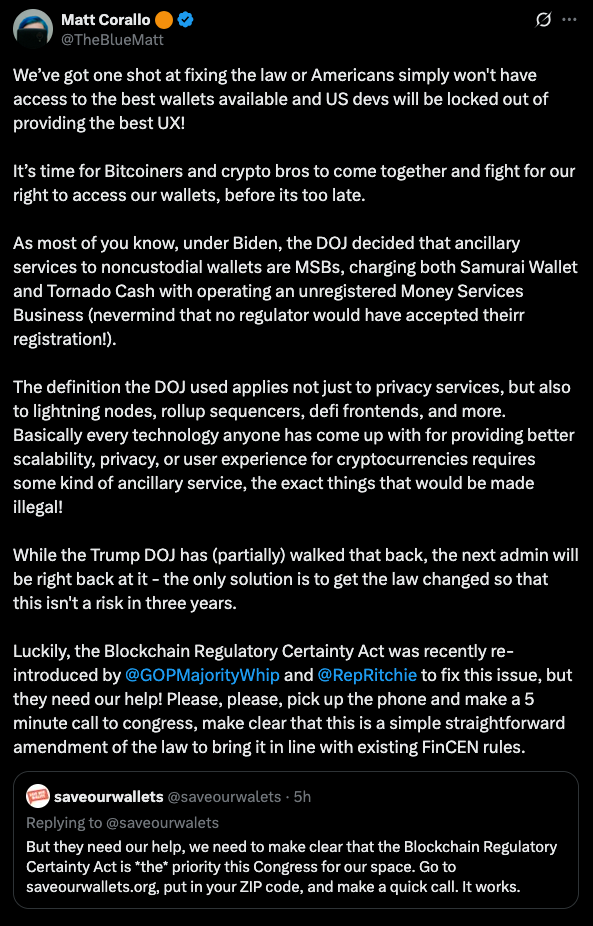
via Matt Corallo

A lot of the focus over the last couple of months has been on the emergence of Strategy competitors in public markets looking to build sizable bitcoin treasuries and attract investors of all shapes and sizes to drive shareholder value. The other big topic in the bitcoin development world has been around OP_RETURN and the debate over whether or not the amount of data that can be shoved into a bitcoin transaction should be decided by the dominant implementation.
A topic that is just as, if not more, important that is not getting enough appreciation is the discussion around open source bitcoin developers and the lingering effects of the Biden administration's attack on Samourai Wallet and Tornado Cash. If you read our friend Matt Corallo's tweet above, you'll notice that the lingering effects are such that even though the Trump administration has made concerted efforts to reverse the effects of Operation Chokepoint 2.0 that were levied by the Biden administration, Elizabeth Warren, and her friends at the Treasury and SEC - it is imperative that we enshrine into law the rights of open source developers to build products and services that enable individuals to self-custody bitcoin and use it in a peer-to-peer fashion without the threat of getting thrown in jail cell.
As it stands today, the only assurances that we have are from an administration that is overtly in favor of the proliferation of bitcoin in the United States. There is nothing in place to stop the next administration or another down the line from reverting to Biden-era lawfare that puts thousands of bitcoin developers around the world at risk of being sent into a cage because the government doesn't like how some users leverage the code they write. To make sure that this isn't a problem down the line it is imperative that we pass the Blockchain Regulatory Clarity Act, which would not hold bitcoin developers liable for the ways in which end users leverage their tools.
Not only is this an act that would protect developers from pernicious government officials targeting them when end users use their technology in a way that doesn't make the government happy, it will also protect YOU, the end user, looking to transact in a peer-to-peer fashion and leverage all of the incredible properties of bitcoin the way they were meant to be. If the developers are not protected, they will not be able to build the technology that enables you to leverage bitcoin.
So do your part and go to saveourwallets.org. Reach out to your local representatives in Congress and Senators and make some noise. Let them know that this is something that you care deeply about and that they should not only pay attention to this bill but push it forward and enshrine it into law as quickly as possible.
There are currently many developers either behind bars or under house arrest for developing software that gives you the ability to use Bitcoin in a self-sovereign fashion and use it in a privacy-preserving way. Financial privacy isn't a crime. It is an inalienable human right that should be protected at all cost. The enshrinement of this inalienable right into law is way past due.
FreeSamourai #FreeRoman
Headlines of the Day
Trump's Truth Social Files for Bitcoin ETF - via X
Norway's K33 Makes First Bitcoin Treasury Buy - via X
SolarBank Adopts Bitcoin Treasury Strategy - via X
Get our new STACK SATS hat - via tftcmerch.io
Take the First Step Off the Exchange
Bitkey is an easy, secure way to move your Bitcoin into self-custody. With simple setup and built-in recovery, it’s the perfect starting point for getting your coins off centralized platforms and into cold storage—no complexity, no middlemen.
Take control. Start with Bitkey.
Use the promo code *“TFTC20”* during checkout for 20% off
Ten31, the largest bitcoin-focused investor, has deployed $150.00M across 30+ companies through three funds. I am a Managing Partner at Ten31 and am very proud of the work we are doing. Learn more at ten31.vc/invest.
Final thought...
Should I join a country club?
Get this newsletter sent to your inbox daily: https://www.tftc.io/bitcoin-brief/
Subscribe to our YouTube channels and follow us on Nostr and X:
@media screen and (max-width: 480px) { .mobile-padding { padding: 10px 0 !important; } .social-container { width: 100% !important; max-width: 260px !important; } .social-icon { padding: 0 !important; } .social-icon img { height: 32px !important; width: 32px !important; } .icon-cell { padding: 0 4px !important; } } .mj-column-per-33-333333333333336 { width: 25% !important; max-width: 25%; } .moz-text-html .mj-column-per-33-333333333333336 { width: 25% !important; max-width: 25%; } /* Helps with rendering in various email clients */ body { margin: 0 !important; padding: 0 !important; -webkit-text-size-adjust: 100% !important; -ms-text-size-adjust: 100% !important; } img { -ms-interpolation-mode: bicubic; } /* Prevents Gmail from changing the text color in email threads */ .im { color: inherit !important; }
-
 @ 8bad92c3:ca714aa5
2025-06-15 22:02:32
@ 8bad92c3:ca714aa5
2025-06-15 22:02:32Key Takeaways

Leon Wankum, a real estate expert turned Bitcoiner, presents a powerful argument that Bitcoin is emerging as the new “hurdle rate,” outpacing real estate as the preferred store of value in a shifting financial landscape. As the 18-year property cycle nears its end amid high interest rates and imbalanced markets, Bitcoin’s scarcity, performance, and optionality are prompting capital allocators to rethink traditional strategies. Institutions are beginning to reallocate cash flows and refinance properties into Bitcoin treasuries, while new yield-bearing Bitcoin instruments like Strike, Strife, and Stride offer compelling alternatives to bonds and property. Wankum envisions a gradual transition to a Bitcoin standard, facilitated by dual collateralization and designed to avoid economic disruption as Bitcoin steadily replaces legacy financial infrastructure.
Best Quotes
"Bitcoin is starting to become the new hurdle rate that all other financial products have to abide to."
“No asset—not even prime real estate—can compete with Bitcoin’s long-term performance and absolute scarcity.”
"You can refinance a property and allocate to Bitcoin without selling—this is how many are making the transition."
"Strategy (MicroStrategy) has enough Bitcoin to cover preferred stock dividends for over 200 years."
"20% of our property cash flow into Bitcoin outperformed the 80% left in fiat."
“Bitcoin is digital real estate—but better. Scarce, global, and doesn’t need maintenance or tax sheltering gimmicks.”
“If it’s just 1% of the real estate market, that’s $3 trillion. And that’s enough.”
"A smooth transition, not collapse, is the optimal path forward."
Conclusion
This episode explores how Bitcoin is overtaking real estate as the global store of value, with Leon Wankum offering a rational, experience-based framework for understanding this shift. While institutional inertia slows adoption, capital flows are beginning to reflect Bitcoin’s growing dominance, as new financial instruments and treasury strategies emerge. Leon advocates for a thoughtful, evolutionary transition to a Bitcoin standard—one that prioritizes stability, practical integration, and long-term value creation across the global economy.
Timestamps
0:00 - Intro
0:50 - Real Estate
12:36 - Bitcoin for real estate investors
17:44 - Bitkey
18:39 - MSTR products and opportunity cost
30:43 - Unchained
31:13 - Cash flow alternatives
37:40 - Strategy risks
44:41 - Smooth or chaotic transition
50:58 - Is this cycle different?
56:42 - Tradfi degeneracy
1:02:00 - Leon’s Book - Digital Real EstateTranscript
(00:00) Other than real estate, there were little investments that performed better. Few were aware of the existence of Bitcoin. As people become more aware, they will likely also sell off their properties. Bitcoin as a near-perfect form of money is starting to become the new hurdle rate that all other financial products have to abide to.
(00:19) Instead of buying a regular bond issued by a nation state, you can actually buy a fixed income product issued by Strategy. This is a product that could potentially tap into the real estate market. If it's just 1%, that's 3 trillion. And that's enough. They are starting to weigh the opportunity cost of not putting money into Bitcoin.
(00:36) But very few are able to comprehend the necessity of quickly investing large part of the capital into Bitcoin. Every 18 years will have a correction on housing. We're bringing in a housing expert to talk about the real estate market and Bitcoin corporate adoption. in the crazy frenzy that's going on right now in public markets.
(01:04) Leon, welcome back to the show. Thanks for having me back. It was great seeing you even though it was briefly in Vegas last week. I caught you literally as I was running to the airport off the stage. Yeah. And uh look, I'm pull that back up because I think this is a good jumping off point. We'll start with like a personal story.
(01:24) I'm currently in the middle of a move right now, but decided to rent a house because I was looking at the prices for housing in the places I'm looking to buy and they were they were too high. Not only were they too high, we put a bid in on one house and it wound up going a million dollars over asking.
(01:44) And I think over here in the United States, this is a big topic of discussion right now, which is the real estate market feels a little toppy. Prices are still very high, very sticky. Rates are still very high. Uh, and that's one thing I'm trying to discern as somebody who would like to buy a house in the next few years, a forever house for my family, what is going on.
(02:08) And as we can see here, Red Red Fin reported earlier this week that 34% there are 34% more sellers in the market than buyers. At no other point in records dating back to 2013 have sellers outnumbered buyers this much. There are a total of $698 billion worth of homes for sale in the US, up 20.
(02:29) 3% from a year ago in the highest dollar amount ever. So, it seems like there's a ton of people who have rode the real estate market and they're being a bit stingy on pricing and we're waiting for a correction. Is that your take on this? Yeah, we definitely need to wait for price equilibrium to build because since 2008 really since we had low interest rates um prices were skyrocketing and now with a different interest rate environment.
(02:57) Um what I personally also feel is that people are not willing to sell their houses for a price that they believe is not what they could get because they still have the prices in mind that they were able to receive 2 three years ago and the buyers are not willing to pay prices that people want because interest rates are higher meaning the cost of capital and the cost of borrowing went up.
(03:21) So I think this is a healthy um and a healthy um development. We need a price equilibrium. We need um demand and supply prices to match. It's going to take a long time. I think it's also it also depends on interest rates. If Powell is going to um lower interest rates, which I don't think he will, even though that's something that the president would like him to do, but I don't think he will because it would cause inflation to go up again, especially in in goods and services and groceries.
(03:51) And um judging by that, I think interest rates will stay above 3% at least for the foreseeable future. Meaning I believe that real estate prices will come down a little bit till we meet that equilibrium. But something that's important to to remember which makes it a little bit odd that because as a Bitcoiner when you look at housing, I think you constantly think now it's going to crash, now it's going to crash.
(04:15) But the reason it's not really going to crash is as soon as new money is being introduced into your economy or as soon as interest rates are lowered that money is being funneled into real estate and also the existing system that is depending on real estate as collateral has an interest in propping prices up.
(04:34) So this can go on for another 10 or 20 years I think. I mean there could be there's definitely a correction that we can see right now and I personally wouldn't get into uh real estate development at this point if you'll ask me from the perspective what's the better investment of course that is Bitcoin but I just want to make a point that this can go can go on for longer than we think because housing is limited not as limited as Bitcoin but there's something called the 18-year property cycle and it says that every 18 years, we'll
(05:08) have a correction in housing. And the reason for that is if the money supply is expanded and that money goes into land, it's not going out of land because land is limited. It's similar to Bitcoin. But what happens is that after around 14 15 years, prices start to come down and then they find a new price equilibrium which is higher than when the cycle started.
(05:33) And we are at the end of this 18-year property cycle. and I had suggest that prices will fall until 2026 and then in 2026 if interest rates are lowered I think prices can find price equilibrium and then possibly move up in nominal value of course if you start now accounting for real estate and bitcoin it's a whole different story I know talked from the lens of a fiat um based system yeah that note on pal and the fed is interesting that it It's very obvious Trump's wanted him to lower rates since before he even got elected.
(06:09) But I was reading an article yesterday that made a lot of sense to me, which is he's not going to lower rates for multiple reasons. One of which you mentioned, which is it would it would reignite inflation, which nobody wants to see right now. And then number two, profit margins are going up because the productivity uh increases due to AI.
(06:32) I mean, and we're still at the early stages of that, um, where you have many of the big big tech, the MAG 7 beginning to lay off people because they're creating all these efficiencies via AI. So, we're able to increase productivity and profit margins and so there's no reason to to lower rates from that perspective, which agreed.
(06:58) Yeah, absolutely true. Yeah, which is uh you know it'll be it's crazy the confluence of events that are happening right now whether it's real estate market looking a little toppy at least temporarily the interest rate environment the progression of AI and the adoption uh by many large companies and small companies alike and then you have Bitcoin sitting over here sitting over $2 trillion establishing itself as a $2 trillion asset and it still seems a bit fringe where um where we are certainly as Bitcoiners, individuals -
 @ 8bad92c3:ca714aa5
2025-06-15 22:02:32
@ 8bad92c3:ca714aa5
2025-06-15 22:02:32Marty's Bent

J.P. Morgan CEO Jamie Dimon has long been an outspoken skeptic and critic of bitcoin. He has called Bitcoin a speculative asset, a fraud, a pet rock, and has opined that it will inevitably blow up. A couple of years ago, he was on Capitol Hill saying that if he were the government, he would "close it down". Just within the last month, he was on Fox Business News talking with Maria Bartiromo, proclaiming that the U.S. should be stockpiling bullets and rare earth metals instead of bitcoin. It's pretty clear that Jamie Dimon, who is at the helm of the most powerful and largest bank in the world, does not like bitcoin one bit.
Evidence below:
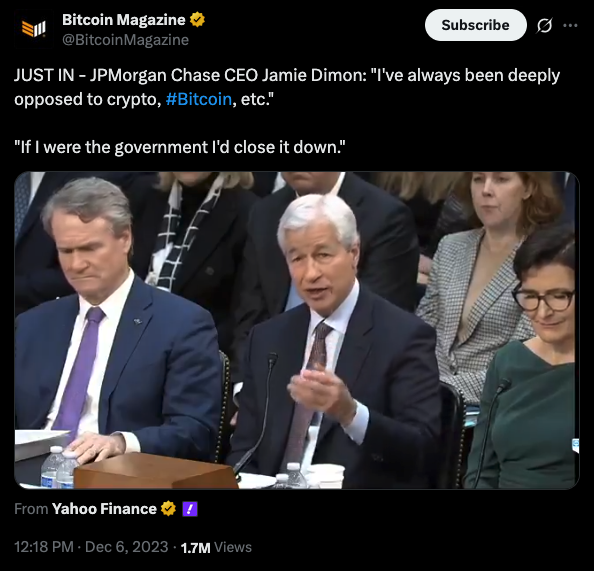
via Bitcoin Magazine
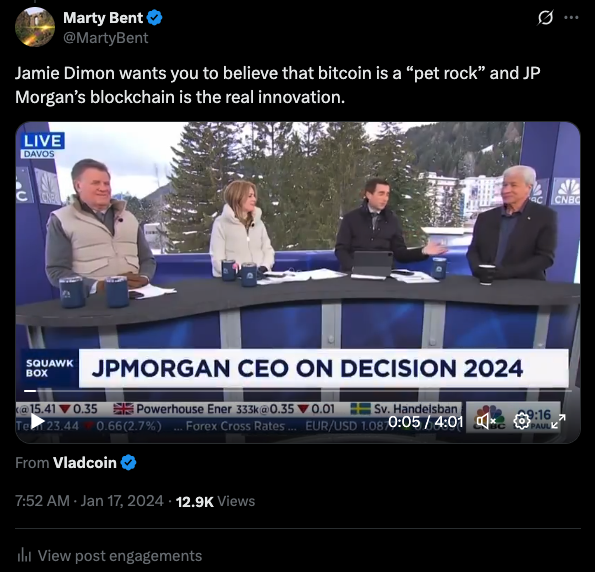
via me

via CNBC

Despite Dimon's distinguished disdain for Bitcoin, J.P. Morgan cannot deny reality. The CEO of the largest bank in the world is certainly a powerful man, but no one individual, even in the position that Jamie Dimon is in, is more powerful than the market. And the market has spoken very clearly, it is demanding bitcoin. The Bitcoin ETFs have been the most successful ETFs in terms of pace of growth since their launch. They've accumulated tens of billions of dollars in AUM in a very short period of time. Outpacing the previous record set by the gold ETF, GLD.
Whether or not Jamie Dimon himself likes Bitcoin doesn't matter. J.P. Morgan, as the largest bank in the world and a publicly traded company, has a duty to shareholders. And that duty is to increase shareholder value by any ethical and legal means necessary. Earlier today, J.P. Morgan announced plans to offer clients financing against their Bitcoin ETFs, as well as some other benefits, including having their bitcoin holdings recognized in their overall net worth and liquid assets, similar to stocks, cars, and art, which will be massive for bitcoiners looking to get mortgages and other types of loans.

via Bloomberg
I've talked about this recently, but trying to buy a house when most of your liquid net worth is held in bitcoin is a massive pain in the ass. Up until this point, if you wanted to have your bitcoin recognized as part of your net worth and count towards your overall credit profile, you would need to sell some bitcoin, move it to a bank account, and have it sit there for a certain period of time before it was recognized toward your net worth. This is not ideal for bitcoiners who have sufficient cash flows and don't want to sell their bitcoin, pay the capital gains tax, and risk not being able to buy back the amount of sats they were forced to sell just to get a mortgage.
It's not yet clear to me whether or not J.P. Morgan will recognize bitcoin in cold storage toward their clients' net worth and credit profile, or if this is simply for bitcoin ETFs only. However, regardless, this is a step in the right direction and a validation of something that many bitcoiners have been saying for years. Inevitably, everyone will have to bend the knee to bitcoin. Today, it just happened to be the largest bank in the world. I expect more of this to come in the coming months, years, and decades.
Lyn Alden likes to say it in the context of the U.S. national debt and the fiscal crisis, but it also applies to bitcoin adoption and the need for incumbents to orient themselves around the demands of individual bitcoiners; nothing stops this train.
Real Estate Correction Coming
Real estate expert Leon Wankum shared his perspective on why property prices need to find a new equilibrium by 2026. He pointed to the 18-year property cycle theory, noting we're at the end of the current cycle with a massive imbalance - 34% more sellers than buyers, the highest gap since records began in 2013. Leon explained that sellers still have unrealistic expectations based on 2021-2022 peaks, while buyers face a fundamentally different reality with higher borrowing costs.
"We need a price equilibrium. We need demand and supply prices to match. It's going to take a long time, I think." - Leon Wankum
Leon doesn't expect a catastrophic crash, however. He emphasized that the financial system depends too heavily on real estate as collateral for authorities to allow a complete collapse. With interest rates likely staying above 3% to combat inflation, he sees a healthy correction rather than devastation - a necessary adjustment that creates opportunities for patient buyers who understand the new market dynamics.
Check out the full podcast here for more on Bitcoin treasury strategies, dual collateralization, and corporate BTC adoption
Headlines of the Day
California May Seize Idle Bitcoin After 3 Years - via X
Semler Scientific Buys $20M More Bitcoin, Holds $467M - via X
US Home Sellers Surge as Buyers Hit 4-Year Low - via X
Get our new STACK SATS hat - via tftcmerch.io
Take the First Step Off the Exchange
Bitkey is an easy, secure way to move your Bitcoin into self-custody. With simple setup and built-in recovery, it’s the perfect starting point for getting your coins off centralized platforms and into cold storage—no complexity, no middlemen.
Take control. Start with Bitkey.
Use the promo code *“TFTC20”* during checkout for 20% off
Ten31, the largest bitcoin-focused investor, has deployed $150.00M across 30+ companies through three funds. I am a Managing Partner at Ten31 and am very proud of the work we are doing. Learn more at ten31.vc/invest.
Final thought...
I feel old.
Get this newsletter sent to your inbox daily: https://www.tftc.io/bitcoin-brief/
Subscribe to our YouTube channels and follow us on Nostr and X:
@media screen and (max-width: 480px) { .mobile-padding { padding: 10px 0 !important; } .social-container { width: 100% !important; max-width: 260px !important; } .social-icon { padding: 0 !important; } .social-icon img { height: 32px !important; width: 32px !important; } .icon-cell { padding: 0 4px !important; } } .mj-column-per-33-333333333333336 { width: 25% !important; max-width: 25%; } .moz-text-html .mj-column-per-33-333333333333336 { width: 25% !important; max-width: 25%; } /* Helps with rendering in various email clients */ body { margin: 0 !important; padding: 0 !important; -webkit-text-size-adjust: 100% !important; -ms-text-size-adjust: 100% !important; } img { -ms-interpolation-mode: bicubic; } /* Prevents Gmail from changing the text color in email threads */ .im { color: inherit !important; }
-
 @ 2cde0e02:180a96b9
2025-06-15 11:40:13
@ 2cde0e02:180a96b9
2025-06-15 11:40:13pen, watercolors & brushpen;
https://stacker.news/items/1006873
-
 @ dfa02707:41ca50e3
2025-06-15 21:01:45
@ dfa02707:41ca50e3
2025-06-15 21:01:45Contribute to keep No Bullshit Bitcoin news going.
- Wasabi Wallet v2.6.0 "Prometheus" is a major update for the project, focused on resilience and independence from centralized systems.
- Key features include support for BIP 158 block filters for direct node synchronization, a revamped full node integration for easier setup without third-party reliance, SLIP 39 share backups for flexible wallet recovery (sponsored by Trezor), and a Nostr-based update manager for censorship-resistant updates.
- Additional improvements include UI bug fixes, a new fallback for transaction broadcasting, updated code signing, stricter JSON serialization, and options to avoid third-party rate providers, alongside various under-the-hood enhancements.
This new version brings us closer to our ultimate goal: ensuring Wasabi is future-proof," said the developers, while also highlighting the following key areas of focus for the project:
- Ensuring users can always fully and securely use their client.
- Making contribution and forks easy through a codebase of the highest quality possible: understandable, maintainable, and improvable.
"As we achieve our survival goals, expect more cutting-edge improvements in Bitcoin privacy and self-custody. Thank you for the trust you place in us by using Wasabi," was stated in the release notes.
What's new
- Support for Standard BIP 158 Block Filters. Wasabi now syncs using BIP 158 filters without a backend/indexer, connecting directly to a user's node. This boosts sync speed, resilience, and allows full sovereignty without specific server dependency.
- Full Node Integration Rework. The old integration has been replaced with a simpler, more adaptable system. It’s not tied to a specific Bitcoin node fork, doesn’t need the node on the same machine as Wasabi, and requires no changes to the node’s setup.
- "Simply enable the RPC server on your node and point Wasabi to it," said the developers. This ensures all Bitcoin network activities—like retrieving blocks, fee estimations, block filters, and transaction broadcasting—go through your own node, avoiding reliance on third parties.
- Create & Recover SLIP 39 Shares. Users now create and recover wallets with multiple share backups using SLIP 39 standard.
"Special thanks to Trezor (SatoshiLabs) for sponsoring this amazing feature."
- Nostr Update Manager. This version implements a pioneering system with the Nostr protocol for update information and downloads, replacing reliance on GitHub. This enhances the project's resilience, ensuring updates even if GitHub is unavailable, while still verifying updates with the project's secure certificate.
- Updated Avalonia to v11.2.7, fixes for UI bugs (including restoring Minimize on macOS Sequoia).
- Added a configurable third-party fallback for broadcasting transactions if other methods fail.
- Replaced Windows Code Signing Certificate with Azure Trusted Signing.
- Many bug fixes, improved codebase, and enhanced CI pipeline.
- Added the option to avoid using any third-party Exchange Rate and Fee Rate providers (Wasabi can work without them).
- Rebuilt all JSON Serialization mechanisms avoiding default .NET converters. Serialization is now stricter.

Full Changelog: v2.5.1...v2.6.0
-
 @ 8bad92c3:ca714aa5
2025-06-15 22:02:31
@ 8bad92c3:ca714aa5
2025-06-15 22:02:31Marty's Bent
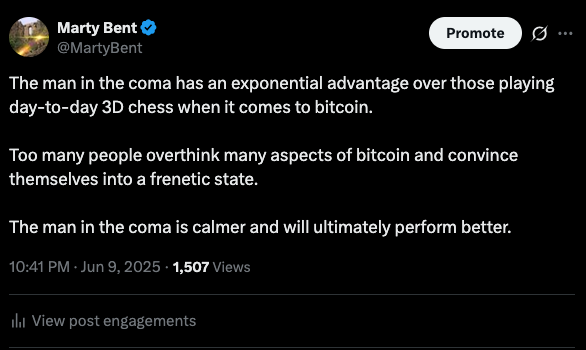
via me

"The man in the coma" has been a long-running archetype of a bitcoiner on TFTC and Rabbit Hole Recap. Over the years, we've referenced the man in the coma in regards to bitcoin being a backward compatible distributed network that would enable an individual, in the case of our example - a man who fell into a coma, to be able to wake up many years, even decades, after falling into a deep sleep, go back to his bitcoin node and be able to participate in the network and validate his own transactions as if the network was operating the same it was the day he slipped into a coma. As a distributed network, this is one of bitcoin's greatest value props; consistency for the individual running it, no matter the version.
Having spent 12 years engrossed in bitcoin, thinking about it every day, building a media company focused on educating people about the network and the monetary revolution it enables, why it's important and how they can use it. Becoming a managing partner at Ten31, which is dedicated to investing in companies building out infrastructure that makes bitcoin more accessible and easier to use; "the man in the coma" has become a more prominent archetype in my mind.
"The man in the coma" archetype can be described in other ways. For instance, there was an individual by the name of John Doe, who joined myself and Matt Odell on TFTC about seven years ago who went to jail for four years. He was distributing certain goods on the Silk Road for many years and got nabbed by the police while throwing a house party. Unfortunately for Mr. Doe, the goods he were selling via the Silk Road were in the house hosting the party that got busted. Fortunately for Mr. Doe, the police who nabbed him were not privy to the way in which he was marketing and selling the goods. He went to jail for four years, walked out at the end of his sentence, found his bitcoin wallets, recovered them and was more than pleasantly surprised at the magnitude of his wealth.
The forced hodl that was incited by the state throwing him in a cage wound up paying off after four years. Now, I can certainly admit that time is the most scarce asset in the world. Being put in a cage for four years or falling into a coma for a number of years is not ideal. However, there are lessons to be gleaned from the successes that have been realized by "the man in the coma" and the man who was forced to hodl by being thrown in a cage. Unable to access his bitcoin during that period of time to make less than wise decisions.
The main lesson to be gleaned is that doing nothing is oftentimes significantly more optimal than doing something. Too many bitcoiners decide to make rash decisions influenced by the day-to-day happenings on social media or some one-off comment from someone in their personal life that they respect. These comments can be about the long-term viability of bitcoin itself, some prognostications about where the price is going in a short-term to medium-term time frame or simply the social aspects of being associated with bitcoin. All of these factors play into influencing certain individuals deciding to sell their bitcoin in the hopes of buying it back lower, realizing something material in their day-to-day life or jumping off a ship that they've been convinced is about to sink.
In my mind, the only thing listed above that makes a bit of sense to me is realizing something material in your day-to-day life. Selling some bitcoin to purchase something that makes your life better like enabling you to support your family at a critical time and in a way that would not be possible unless you sold bitcoin. That makes sense to me. However, the other two are completely nonsensical. Bitcoin's success is binary. It either succeeds or it doesn't. And if you accept that this is true, success means slowly but surely becoming the global reserve currency and monetary network used by billions of humans on the planet or it goes to zero.
If the former materializes, that means that billions of people are going to be competing for 21 million Bitcoin. There are, by some estimates, $900 trillion worth of assets that are being used to store wealth over the short, medium, and long term. Bitcoin has the potential to subsume a material percentage of that $900 trillion. In my mind, if bitcoin is as good as I believe it is, it should take at least half of that market, if not 80 to 90%. This in and of itself is a gamble. No one can be certain that this will come true. And with that in mind you have to make a probabilistic bet by surveying the world and discerning what the likelihood of bitcoin's ultimate success is.
If you think governments, central banks, and large corporations are going to continue down the path of unfettered expansion of the monetary base, debt, and misallocation of capital, bitcoin, a peer-to-peer distributed cash system that cannot be controlled by any individual. corporation, country, or central bank makes a lot of sense. The debasement, the debt expansion, and the misallocation of capital are driven by fallible humans working in incentive structures that are vulnerable to the fallible nature of the humans working within them.
Human fallibility brings with it the ability to talk oneself out of a position that one knows makes sense and is logical. This is the disadvantage that those who are not "the man in the coma" or "the man in a cage" operate from. Being forced to hodl bitcoin is already and will increasingly be seen as a relative advantage. Many who are in bitcoin today, paying attention to every headline, every pull request and every doubt flung their way will likely get to 2030 and agree that they made worse decisions than the man who was thrown in a cage or who slipped into a coma.
Of course, this isn't a fair introspective conclusion. The man in the coma and the man who was forced to hodl because he was put in a jail cell did not have a decision at the end of the day. Both were forced to hodl due to external or internal forces that, all else being equal, they would prefer not have had to endure. However, the outcome of these two situations will likely be better than the outcome of "the man in the arena" who thinks that by making decisions on the go as a slew of information comes his way on a day-to-day basis will materialize in a larger stack of satoshis.
The reality of the situation is such that no one truly knows where bitcoin is going to go on a day-to-day, month-to-month, or year-to-year basis. Especially at this point with large institutions, nation-states, corporations, and individual states getting into the fray. The only tried-and-true strategy within bitcoin over the long term is to stay humble, stack sats, and hodl like you are "the man in the coma" or the man who was thrown in a cage.
Bitcoin's Volatility Won't End With Institutional Adoption
Leon Wankum challenged the popular "supercycle" narrative during our conversation, arguing that Bitcoin's volatility isn't going away despite massive institutional adoption. While acknowledging that MicroStrategy now holds over 2% of all Bitcoin and won't sell, Leon maintains that leverage will still need to be washed out. He expects another 60% drawdown at the end of this bull cycle, viewing this as a feature rather than a bug of Bitcoin's design.
"Bitcoin naturally washes out leverage, it builds resilience and we don't go through these crazy boom and bust cycles, we go through bull and bear markets and I think that's a net positive." - Leon Wankum
Leon sees Bitcoin's volatility as fundamentally different from fiat's destructive boom-bust cycles. Where traditional markets require central bank intervention to prop up failing systems, Bitcoin's regular corrections create genuine resilience. Bad actors will always enter during euphoric phases, and the subsequent washouts ensure only strong hands remain. This natural selection process, he argues, is beautiful - it's what makes Bitcoin antifragile.
Check out the full podcast here for more on real estate opportunity costs, Bitcoin bonds, and treasury company risks.
Headlines of the Day
Romania Adds Crypto Terminals to Post Offices - via X
Musk Claims Trump in Epstein Files - via X
Uber CEO Calls Bitcoin Proven Store of Value - via X
Get our new STACK SATS hat - via tftcmerch.io
Take the First Step Off the Exchange
Bitkey is an easy, secure way to move your Bitcoin into self-custody. With simple setup and built-in recovery, it’s the perfect starting point for getting your coins off centralized platforms and into cold storage—no complexity, no middlemen.
Take control. Start with Bitkey.
Use the promo code *“TFTC20”* during checkout for 20% off
Ten31, the largest bitcoin-focused investor, has deployed $150.00M across 30+ companies through three funds. I am a Managing Partner at Ten31 and am very proud of the work we are doing. Learn more at ten31.vc/invest.
Final thought...
The kids really do grow up f

